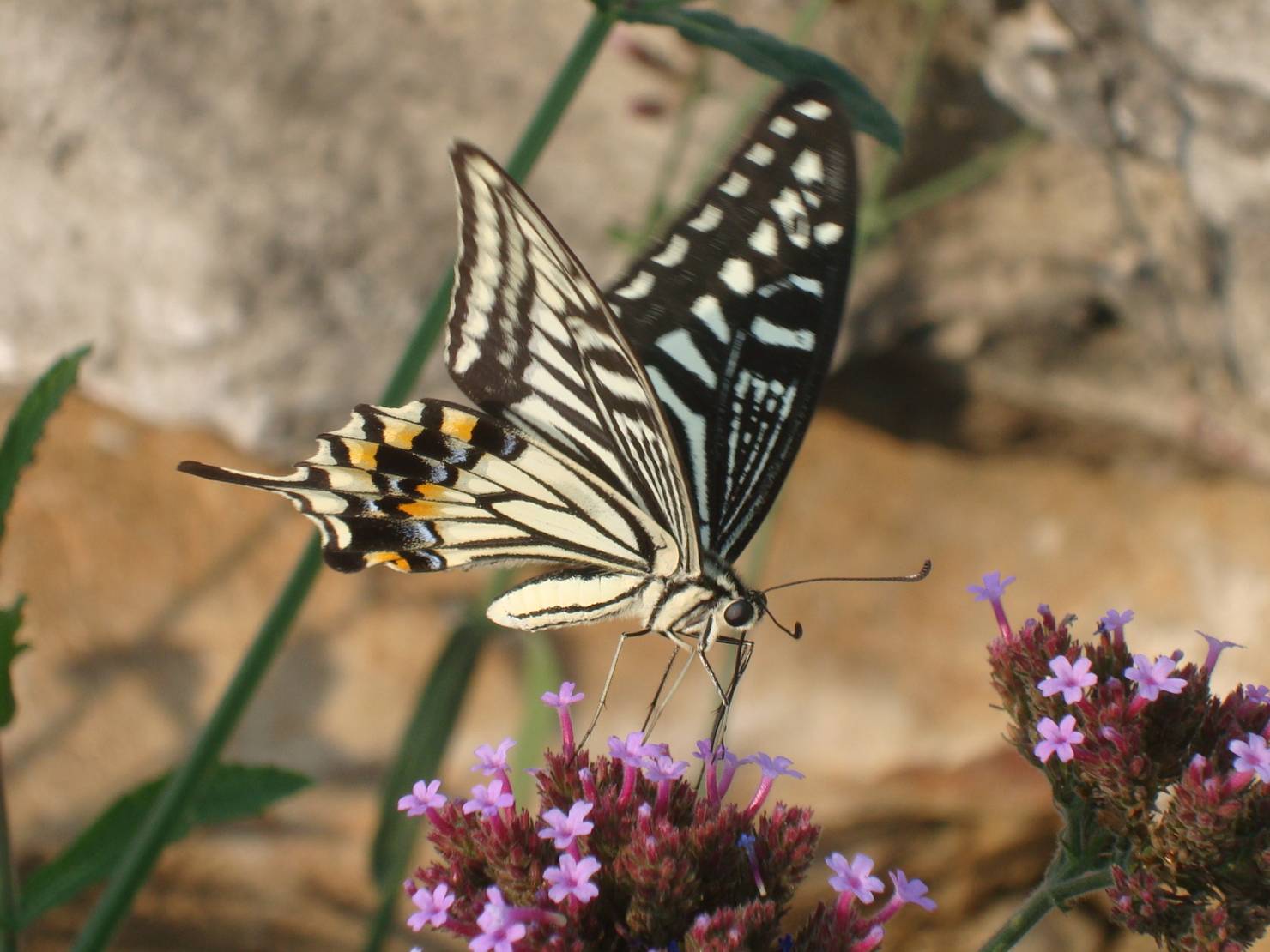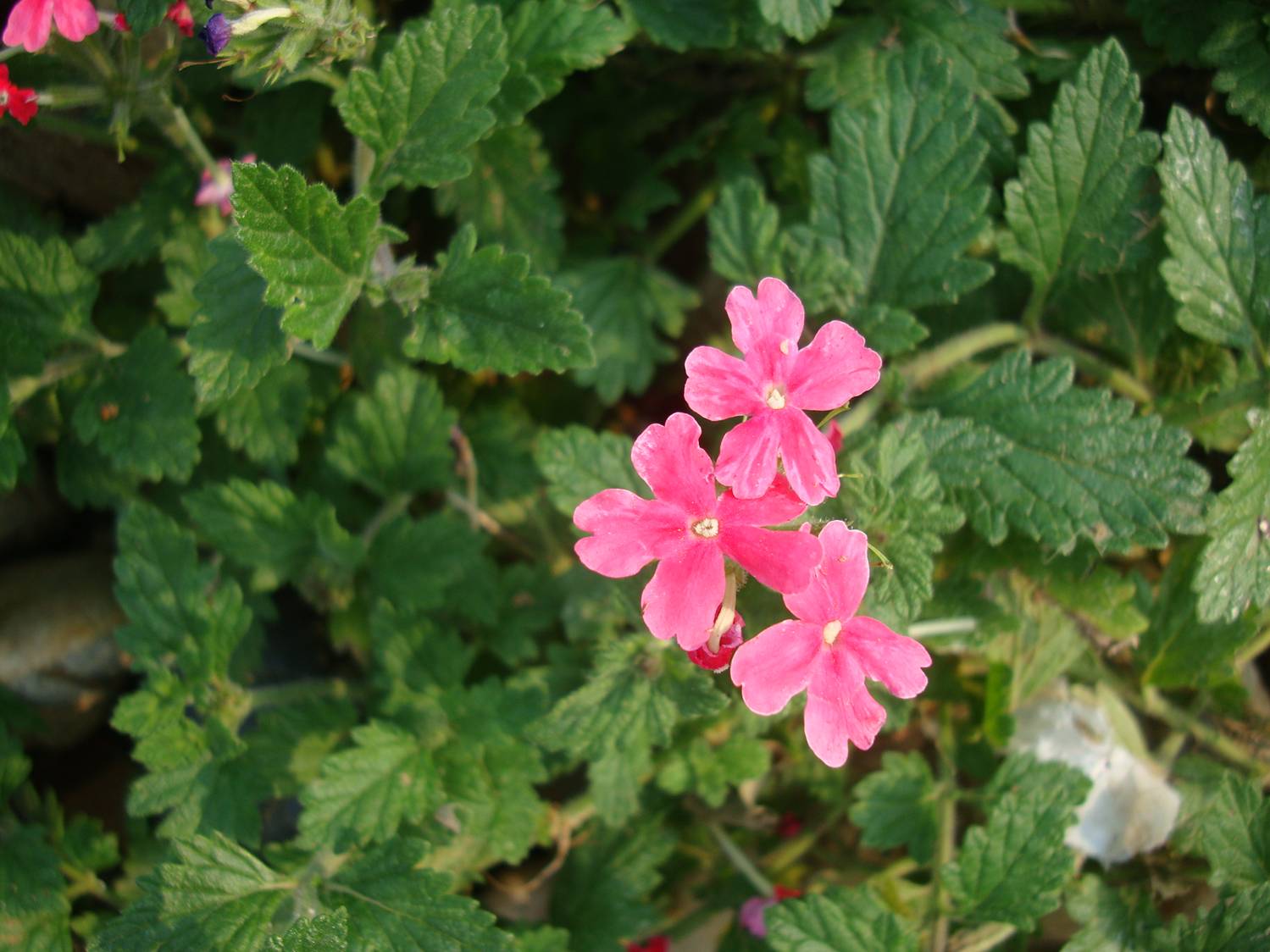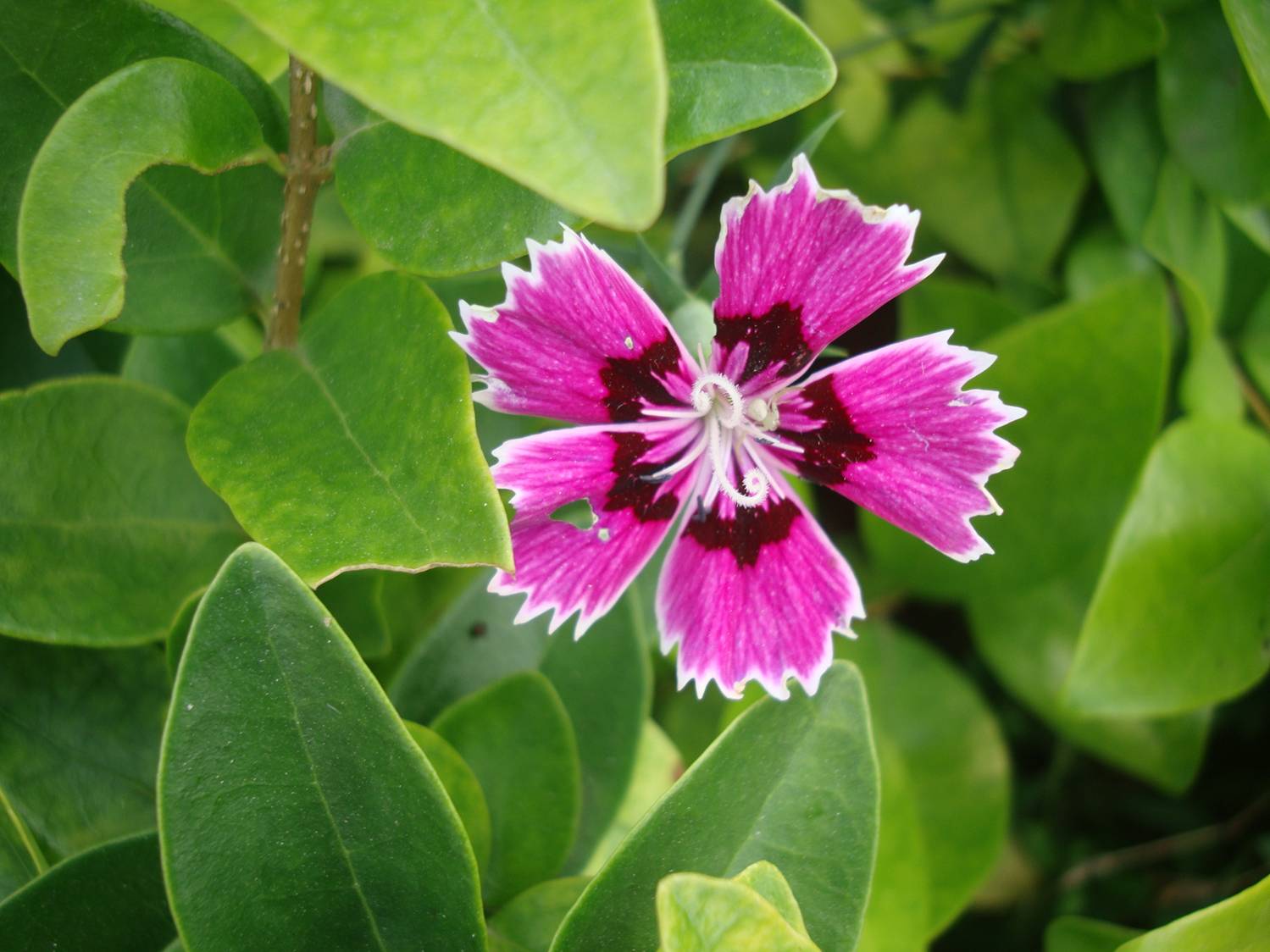|
Chinese Word of the
Day: 西方
(xī fāng literally "west + place) the West, the Occident

November 30, 2010 "When
China Rules the World" - book report.
Since coming to China I've read a lot of books about this country.
Right now I'm reading When China Rules the World, the
End of the Western World and the Birth of a New Global Order, by
Martin Jacques, Penguin Books, New York 2009. It's interesting to
be reading a book that was so recently published, full of up to date
statistics and political information. It's also interesting to be
reading this book while sitting, if not in the middle, certainly in a
position in the Chinese cultural milieu. I find myself constantly
saying "Yes, but..." to the statements Mr. Jacques makes about China.
There is really little to argue about in his interpretation of Chinese
history or tradition, though he is perhaps a little more accepting of
the party line about the achievements of Mao than I might be. It's
when he talks about the future of China that I find myself ready to
argue a point or two. Mr. Jacques main theses is that modernity,
as defined by the Western mind, is very Eurocentric, and that modernity
for China will be very different from what we expect. Essentially he
claims that China will be "modern with Chinese characteristics".
He repeats this assertion in various words to the point where the
repetition becomes annoying.
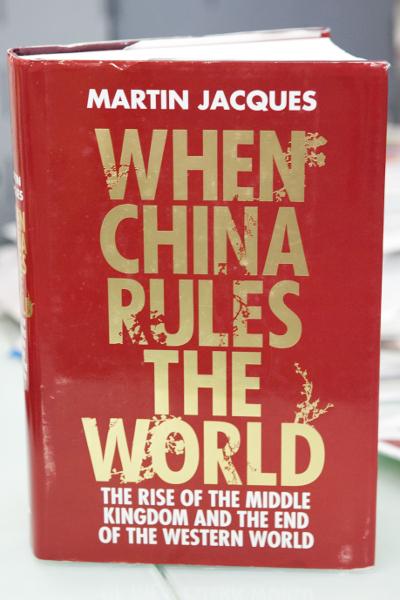
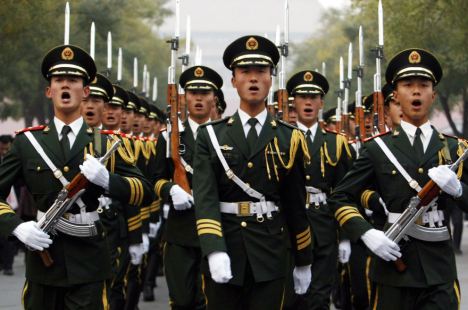
There is no place in the book that I can find where
Jacques actually claims that China WILL someday rule the world.
That rather inflammatory title seems to be an attempt to catch the
attention of Americans, probably originating with the publisher hoping
to increase book sales. The book does not present a bogyman of an
Imperialist China. What Mr. Jacques does give is is a very thoughtful
and balanced view of an industrializing China, about to take it's place
among the various important power blocks and national interests that
will shape all our future. He's done his research, and the book is
worth reading just for the statistics and economic perspectives it
presents. He points out, for example, that virtually none of the
developed nations had modern democracy during their period of economic
take off, and that we shouldn't expect western style democracy to
be a priority for China any time soon. He also argues that when
full democracy does come to China, it will be in a distinctly Chinese
form, with a probable emphasis on a ruling elite rather than on citizen
participation, much as we see in present day Japan. I have serious
doubts about this prediction. I think his central thesis, that
China will invent a new form of modernity that will be unlike anything
coming from the West, makes too much of Chinese Confucian
tradition and ignores the universality of human desire.
Many of his distinctions go right over my head.
For example, he make a big issue of China being a "civilization state"
as opposed to the "nation states" of the Western world. But I fail
to see the validity in this. How is China any more of a
"civilization state" than America, with it's people drawn from every
nation in the world, but united in one country. Doesn't that let
America qualify as a civilization state too? If not the
mono-cultural United States, surely Canada must qualify. We have a
larger land mass, and at least as much cultural diversity under one
"civilization" as China, and I think we can even claim the five thousand
years of history, if you go back to everybody's roots.
If there's anything I've learned during my time in
China, it's that this country is not easy to analyze. When I first
arrived, to the developing city of Tai'an, I was writing home as if I
was talking about China. That was a bit like landing in Moosejaw,
Saskatchewan, and thinking you are writing about Canada. Our first
Spring holiday visit to Guangzhou, with it's modern subway system,
opened my eyes to that mistake. Jacques is far too sophisticated to be
under any such illusion. But I can't help the feeling that all of
his necessary generalizations combined with the complexity of the
country make any of his statements about China's future highly suspect.
I do have to agree with Jacques on one issue.
Anybody hoping for a collapse of the Communist Party and an implosion
similar to what happened with the USSR is asking for a huge toll in
human suffering and death. That is a worst case scenario for the
future of China and the world. The best case scenario: a gradual
mutation/transformation into the kind of modern society we, and I
believe most of the Chinese people, all want. A prosperous and
happy modern China, with a fully democratic modern government, freedom
of the press, right of assembly, a censorship free Internet, rule of
law, separation of church and state, and a level playing field where
merit can rise to the top. I think this is coming, maybe sooner
than we expect.
"When China Rules the World" will stimulate lots of
thoughts, and therein lies its principle value.
Comment
on this Post
The Latest Student Poll
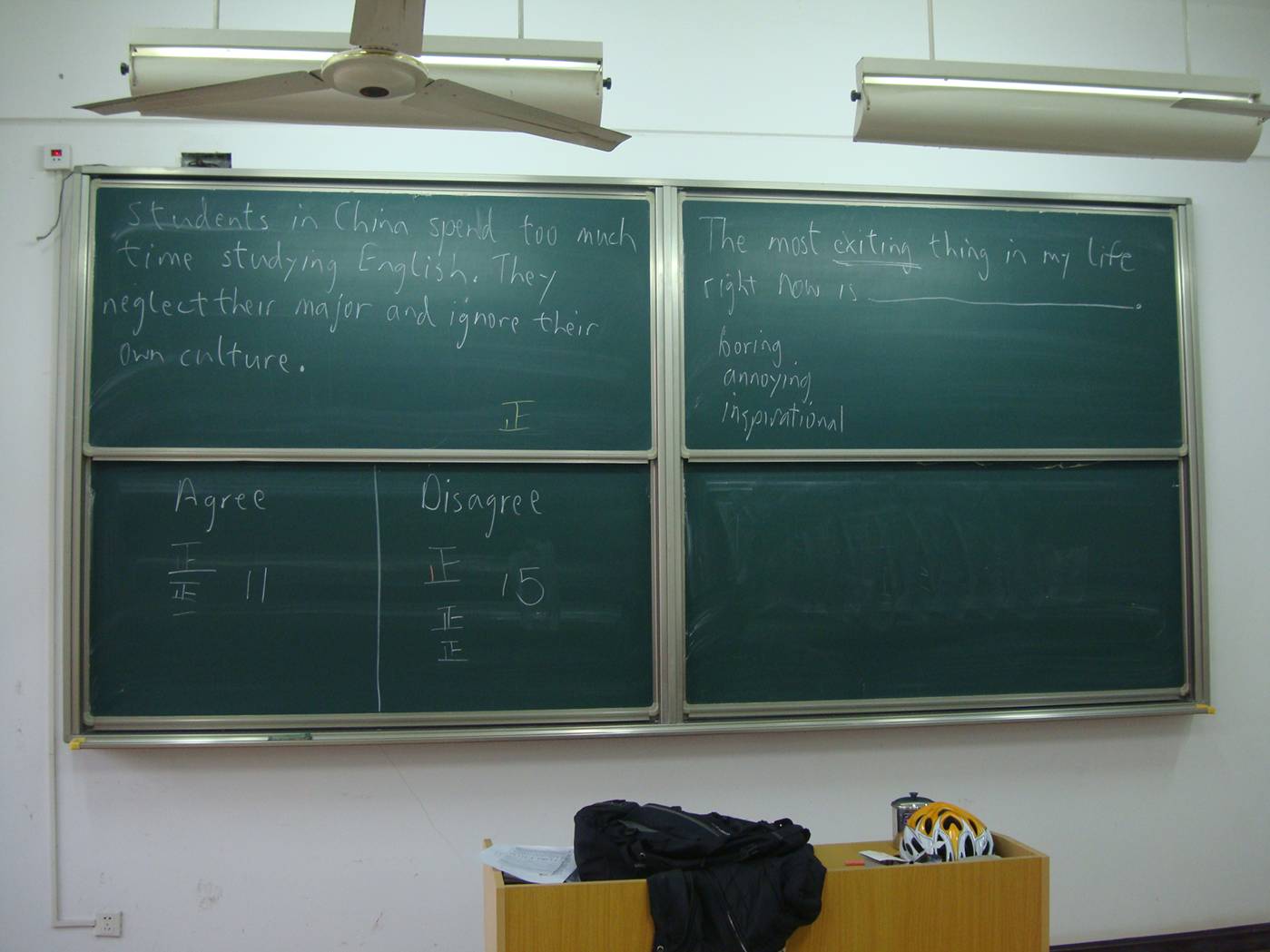
I've been
trying to draw out my students on their feelings about westernization
and the study of English. The statement on the board was a
discussion topic suggested by one of my students. So there's the
vote, eleven agree and fifteen disagree with the statement: "Students in
China spent too much time studying English. They neglect their
major and ignore their own culture." So now I know how they vote
on this, but figuring out what it means in a class discussion has not
been very satisfying. With very few and notable exceptions, my
students do not speak unless told to speak by their teacher. Class
discussions are not heated, not by any means, not even when the vote is
this close.
Comment
on this Post
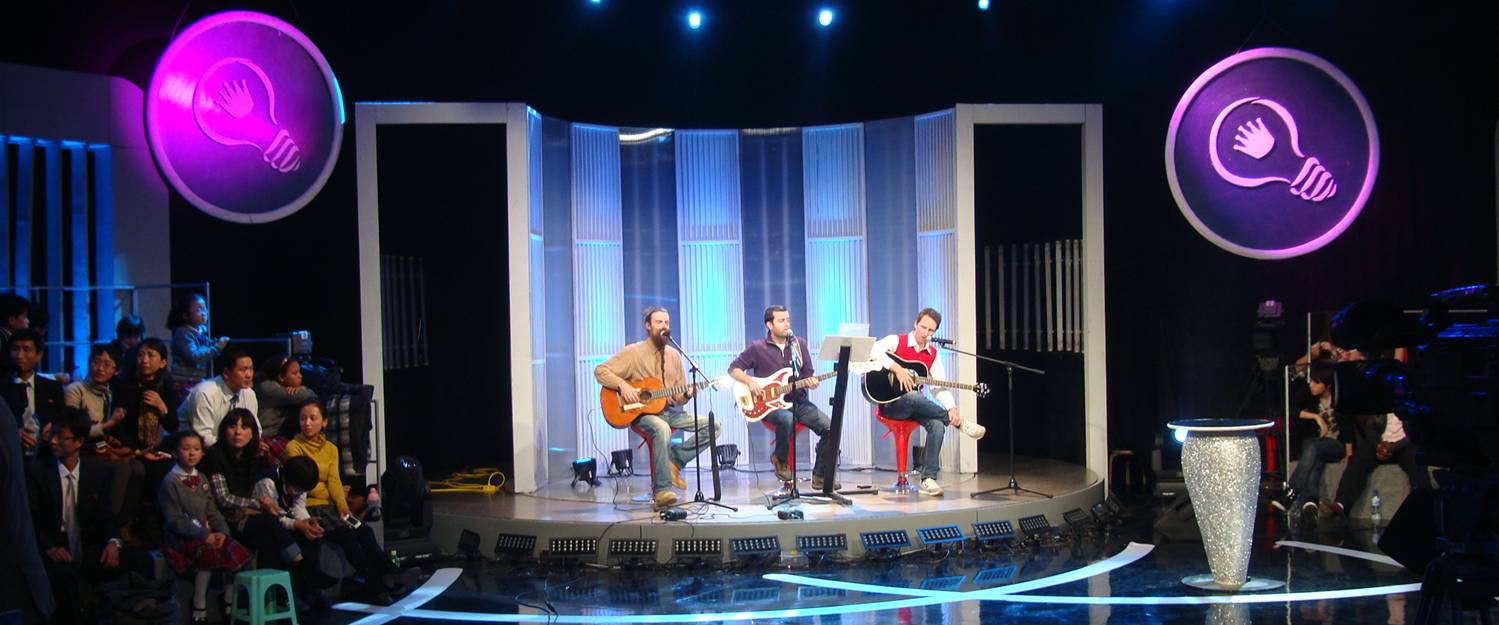
Chinese Word of the
Day: 塑料草
(sù liào cǎo literally "mould material grass" or "plastic grass") =
Astroturf
November 22, 2010 An
Inspired Class (If I do say so myself.)
I'm always looking for ideas that go beyond the simplistic chatter
suggested by the text books. These are university students.
If they are going to practice talking English, they might as well talk
about interesting subjects. So this morning my oral English class
was invited to tackle tort reform in America.


This class idea was inspired by a
New Yorker magazine article on the Koch
Brothers, notorious oil billionaires who have been funding climate
change denial and fighting Obama's health care reforms while hiding
behind organizations like "Americans
for Prosperity", an organization that advertises it's events
as populist uprisings against vested corporate power. The irony of oil
billionaires funding an organization that claims: “Today, the
voices of average Americans are being drowned out by lobbyists and
special interests,” seems to be lost on the target audience, and no
wonder. The attendees have no idea who is funding the expensive
advertising and promotions, or why.
Americans for Prosperity and
FreedomWorks both originated from a
campaign called
Citizens for a Sound Economy, all
started and funded by the billionaire Koch Brothers.
Tort reform is, of course, another campaign by the
right wing corporate interests. The Koch brothers, and the medical
insurance companies, are trying to prevent citizens from suing
corporations when they damage the environment or cost people their
lives. And the fake grass roots organizations their PR companies
create are very effective at getting the poor and disenfranchised to
vote against their own interests. Case in point, these obviously
highly educated and well informed citizens pictured below.

So today's class began with a long list of new vocabulary for my
students - Astroturf and Astroturf organizations, torts (not just
a sweet desert, you know) and tort law, masquerade, money laundering,
transparent, translucent, opaque, legislation, bill, lobbyist (and where
the word comes form, i.e. people paid to lurk in the lobby to "waylay"
politicians and "buttonhole" them on issues.),
as well as acronyms such as PR and CEO. I also explained about
new American initiatives to remove limits from corporate funding for
political parties.
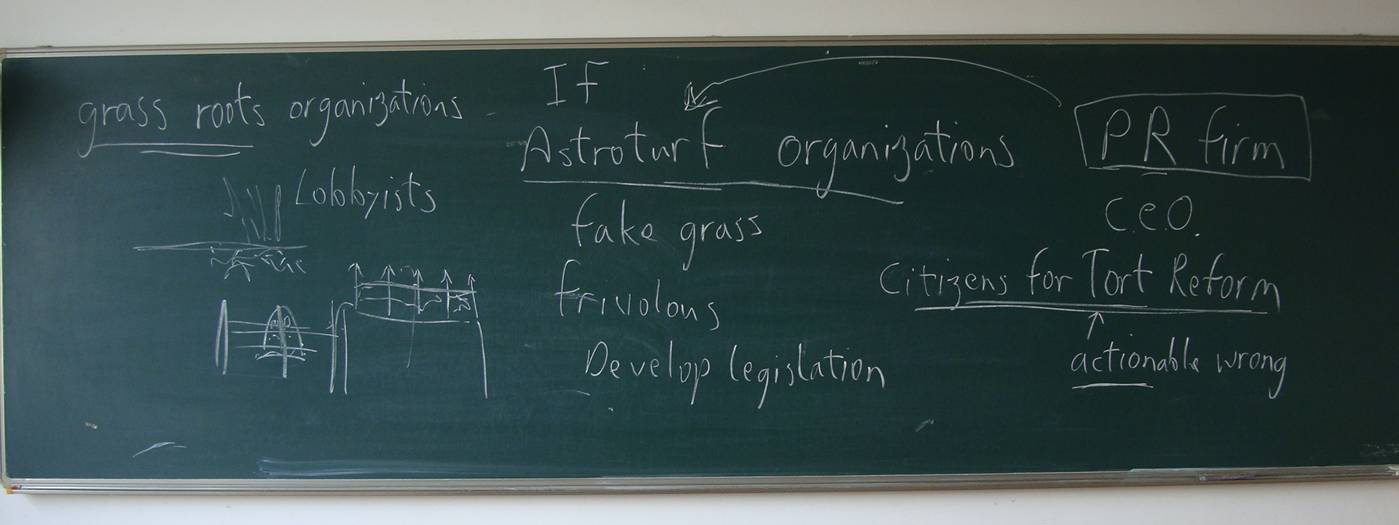
With all the preliminary explanation out of the way, the students were
divided into groups, each of which was to write legislation to create
the Transparency of Funding Bill, to be known colloquially as the
Astroturf Bill.
After all, corporations are not allowed to tell blatant lies in their
advertising, and they should not be able to tell blatant lies through
third party, or tenth party, Astroturf organizations. Finally, the
best wording for the legislation was selected and the students could
debate passing it. I have five more oral English classes this
week. I'm looking forward to refining this lesson plan.
Comment
on this Post
A night in Nanjing -
Jiangsu Has Foreign Talent
We were invited to Nanjing last weekend to participate in the Jiangsu
Broadcasting Corporation semi-finals of the Jiangsu Has Foreign Talent
Contest. Once again we sang "Tong Nian", our favourite Chinese
song. The talent ranged from the frankly amateur to polished
professionalism that far surpassed our performance. We're awaiting
word on whether we make the finals, but I'm not holding my breath.
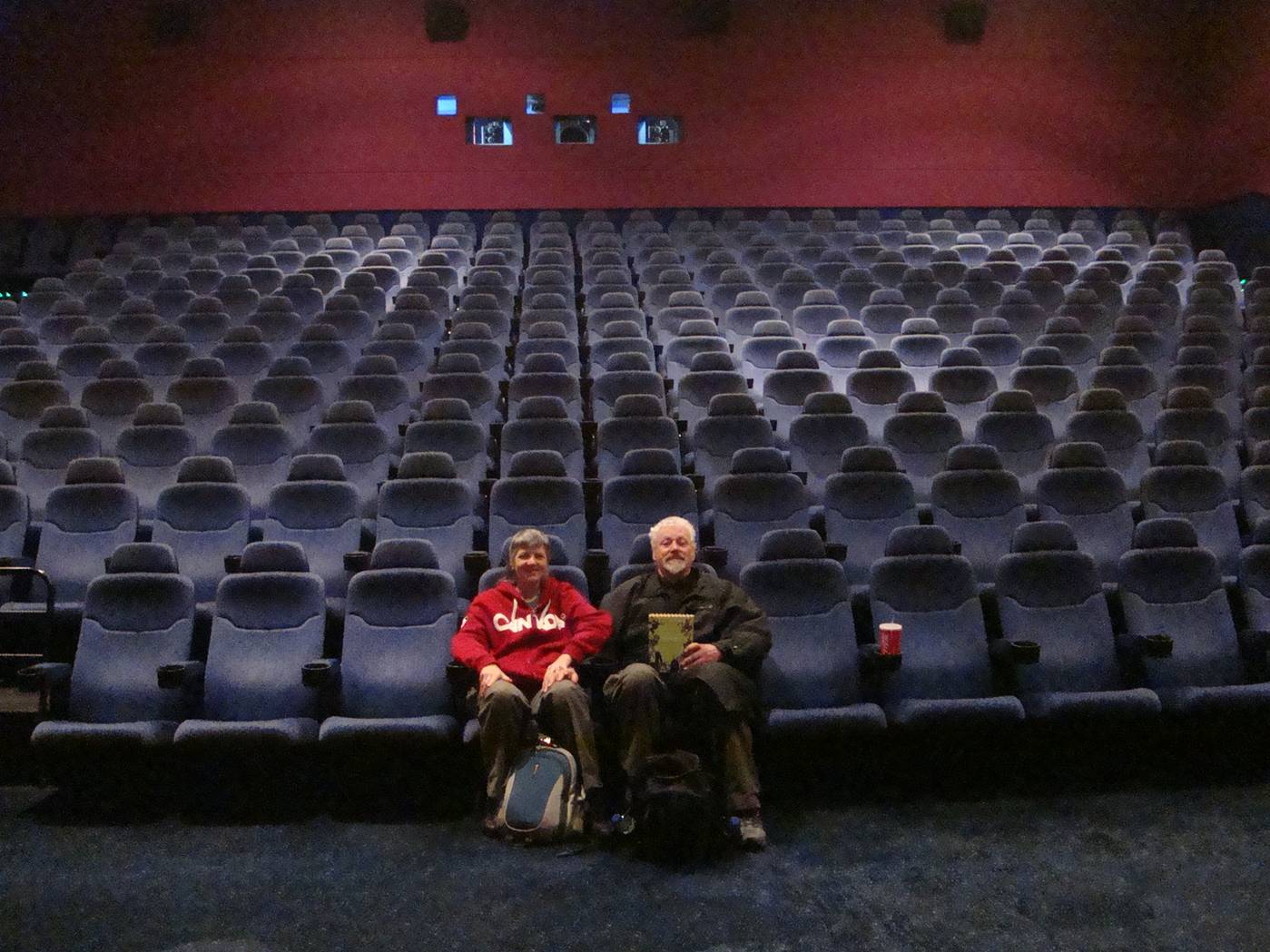
The seats did fill completely before the show started. We were
there early.
The
visit to Nanjing gave us an opportunity to meet some new friends, and
jam with some fine musicians. It may even lead to some casual
session work in the future.
One of the contestants,
Jessica, a kindred spirit, invited us along to see a morning
showing of the new Harry Potter disappointment. What a gloomy
vision it is, with consistently murky photography and a constant tone of
anger, fear, or snarling evil, in sum a joyless visit to a fantasy
world I can only describe as depressing. It seems to me that the
early Harry Potter movies at least had some fun in them. This one
smells like the death throws of a successful franchise.
Comment
on this Post
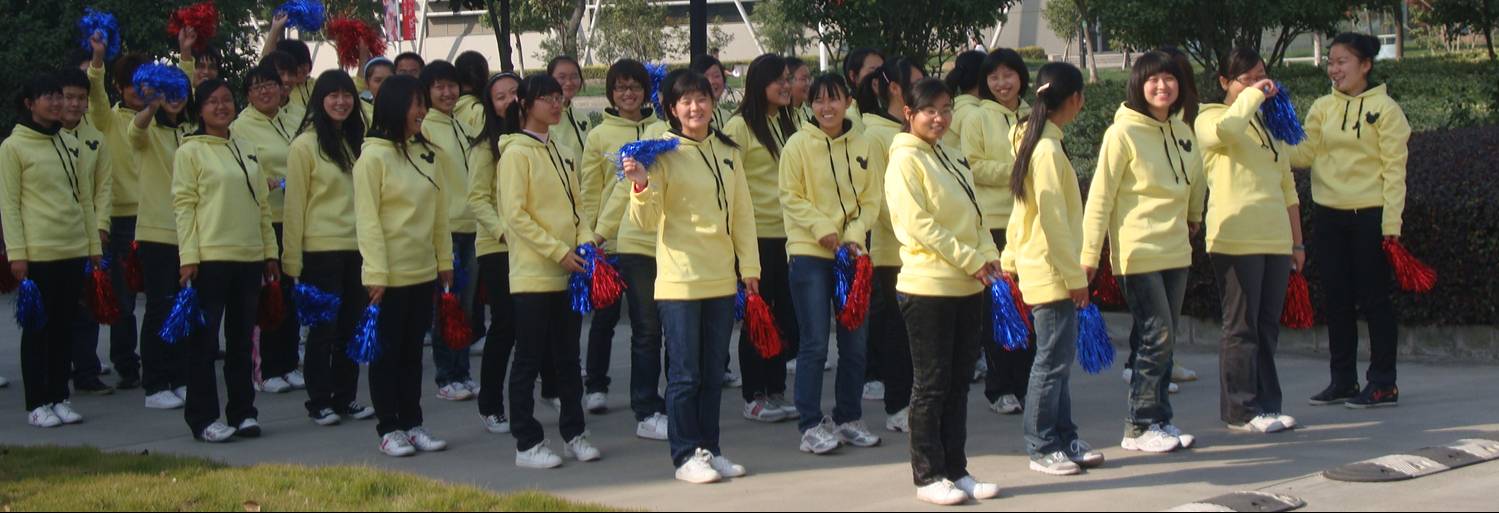
Chinese Word of the
Day: 释放
(shì fàng) = release, set free
November 17, 2010
Announcing www.BrainsofChina.com
Two years ago I put a lot of energy into my bicycle helmet campaign,
even buying a couple of hundred helmets and selling them (at below cost)
to students. I also got a lot of attention, including a full page
in China daily, an article in Li Hu Magazine, and interview by the local
TV station, and an article in the local paper. (You can read the whole
story on my
helmet initiative link) But then I got discouraged. It
seemed so futile and hopeless. Why was I doing this? Why was
I looking like an idiot trying to do the impossible?
Discouraged is an interesting word. Dis-couraged.
To lose one's courage. That's what happened. So for the two
terms last year I did nothing at all, and felt guilty about it.
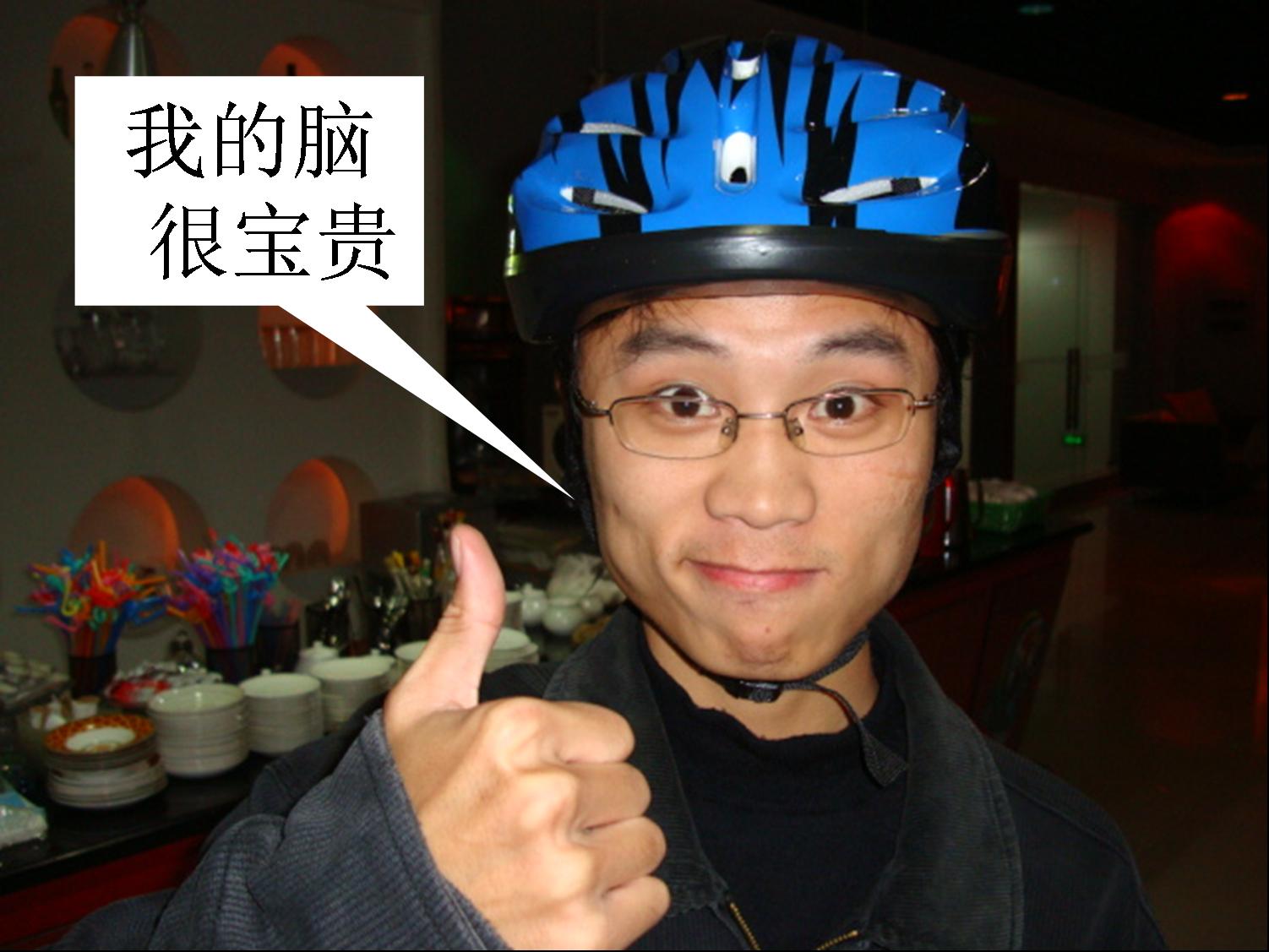
In
English, "My brain is precious."
Then this
summer I rethought the whole idea, shook off the apathy, and decided to
take a new approach. I would go big. I would start a
company, find investors, and make a lot of people rich selling helmets
in what has to be a huge, unexploited market. I managed to get
myself excited again. That was until I started working on the
business plan. As my former students, now up and coming
businessmen working in Shanghai, pointed out, my plan would not work.
As soon as I spend money on promotion, there will be people undercutting
my price and imitating my ideas and I'll never get the money back to the
investors. Once again I was ready to give up. Then, this
past weekend I had an epiphany, thanks to my conversation with John, my
old high school friend, who commented: "Maybe you can't do this as a
business and make money at it. Is that important?" It
was like a weight lifted from my shoulders. This isn't about
making money. This is about putting helmets on Chinese heads.
I don't need to start a company, or get market share for my own brand
name. I just need to get helmets on Chinese heads. And I
have a plan to do that. There is a once in a lifetime opportunity
for a sponsor of my plan to make a big splash in China, and gain an
incredibly good public image. And I'm sure that the initiative
will spread once it reaches the tipping point.
Please check out the new
website.
Any comments are welcome of course.
Comment
on this Post
Shanghai Last Weekend,
Nanjing Next
We had a great couple of days in Shanghai with my old high school friend
John and his wife Marilyn. I failed to find a new Long Tou (Dragon
head) Erhu, but that's okay. It gives me something to keep looking
for, an excuse to haunt music stores.
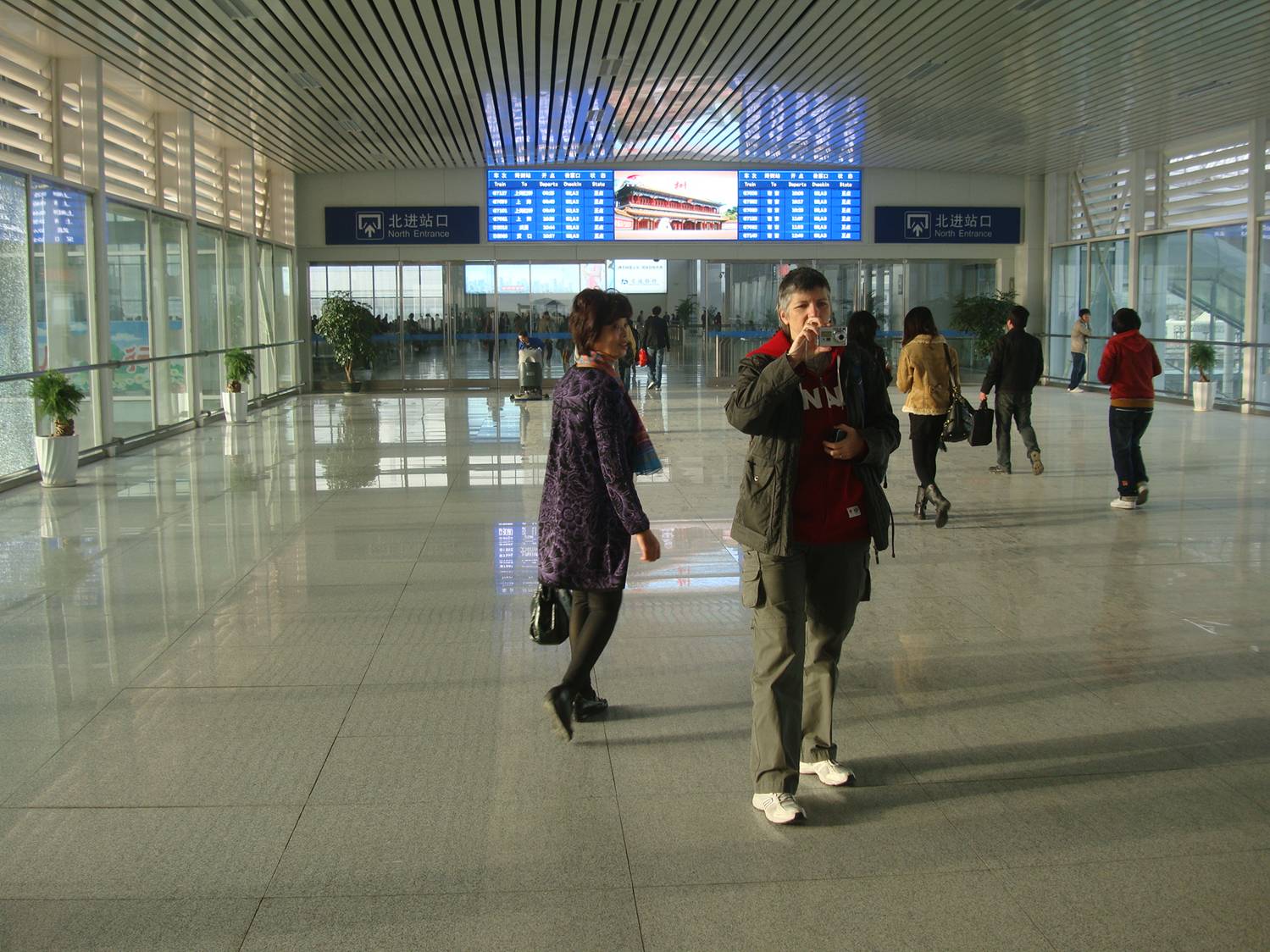
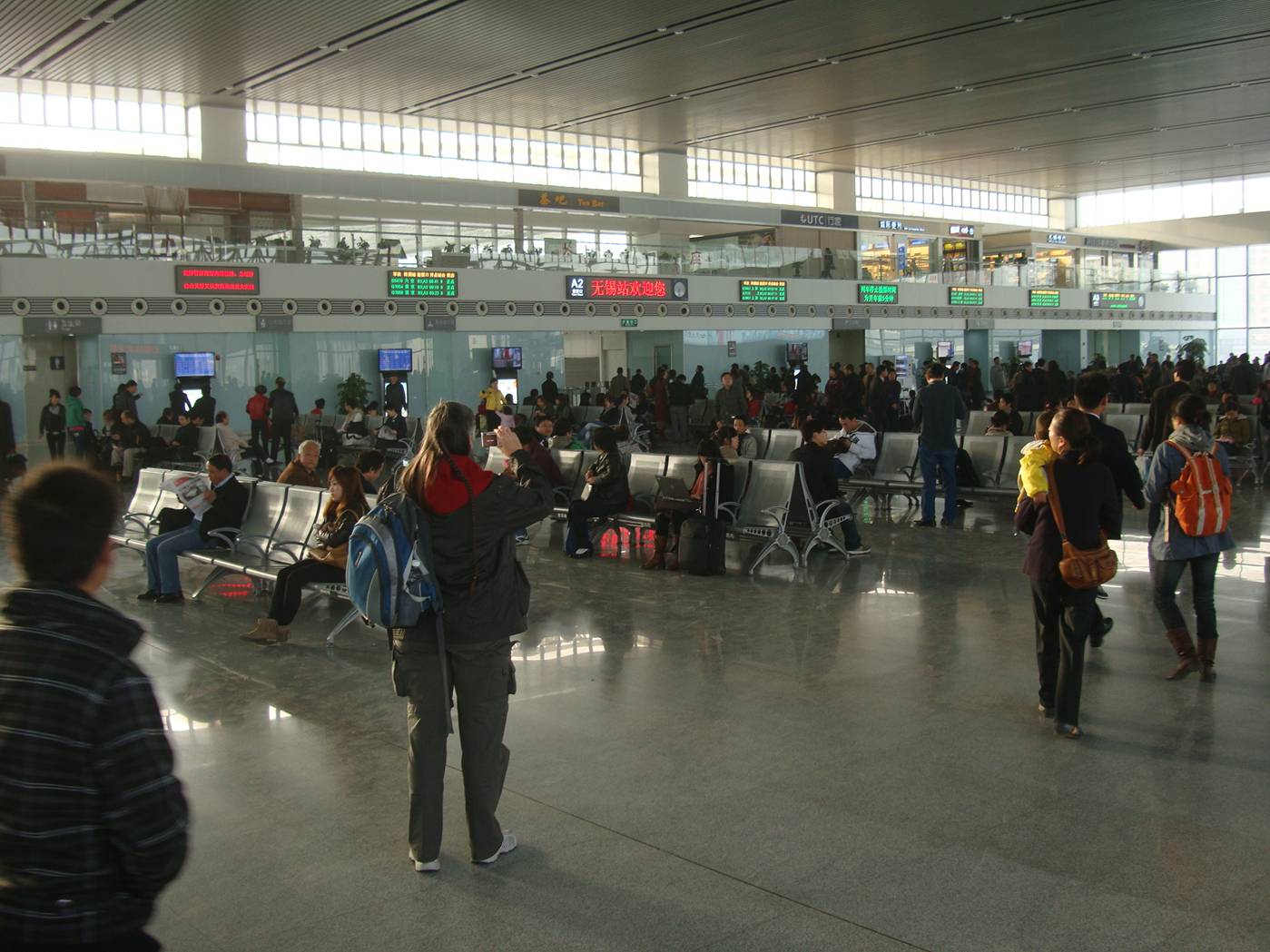
The even newer, even faster, G train to Shanghai departs from the new
Wuxi train station, which is more like an airport than the train
stations of old.
Gone are the bottle necks as the crowd rushes the ticket inspectors,
replaced with modern subway style automatic gates.

Three hundred and sixteen kilometers per hour, and it felt like standing
still. Very smooth. We got back to Wuxi in time for another
Tibetan English Club.


The new G train has a team of cleaners working on it when it gets to
Shanghai.
This young man is not working alone.
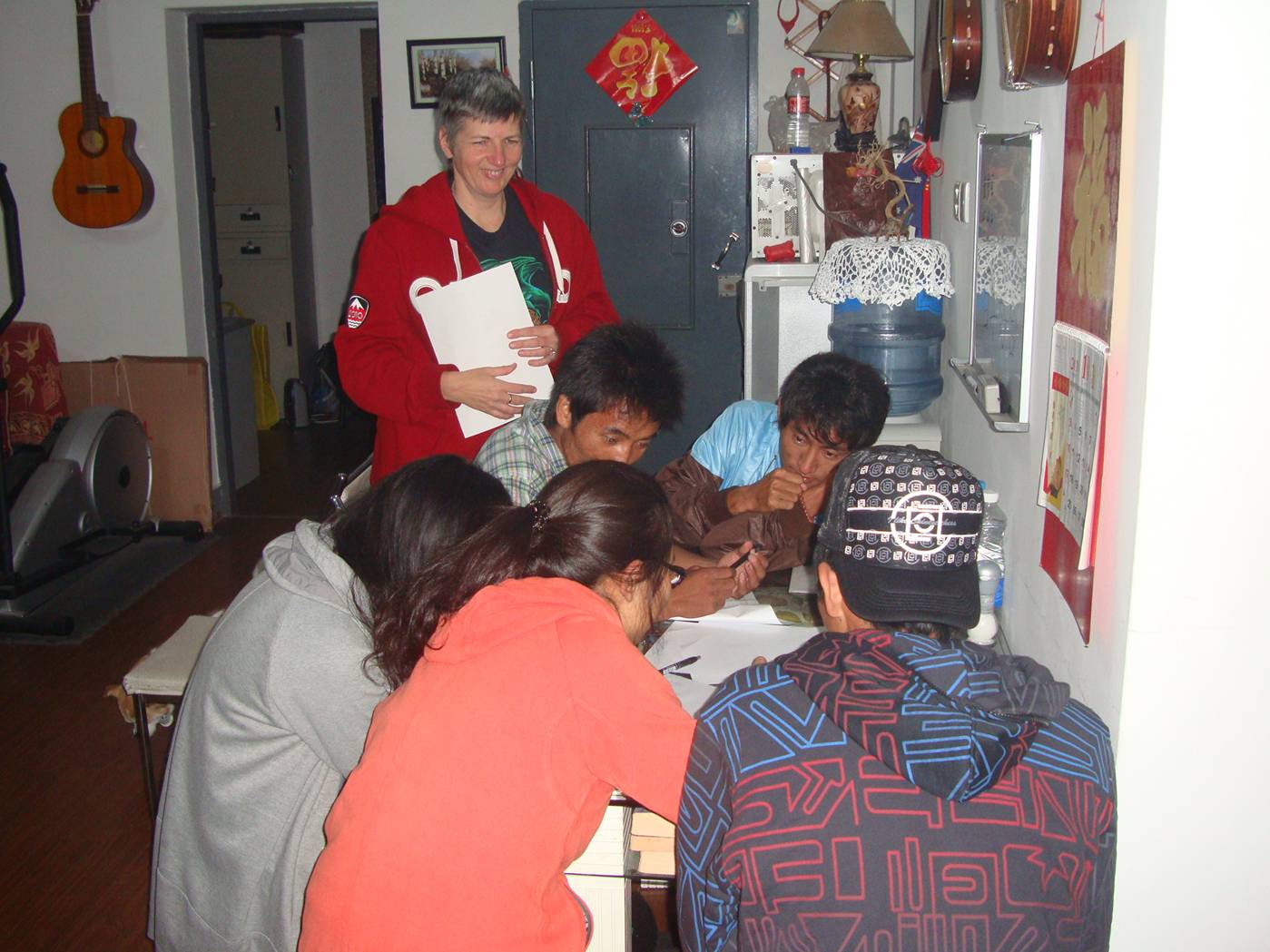
Ruth looks like a den mother as she puts the Tibetan English Club
members to work on an English exercise.
The Tibetan students seem to be relaxing a little bit, and maybe even
having fun. But they are still painfully shy and quiet. I do
see progress.
This coming weekend we've been invited to Nanjing to
participate in a foreigner singing competition. We have tickets
for the G train (one step faster than the D train) for tomorrow morning.
Comment on this Post
Nobel Peace Prize
Winner Released
Burma's military government has freed pro-democracy leader Aung San
Suu Kyi who has spent 15 of the past 21 years in prison or house arrest
without trial. The 1991 Nobel Peace Prize laureate has been a leader in
a non-violent pro-democracy movement. Burma, also known as
Myanmar, which has been ruled by the military since 1962.
According to a
CBC report:
"As many as 5,000 supporters gathered outside her residence in Rangoon
as she appeared at the gate of her compound. It took Suu Kyi, 65, about
20 minutes to quiet the boisterous well-wishers. She spoke briefly,
thanking her supporters.
The release from house arrest of one of the world's most prominent
political prisoners came a week after an election that was swept by the
military's proxy political party and decried by Western observers as a
sham designed to perpetuate authoritarian control. Critics say the Nov.
7 elections were manipulated to give the pro-military party a sweeping
victory. Results have been released piecemeal and have given the
junta-backed Union Solidarity and Development Party a majority in both
legislative houses. The last elections in 1990 were won overwhelmingly
by Suu Kyi's National League for Democracy, but the military refused to
hand over power and instead clamped down on opponents.
Canada has long supported Suu Kyi in her efforts to bring genuine
democracy to the country. She was granted honorary Canadian citizenship
in 2007. U.S. President Barack Obama called Suu Kyi one of his
heroes and a "source of inspiration for all who work to advance basic
human rights in Burma and around the world."
Comment on this Post
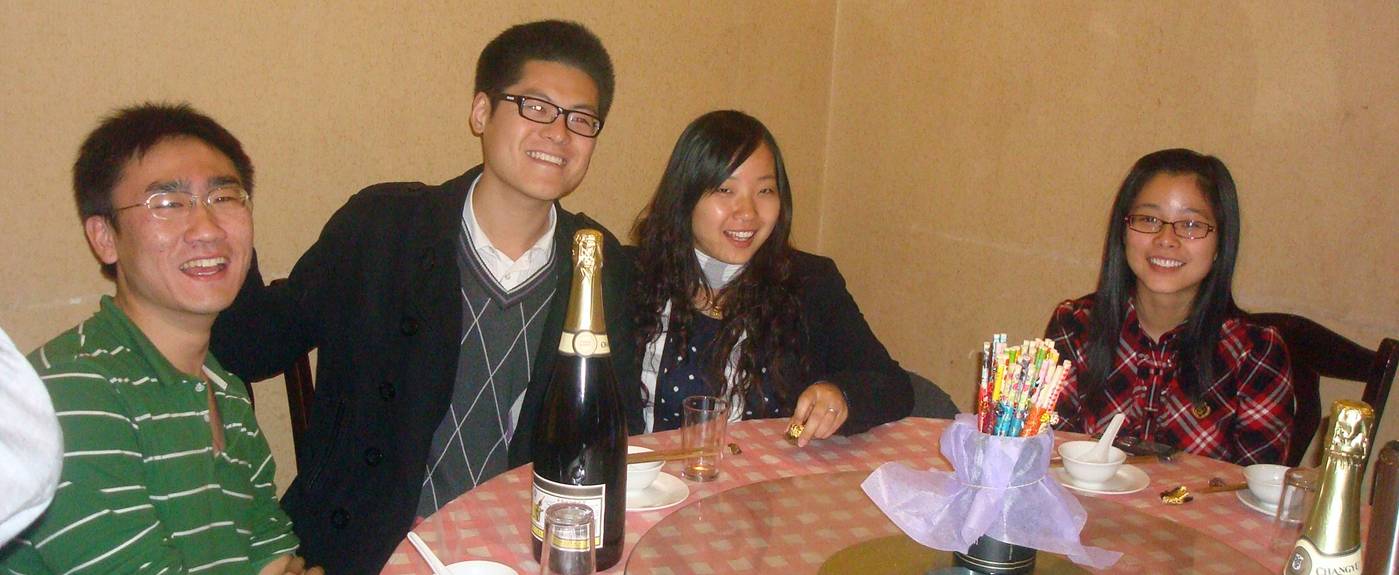
Chinese Word of the
Day: 结婚
(jié hūn literally "tie + marry") = wedding
November 07, 2010 The
Final Wedding Party (Whew!)
Are we married now? I think so. Not meaning to sound tired
of the whole idea, but it has been a rather
extended wedding, starting on July 24
in Winnipeg, but then followed by wedding celebration parties in
Minneapolis, Maple Ridge and Nanaimo in British Columbia. Last
night was our fifth wedding party, not counting the smaller parties as
we visited friends and relatives on our post-nuptial tour of Western
North America. We're very married now. It was a great party.
On Thursday last week, Jin Bo went to the restaurant with us and took
care of pre-ordering the food. As it turned out, he ordered
way
too much food for 21 people.
We
had the typical Chinese wedding feast, with about a third of the food
left for the restaurant staff. Total food bill 1000 RMB,
which at today's rate is $150.43 Canadian. Try that back home, eh.
The night before
the party, Wang Xu, our favourite computer geek, showed up with a
wedding present and an apology because he'd be working Saturday evening.
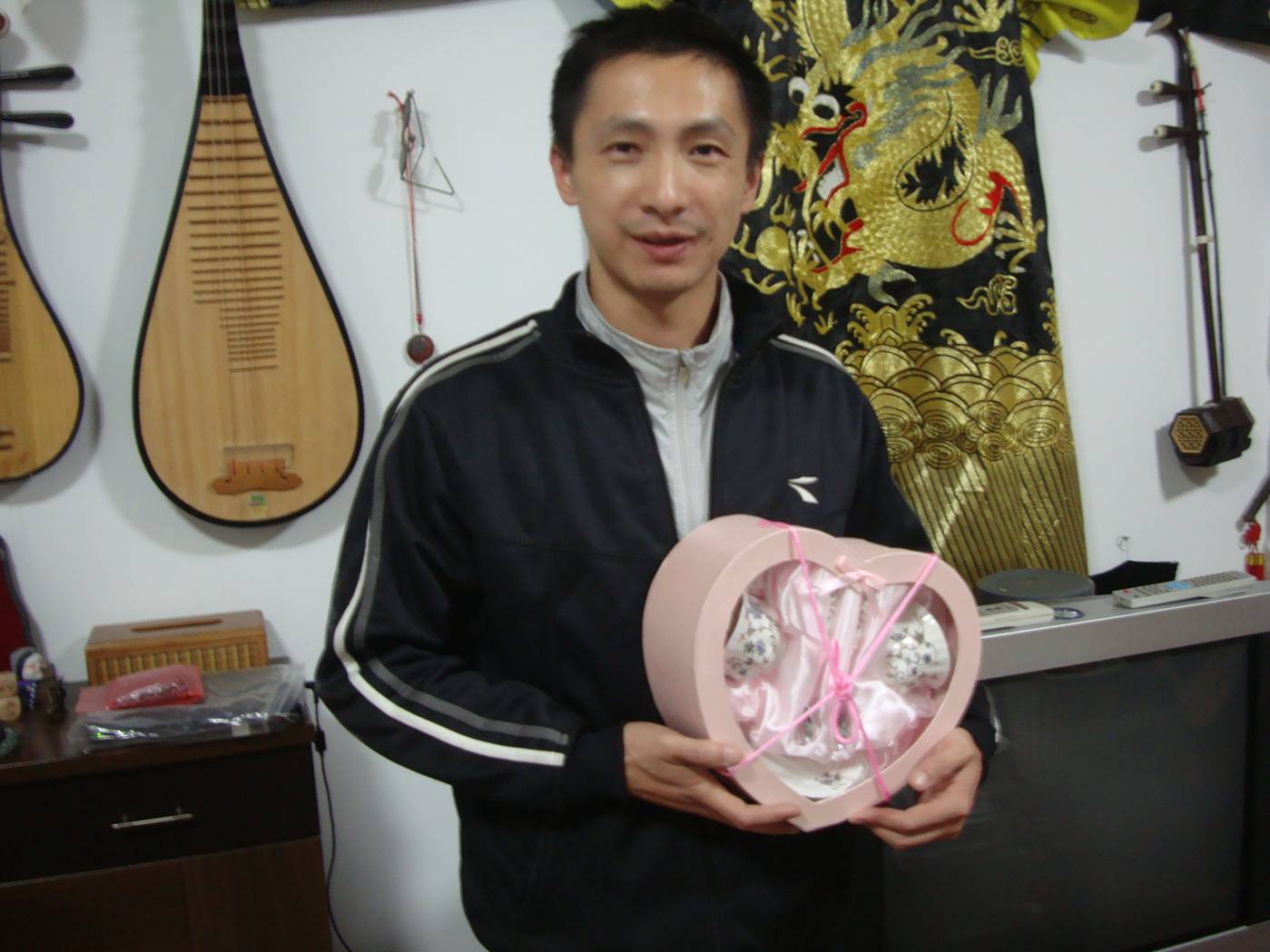
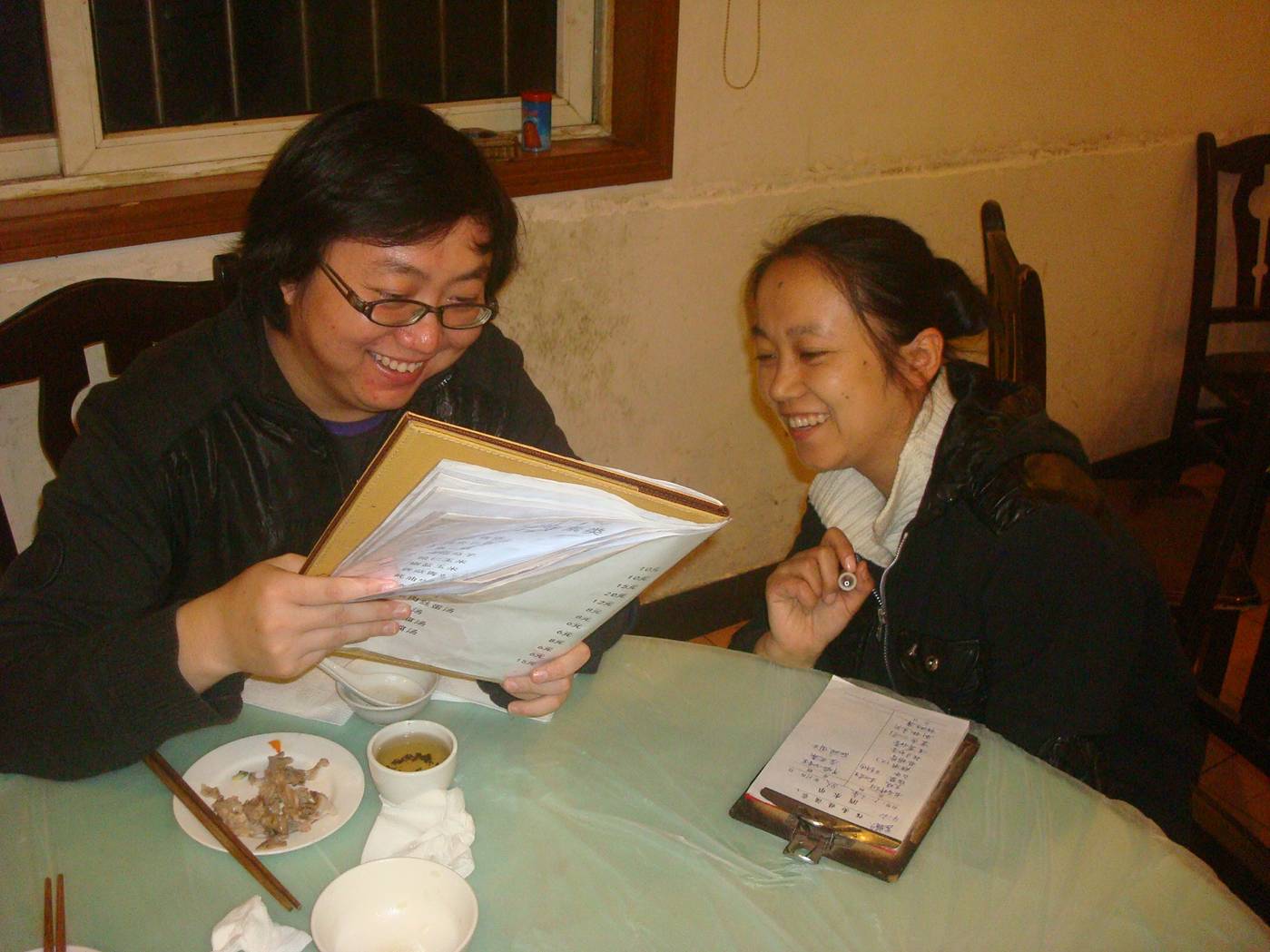
- Ruth Anderson phot
We made a trip to the Small Items Market on Saturday morning to pick up
some decorations. Ruth and Carolyn hung them while I waited to
meet our out of town visitors, Hawk, Simon and Lv Min, at the university
gates. Somehow everything, or almost everything came together on
schedule. We did miss Shirley, from the Foreign Affairs Department
office, who got lost trying to find the restaurant, gave up and went
home.
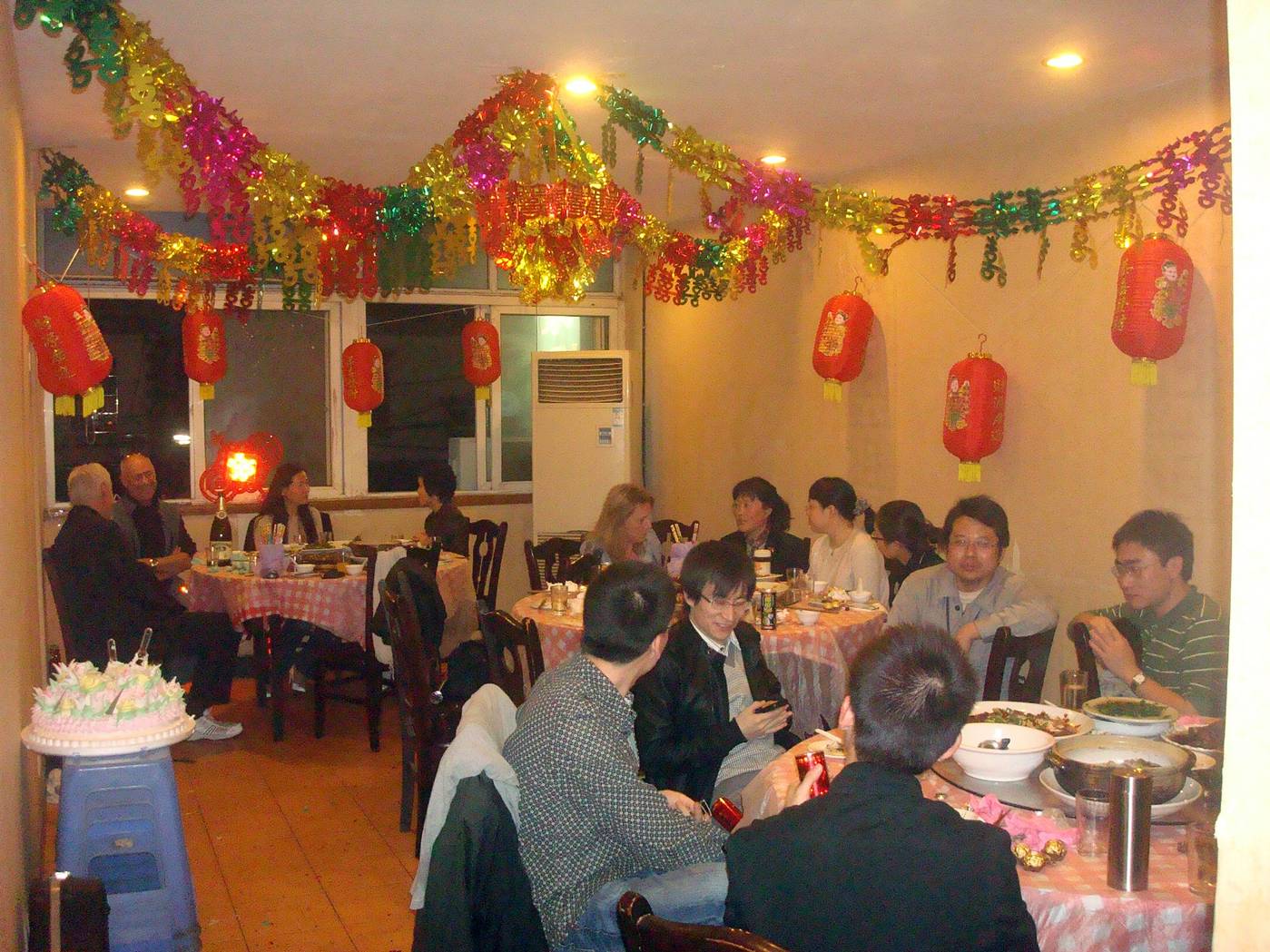
Cake, bottles of bubbly, and great friends
at our wedding celebration. Shitang Cun, Wuxi, China
- Ruth Anderson photo
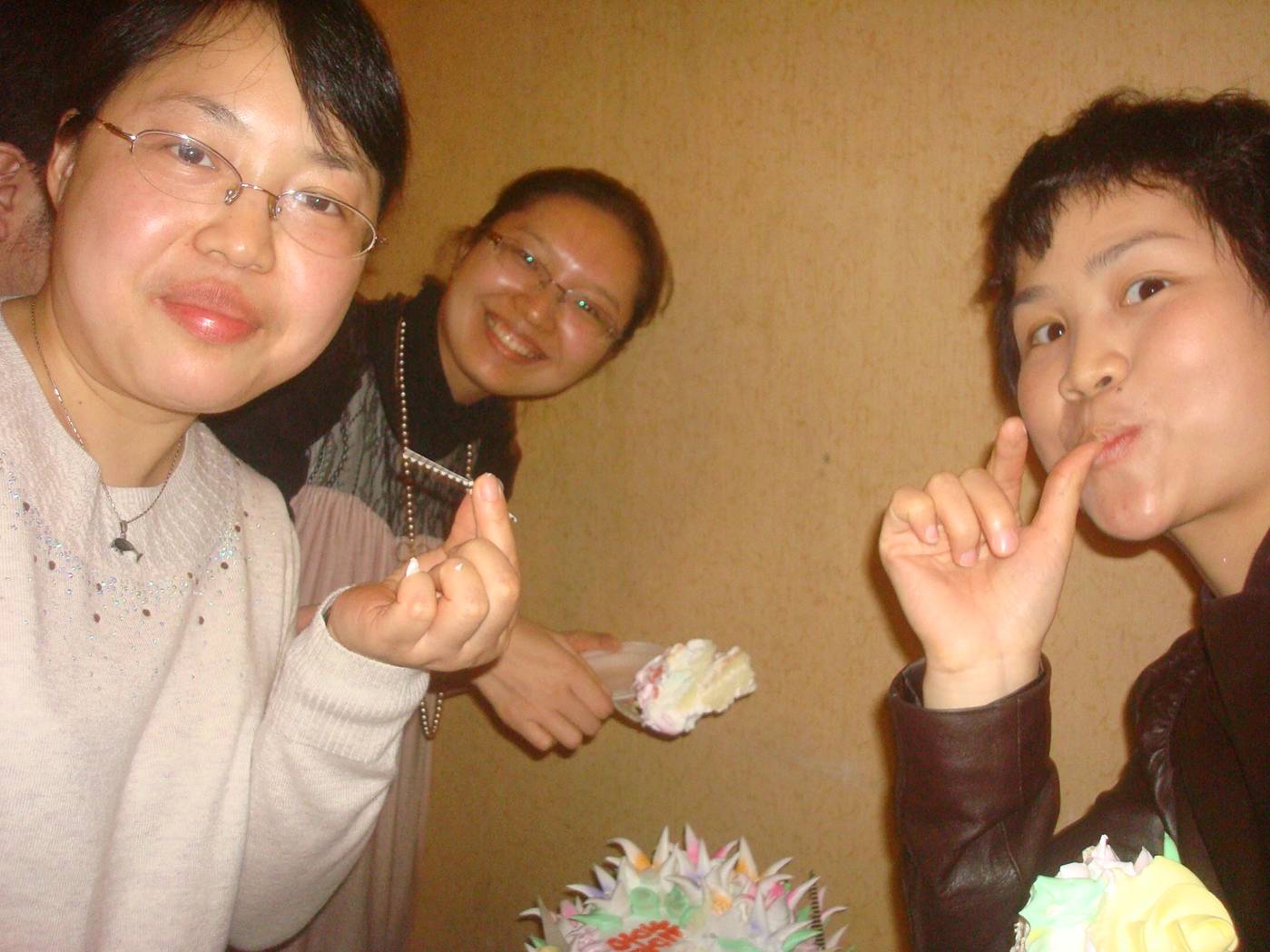
- Ruth Anderson photo
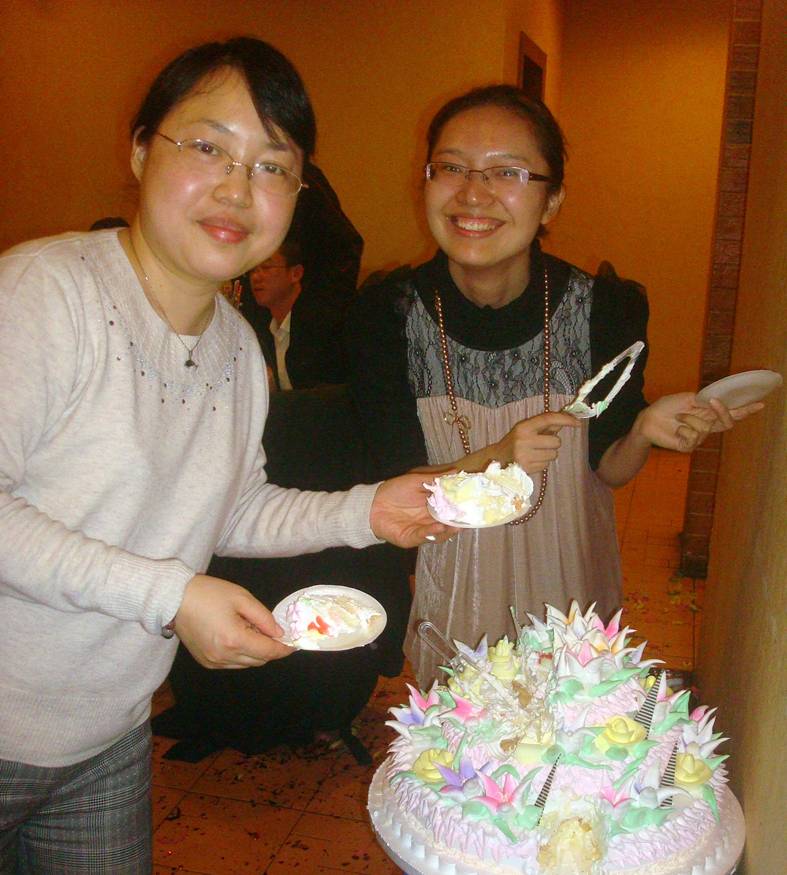
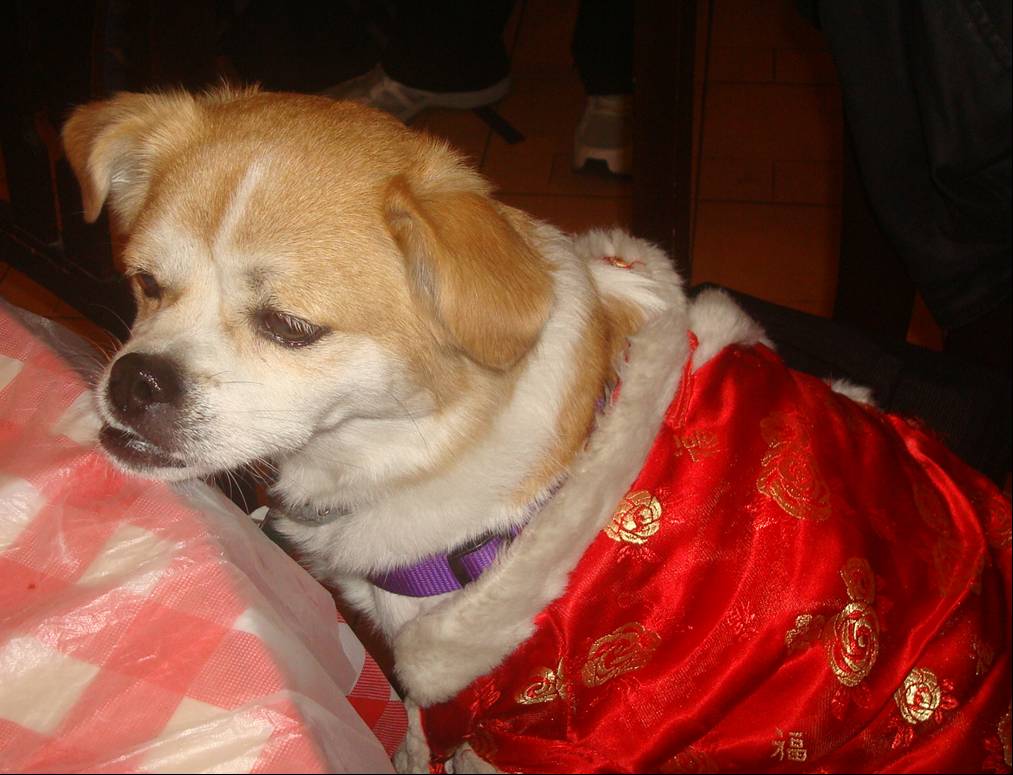
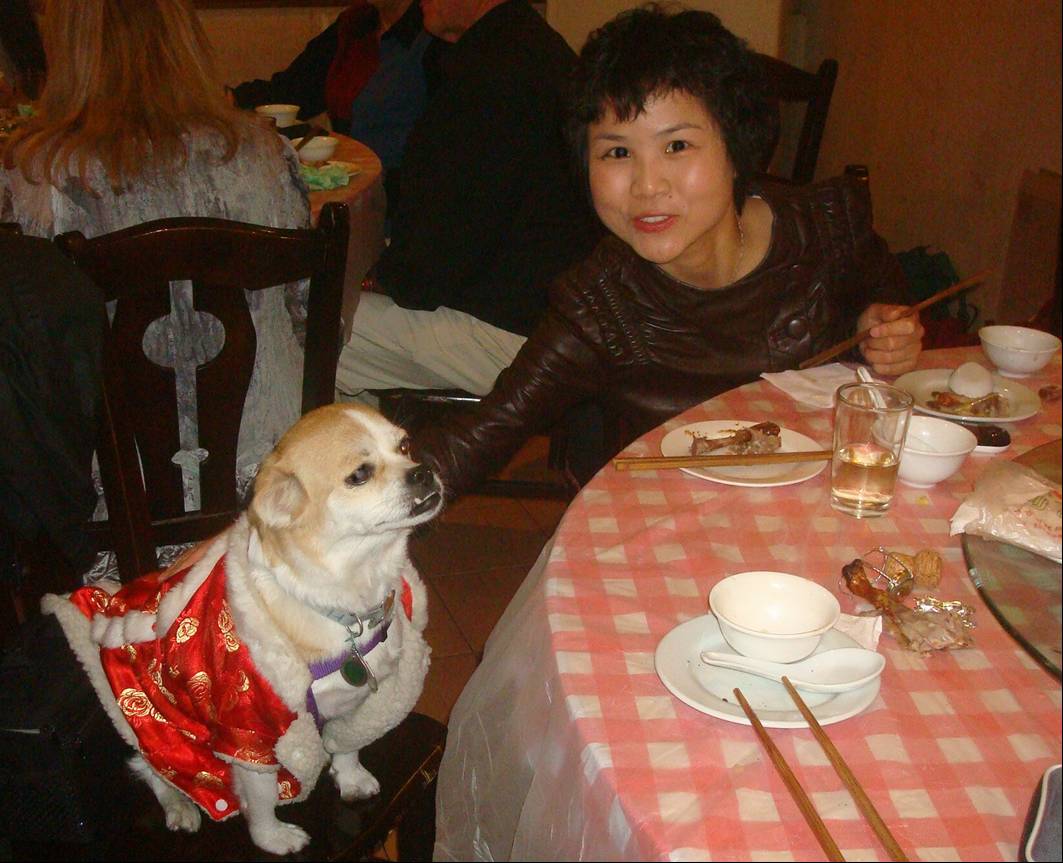
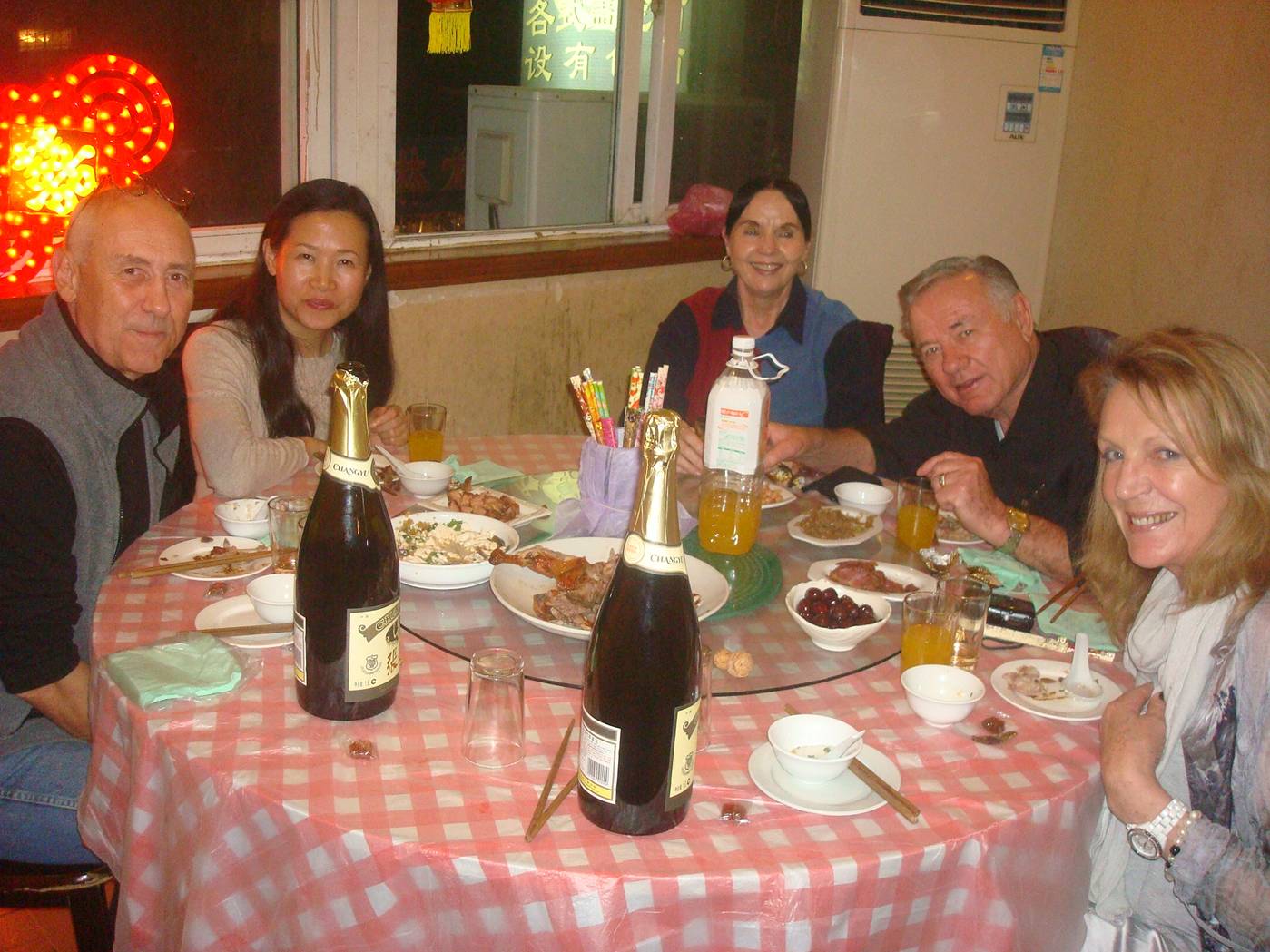
Lv Min takes a moment to comfort the
decorated dog, traumatized by the boom sticks.
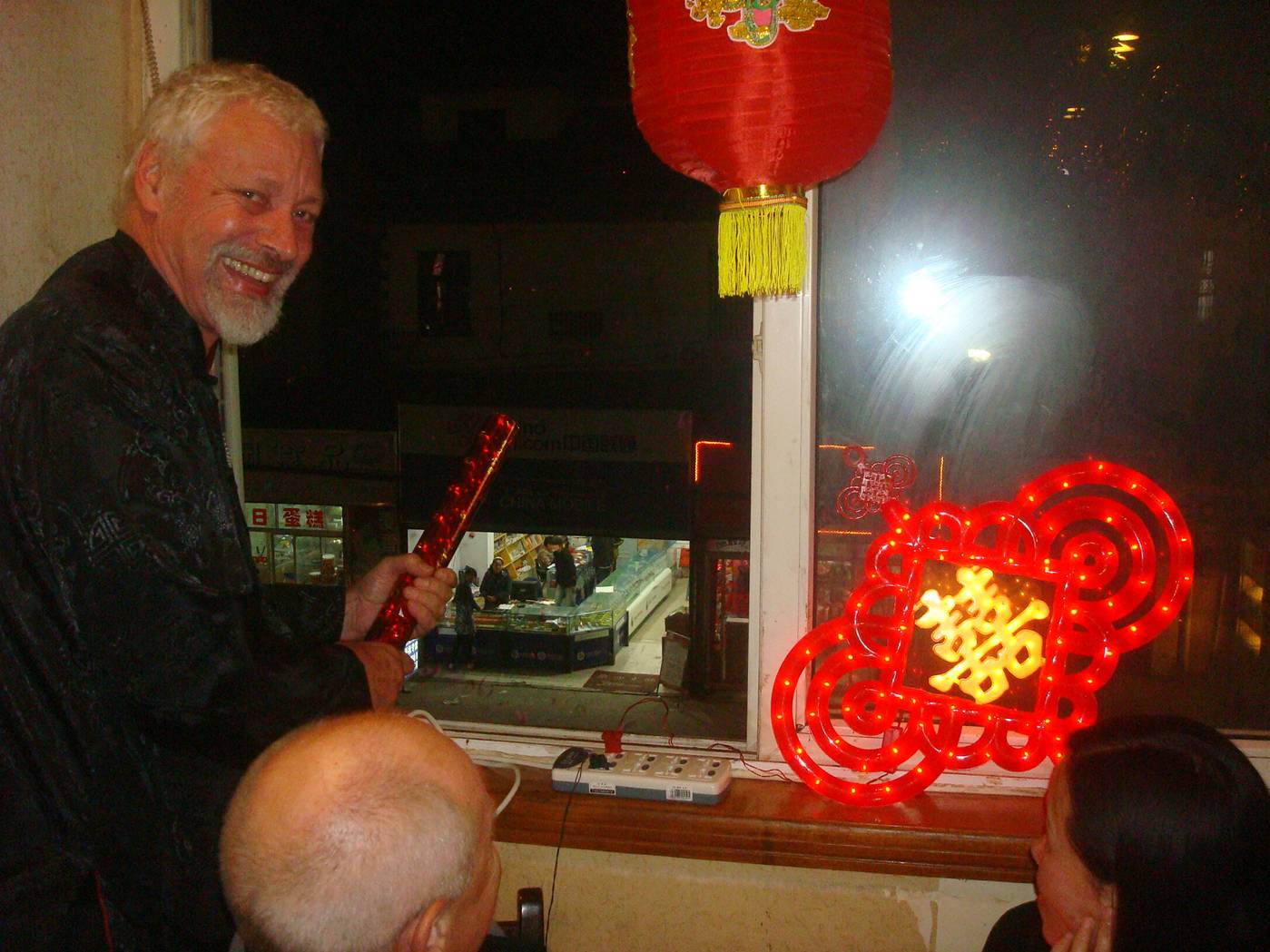
The boom sticks send out a shower of confetti, and terrified our poor
dog.
- Ruth Anderson photo
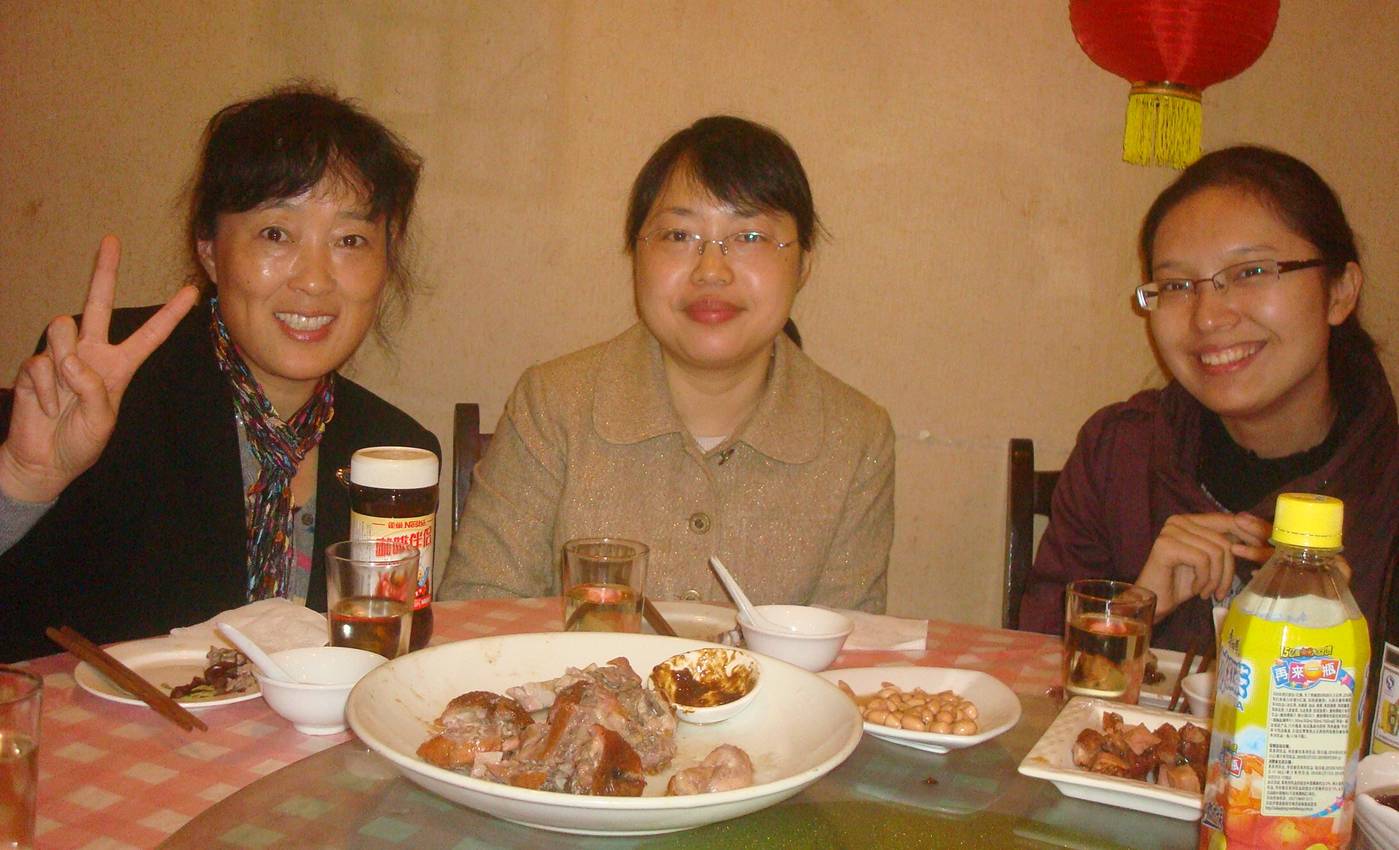
Ms. Liu, Cherry and Jessie from the Foreign Affairs office. The
people who take care of us in China.
We were very pleased to have them join us. We're told that the
norm is to make an excuse and duck out,
speaking of which the duck at this restaurant is delicious, which is why
we chose it.
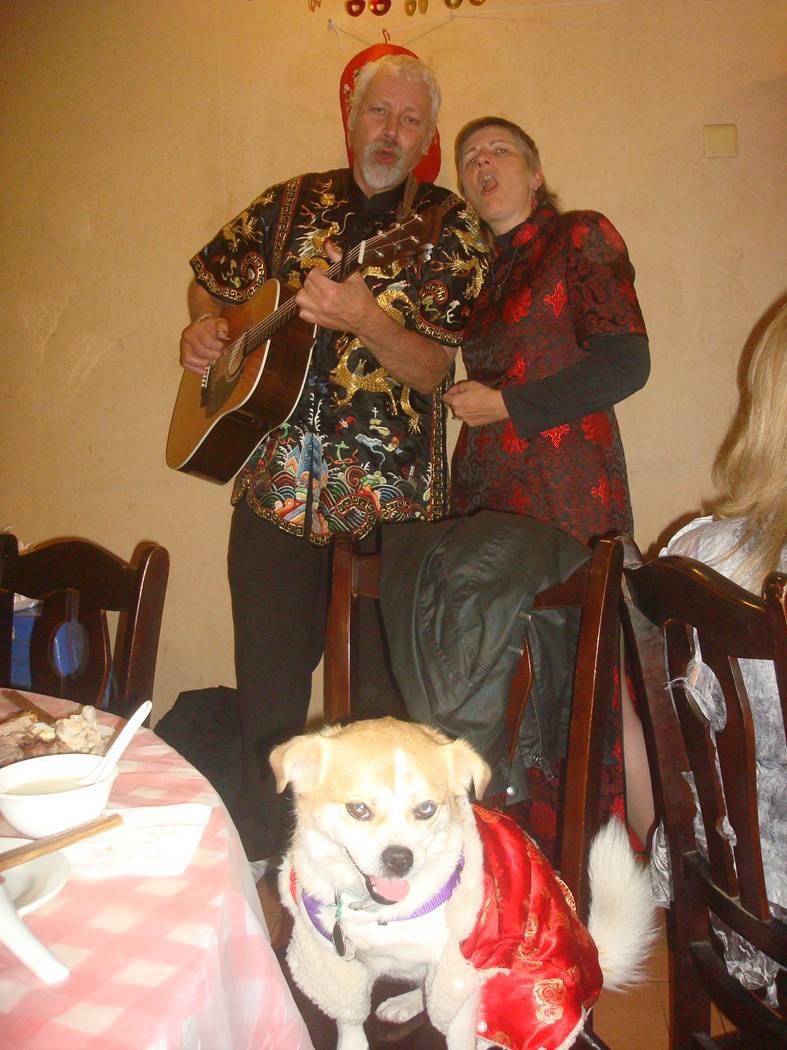
And what would a wedding celebration be without "our" song,
Pee Wee King's
classic "You Belong to Me"
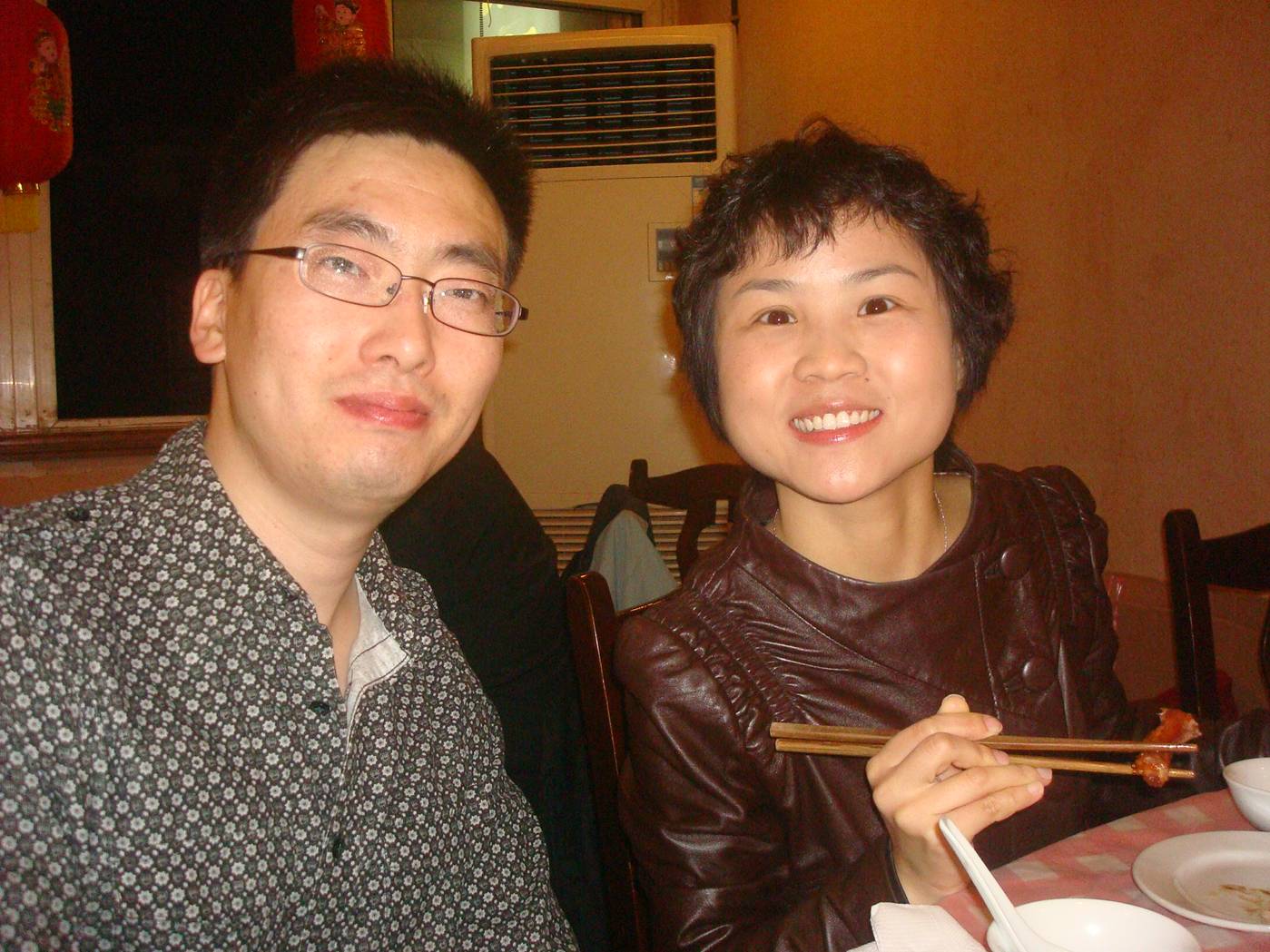
Simon and Lv Min were our students in Weihai, five years ago. They
now live and work in Shanghai.
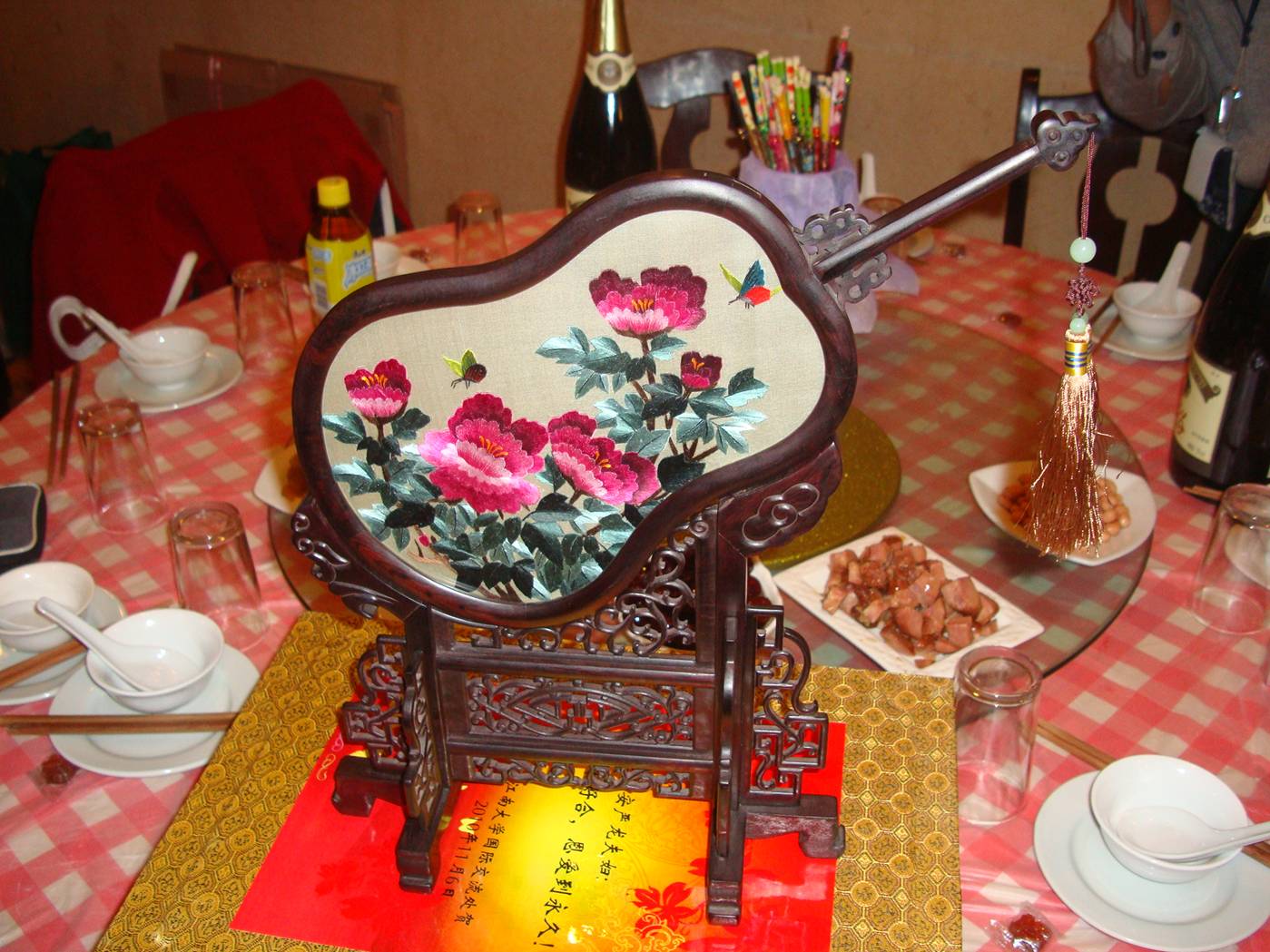
Our wedding present from the boss, Ms. Liu, a traditional carving
of a fan. Exquisite workmanship..
We left, totally satiated with duck and Wuxi paigu (Wuxi specialty spare
ribs) and fish soup and all manner of other tasty Chinese food.
But best of all was the time together with friends, three of whom
were our students back in Weihai, now graduated and working in Shanghai.
Comment on this Post
Another Wasp
I don't know what it is about wasps right now. You can scroll down
a bit or
click here
to see the one I posted recently that I saw on the walk to the
headwaters of Tai Hu. This one was battering itself against one of
the windows on the stairwell of Teaching Building 2.

I just really appreciate the paint job. Look at those colours,
that pattern. Almost enough to make me believe in a designer, if I
didn't know better.
Comment on this Post
Hulu Si Salesman in
Shitang Cun
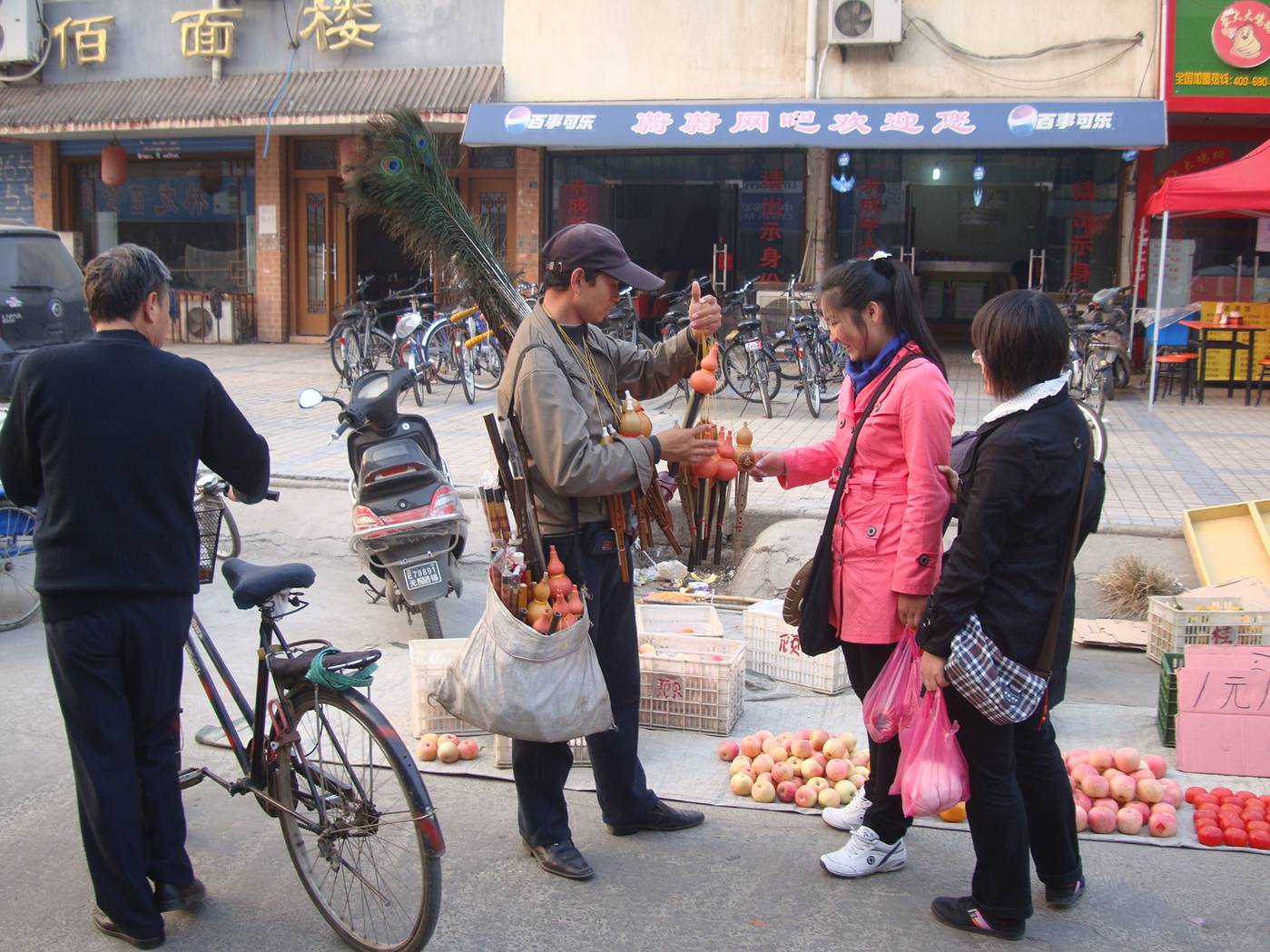
Some things in China are still a mystery to me. Like how this
young gentleman manages to wander into a the little village near our
campus, and apparently find customers for his ambulatory musical
instrument store. He was demonstrating the 葫芦丝 hú lu sī
(the traditional gourd based reed flute) as he walked, and that's what
caught my attention. Unfortunately when I switched to video, my
phone rang and other duties called me away. So I didn't get to
record the haunting melody that announced his arrival. He also
sells 笛子 dízi, bamboo flute, and 二胡 èrhú, the two stringed Chinese
violin that has depleted the Burmese python population of China to the
point of extinction. No worries though. Those snakes are
doing just fine in the Florida everglades now. I've been looking
at importing them back to China.
Comment
on this Post
Results of Another
Informal Student Poll:
My News Reading Classes read
"The Naked Truth" -The
Economist May 3, 1991,
about strippers in San Francisco who fought to be unionized, as a
class assignment. The subject is shocking to them. Stripping
is illegal in China. I took informal class polls on their
attitudes and below are the results from my English majors.
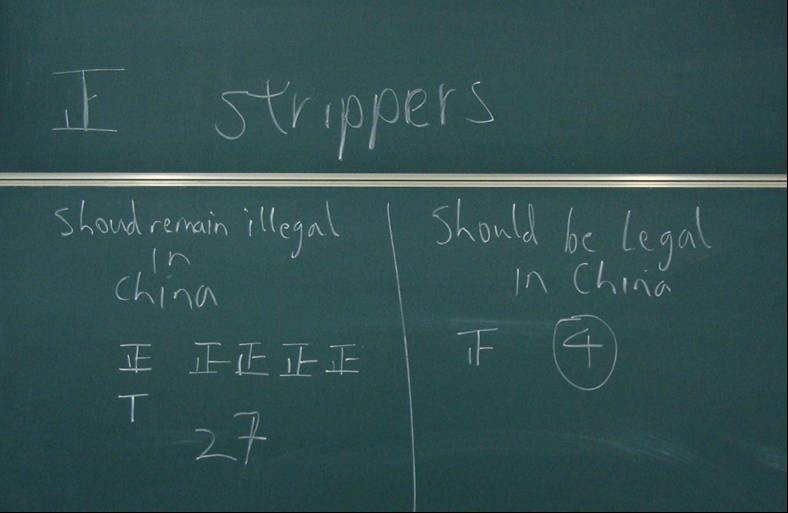
Once again I'm reminded that my students are a very conservative bunch,
and representative of the more traditional Chinese culture.
Keeping in mind that China has recently
jailed a man
for three and a half years for organizing orgies, and that
such activities a mere thirty years ago could carry the death penalty, I
suppose we should be surprised that there was any dissent at all
in the class.
My Non-English Majors were just slightly more liberal.
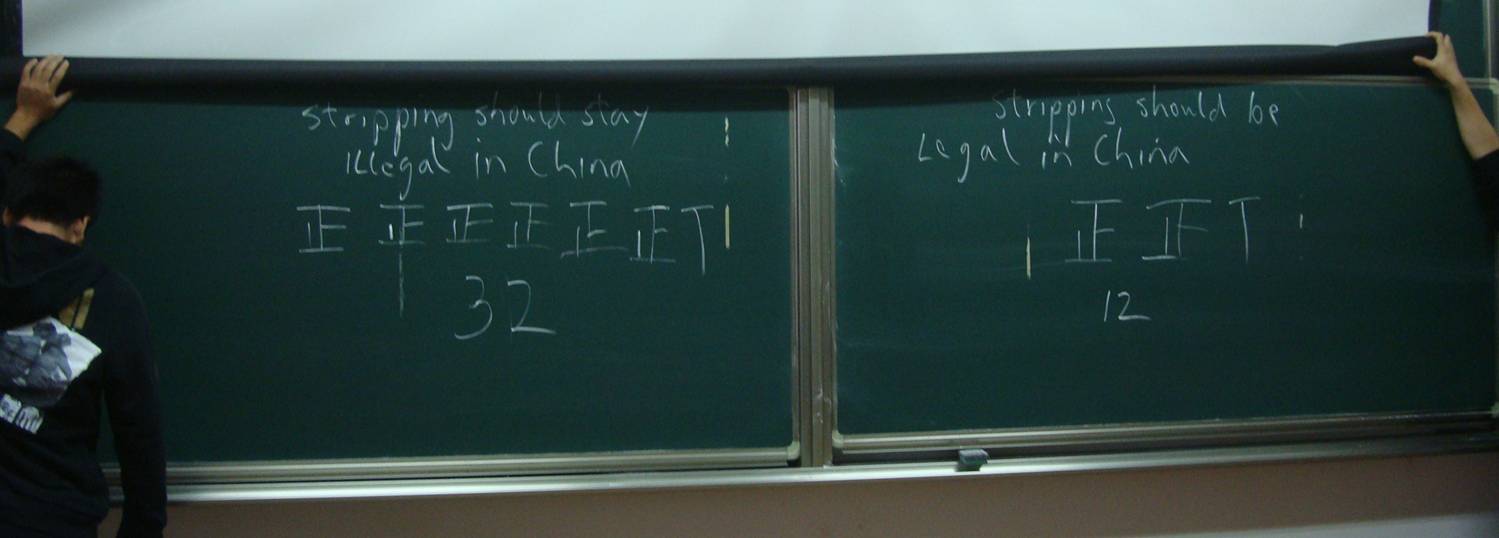
China has always felt like the Canada of my childhood, in everything
from prices and standard of living to attitudes. I remember how
conservative my own culture was back in the fifties and the culture wars
over such trivia as hair length and pants on girls. China seems like
that now, and my students confirm this impression. It's going to
be interesting watching the changes that are coming to this country.
This article did stimulate some interesting discussions and one rather
extended email conversation with a student.
I think back to my first few years at university.
I remember finding myself arguing political positions and then suddenly
realizing that the opinions I was expressing were not my own. I
had, in fact, never thought about the issues. I was parroting the
conservative views of my father. That was embarrassing, and of
course for a while my opinions swung far the other way, so that my
father was soon complaining about the "pinko professors" rotting my
mind. It takes time to find a balance. It's wonderful to see
some of my students starting to look for theirs.
Comment
on this Post
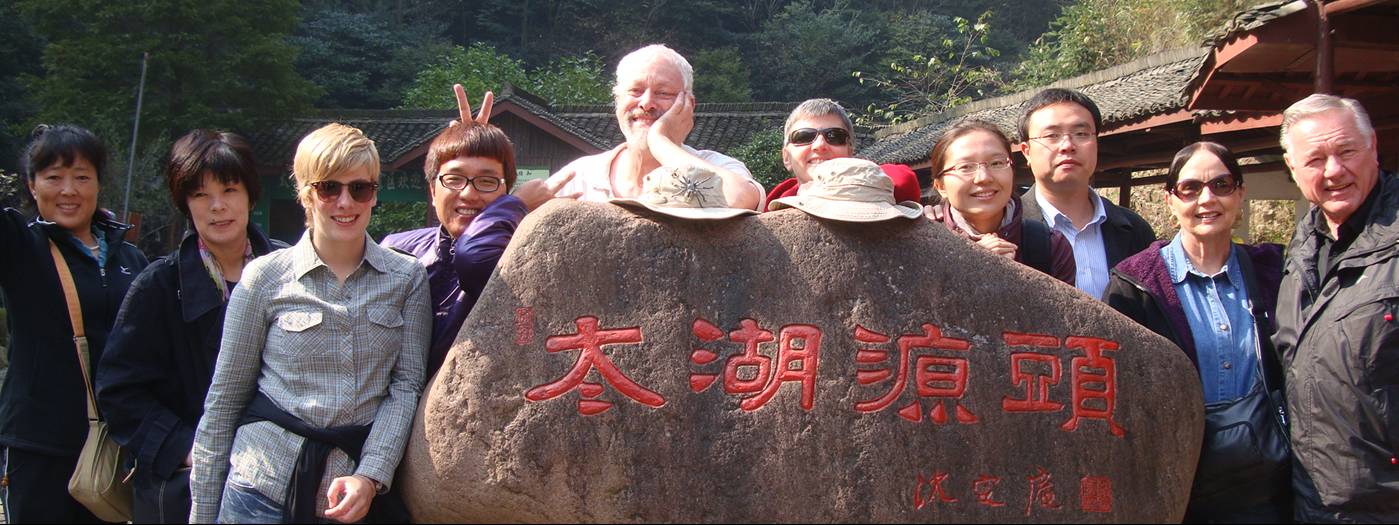
Chinese Word of the
Day: 游览
(yóu lǎn literally "travel + exhibition") =n./v. go sight-seeing;
tour; visit
November 02, 2010
Another Term, Another Tour
Gotta love this administration. Last
weekend,
as they have each term for our past four years at Jiangnan University,
the Foreign Affairs Department took us on a sight seeing tour.
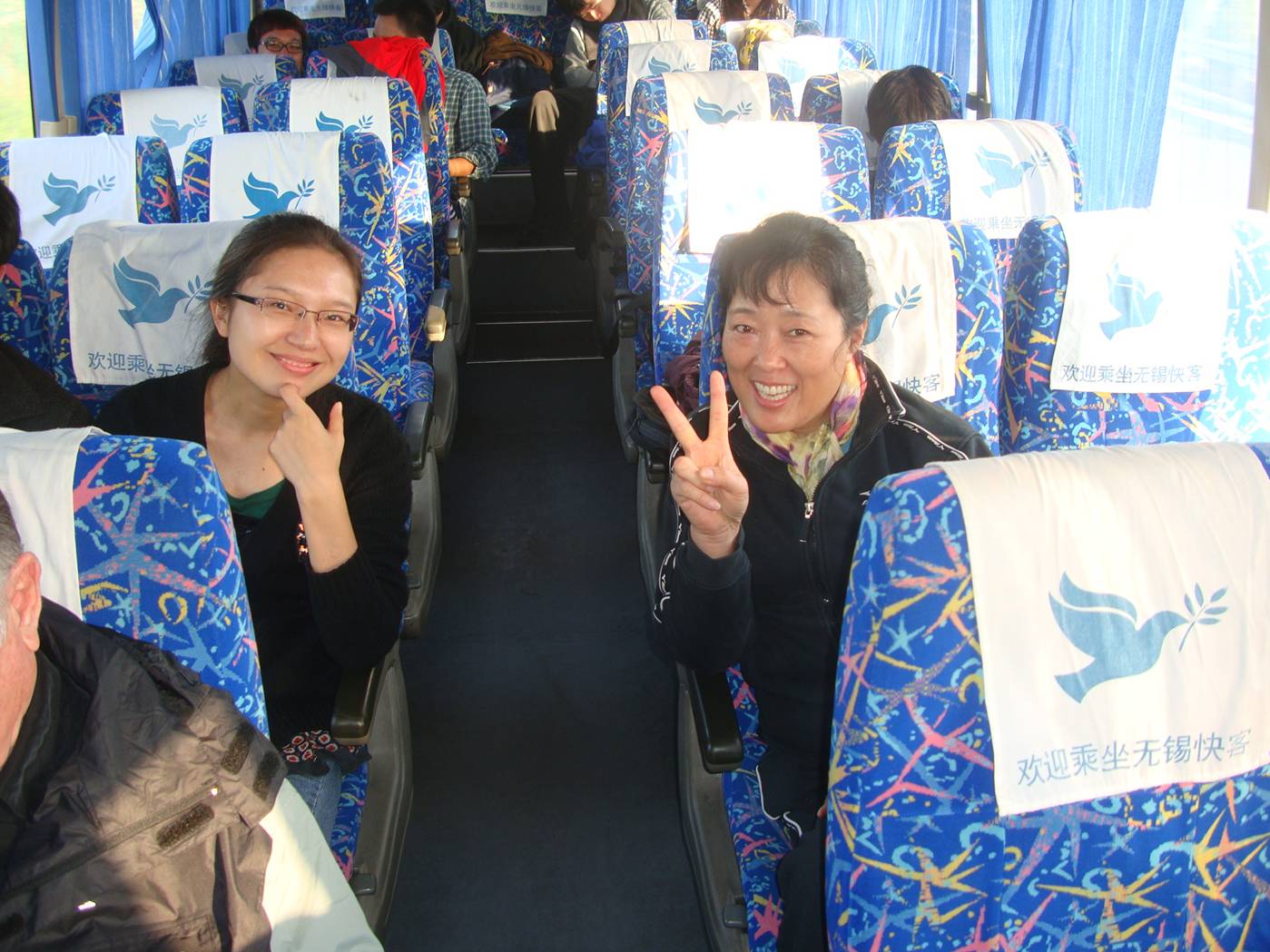

With our new
iPads for distraction, the five hours on the bus passed painlessly.
I studied Chinese, read "Peter Rabbit" in the original Chinese, played
Chinese chess, and slept. Before we knew it we were at Daming Shan (Big
Clear Mountain) in Zhejiang Province.
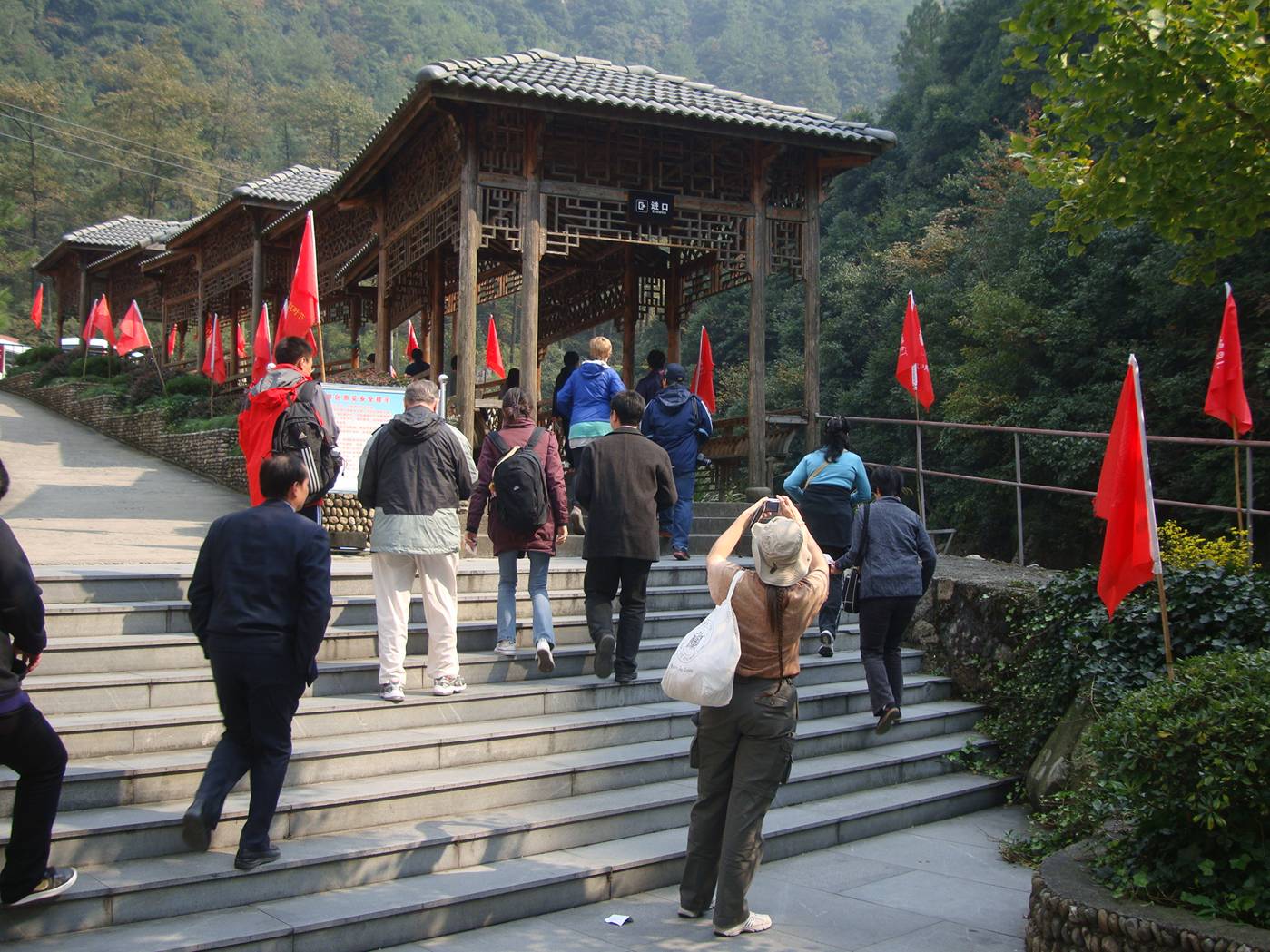
The
entrance to Daming Shan (Big Clear Mountain). China's mountains
have all been civilized over the centuries.
Not like climbing a mountain back home in B.C..
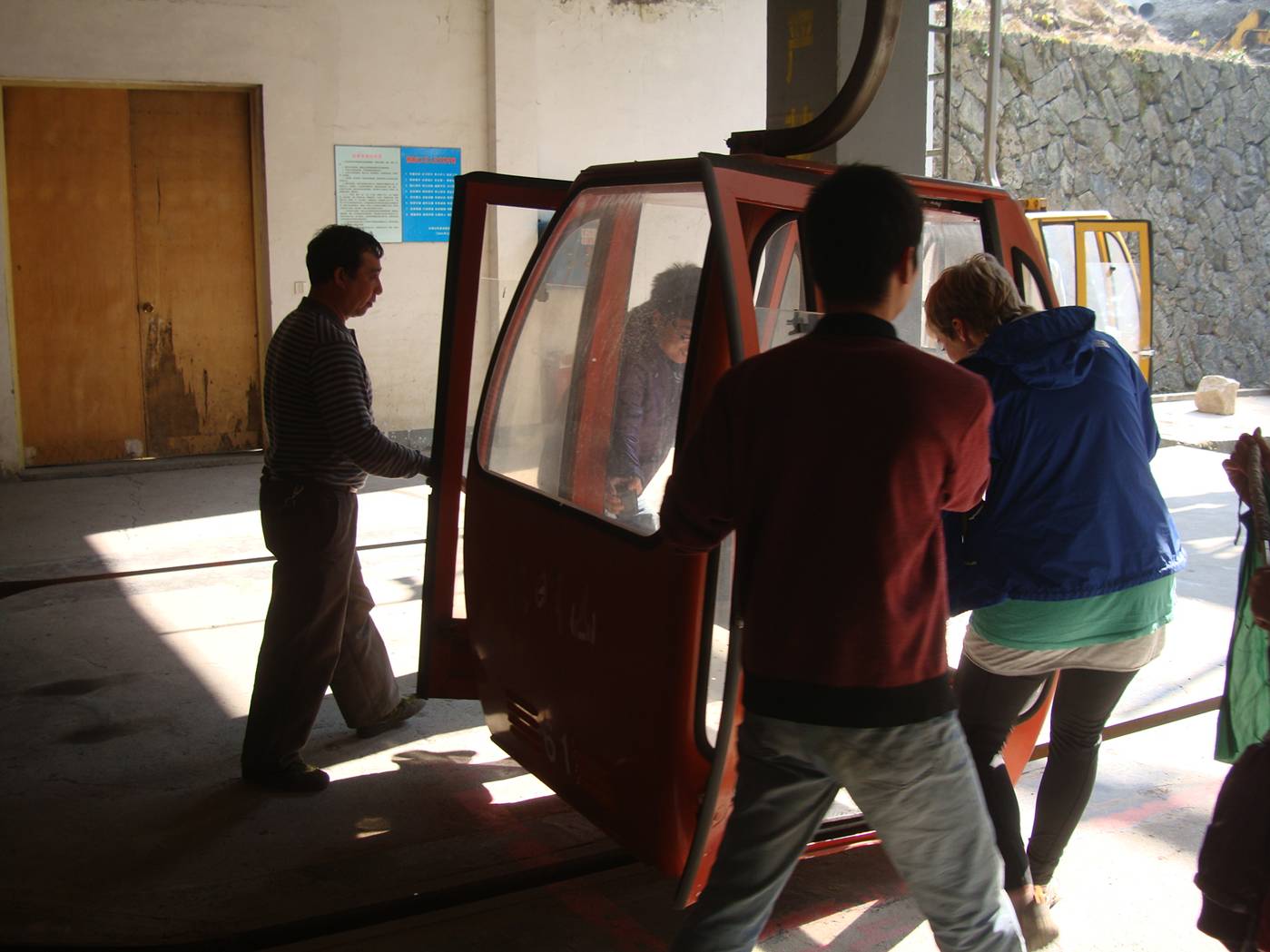

First
of all there's the chair life. This one is rather old and doesn't
stop to pick up or drop off passengers.
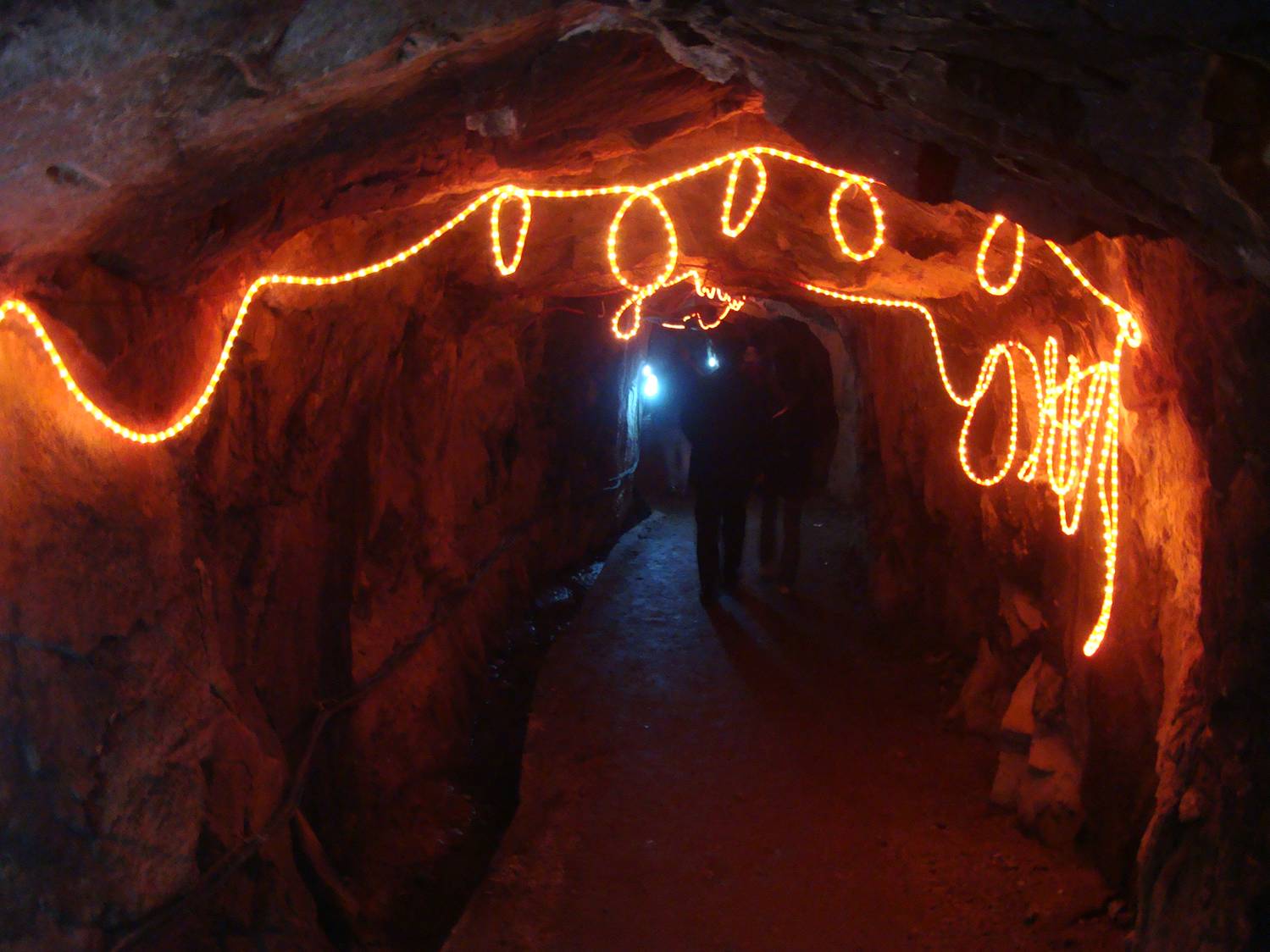
At
the top of the cable car is the entrance to Cave of Ten Thousand Meter
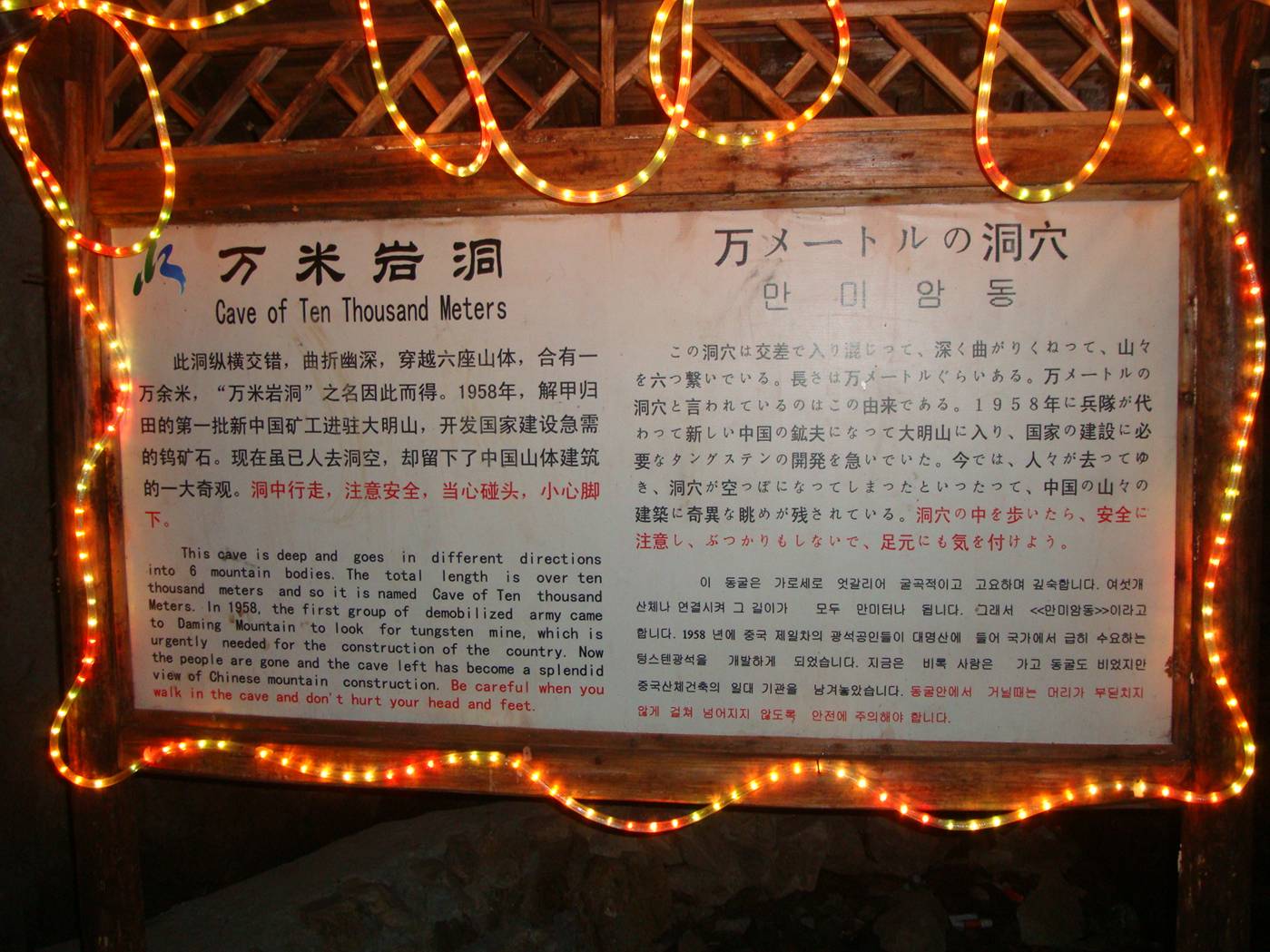
I
could have used the warning before I got to the sign. With my hat
brim blocking my view,
I was an accident waiting for the low section.
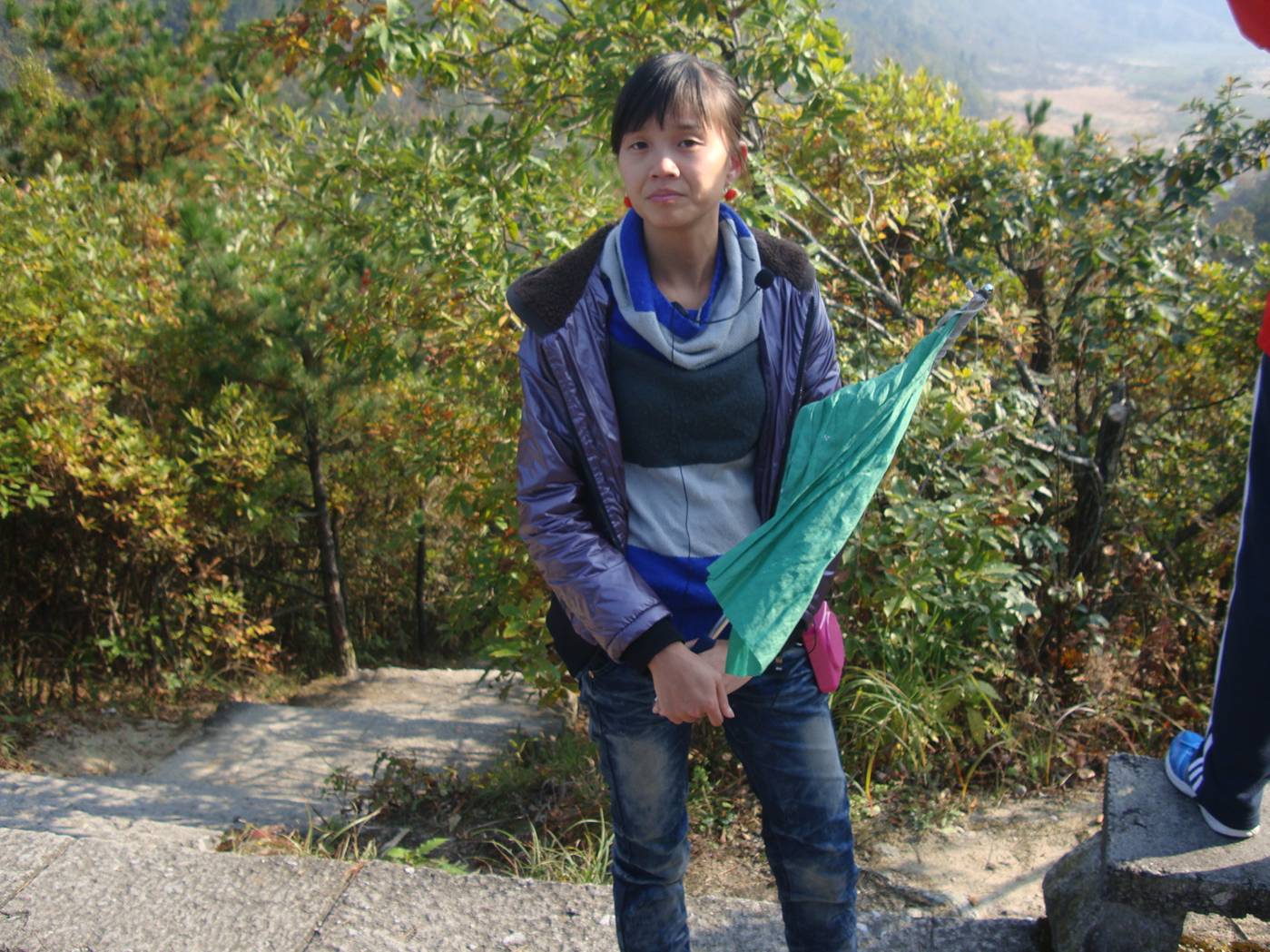
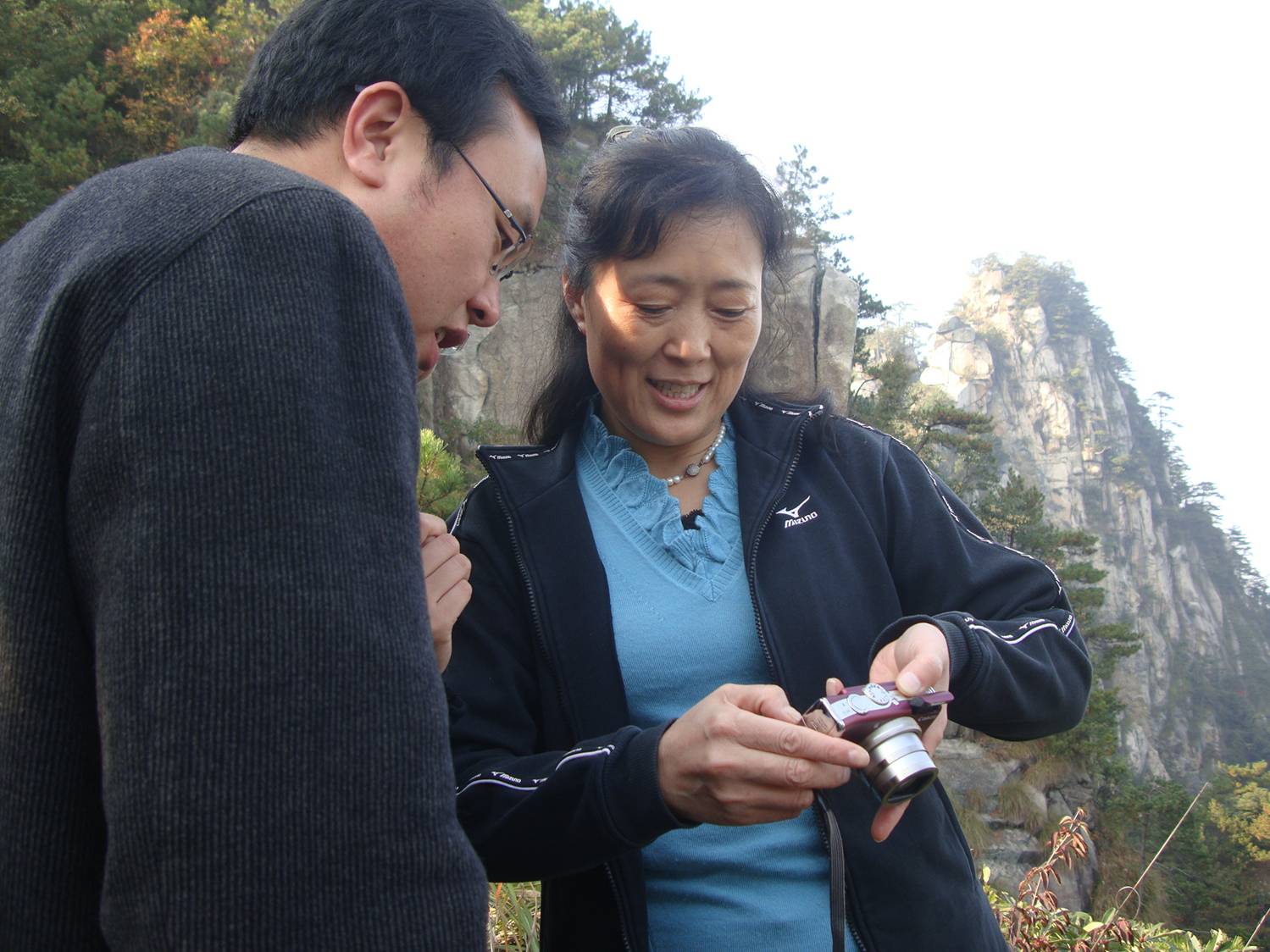
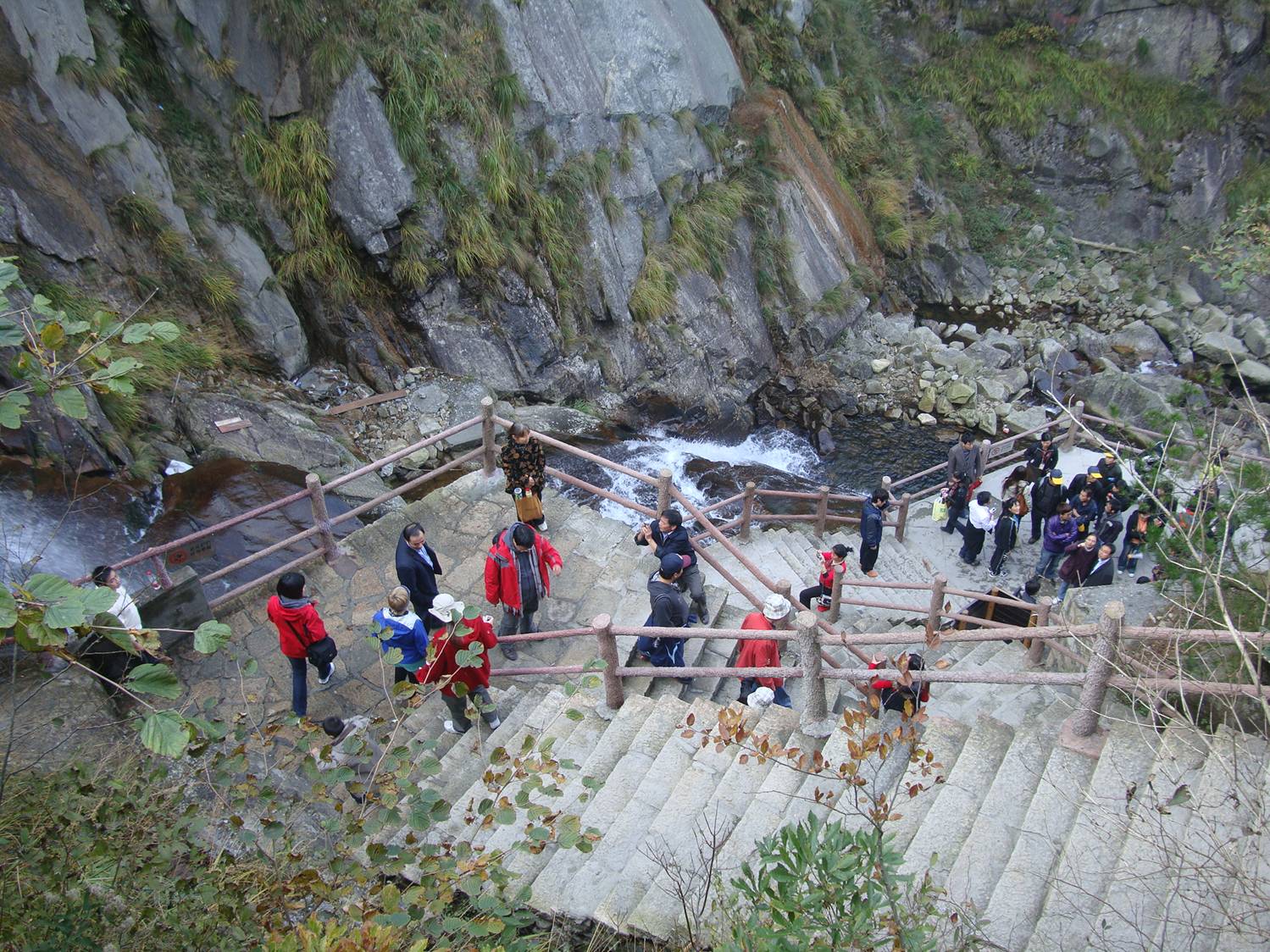
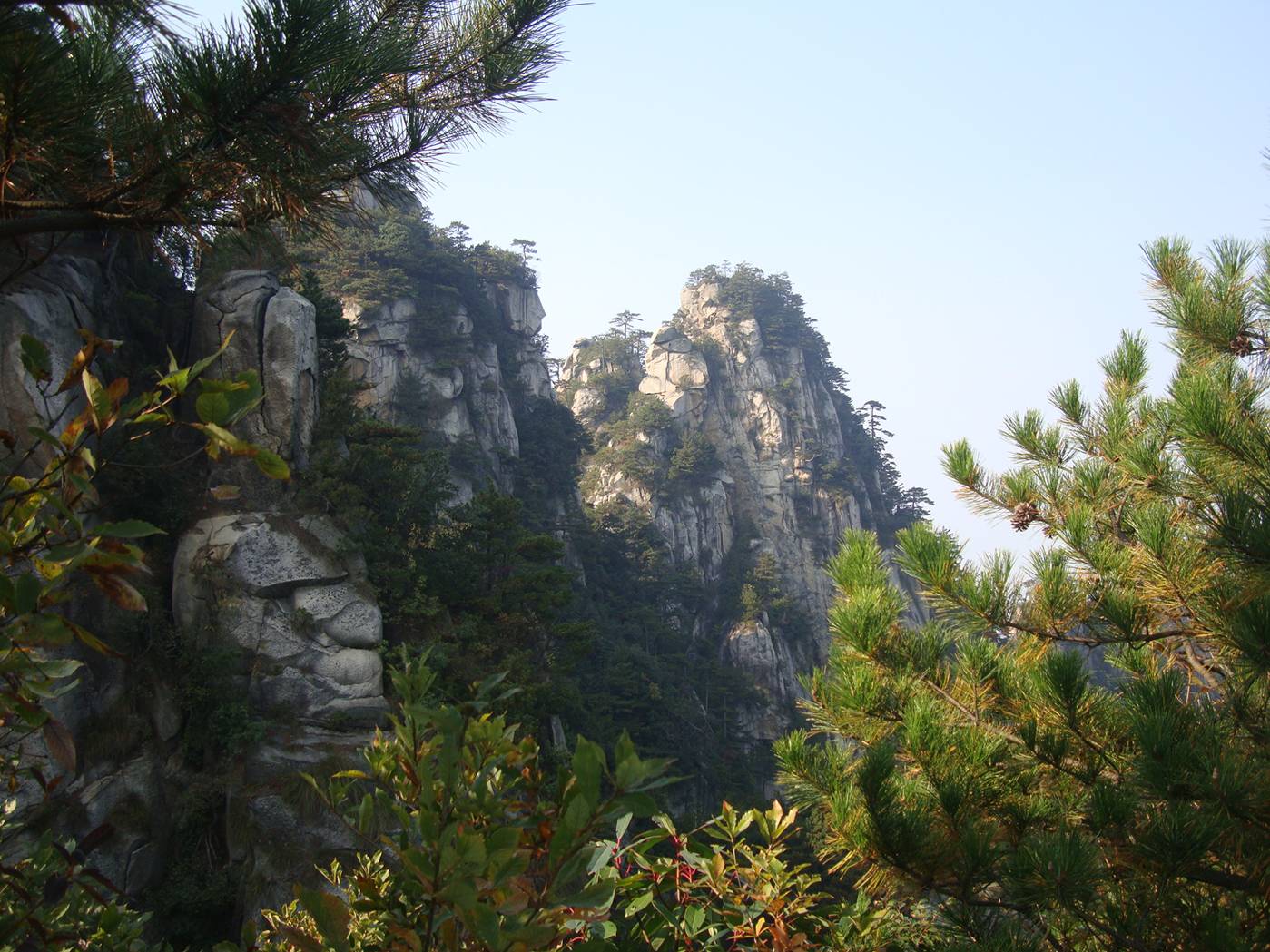
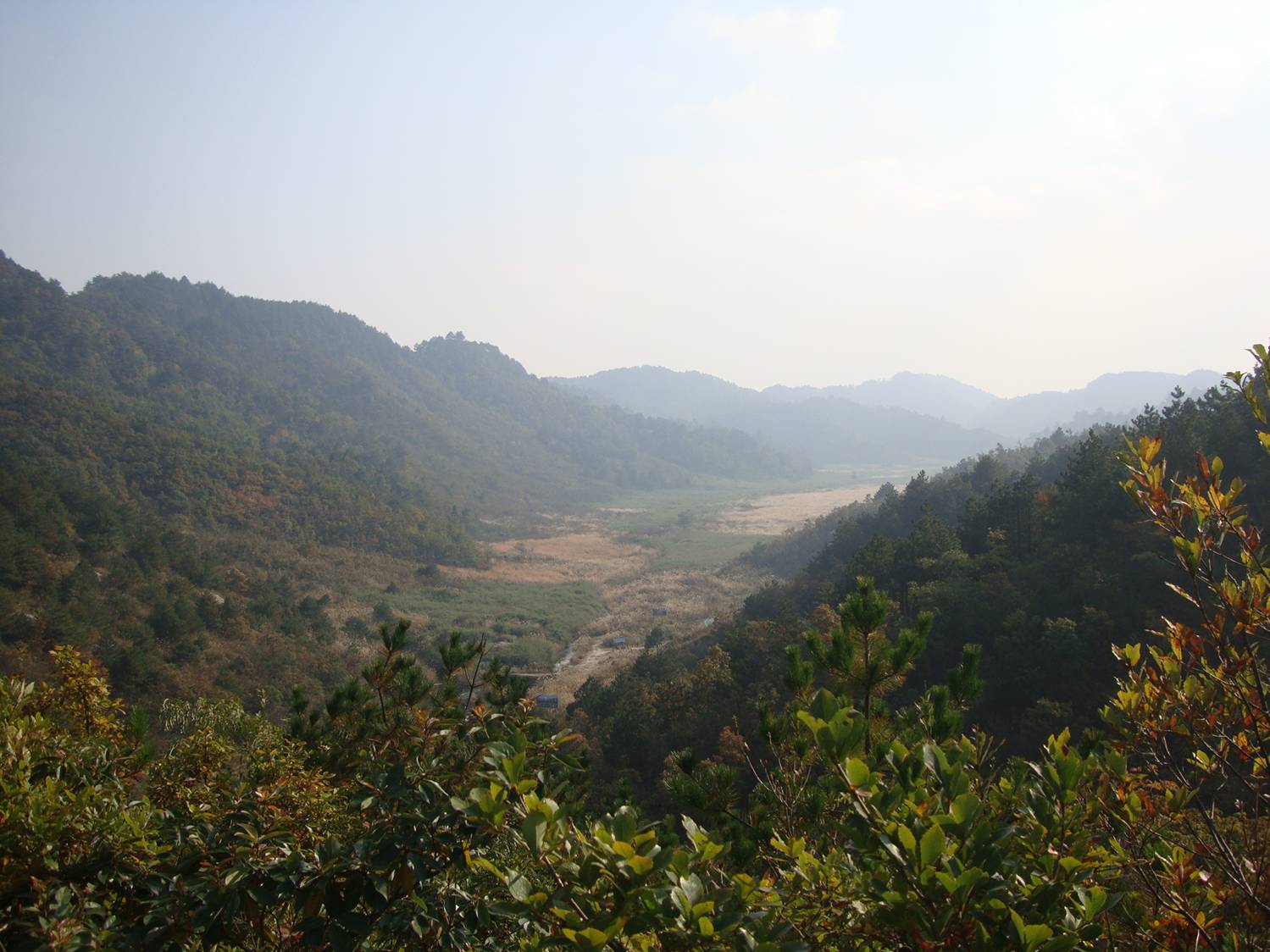
A
view of the valley from Daming Shan (Big Clear Mountain), Zhejiang,
China
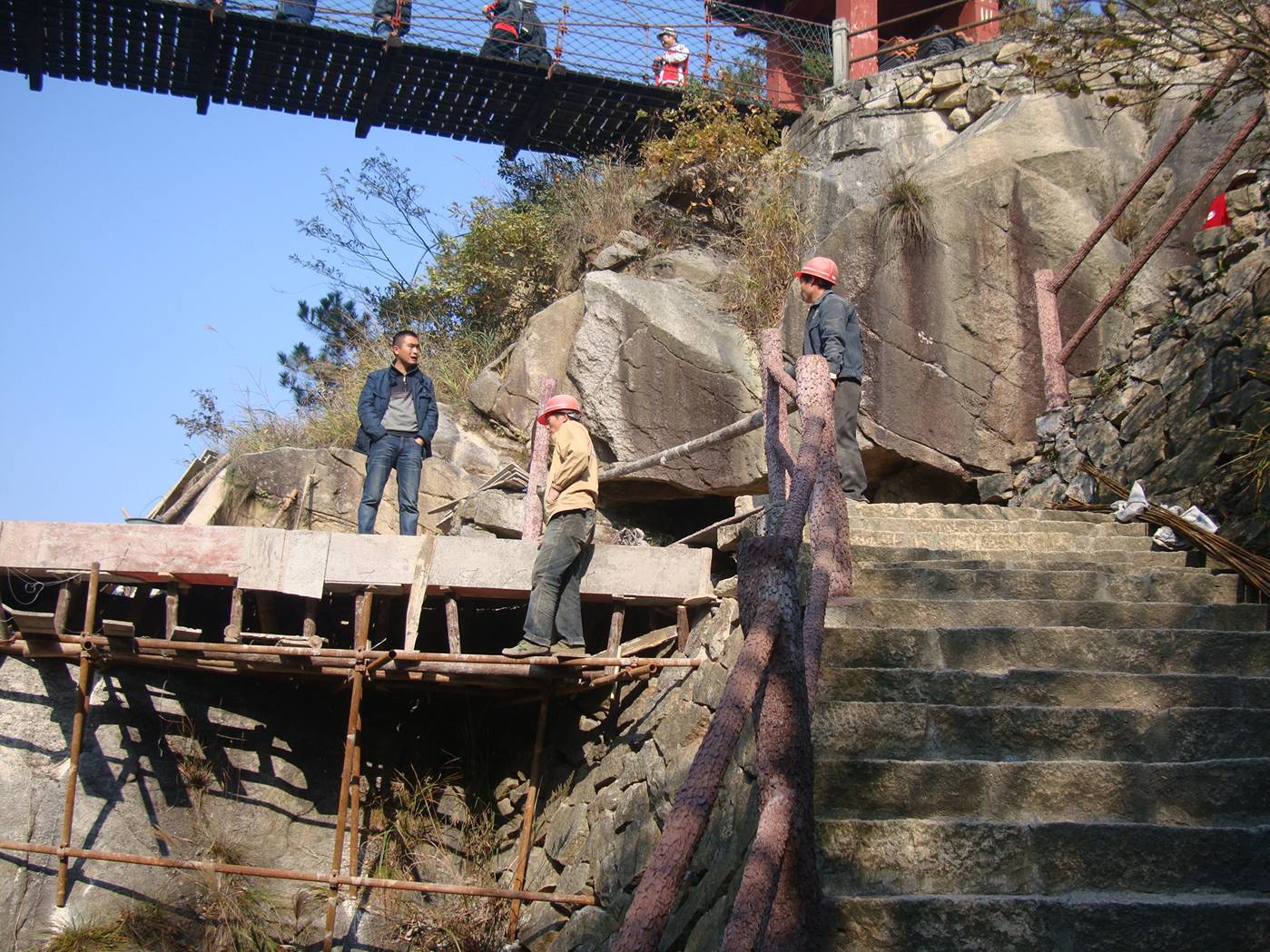
China
is amazing already, and it will be incredible when they get it all
finished.
Daming Shan workers expand on the stairs and sidewalks.
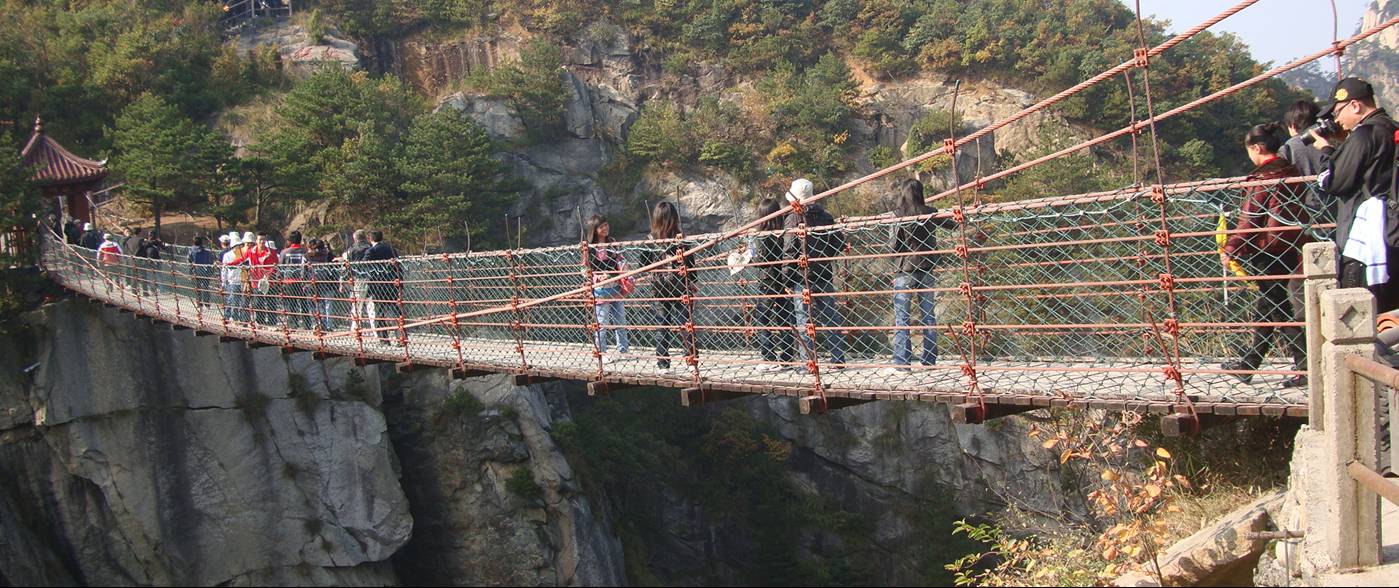
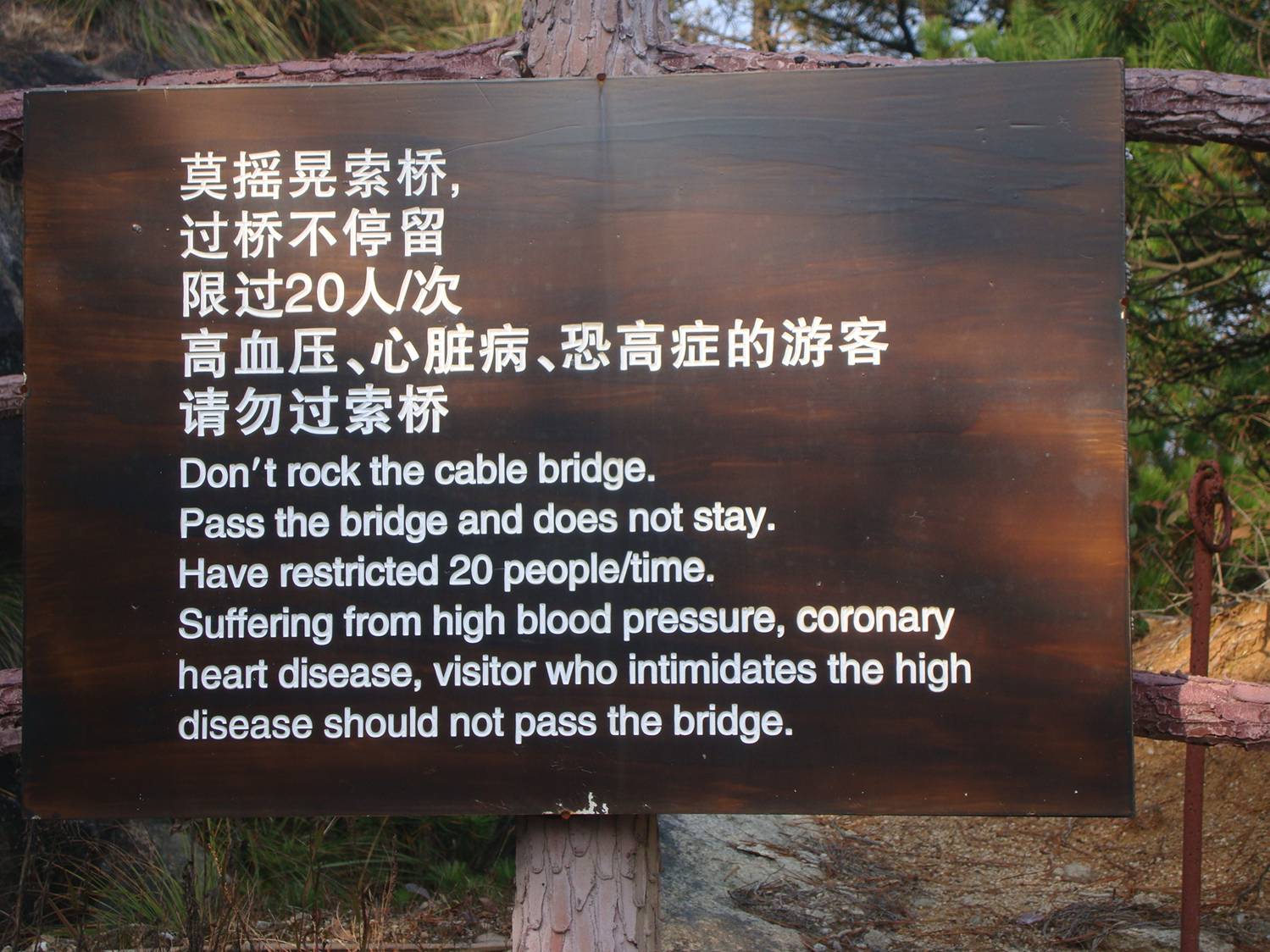




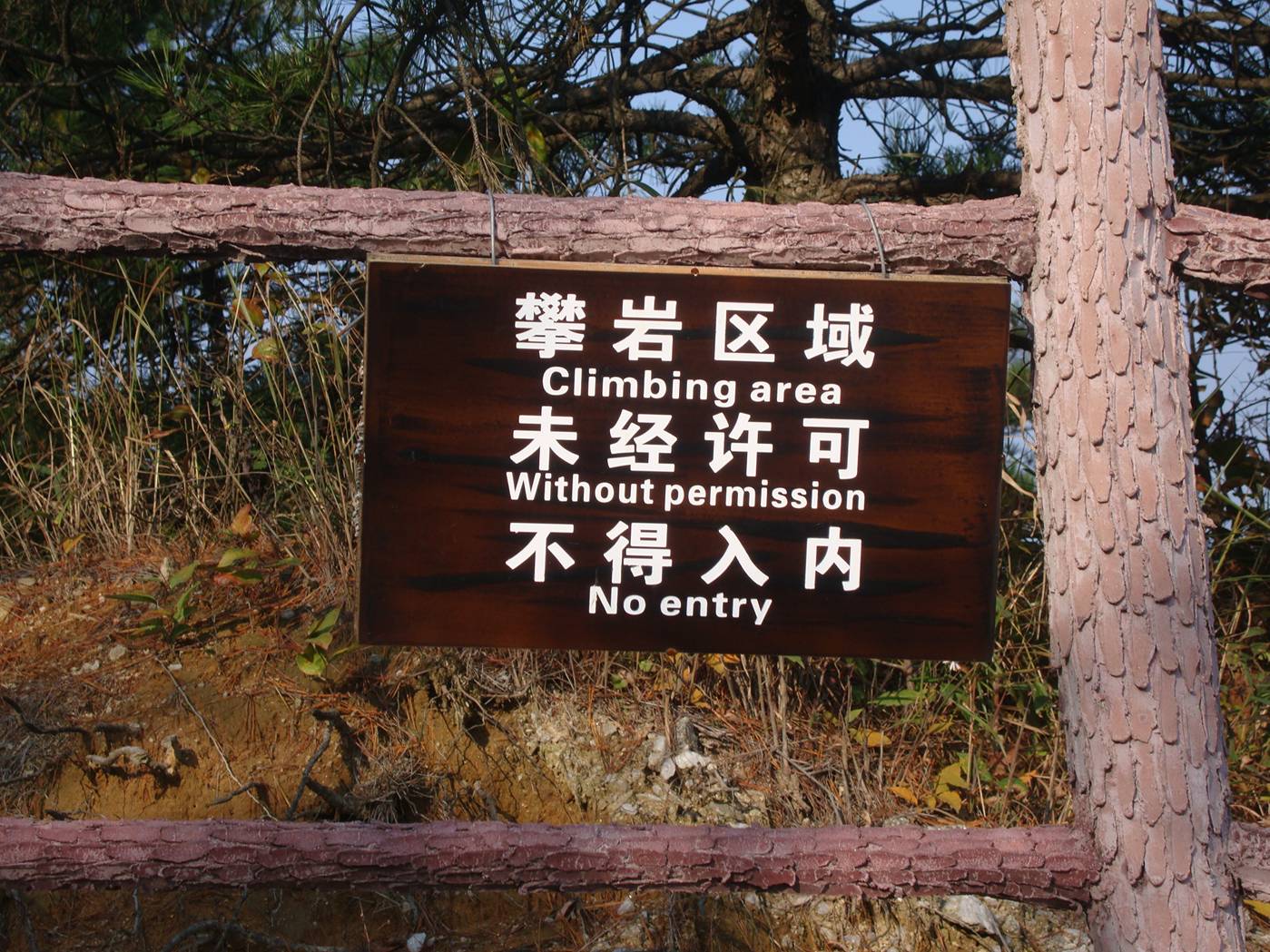


On
Huang
Shan I saw the sidewalks suspended along the cliff faces and
just could not figure out how they could have been built. I
imagined heavy machinery, cranes, suspended platforms from the top,
possibly help from visiting space aliens. Obviously that's not how
they did it.

This
is an enlargement from the previous picture. You can see the guy
with the wheelbarrow
pushing concrete to its destination. These sidewalks are built by
hand! Really!
After the mountain adventure, and running a bit late, we
boarded the bus for our river raft cruise. Apparently tourists are
encouraged to have water fights between the rafts, but our stodgy group
quickly nixed that idea. Too cold now, and getting dark already by
the time we set off.
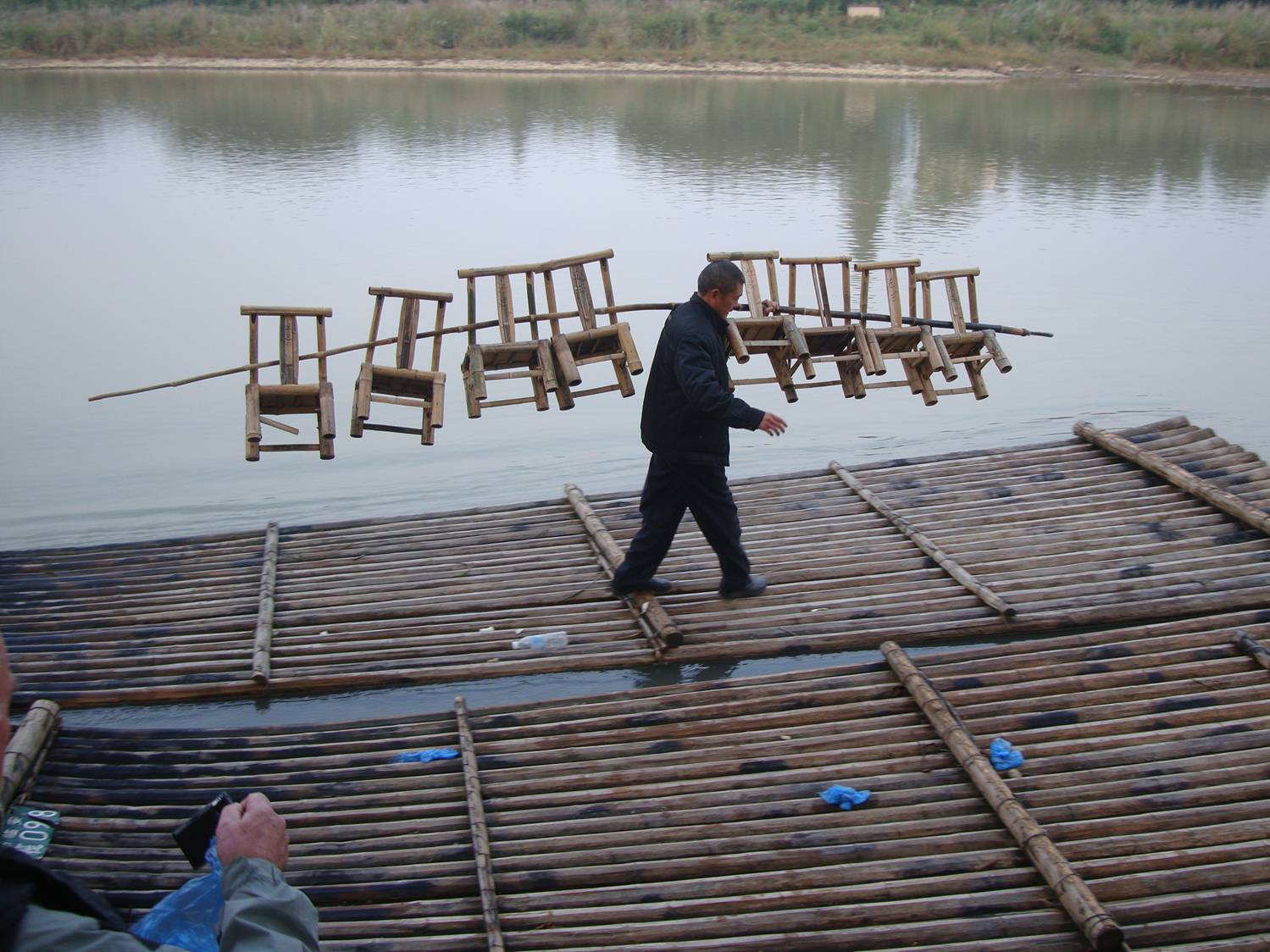
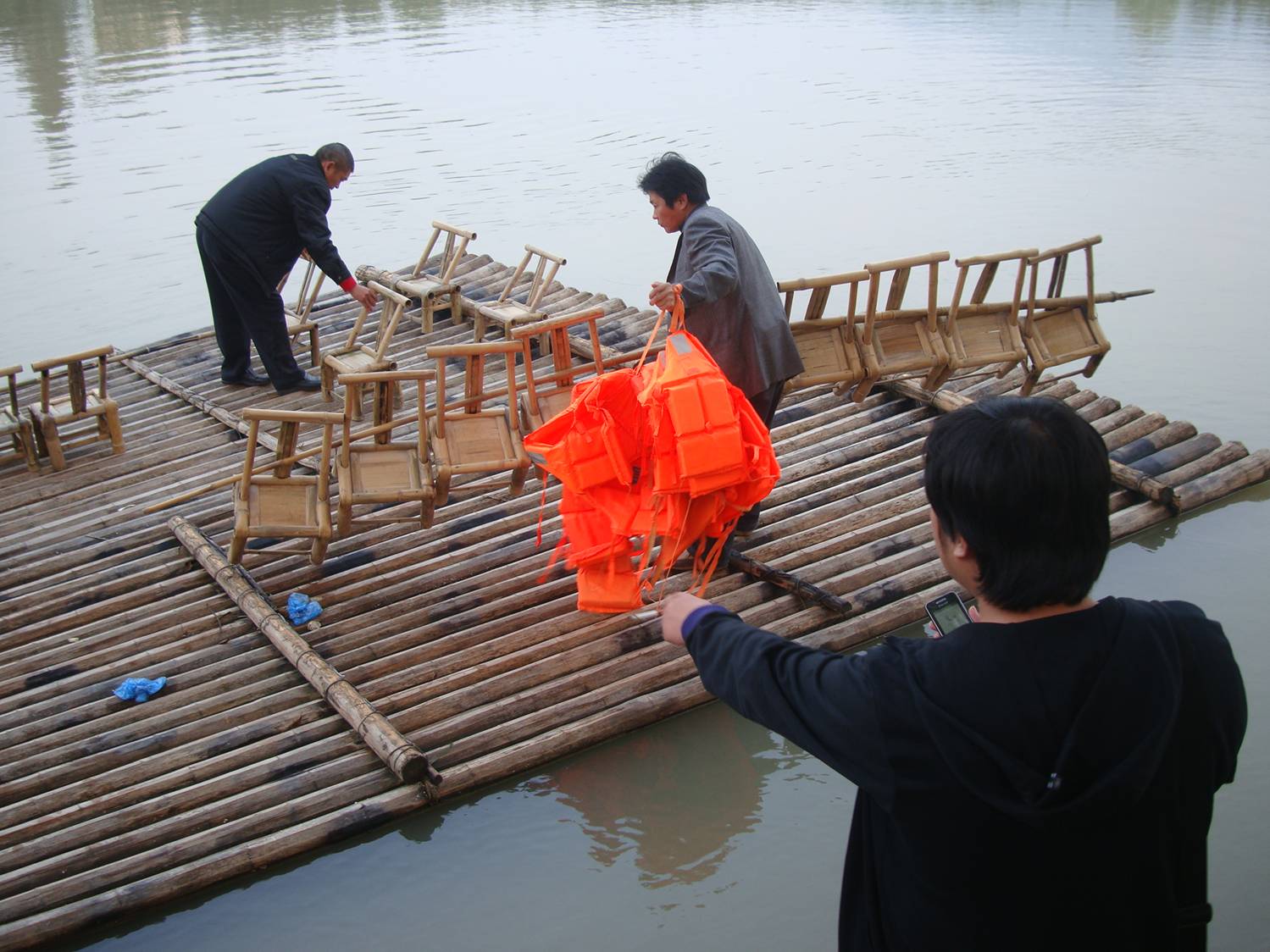
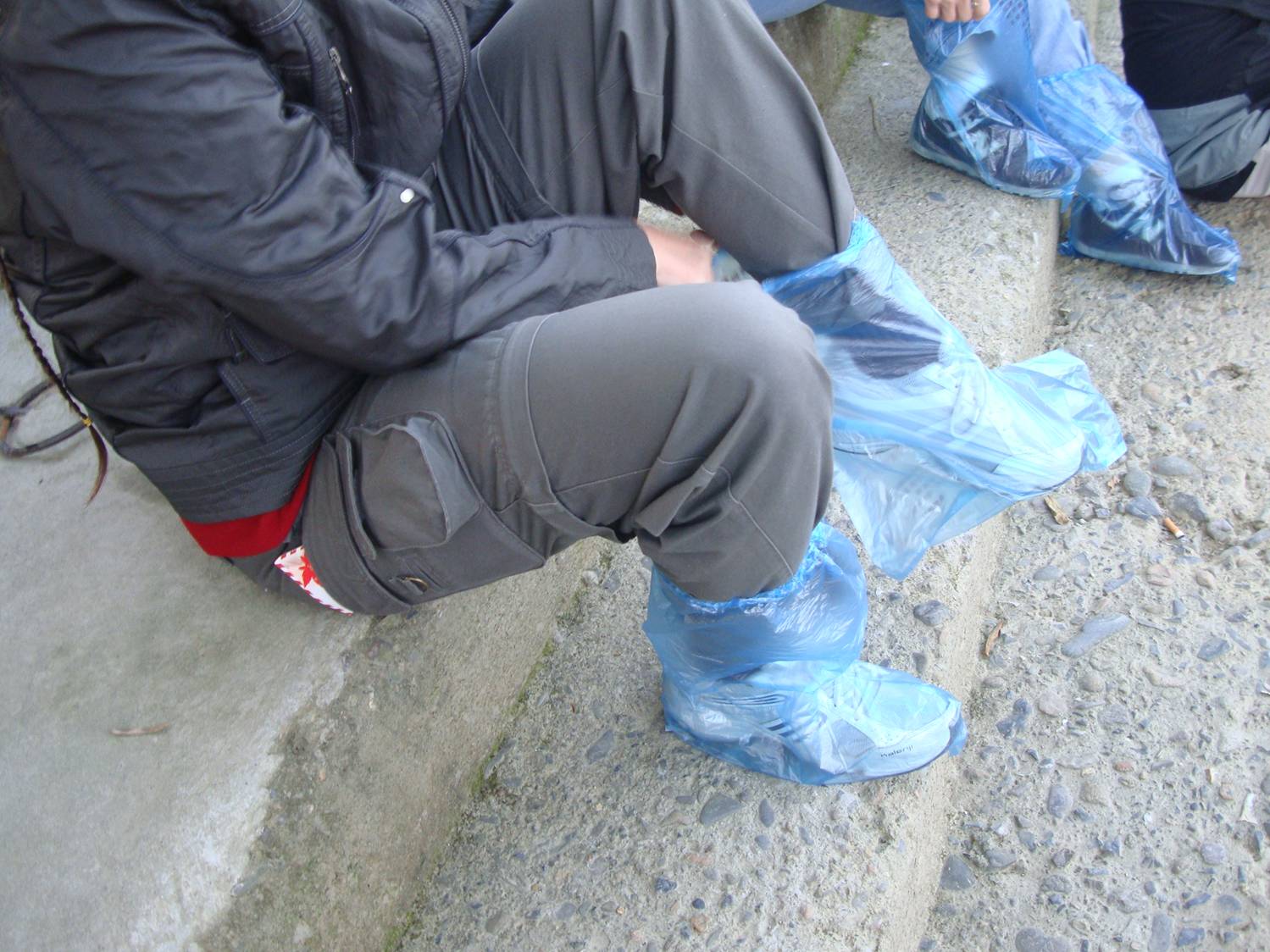
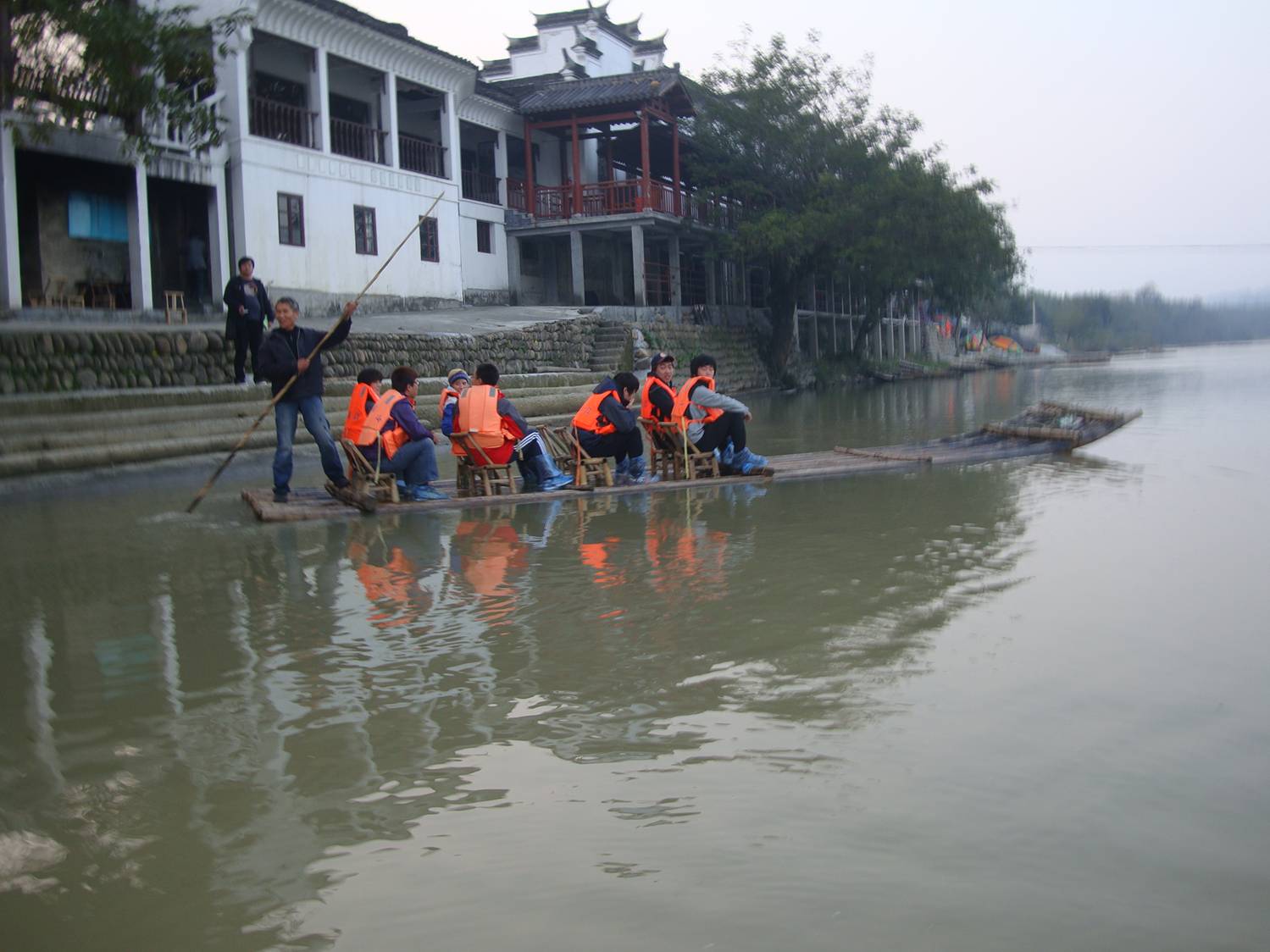

Happy
ever rafter.

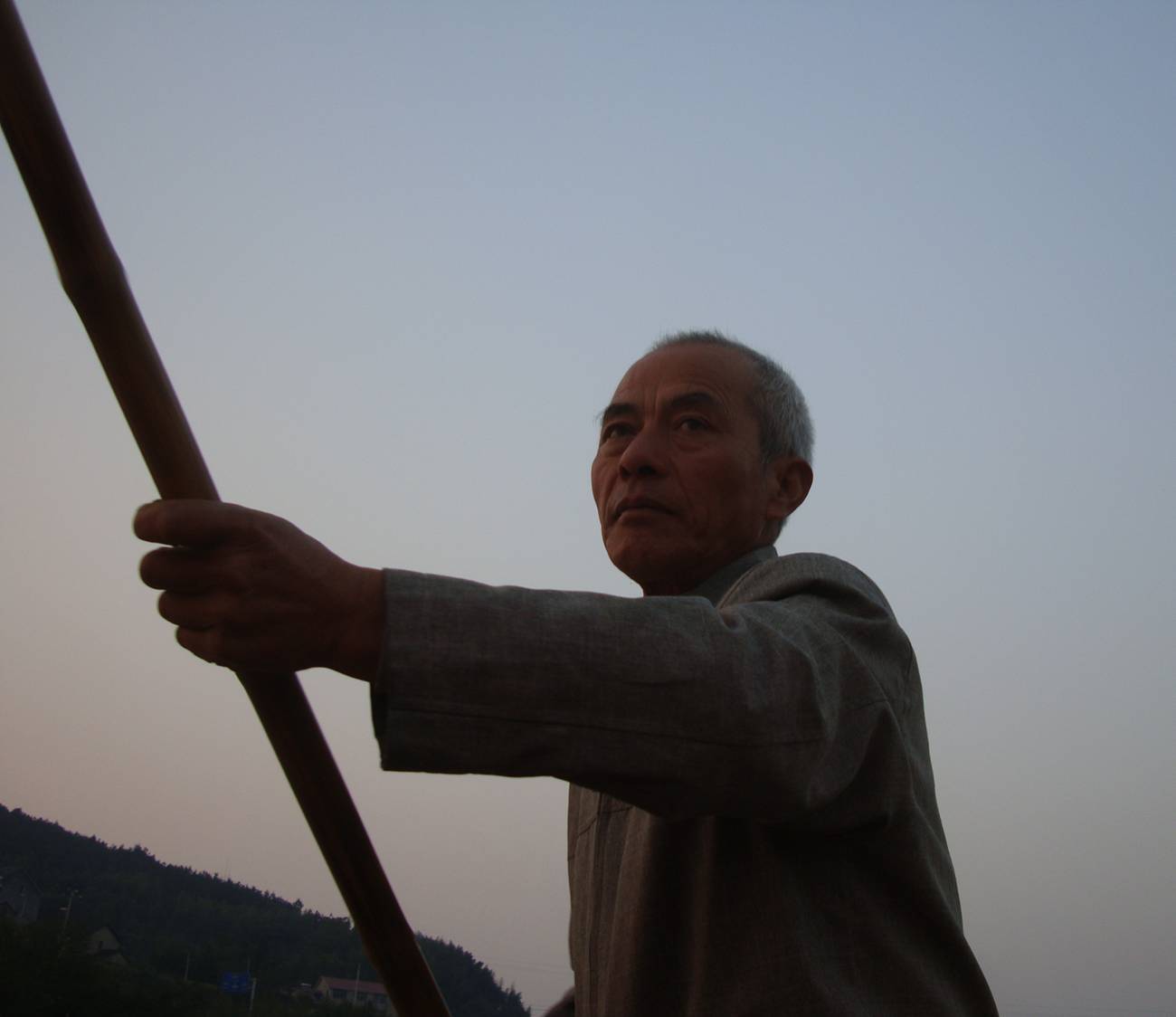
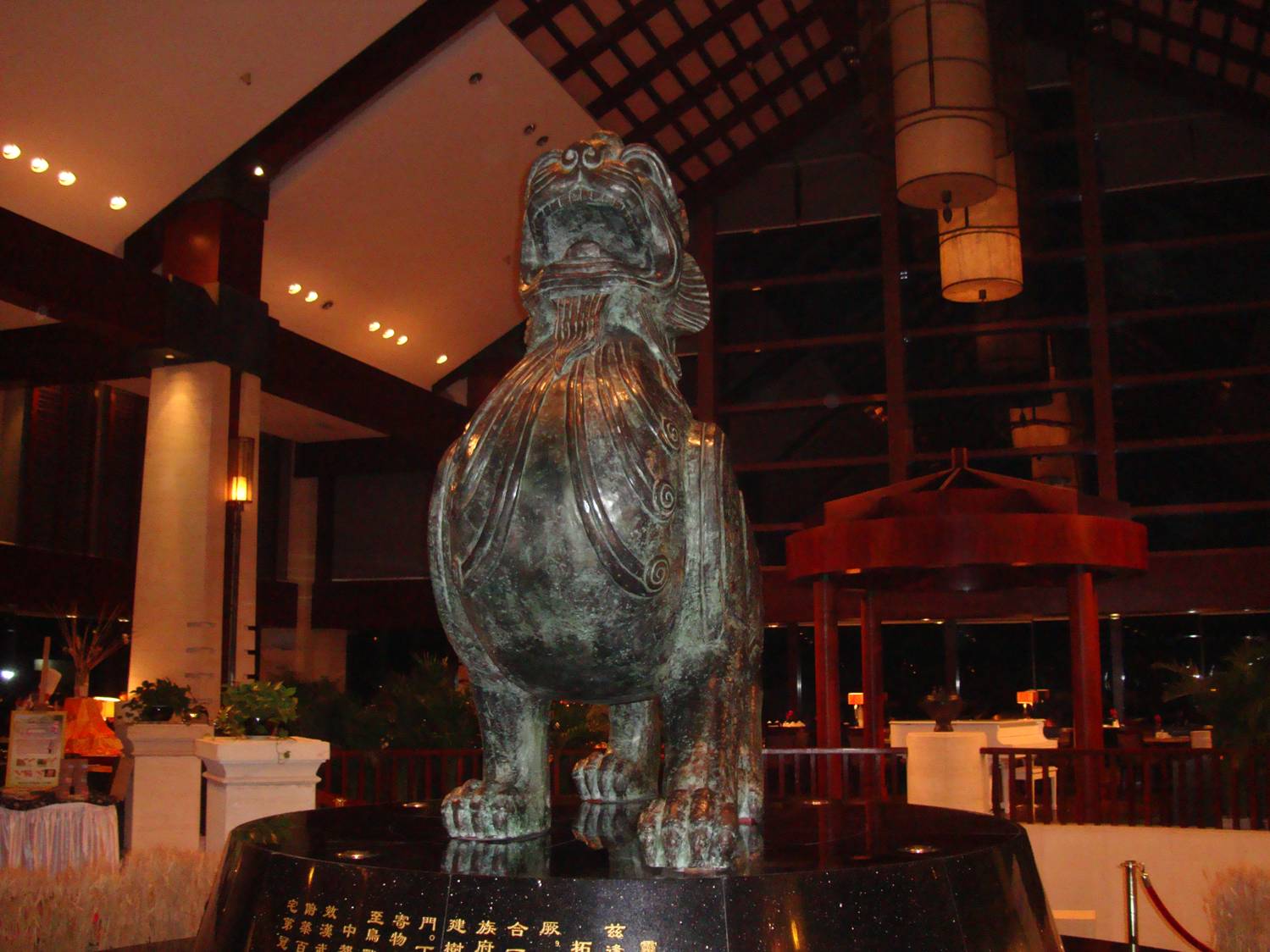
The
administration put us up in a five star hotel for Saturday night.
Just wonderful luxury.
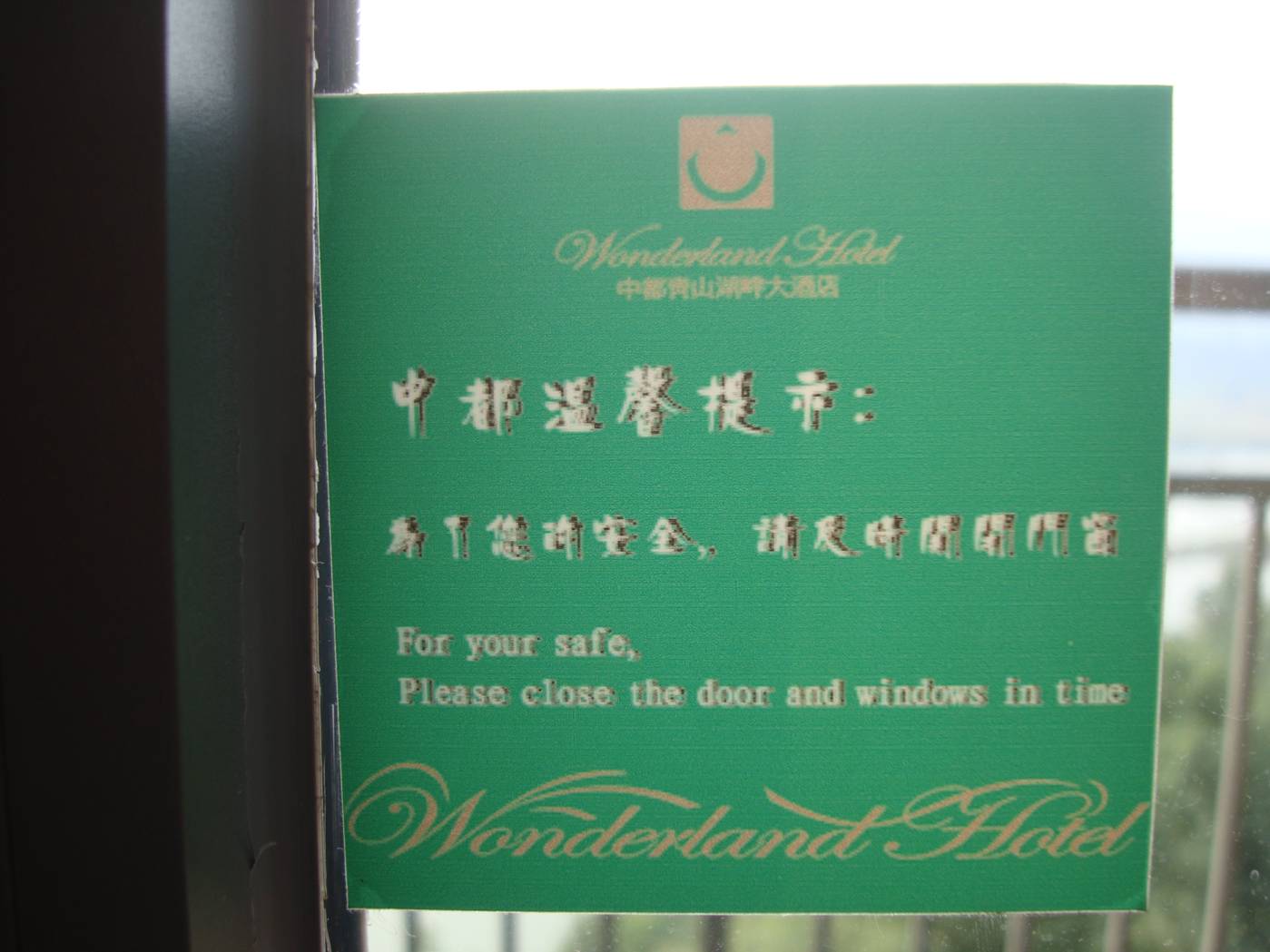
Yes,
but in time for what?
Next morning we had a short bus ride to a charming little
village at the base of the stream that is the headwaters of Tai Lake.
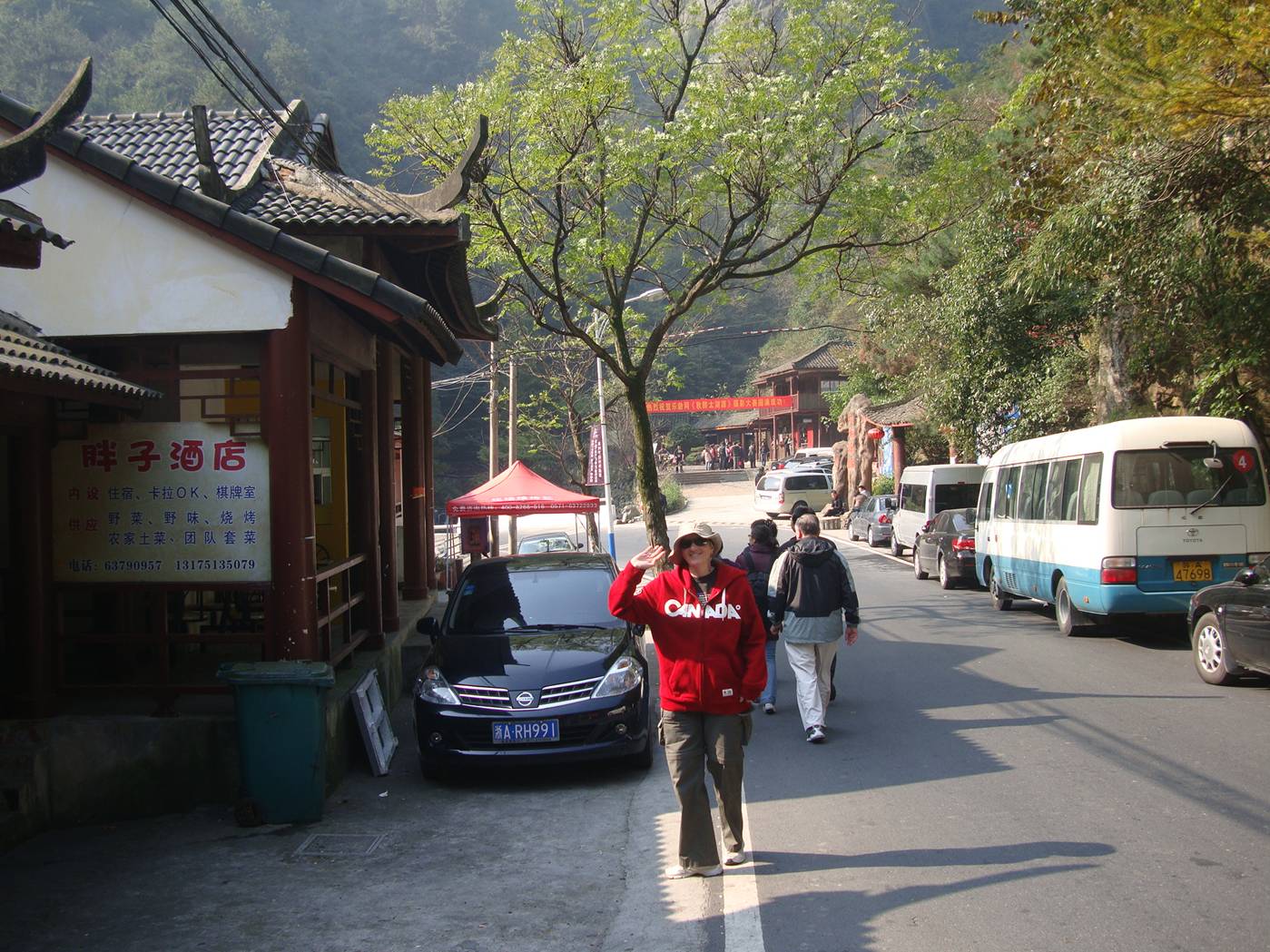
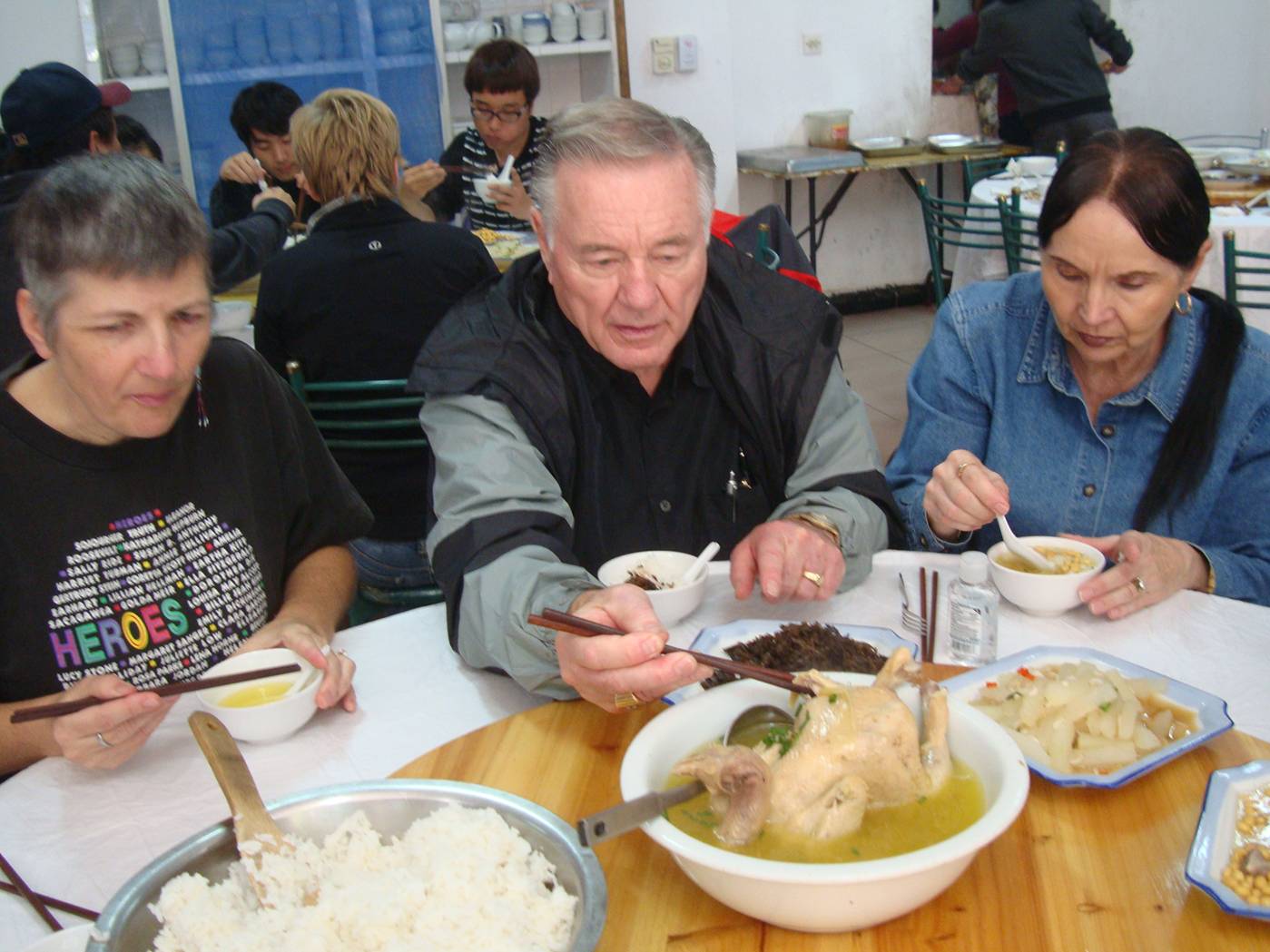

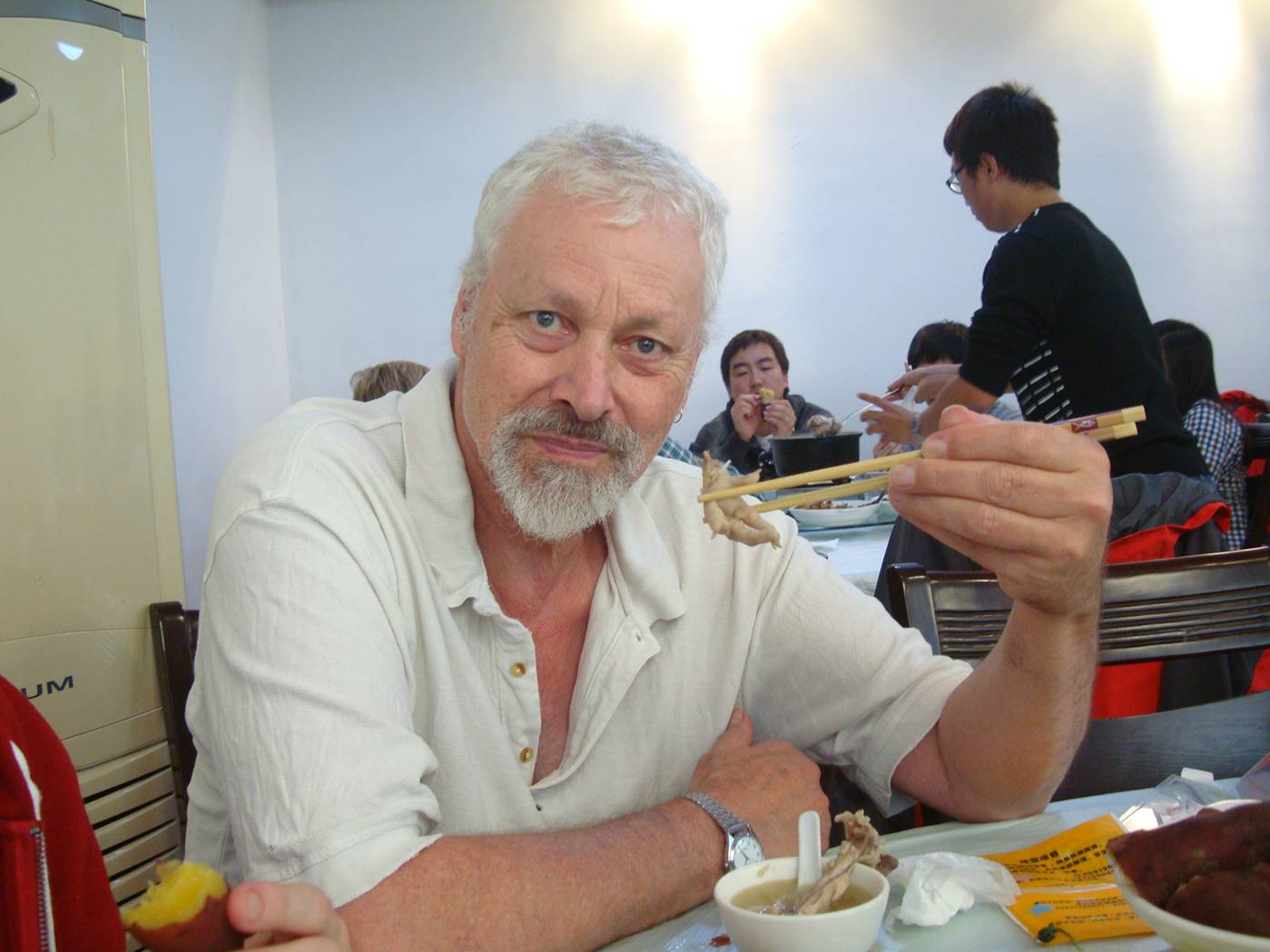
It's
easy to get ahead in China. Or a foot for that matter. Just
order the chicken soup.
After lunch we set off on an easy hike up to the headwaters of Tai Lake.
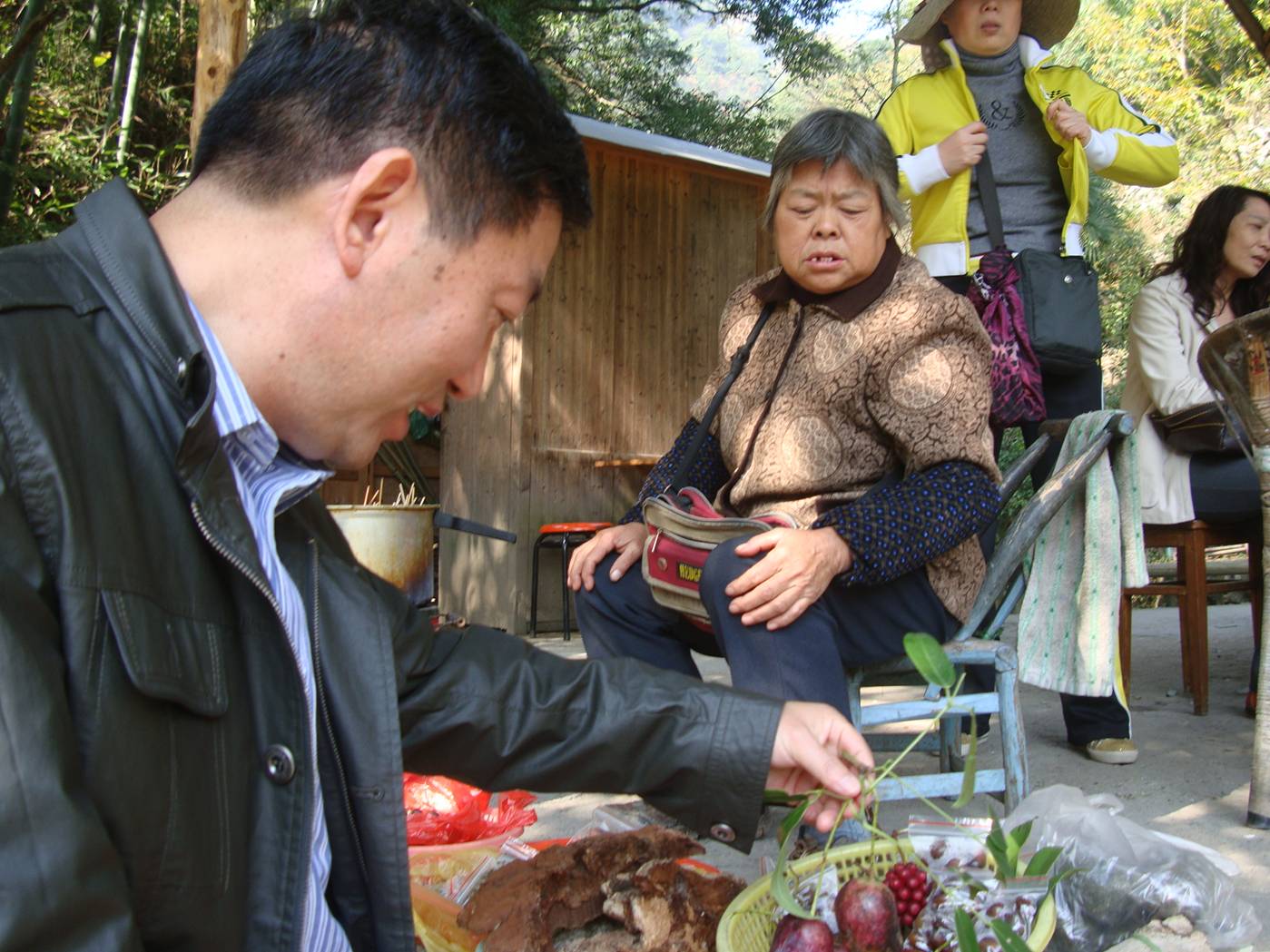


This wasp is an incredible creature when you really look at the detail.
(return to
other wasp picture)
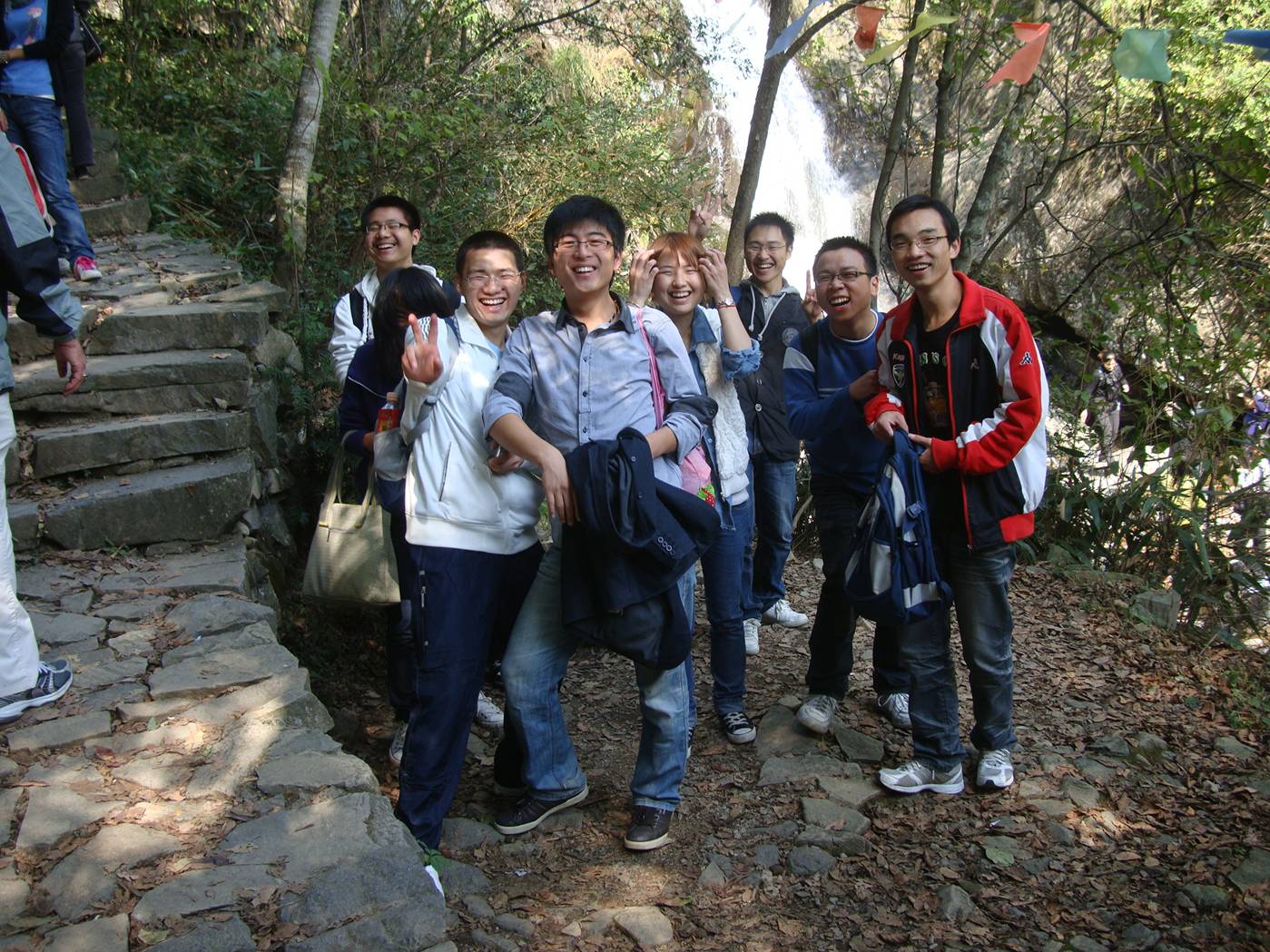
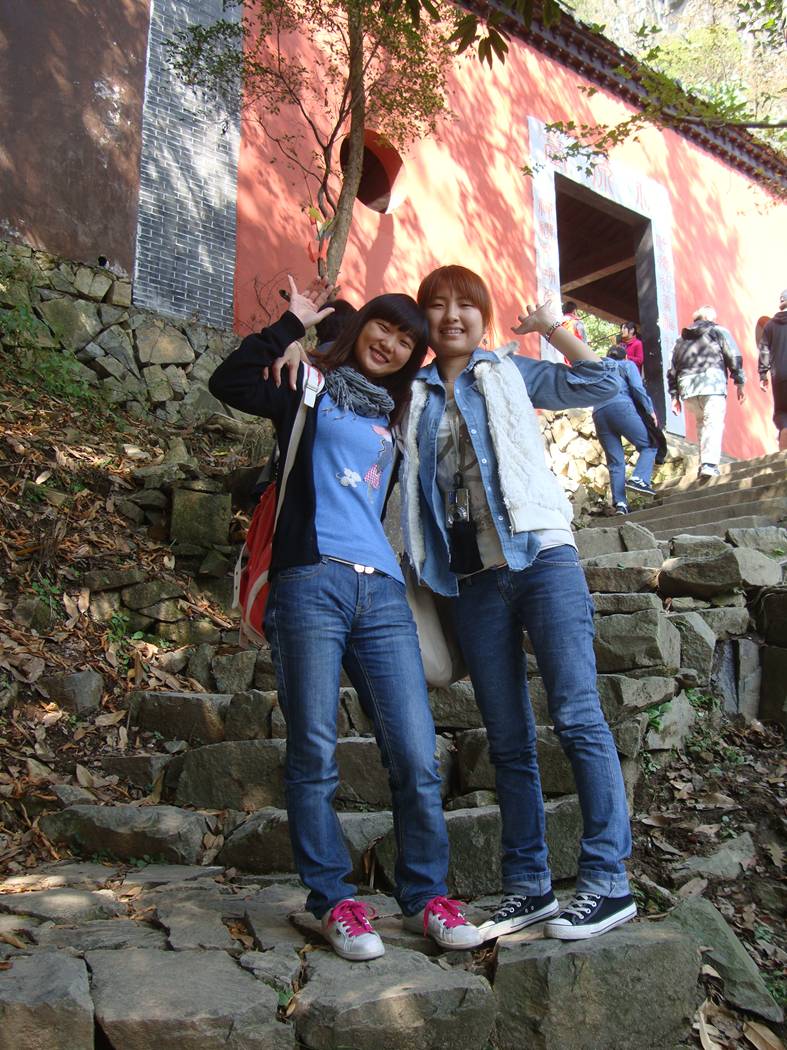
Friends we met along the path to the headwaters of Tai Lake. The
youth of China always seem so
carefree and happy and friendly.

I
think a bird got the tip of his tail, which was a good bargain for the
lizard.

Professor Bird paid ten yuan to be mobbed by monkeys.
I wasn't expecting the monkeys. Some people really find monkeys
cute and charming. Not me. When I was a child, my father had
a friend who had a pet monkey. Now, my father, in keeping with
many men of his generation, was not really comfortable with sexuality.
It might be exaggerating to say that he was uptight about sex, but he
wasn't one of those people who told off color jokes, or laughed at them.
Whenever he visited his friend who owned the monkey, the nasty creature
would scream, run into the corner, and sit there madly masturbating.
Apparently it never did this for any other visitors, and I always
wondered whether it has somehow discerned my father's prudishness.
That same monkey one day reached into the the family's canary cage,
removed the bird, and bit its head off. Nasty monkey. I was
quite pleased during our hike to be able to relate this story, minus the
masturbation detail, to my Chinese associates
almost entirely in Chinese. Making progress for sure.
The monkeys reminded me of another monkey story, which
I've been telling my students this week in my oral English classes:
When I was at university I had a pet monkey. At the time I was renting a
room in a communal house at the bottom of Burnaby Mountain. The room was
exactly eight feet by eight feet, and about two feet of one wall beside
the door was taken up by the furnace, leaving not a lot of living space.
I bought a sheet of three quarter inch plywood and built a bunk bed,
with a ladder going up to it. The furnace made the place into a sauna
when it turned on, so I took a chainsaw and cut an air hole high up on
the wall above the bunk. Under the bed I built my desk. My girlfriend at
the time sewed up some satin (cheap liner material actually, but pretty)
curtains for the bunk bed, and that kept the heat of the furnace out of
my sleeping area. It all looked quite elegant but there was no room for
my monkey cage, so I built a cage for the monkey that stood in the large
kitchen, just outside my door. The cage was framed with two by twos on a
plywood base that was two feet square, and it stood eight feet tall. A
nice cage.
We all felt sorry for that monkey, sitting in his cage all the time, so
we'd let him out. That was nuts. It was like having an incredibly agile,
incredibly athletic, mentally challenged child in the room. He'd bounce
from the light fixtures to the handles on the kitchen cabinets, to the
curtains above the sink. He liked to steal my pen (this was before the
days of computers, and everything we did was with a pen and paper, or a
typewriter for a final draft) and then he'd bounce around the room, just
impossible to catch.
I never knew how much my roommates hated my monkey
until years after I left university. In the pub one day, talking to one
of my former roommates, he told me about bringing home a new girlfriend.
The bathroom of our communal house had one of those old fashioned
toilets with the water tank up near the ceiling and a long chain to
flush it. That was a favourite place for my
monkey to sit, because he liked to get high up and look down on things.
So this new girlfriend has to go to the bathroom and she's sitting there
on the throne and hears a noise. Looks up and there's this ugly little
monkey grinning down at her from the toilet tank. He looked exactly like
the monkey that eats the poisoned figs in "Raiders of the Lost Ark". She
screamed, jumped up and ran with her panties around her knees leaving a
streak of urine from the bathroom all the way out the front door.
I always thought my roommates were incredibly tolerant.
They never told me about this.
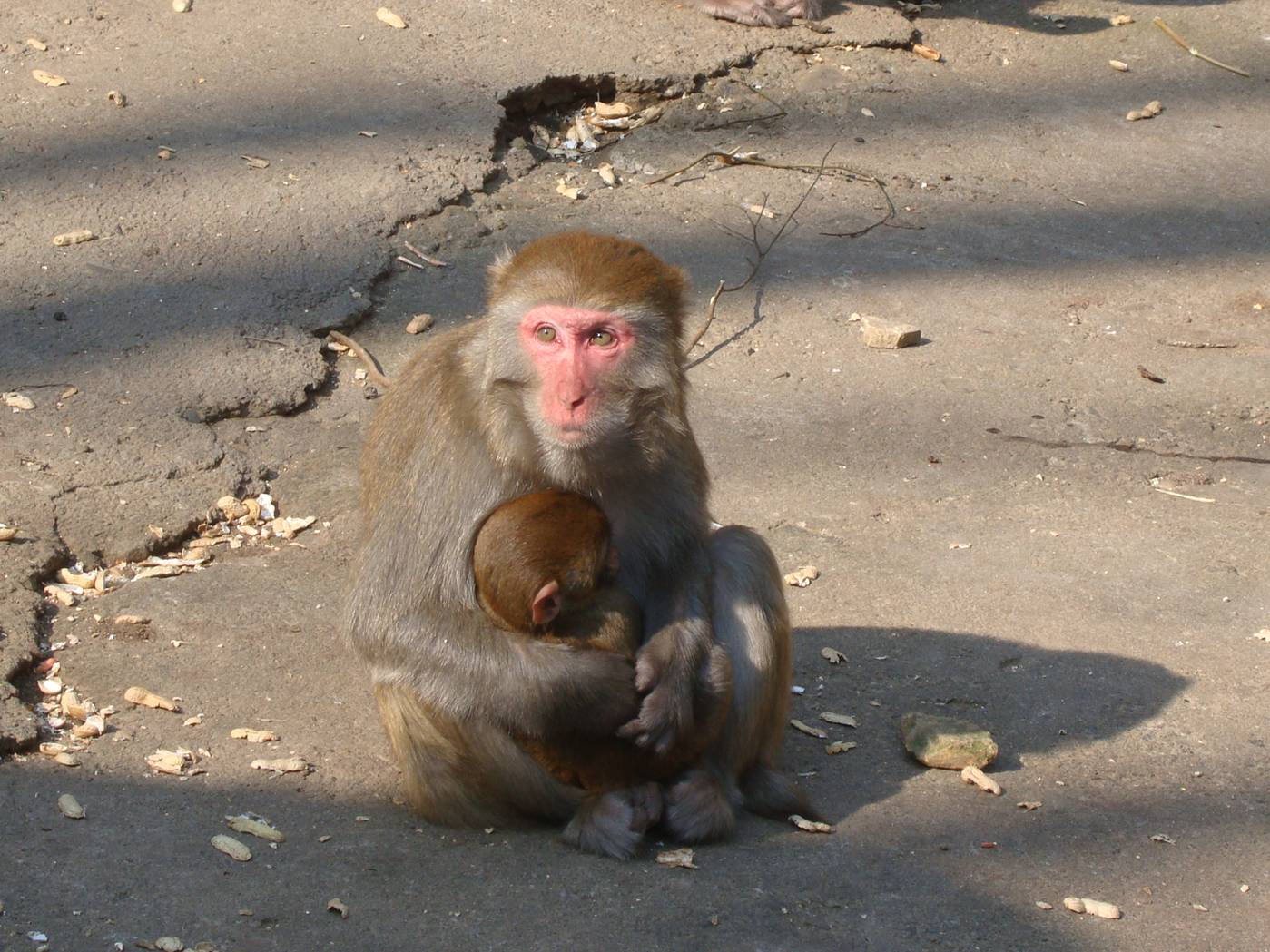

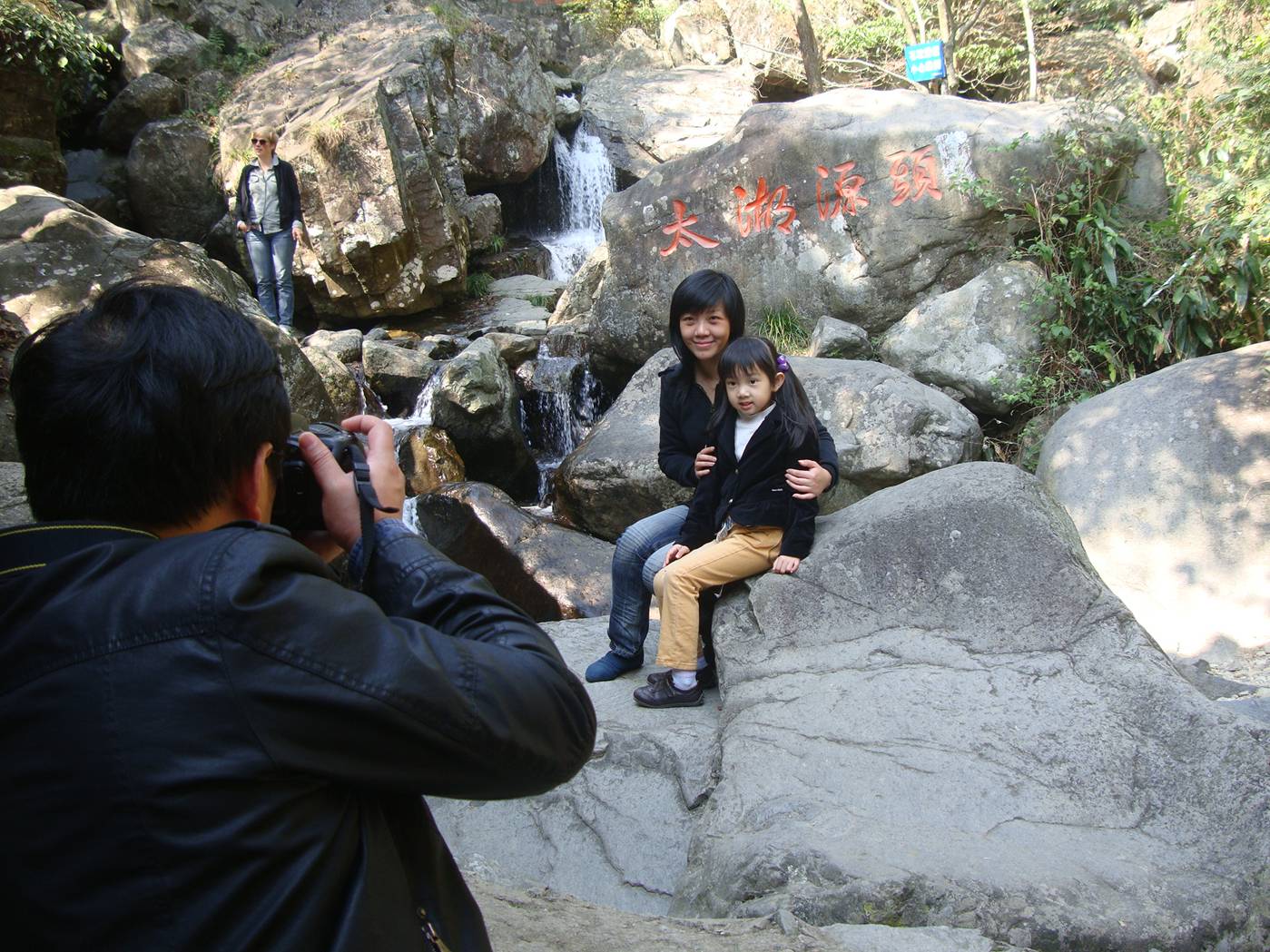
And
this is what the place is all about -having
dad take your picture with the rock in the
background.
A future family treasure no doubt.
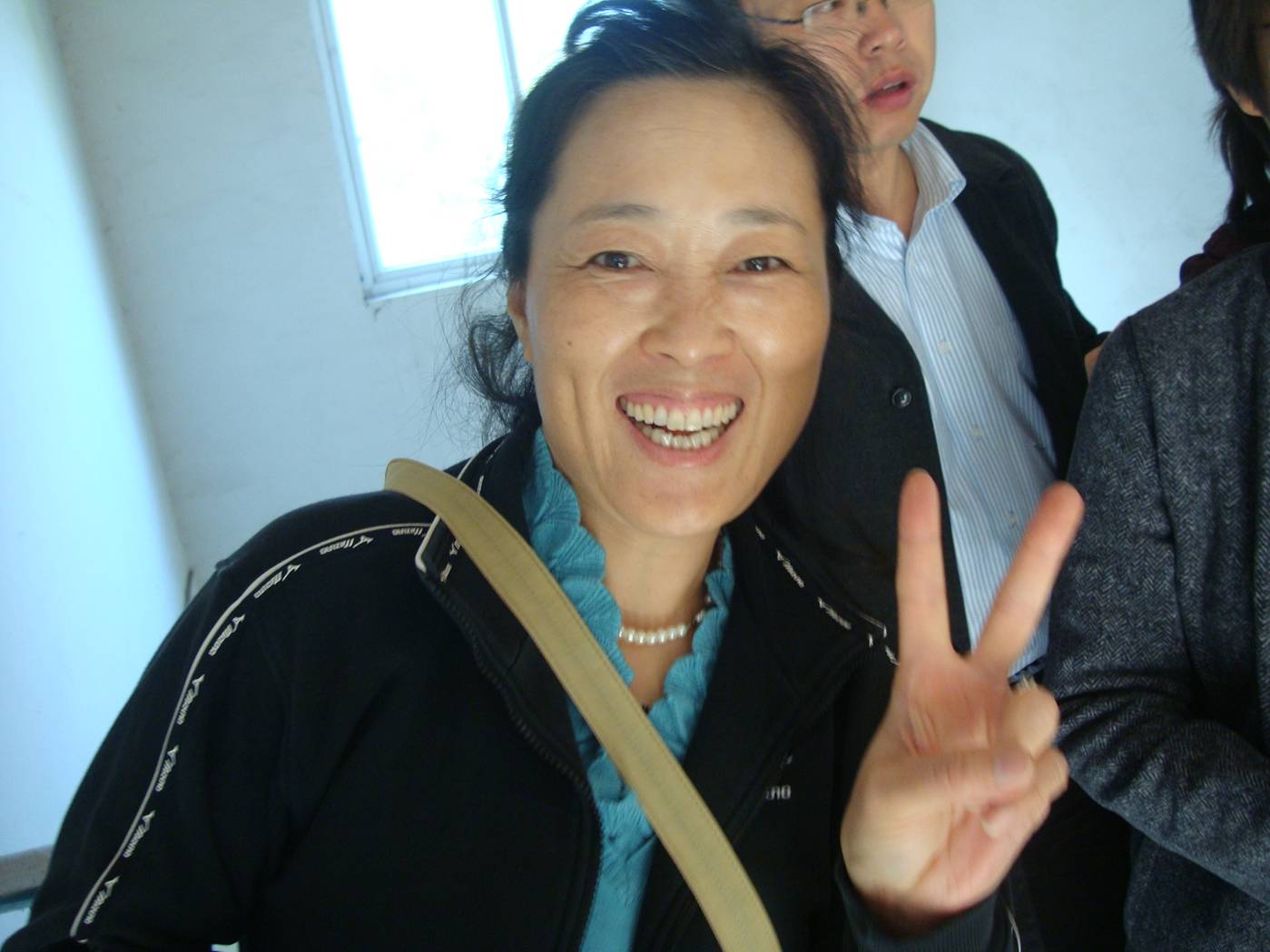
Many
thanks to Ms. Liu, our boss lady, and the administration at Jiangnan
University.
These trips become priceless memories for us.
I know this has been a long post. Thanks for checking it out
and bearing with me. But if you skimmed
through the monkey story, you need to go back and read it. It's
funny.
Comment on this Post
My New Guitar Student
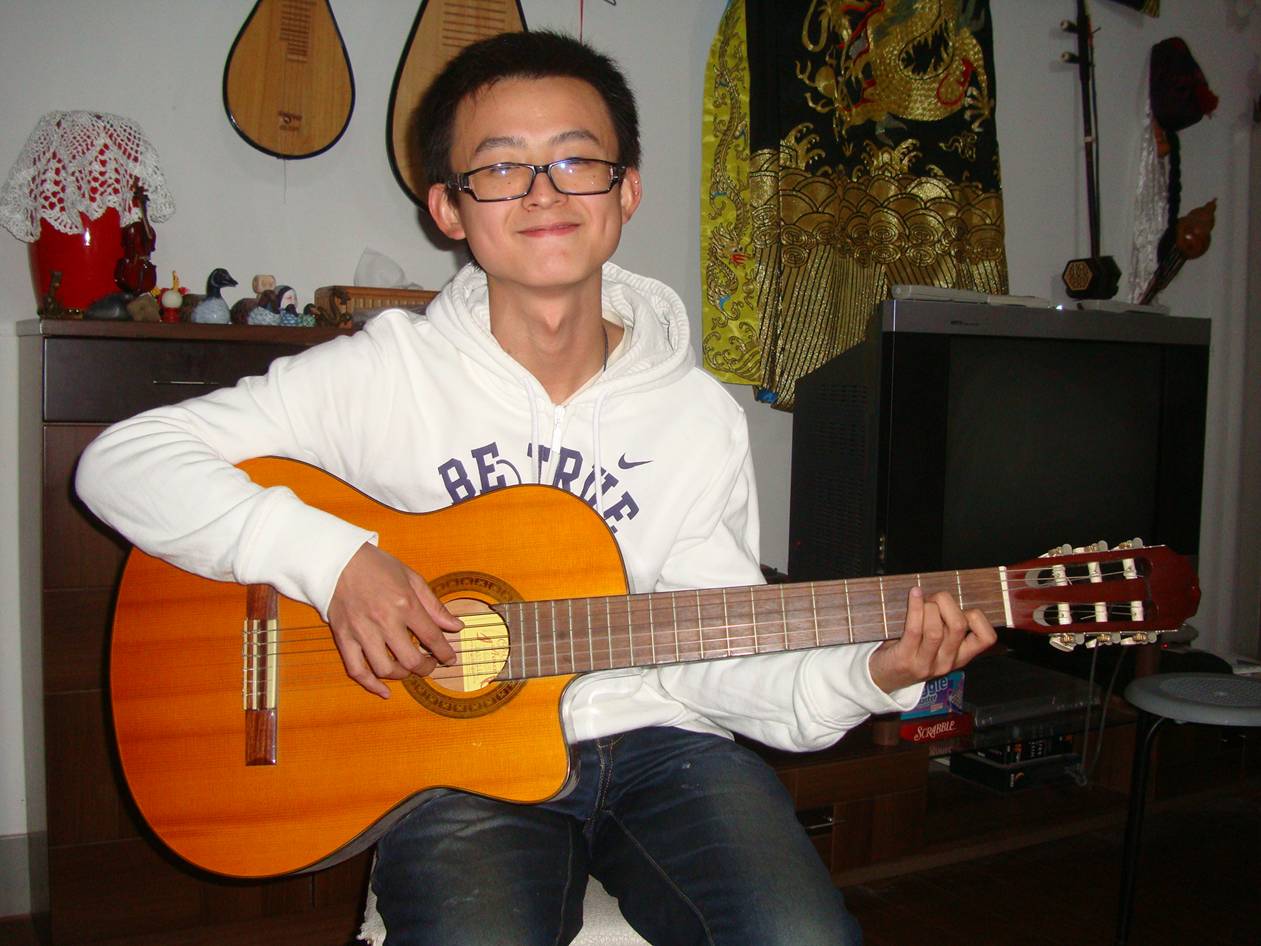
Jimmy
recently purchased his own guitar, and asked me for a few lessons.
He's a good student. I showed him a few basic chords, and showed
him how to practice going from one chord to another. Already he
can make the C to Am transition fairly quickly. So no doubt he'll
get through the toughest part of learning to play guitar, the very
beginning, fairly quickly.
I'm not really a guitar teacher, though I think I can
do a good job of getting Jimmy started. I don't charge for
lessons. It's just fun to have a student.
Comment on this Post
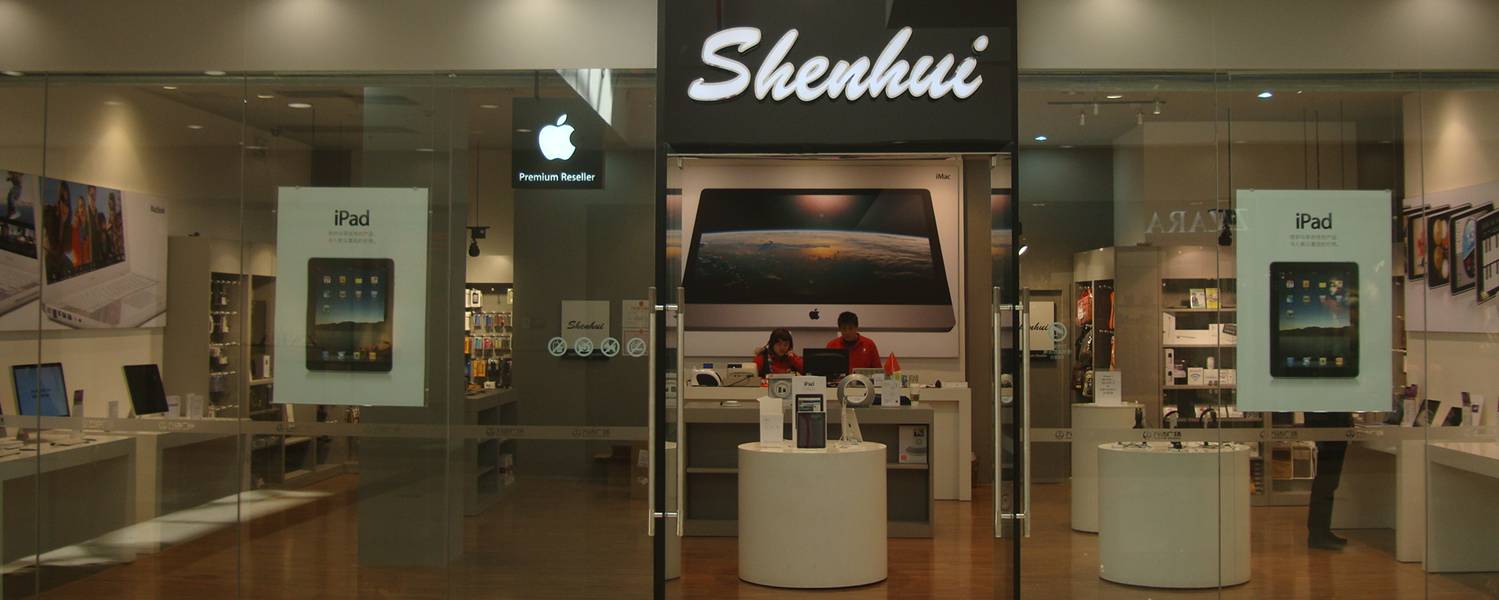
Chinese Word of the
Day: 难受
(nán shòu literally "difficult + accept") adj. = unhappy
October 28, 2010 When
Will I Ever Learn
When I first came to China I determined to "go with the flow", to not
get upset about anything, and to never be an ugly foreigner.
Somehow, after six plus years here, this rule gets harder to keep.
Note the date of this post. My birthday was
October 22. On October 17, Ruth bought a new iPad to give to me.
Yesterday a line appeared across the display. No reason.
Just a random glitch. But it stayed there after a re-boot and
appears to be permanent. Today, armed with the receipt, I
took the machine back to the Apple Reseller in the sparkling new Wanda
Plaza where Ruth bought it. It seemed to me not unreasonable to
expect them to exchange it for a new one without a line across the
display. You'd think? Apparently if I returned it within
seven days, they'd do the exchange. Eleven days is... well that's
four days too many.
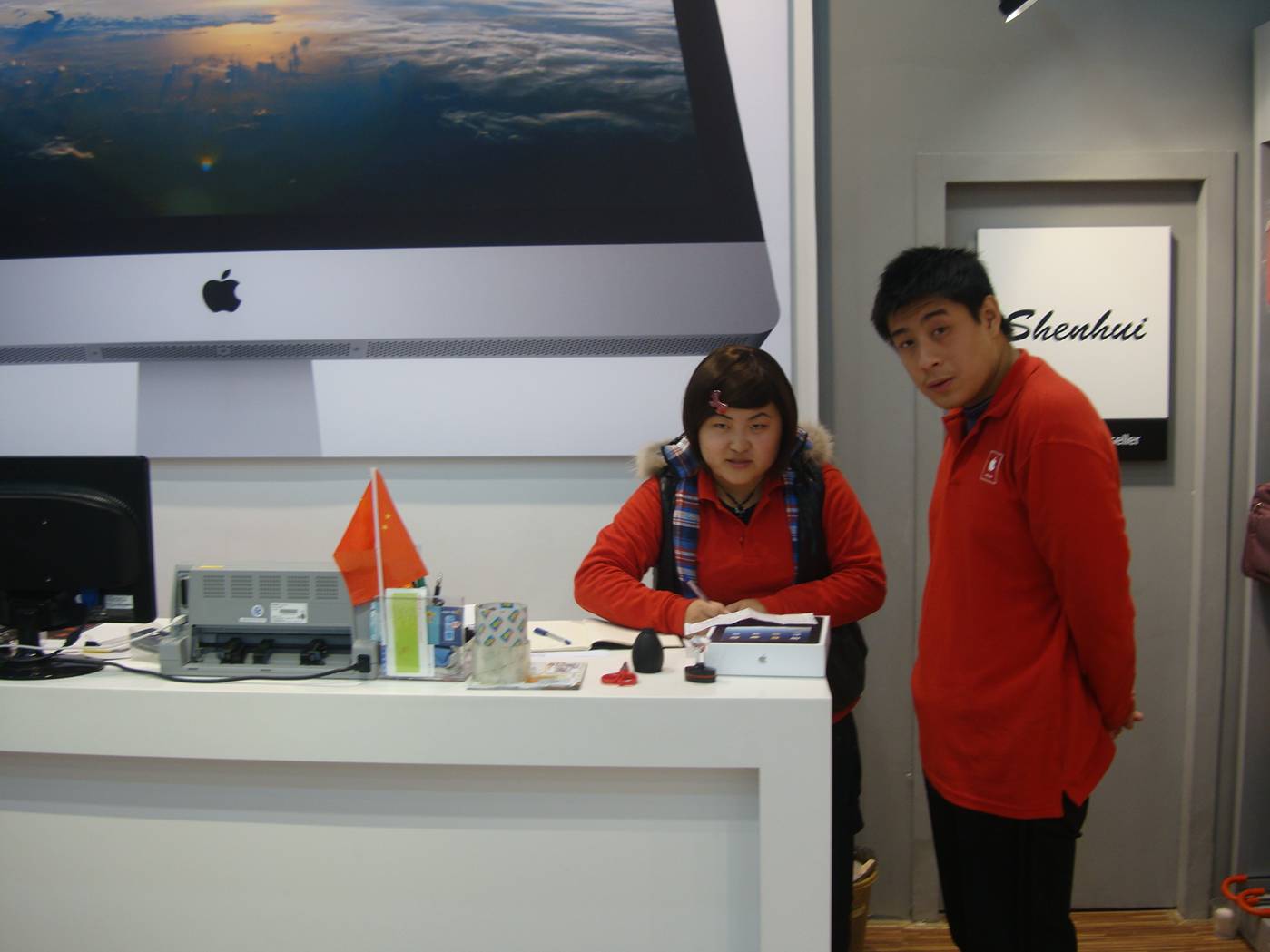
I was informed that the machine
would be
shipped to Shanghai and they would call me on my mobile in about a week.
Needless to say I was 难受
(nán shòu literally "difficult + accept") adj. = unhappy.
Unfortunately I realized in the taxi home that I had been rather loudly
telling them I was 不难受
([bù nán shòu ) = not unhappy. Such are the
vicissitudes when you are angry in a language other than your own.
But I'm pretty sure they got the message. Not that it mattered at
all. I might as well have been one of those wandering unfortunates
out in traffic shouting at passing cars. I knew that.
Somehow I couldn't stop myself. A perfect example of the amygdala,
the emotional center, hijacking the entire brain. I explained that
my wife had already purchased two iPads at their store, that I had many
friends and students who would want to purchase an iPad at their store,
but that nobody I could talk to would do that if they didn't exchange my
iPad for one with no line across the display. They called their
boss. Twice. Same result.
I was rather counting on having that iPad for our trip
this weekend. Oh well. Not going to happen. Advice to
other foreigners: Unless you have incredible guanxi in China,
don't bother getting mad at the store personnel. China is trying
to transition from a manufacturing economy to more of a service economy,
but few few people in the service sector understand how to make that
work. Just something we have to live with until they catch on to
the fact that an unhappy customer outweighs fifty happy customers.
Epilogue:
Friday evening, the next day, October 29, just as our Chinese
Corner was starting, Ruth got a call from the store. I could come
and pick up a new iPad, which I happily did. If they'd told me it would
take a day to get approval for the exchange, and not a week, I might
have acted less foolishly in their store.
It was a scramble to get my new machine initialized and
the aps downloaded last night, but I have it with me for our tour of
Daming Shan. We're off on another outing laid on by our wonderful
administration. I'm a happy camper.
Comment on this Post
October 26, 2010
Chinese Standards for English
Chinese Word of the
Day: 屁股眼
(pì gu yǎn literally "buttocks + eye") = asshole (not
generally used as a pejorative in China)
After my Oral English class today, I spent some time talking to one
of my students about a grammar problem she was having. It was
frustrating, because the sentence she showed me had no discernable
error, though her book said it was wrong. The sentence was
perfectly understandable and I don't think many native speakers would
have a problem with it. I have a problem with prescriptive
grammarians.
So I told my student about the two kinds of grammar -
prescriptive grammar that tries to tell us how the language SHOULD be
used, and descriptive grammar that tells us how the language actually IS
used. My problem with prescriptive grammar is that nobody, and I
mean nobody, follows their stupid rules. But this is the land of
prescriptive grammarians.
As Stephen Pinker explains so brilliantly, the problem
with prescriptive grammar is that it tries to make up rules, and then
make up exceptions to the rules to cover what actually happens.
But the rules originally derived from Latin grammar, because in the
early days of scholarship, educated people spoke Latin. When
English was being formalized, and a grammar for the language was being
developed, the effort was to make it conform
to Latin grammatical rules
such as "one must never split an infinitive". This is an easy rule
to obey in Latin because an infinitive is one word (portare = to
carry). You can't split an infinitive in Latin even if you want
to. But this particular rule would ban the famous Star Trek space
ship motto -"To boldly go where no one has gone before." Does
anybody really have a problem with that sentence?
I don't know what to say to my students when
they come to me with grammar
questions. I'm not bad at grammar, and usually remember to say
"She gave it to Jim and me" instead of the common overcorrection of "She
gave it to Jim and I". But the Chinese exams were created by
grammarians who swallowed the rule book whole. I think most native
speakers would fail them. My emphasis is on communication.
Correct grammar is just a matter of opinion.
As I
left the teaching building, another student rushed up to me. She
seemed distressed. In excellent and fluent English with good
pronunciation she explained that she had failed the speaking part of her
TOEFL, the language exam that allows a student to leave the country to
continue studies in England, and she needed my help. Again, my
problem: To my ear, her English is better than that of the average
Australian or Southern Baptist. Sure, she had a Chinese accent, but no
worse than the broadcasters on CCTV9. Every word was clear and
perfectly understandable. I asked whether the examiner was a
native speaker, and she said he was an American. So what is going
on here? How can I help these kids? What impossible
standards are being set for them?
My students all want to speak "correct" English.
I explain to them that there are standards of pronunciation, but that
there is no such thing as "correct pronunciation". Everybody who
speaks English has an accent,
even
me.
Even
the Queen, though my father always said she speaks like a well educated
Canadian. Perhaps this troubled student was very nervous during the
examination. Perhaps the examiner was taking his job too
seriously, hadn't exerted his dominance all day, or just felt the need
to be extra strict. I told the student to simply try again and
hope for a better examiner. In my opinion, he's the one who failed
the test.
Comment on this Post

Double click the picture to load the video.
It's 158 megs so it could take a while.
Chinese Word of the
Day: 生日
(shēng ri literally "birth + day") = birthday
October 25, 2010
Busy Busy Busy Birthday Weekend
Thursday it was a birthday dinner
at
TGIFriday downtown with Robert,
an old friend from Canada now a movie producer living in Nantong, and
Marion, the host of our Australian vacation last year. Then
Friday, my actual birthday, Ruth arranged a surprise party during our
evening Chinese corner, complete with a huge cake. Saturday Ruth
treated me to a celebration dinner at a Japanese restaurant, with all
you can eat sushi, sashimi, tepanyaki grill, and all you can drink sake.
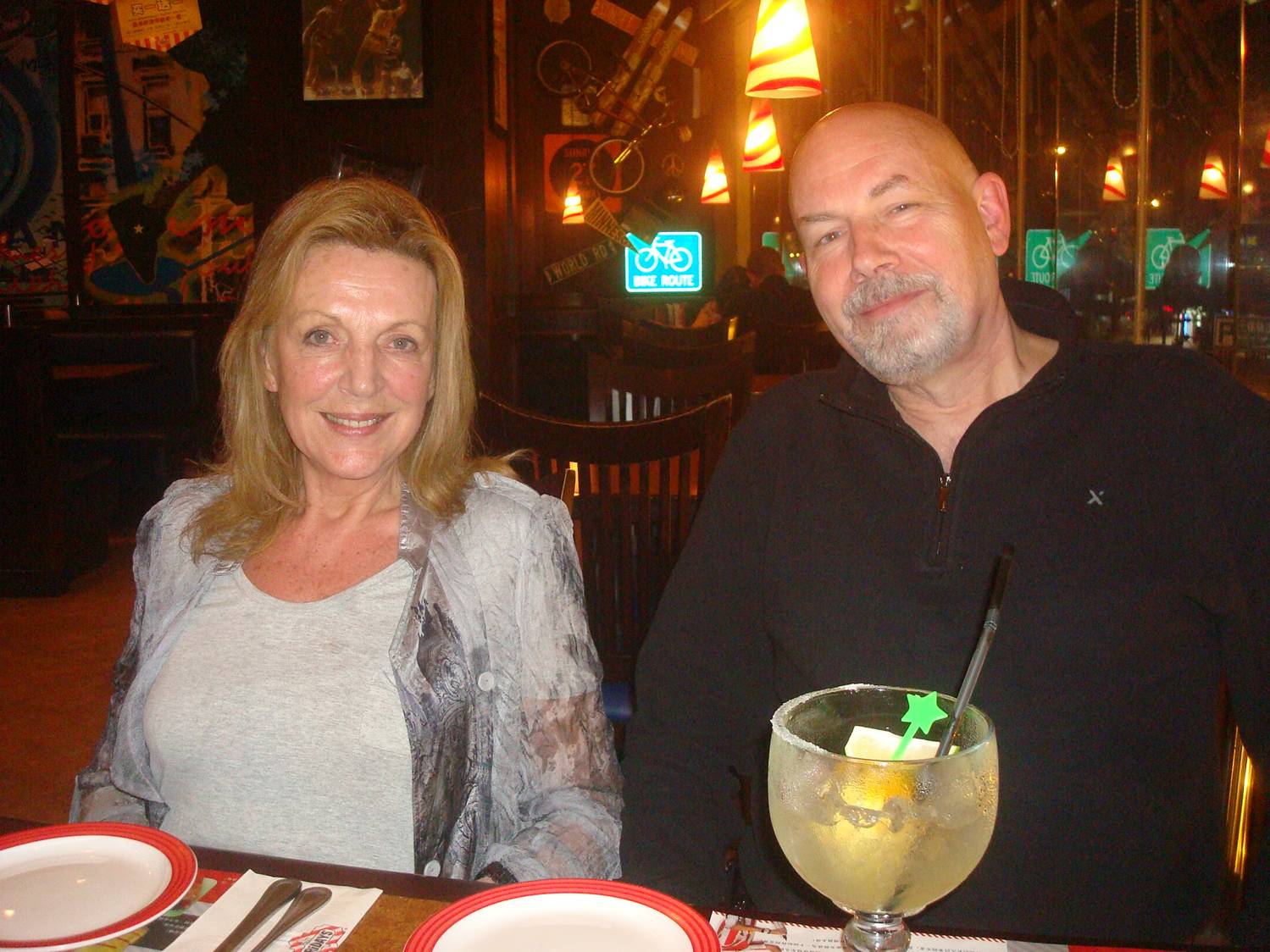
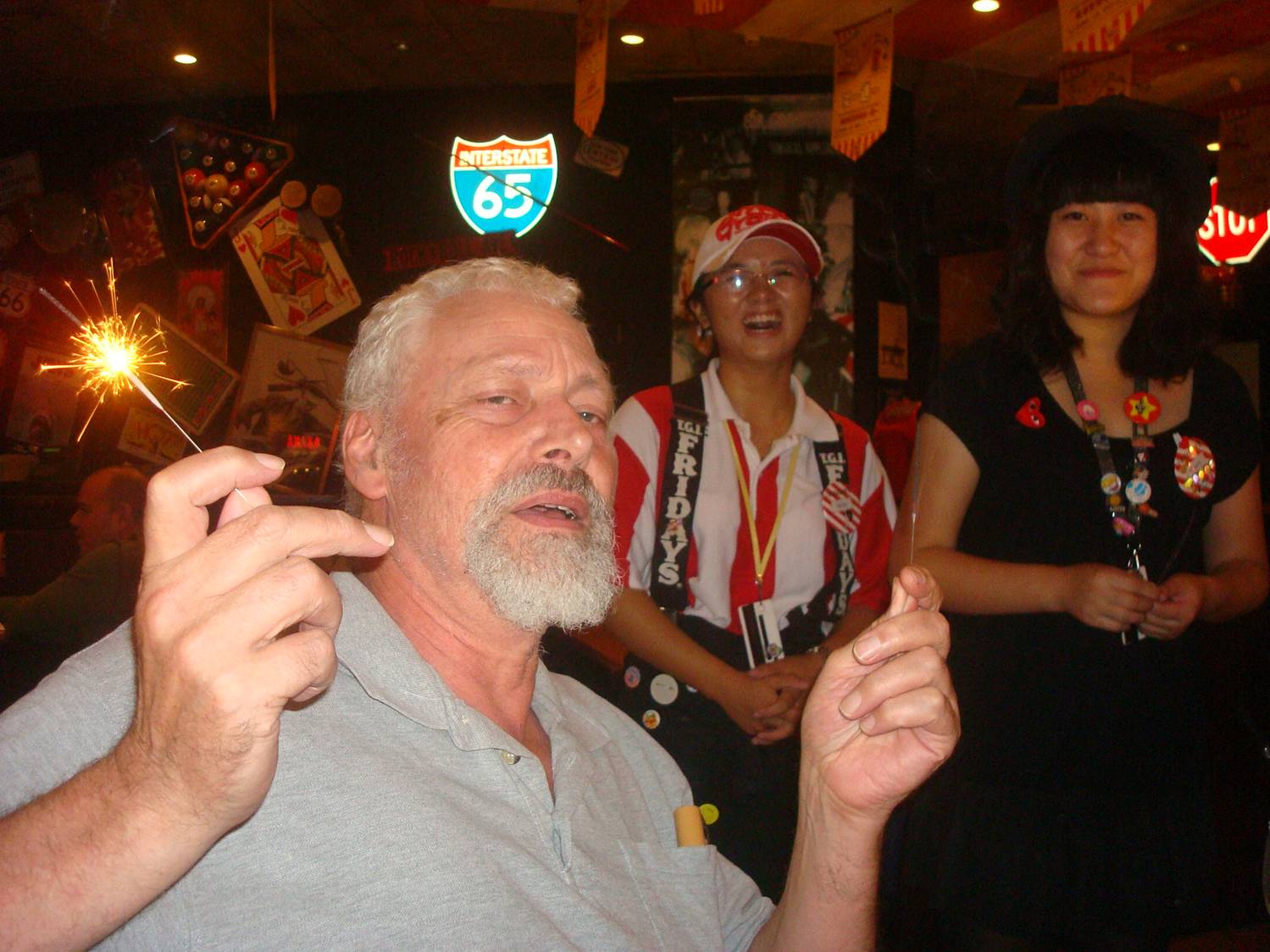
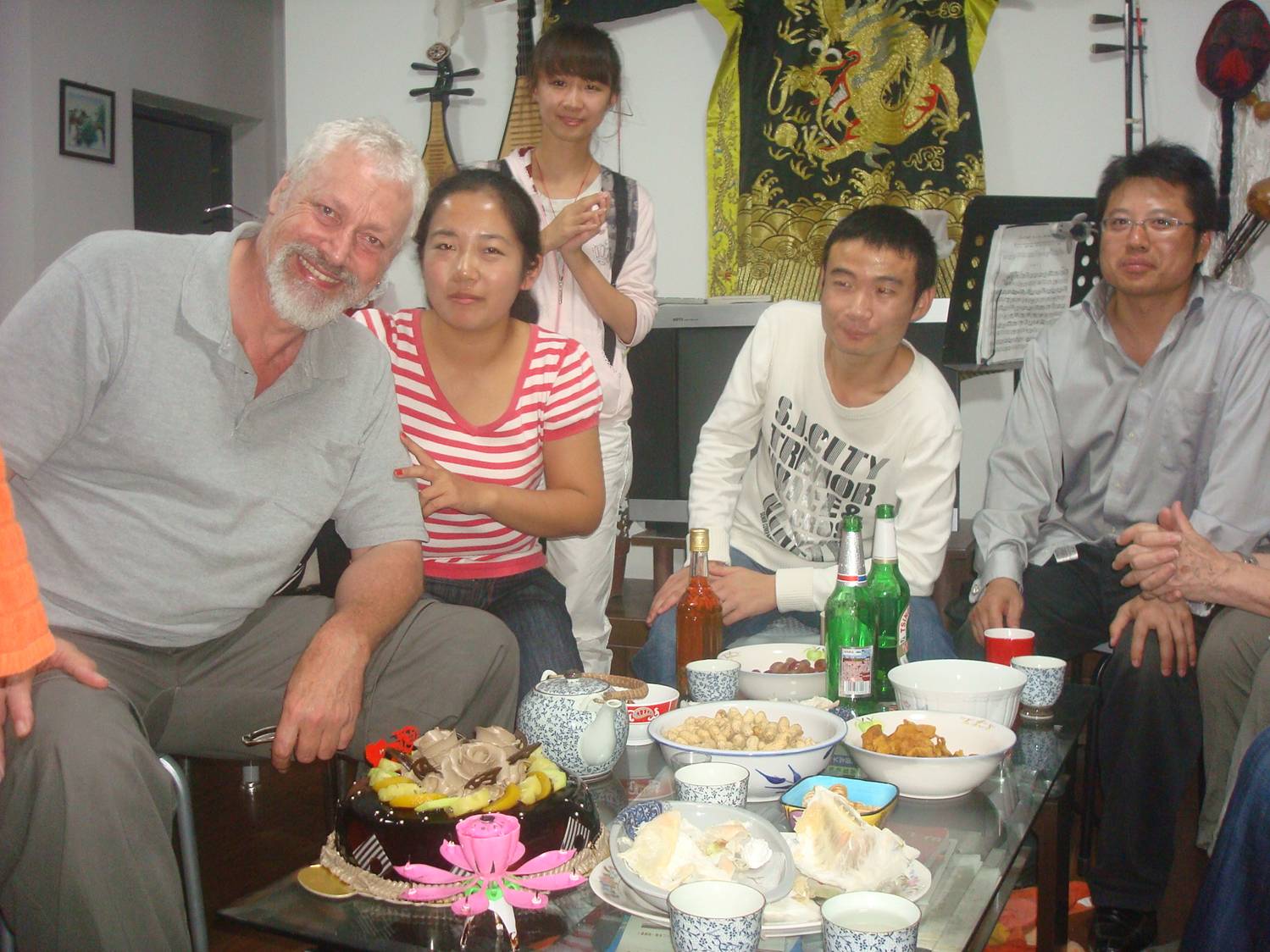
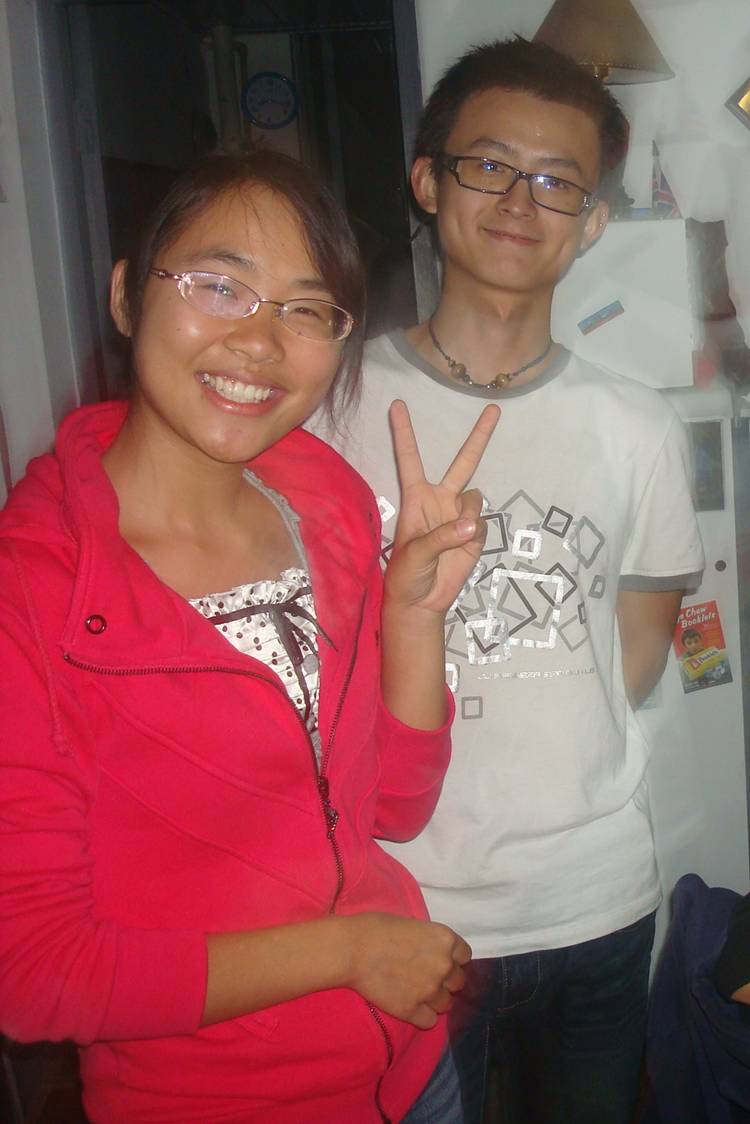
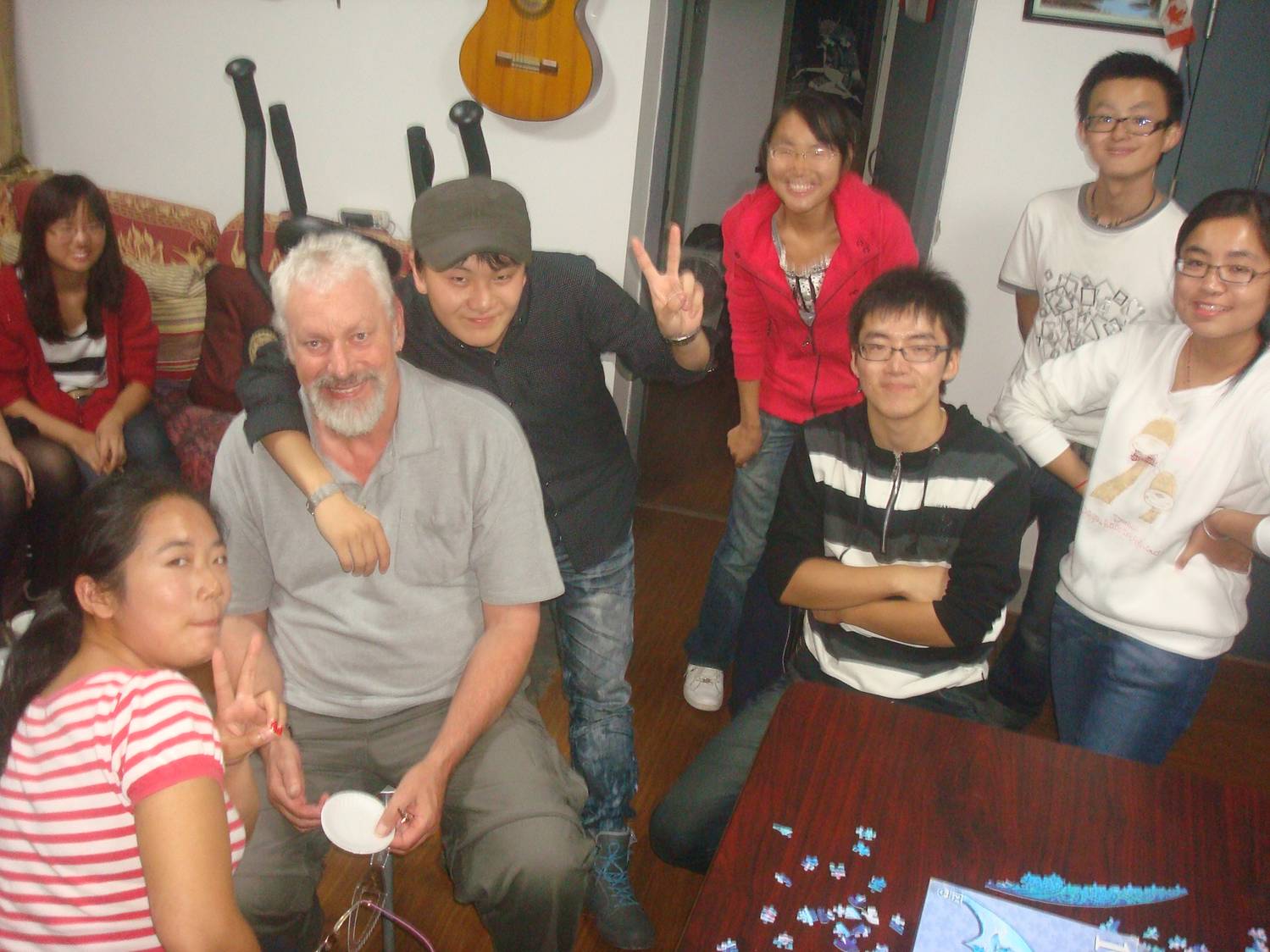
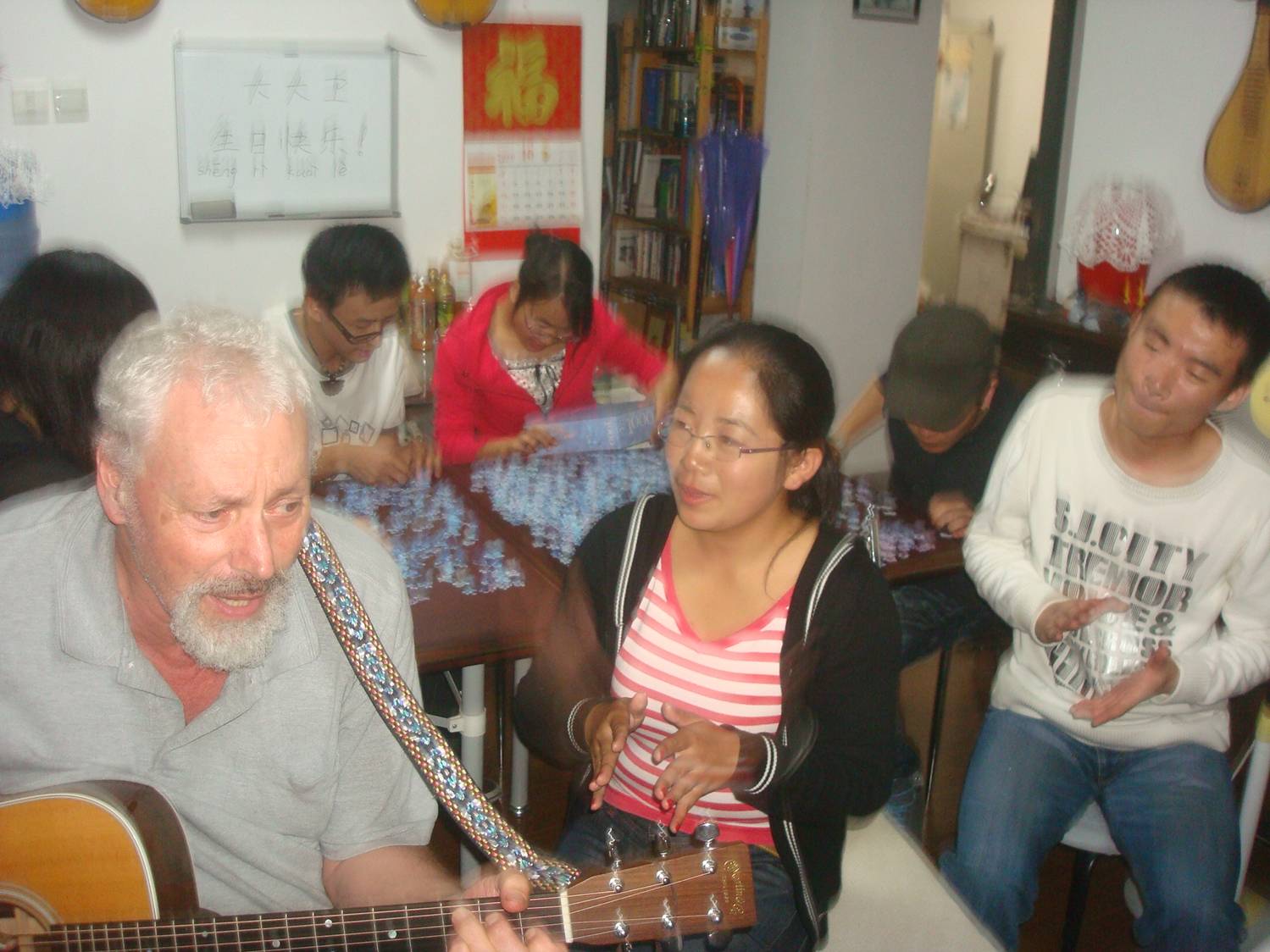
No
wonder I've had no time to post anything. My seventh birthday in
China, and things just keep getting better and better. But it's
hard to believe it's been seven years already. Time flies when
you're having fun.
This Weeks Oral English
Class - an inspiration.

This is a graph of a life lived, with age on the X axis and good times
on the Y.
For
this week's Oral English class I decided to talk about the shape of a
perfect life. I used to think that the perfect life went like
this: A boy is born into a loving family and has a happy and
carefree childhood during which he has incredible freedom to explore and
learn and play. Then the boy starts school, and has excellent
teachers. He's a naturally interested and enthusiastic student, so
all through school he has top marks, finally graduating as the class
valedictorian. He proceeds on to university, expanding and
enriching his knowledge, and finally graduates with top honours.
Then he goes into post-graduate studies to prepare for his profession,
emerging after another three or four years as a doctor, an engineer, a
lawyer, university professor, or if his interests take him into the
arts, as a journalist or editor or film maker. His early career is
a bit of a struggle, but he has breakthroughs and successes and earns
the respect of his associates. By the time he's in his forties he
has a happy family, is making a respectable income, and is well
established in his career, finally hitting the peak of his achievement.
He continues gaining respect and accolades, and becomes involved in
professional organizations and is recognized as one of the central
masters of his profession. Then, finally he retires to pursue his
hobbies, travel, enjoy some leisure time before it's time to lie down on
his death bed, gather his loving children, grandchildren, and great
grandchildren around him, say his last memorable and immortal words and
shuffle off this mortal coil having lived a full and rich life.
For years this was my vision of the enviable perfect life.


Chris Reeves lived a life that tasted the extremes.
Then, thinking about the kinds of lives I've actually seen lived, and
the life I've had, I realized that this is only one kind of perfect
life, and quite a rare one. This life tastes only the middle road of
existence. It doesn't experience the ultimate highs, nor the
ultimate lows, that life can offer. I thought about
Chris Reeves. Now there's a life that tasted the extremes.
Imagine, being handsome and famous, admired and sought after wherever
you go. And then a tragic accident that leaves you nothing but a
talking head. And then... well, I really had hopes that Chris
Reeves would live to see the day when he could be repaired and walk
again. I believe that day is coming, possibly very soon now
as tests proceed with embryonic stem cell therapies and regenerative
medicine makes new advances. Chris Reeves did not live long enough
to get back up to the heights again, but his life is a good example of
tasting the extremes.
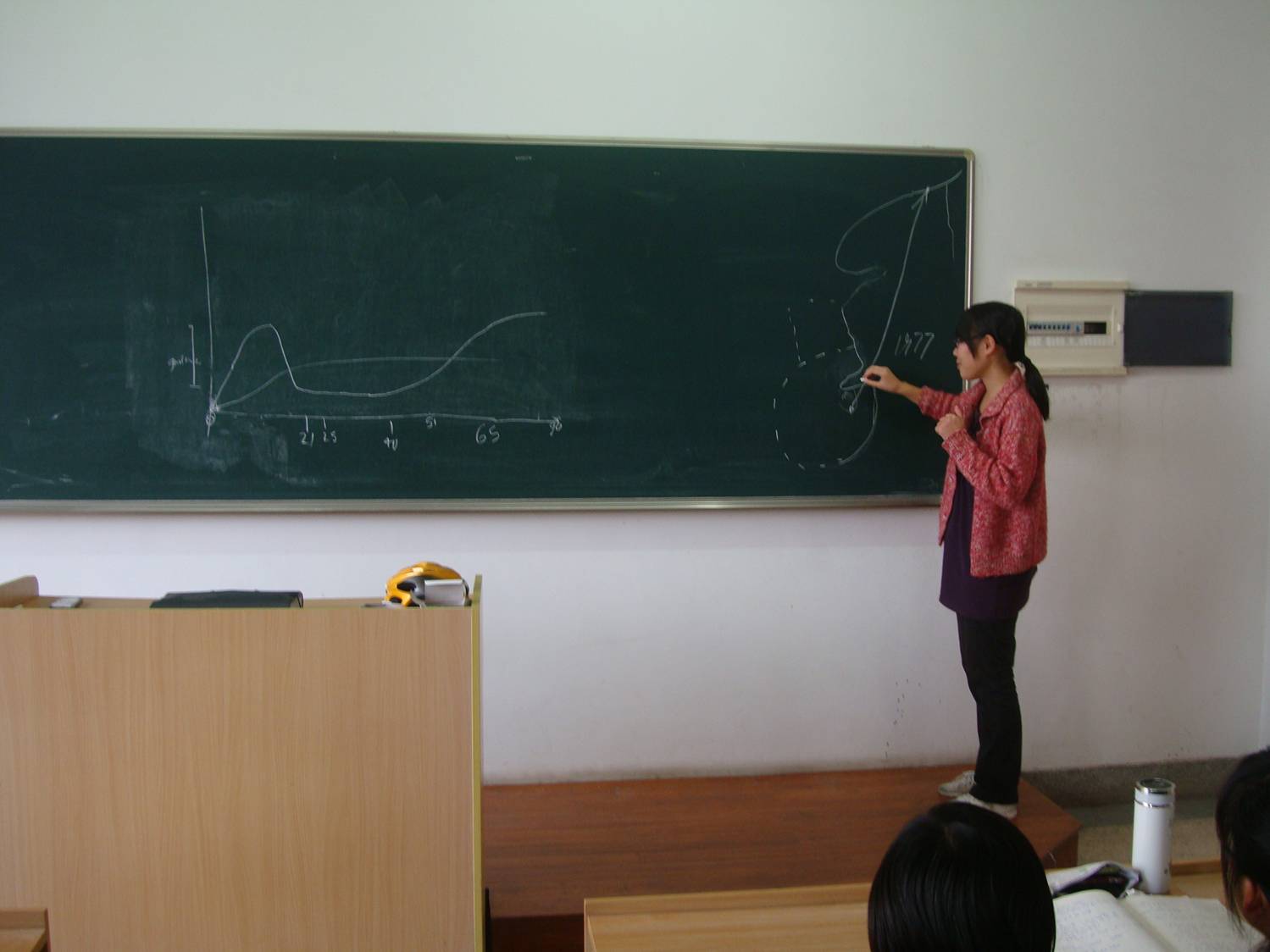
Lily tells us about her grandmother's life.
So
for my Oral English class today I talked to the students about "the
perfect life". I drew a graph of my original conception, the
steady progress perfect life. Then I drew the graph of my father's life.
Then Chris Reeves. Then I organized the students into small
groups. They were to discuss somebody they knew about, and decide on an
interesting life to describe, choose a representative speaker, and tell
us about a life. The result was fascinating. To hear my
students tell their grandfather or grandmother's story was a glimpse
into the history of China, replete with concubines and tragedies.
I'm going to repeat this for the rest of the classes this week.
Might was well make them fun for me too.
Comment on this Post
The Comments That I
Live For
This
comment came to me attached to an assignment sent in by email.
"Today you talk
to us about the reading 1 (The first reading assignment for my
non-English majors in my News Reading class - DJS.). Till then, I
realize I never analyse an article logically. It seems we never done
such practise before...I've learnt a lot."
Yes.
(Pumps fist in air) Makes teaching worth the effort.
Comment on this Post
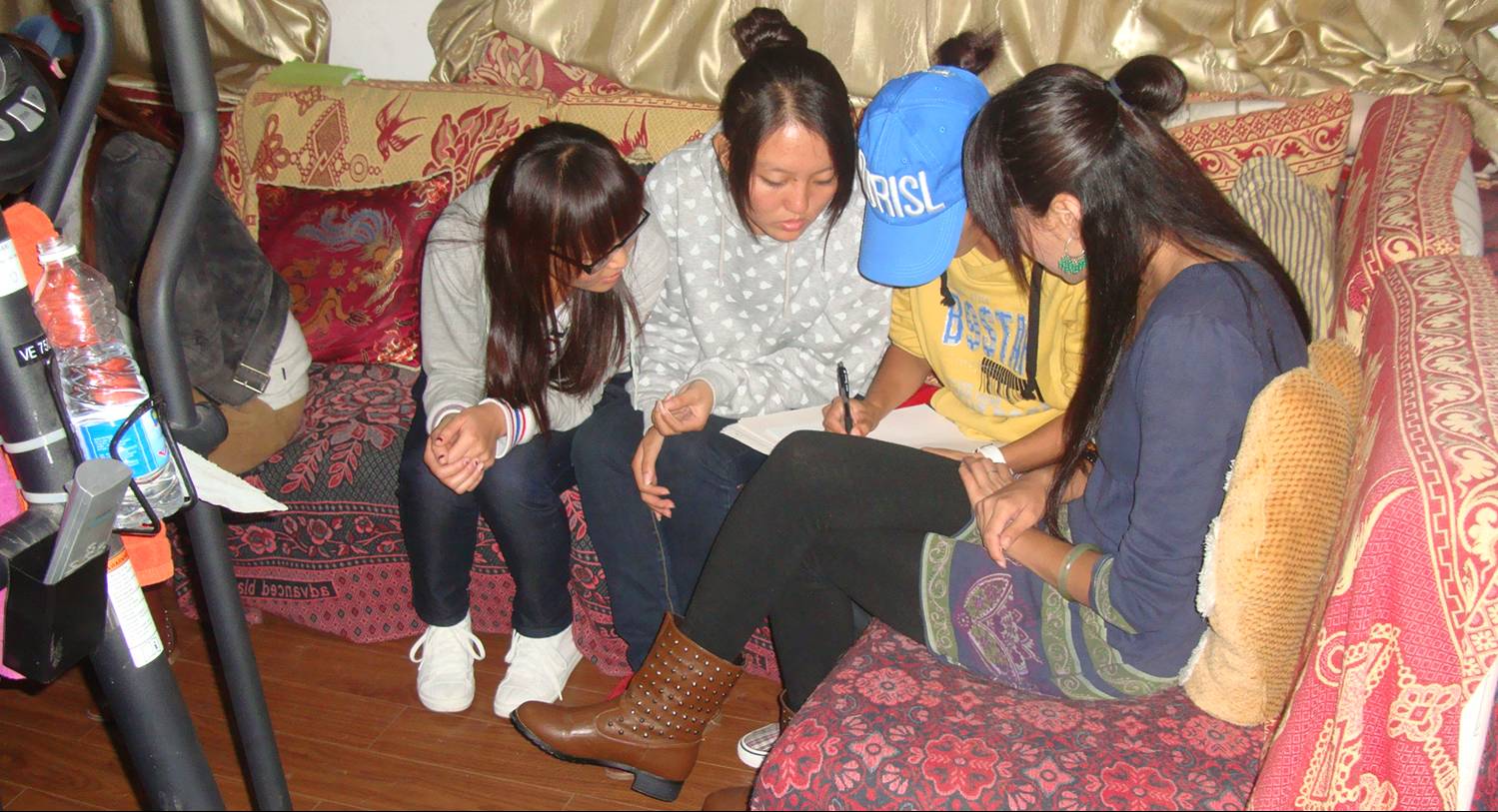
hinese Word of the Day:
西藏
(Xī zàng literally "west + store, conceal, hide) = p.w. Tibet
October 19, 2010 First
Meeting of the Tibetan English Club
We
have often noted that our Tibetan students are very shy, and often less
advanced in their English than the Han Chinese students. This is
not surprising since the Tibetans actually must become tri-lingual to be
here, learning both English and Mandarin. We've also been told
that Tibet has a problem getting good foreign teachers, who must give up
many western amenities to work there. So the English education
they get in Tibet is inferior to the rest of China.
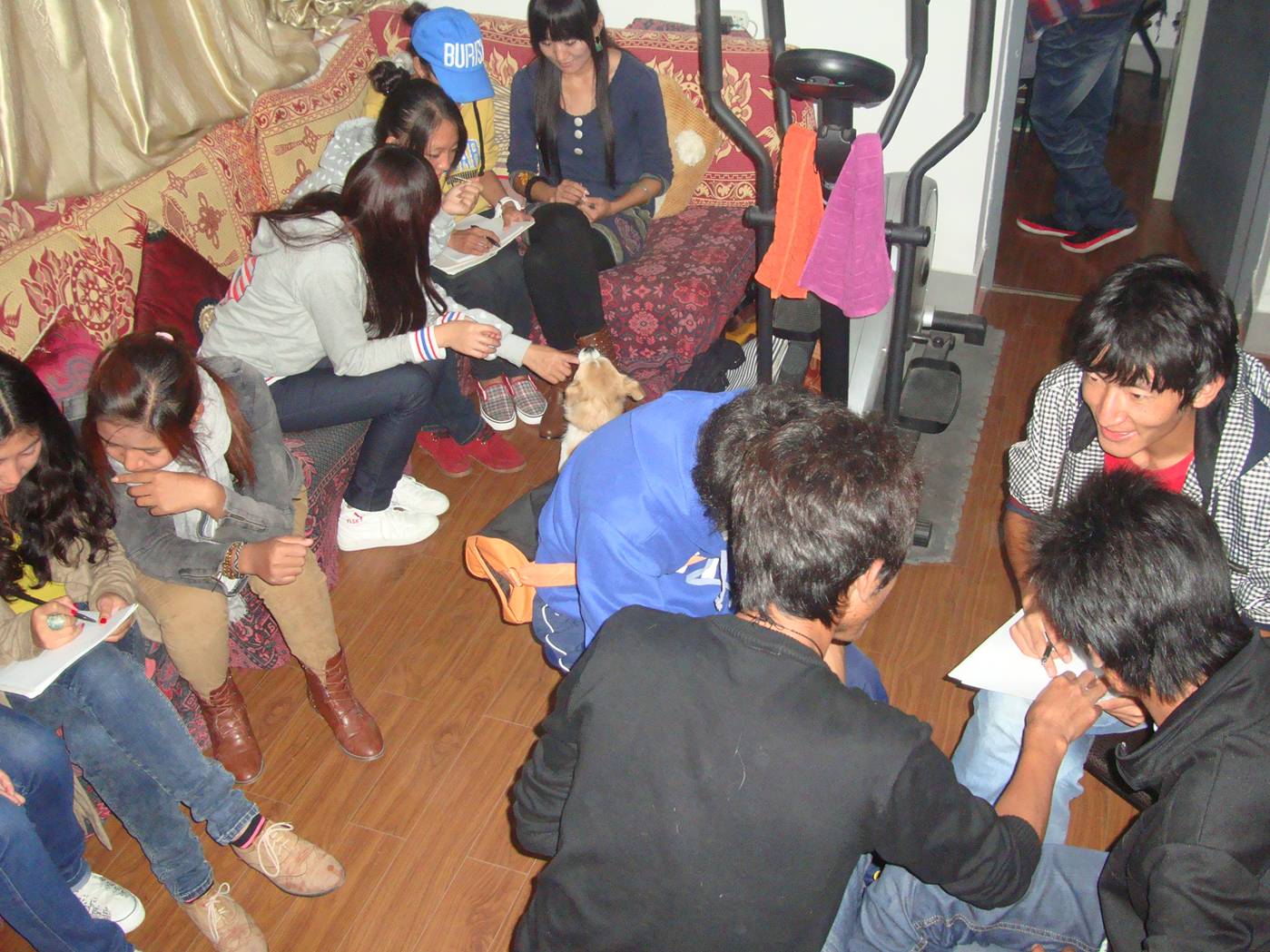
We've made many wonderful Tibetan friends here. I was particularly
touched when a delegation of Tibetans came to visit me in the hospital
last year. Unfortunately we've seen a few of them become
discouraged. One of the boys in particular became depressed, lost energy
for studies, and wasted a lot of the potential of his university
education. That boy has since left Jiangnan University, leaving us
feeling bad that we did so little for him.
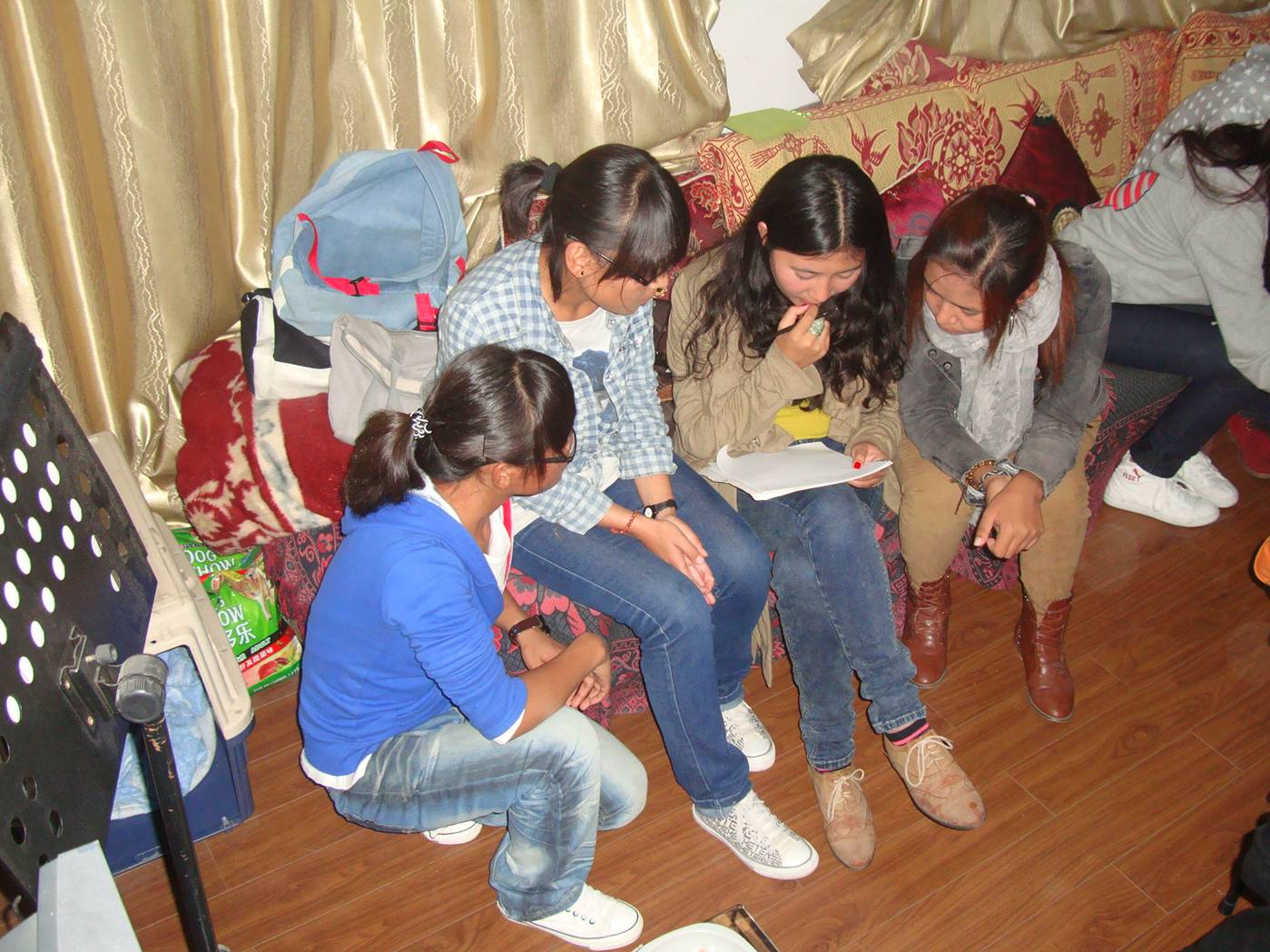
Last
year we decided to try to do something about the situation for the other
Tibetan students. So Sunday night saw our apartment invaded by Tibet, a
very friendly invasion by very polite and quiet invaders.
Twenty-four Tibetan students arrived for the first meeting of the
Jiangnan University Tibetan English Club.
Some
of the students are English majors, but many of them are from different
faculties.
Everyone participated in activities and tried their best to use whatever
English they have.
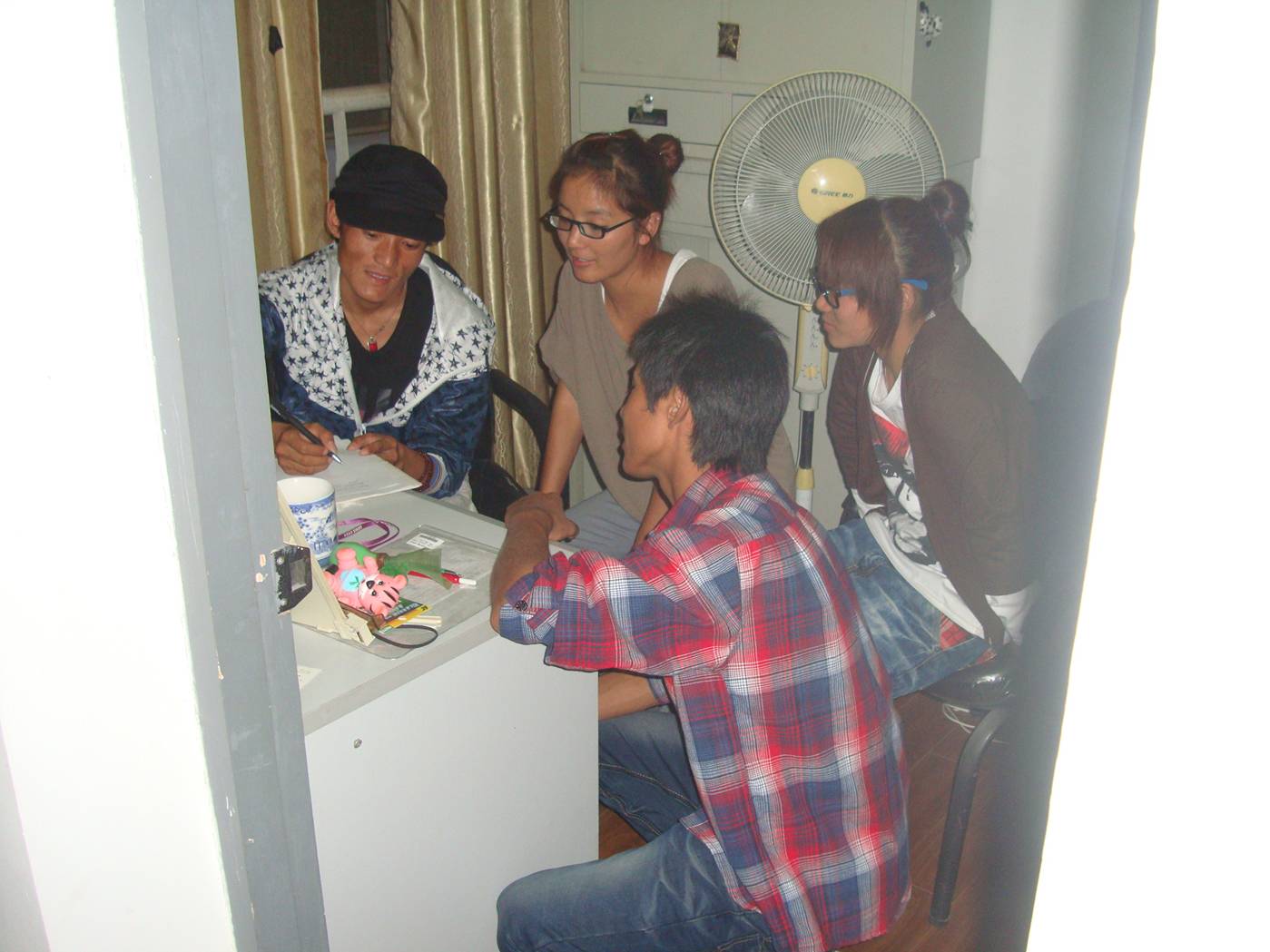
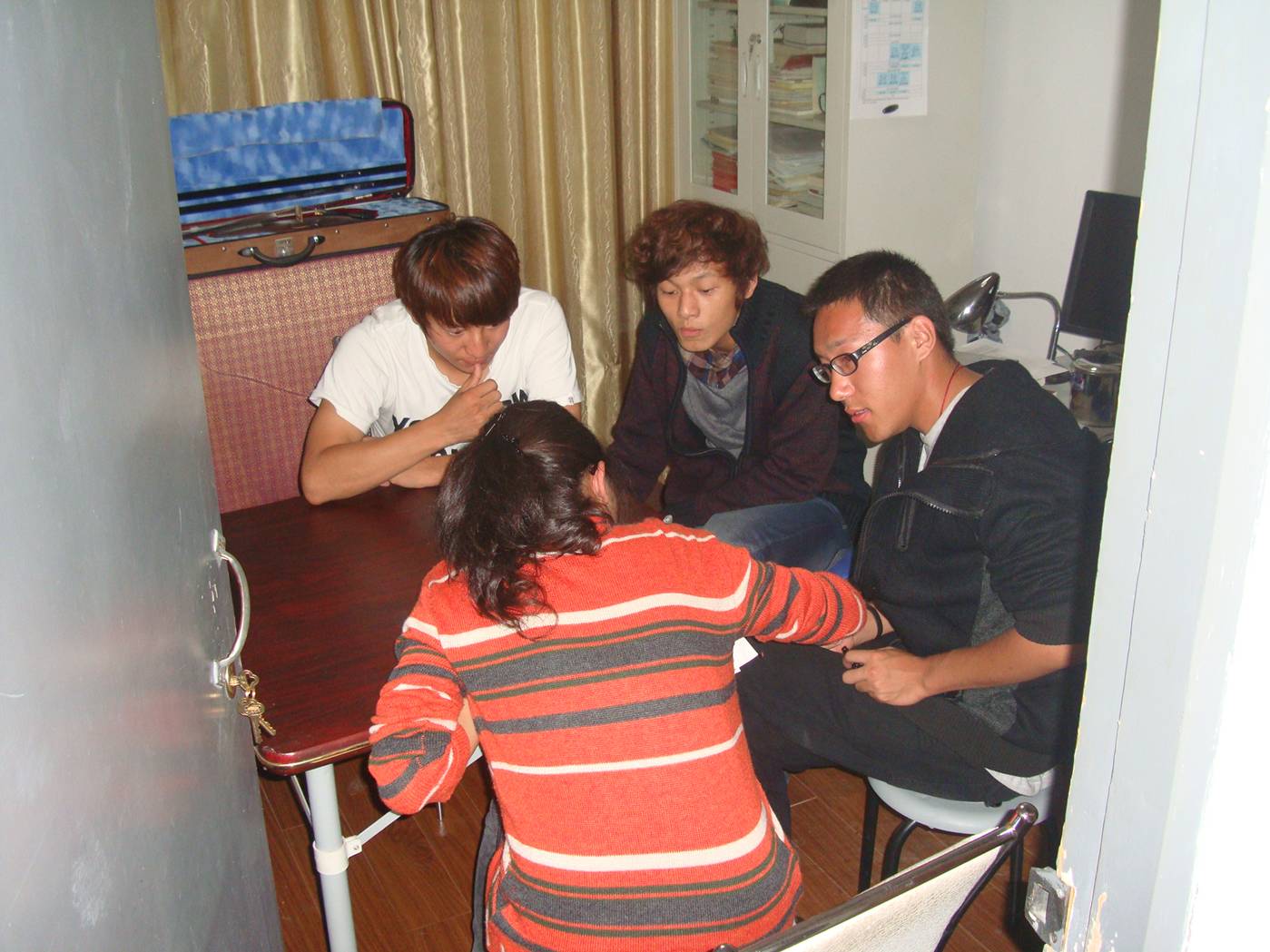
It
was a little bit crowded in our apartment where we held the main
gathering, so we split off groups of four to work in our offices.
But overall the space was big enough and worked out fine. We are set to
have the next meeting this coming Sunday. Very exciting! Ruth is looking
forward to getting a Tibetan name.
I'm sure that as we get to know our Tibetan friends,
and they become more comfortable with us and with each other, they will
make rapid progress. Unfortunately, two hours on one night each week is
not going to be all that much help. We're encouraging them to work
together and to help each other. If this can happen, they may get
surprising results.
We're
very encouraged by the first meeting. I think it was a great
success. My hope is that we are witnessing the beginning of a tradition,
and that the Tibetan English Club will become self-sustaining and
perpetual.
Comment on this Post
Changes in the Western
View of China
I
tell my students that it is not my place to criticize China, or to
become involved in Chinese politics or interfere in Chinese sovereignty.
This is their country. I'm a guest here. I wish to be
respectful and polite.
It is
part of my job here, however, to tell my students how westerners view
China, and to help them understand western culture. Many students have
asked me my opinion of this years Nobel Prize Winner, Liu Xiaobo.
I tell them that I don't have an opinion, since I can get no information
about him. But I also tell them that when a government prevents
people from getting information that the rest of the world can see,
to
western eyes
that
government looks guilty and frightened and weak. Those leaders
look like they must be ashamed of something, because they won't allow
anybody to talk about it and block all
Internet sites that mention it. I tell my students that I am truly
sorry if they are offended by this, but please don't shoot the
messenger.
The
Nobel Peace Prize is awarded by a five person committee in Norway.
Five people. The committee is not part of the Norwegian
government, or even representative of the Norwegian people, and it's not
under the thumb of America or anybody else. The Norwegian
government has nothing to say about who gets the prize. There is no law
in Norway that would allow the government to interfere. They'd be
laughed at if they tried. When China cancels trade talks in
protest, it looks to westerners like China thinks Norway is just like
China, with strict state control. And when China puts pressure on
Norway, China just looks foolish, like an unhappy bully looking for
somebody to hit even if that person has nothing to do with the insult.
Again, I'm sorry if my students are offended by hearing this. But
it is the western view of China at the moment.
China changed the opinion of the world with the
Olympics. Suddenly people from the west were saying that China has
changed, that China is a modern country just like western nations.
To this westerner, it seems a shame to throw all that expensive public
relations away but blocking access to Facebook, Youtube, and now any
mention of the Nobel Peace Prize winner on the Internet.
When Nelson Mandela received the Nobel Peace Prize he was in jail in
South Africa because of his opposition to apartheid. Many nations
were involved in pressuring South Africa to change that official policy.
I'm sure that the regime in South Africa saw that pressure as
interference with their sovereignty. But there was validity to the
criticism, and South Africa eventually managed to peacefully change.
Nelson Mandela was released and became the first democratically elected
leader of his country. He is now one of the most respected public
figures on the planet. I ask my students to accept that some
criticism of China is well intentioned and that there may be some
validity to the western criticism of China as expressed by the Nobel
Peace Prize. We can't really decide whether this is true or not if
we can't have access to information.
Just about any westerner would say, with all respect,
that if Liu Xiaobo is a criminal who belongs in jail, the proper thing
to do is to make that case publicly. Show everybody the evidence.
Allow open discussion. If China wants the respect of western
countries, China must deal with this as any
western country would.
On the other hand, if the Chinese don't really care how
the world views China, perhaps the leaders are doing what they must do
to keep the peace. Then only one
question remains: Can China have an open economy without an open
communications system? This is a question only the leaders of
China, and the future, can answer.
My students have explained to me that the Chinese value
social harmony, and that controls over the press are justified in the
interests of
maintaining 和谐社会 (hé xié shè huì) "harmonious
society". Canada has never seen the turmoil that China has endured
within recent memory. We really can't imagine
it. Older Chinese friends have told me of times when people ate human
flesh to survive. Perhaps if we'd had more blood flowing in our
streets, more hardship and privation, we'd be more sympathetic to
the Chinese point of view on state control.
I
have come to love China and the Chinese people. I've also come to
have great respect for the leadership of this diverse and difficult
country. They have managed to energize their nation. There
is such optimism here, fueled by entrance into the WTO, by the Chinese
space program, by Yao Ming, by the Olympics and now the Shanghai World
Expo. Everybody in the world admires the recent Chinese
achievements, the amazing improvements in the standard of living, the
declining infant mortality rate, the new environmental consciousness,
the outstanding economic growth. But I hope China can accept that
some western criticism may have validity, and may call for some changes.
I wish China a very bright future as a world leader,
not just economically but also morally and spiritually.
Comment on this Post
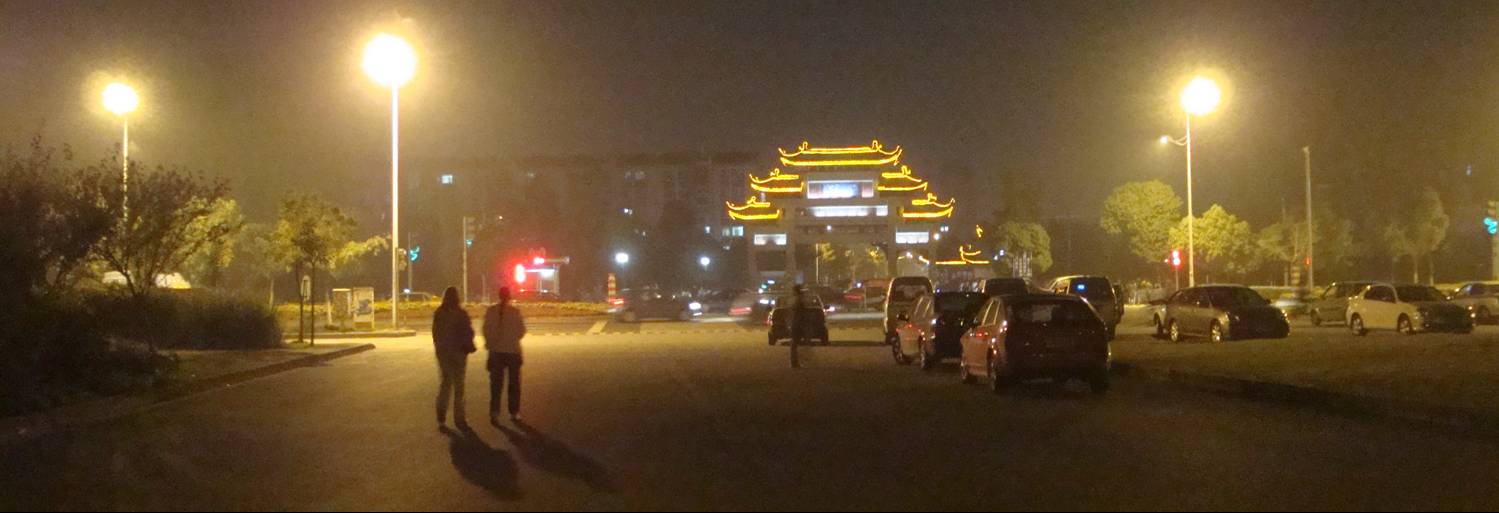
Chinese Word of the
Day: 烧烤
(shāo kǎo (literally roast, cook, burn + bake, roast, cook) = n./v.
barbecue
October 17, 2010 Fall
in Wuxi is Perfection
This
is the time of year we love in Wuxi. The weather during the day is
warm enough that we don't even need a jacket, but not hot at all.
The humidity is much lower than it was a week ago. The evenings
are a delight. Last night we took our Australian friend, Marion,
into the nearby village for a barbeque.
Last night the village was celebrating the double nine
festival. Here's what one of my students wrote to me about it:
Dear David:
I’m very happy to tell you something about our traditional
festival-The Double Ninth Festival (in Chinese is 重阳节 chóng yáng
jié). The day is on lunar September 9th so that we call it Double
Ninth.
People on this day will climb mountains. I think it is
necessary to exlplain the word ”climb mountains”. It is not an
exercise to keep your body healthy as we usually think but an
activity which has the meaning of going up in one’s life step by
step. Along the way to the mountain top,people can admire the
beauty of chrysanthemum. Now here comes another activity-drink the
chrysanthemum wine. Mix the chrysanthemum, the leaves and the
wine, then comes the chrysanthemum wine. It is said that if
you drink this kind of wine,you probably to prolong your life.
It is very interesting to have friends get together and
admire the beauty of the chrysanthemum with the wine ,isn’t it?
People will also to eat "chóng yáng gāo 重阳糕",a Chinese pastry.
Because climb mountains (in Chinese dēng gāo) is homophonic with
gāo(糕), we eat chóng yáng gāo instead of climbing mountains
sometimes but still take auspicious meanings of going up in one's
life step by step.
This is the very brief and simple introduction, but I
think it's better than none. This Saturday is The Double Ninth
Festival, and our class will go to the gerocomium near our
university to make the Chinese pastry-chóng yáng gāo for the
olders. I'm not sure whether we can make it but the process is
more important, I think. On Sunday, we'll climb mountains with our
headmaster.
Hope you can feel the festival atmosphere when you go
out .
Addition:you can buy the chóng yáng gāo in Mu Gui Ying, a Chinese
food restaurant in NanChan Temple (attention! it's not a really
temple, but you can eat and buy something there)
Best regards
Lily |
So
last night the weather was perfect and the village square was full of
dancers and a young man was making a fire balloon and a table where
onlookers watched a xiangqi (Chinese chess) game.
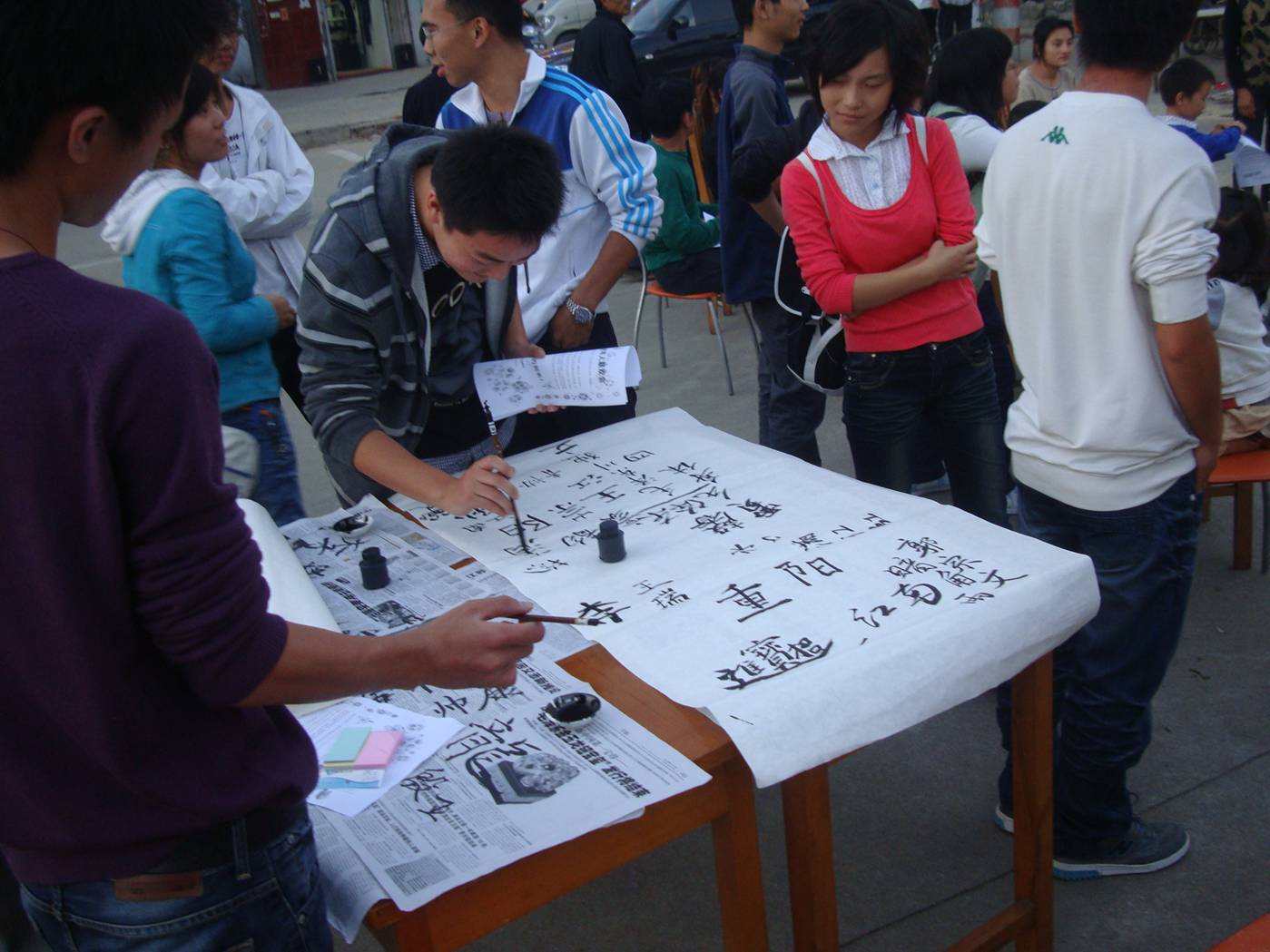
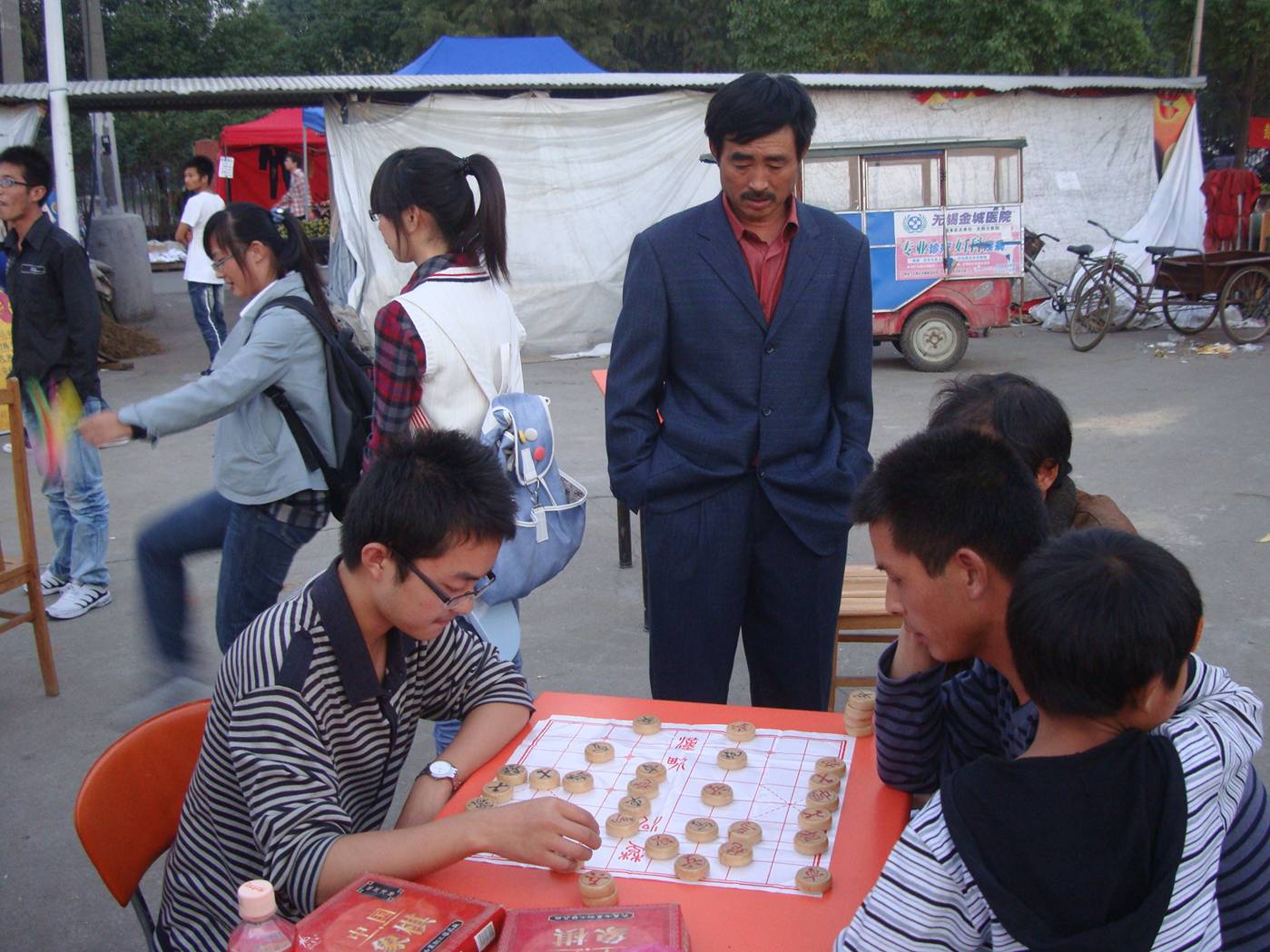 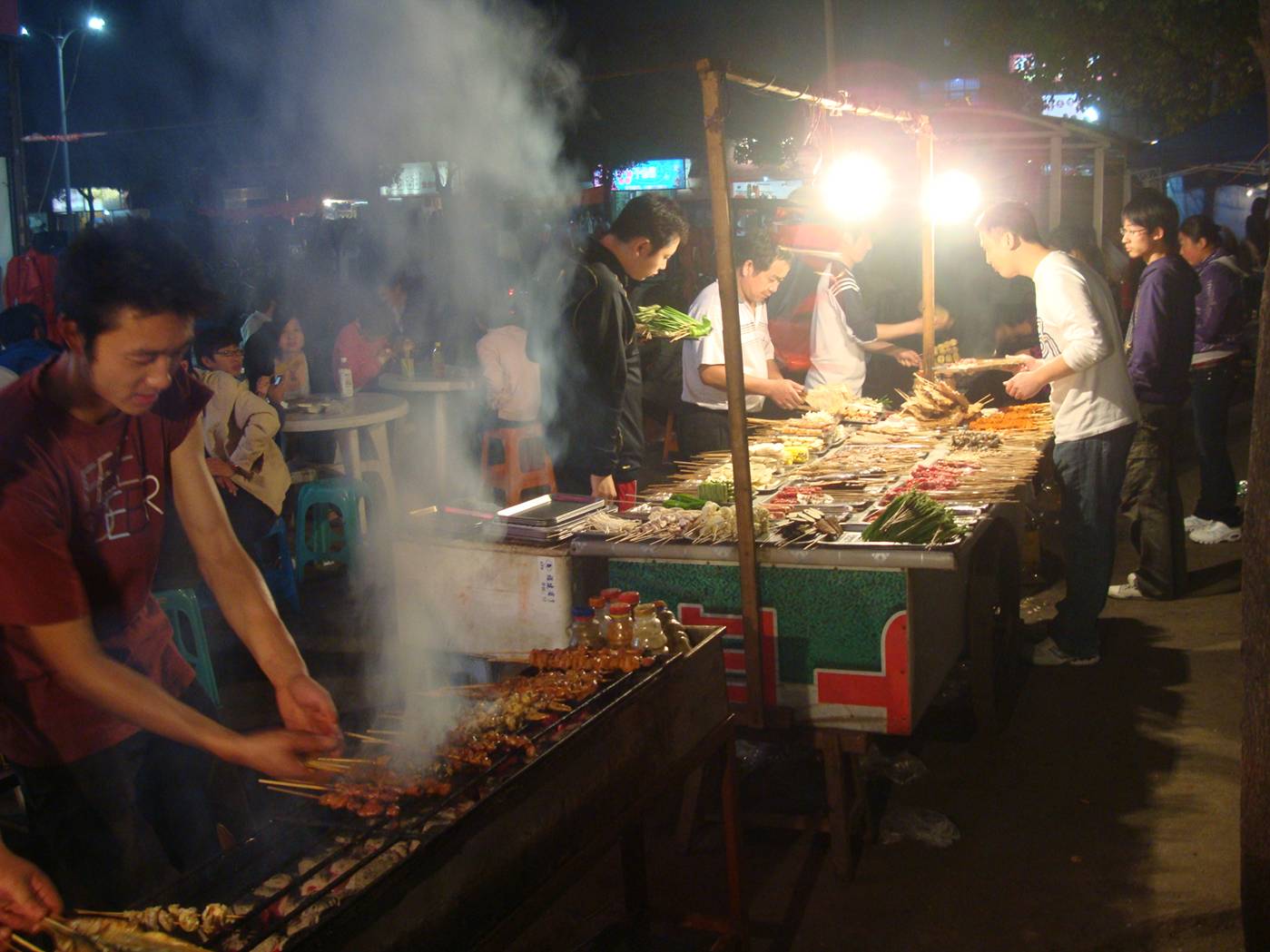
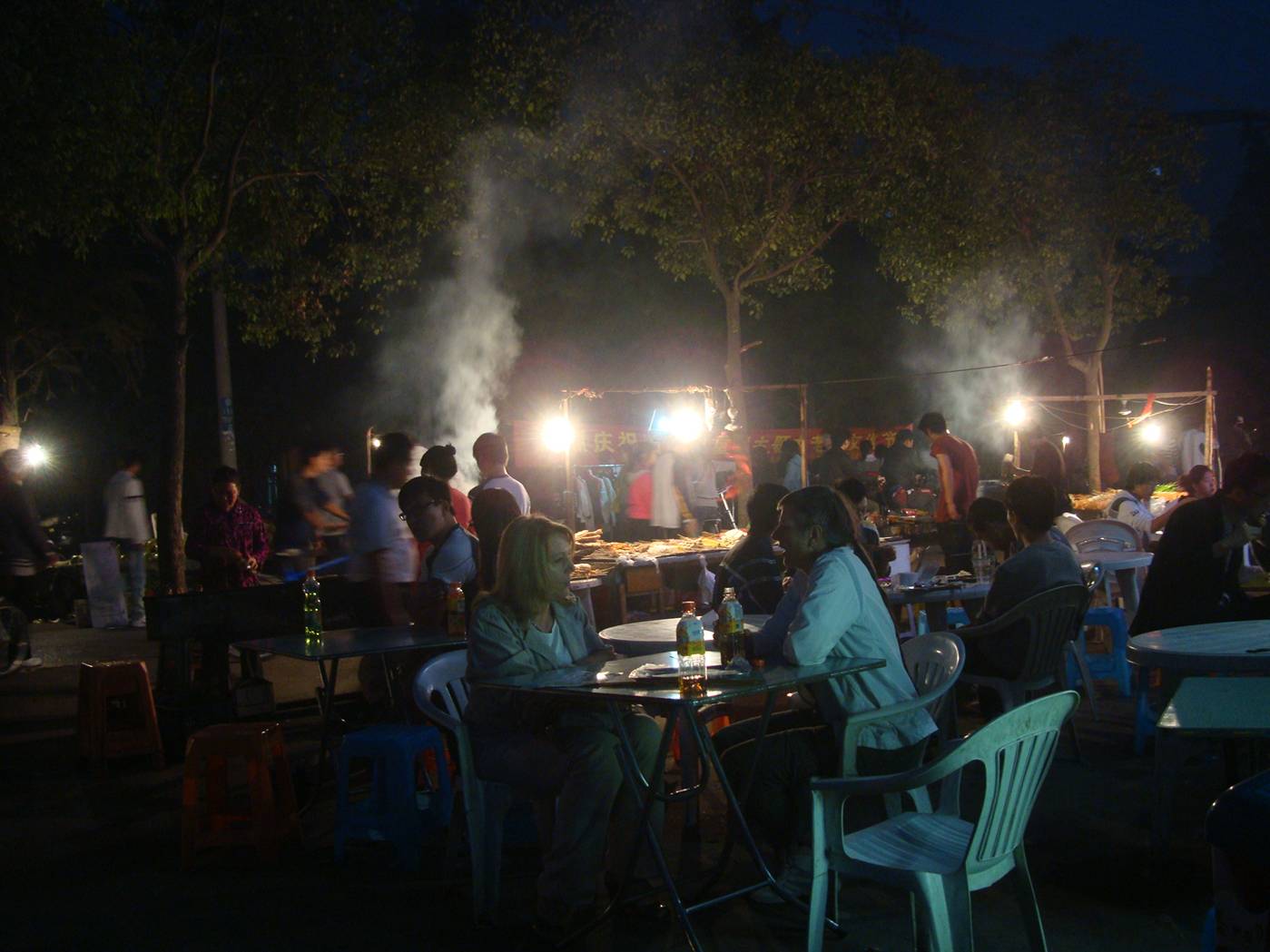
We enjoyed the tasty barbeque surrounded by the sounds and textures of
China. Delightful.
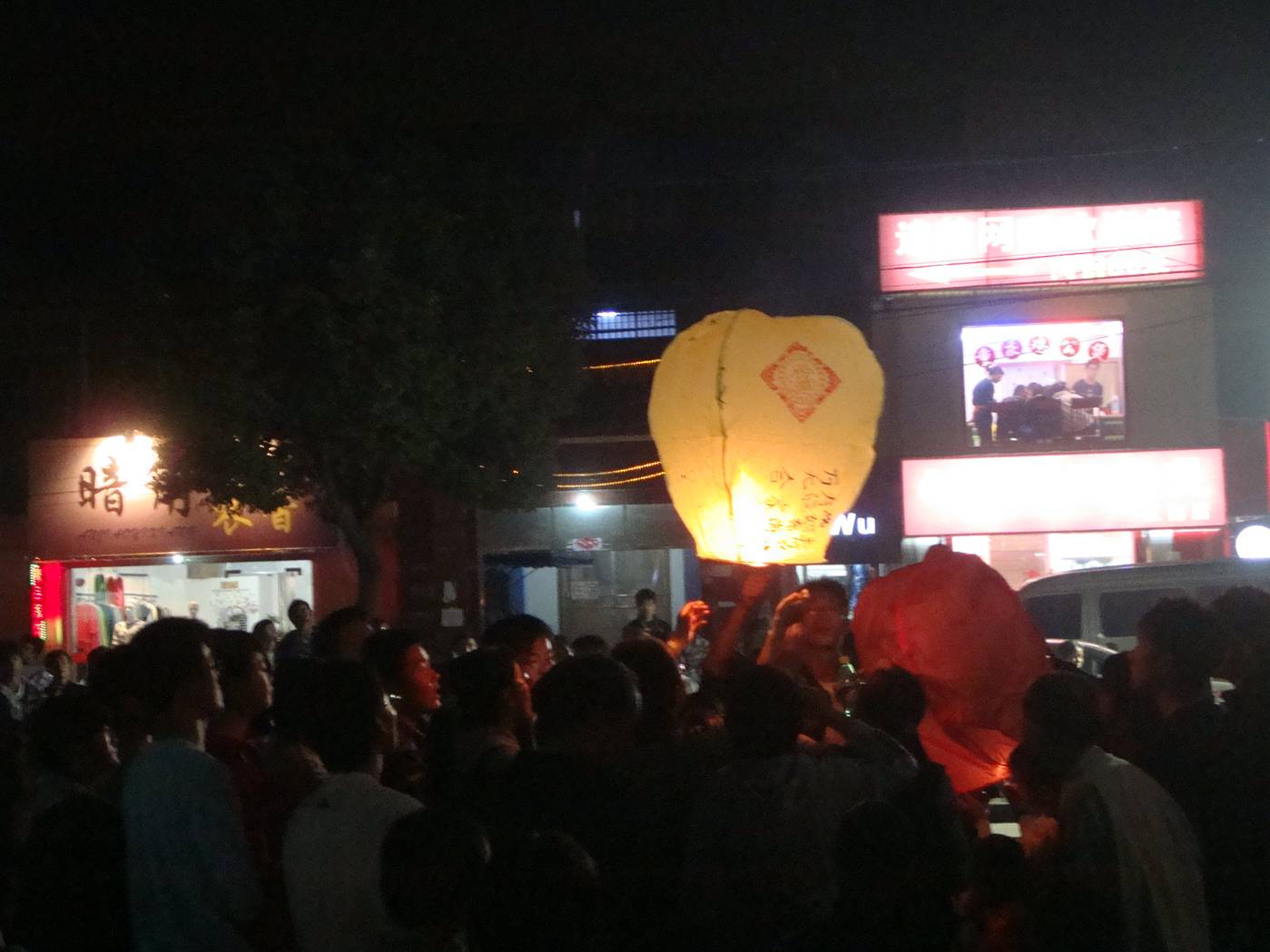
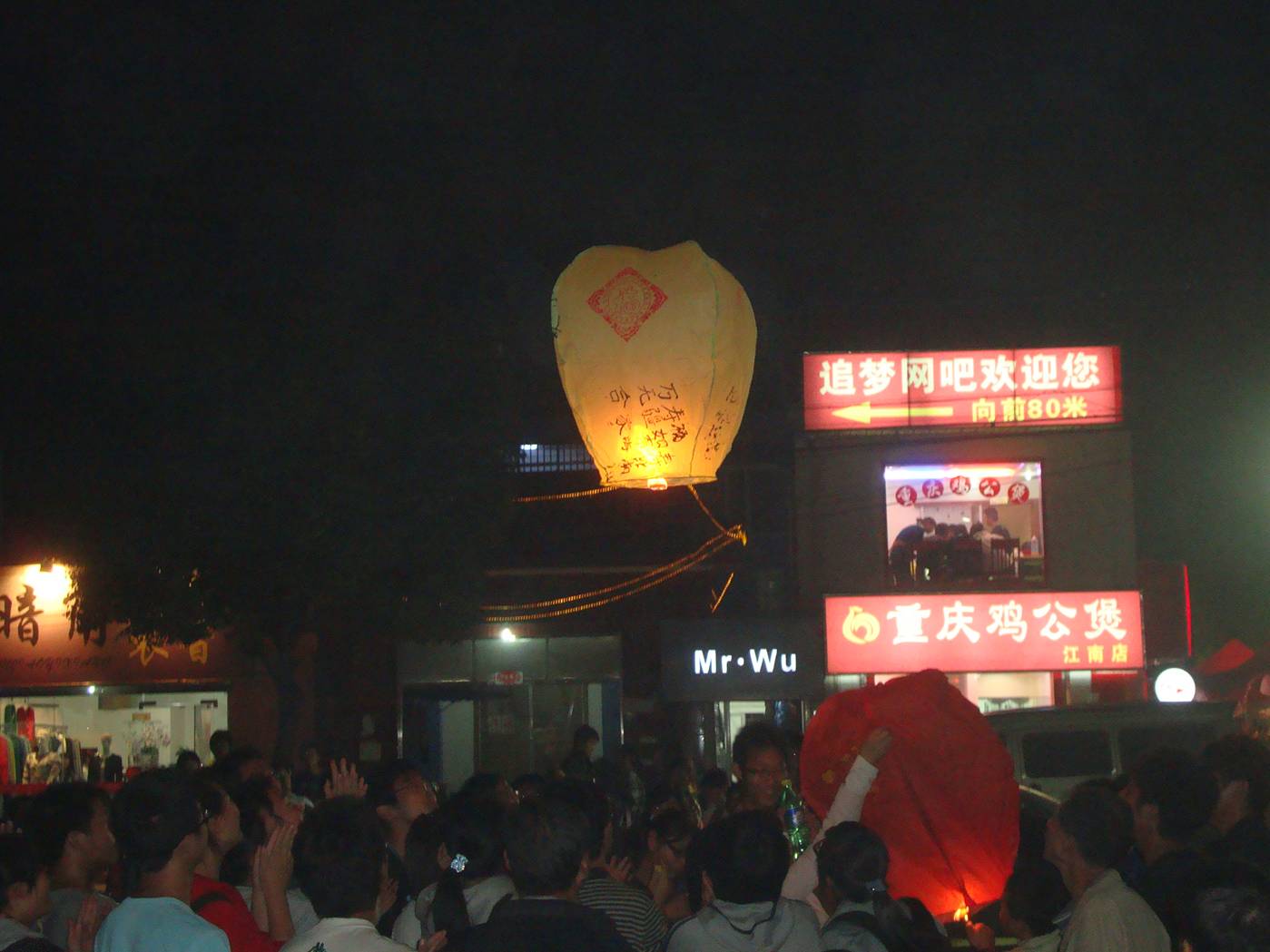
A hand crafted fire balloon rises above the crowd. It's a good thing
that none of the roofs here are flammable.
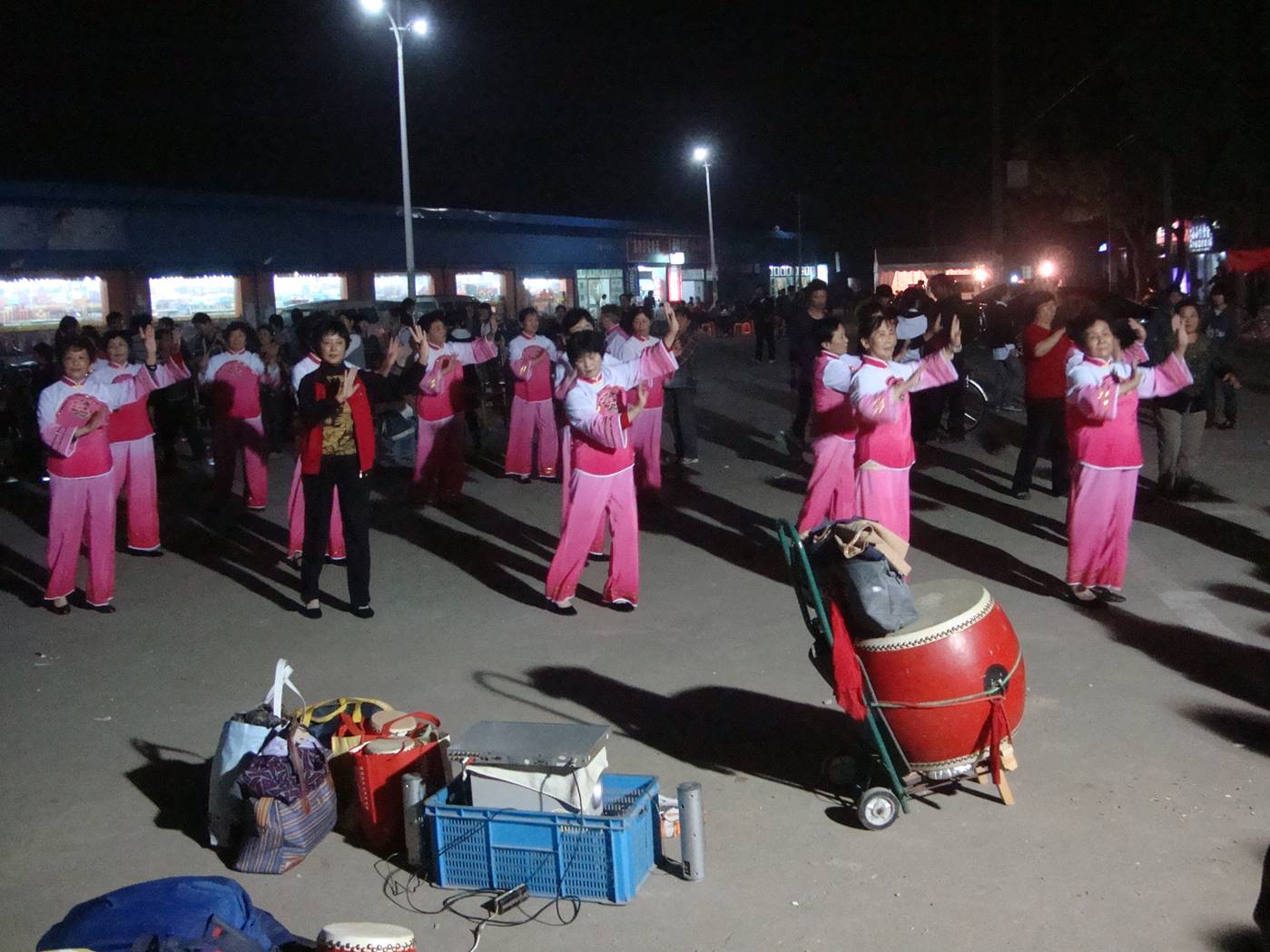
To get some idea of the background sound, you need to click on the
picture and wait for the
short video to download.
Comment on this Post
The English Speech
Contest (Again)
Once
again, Ruth and I were honored judges at the English Speech Contest.
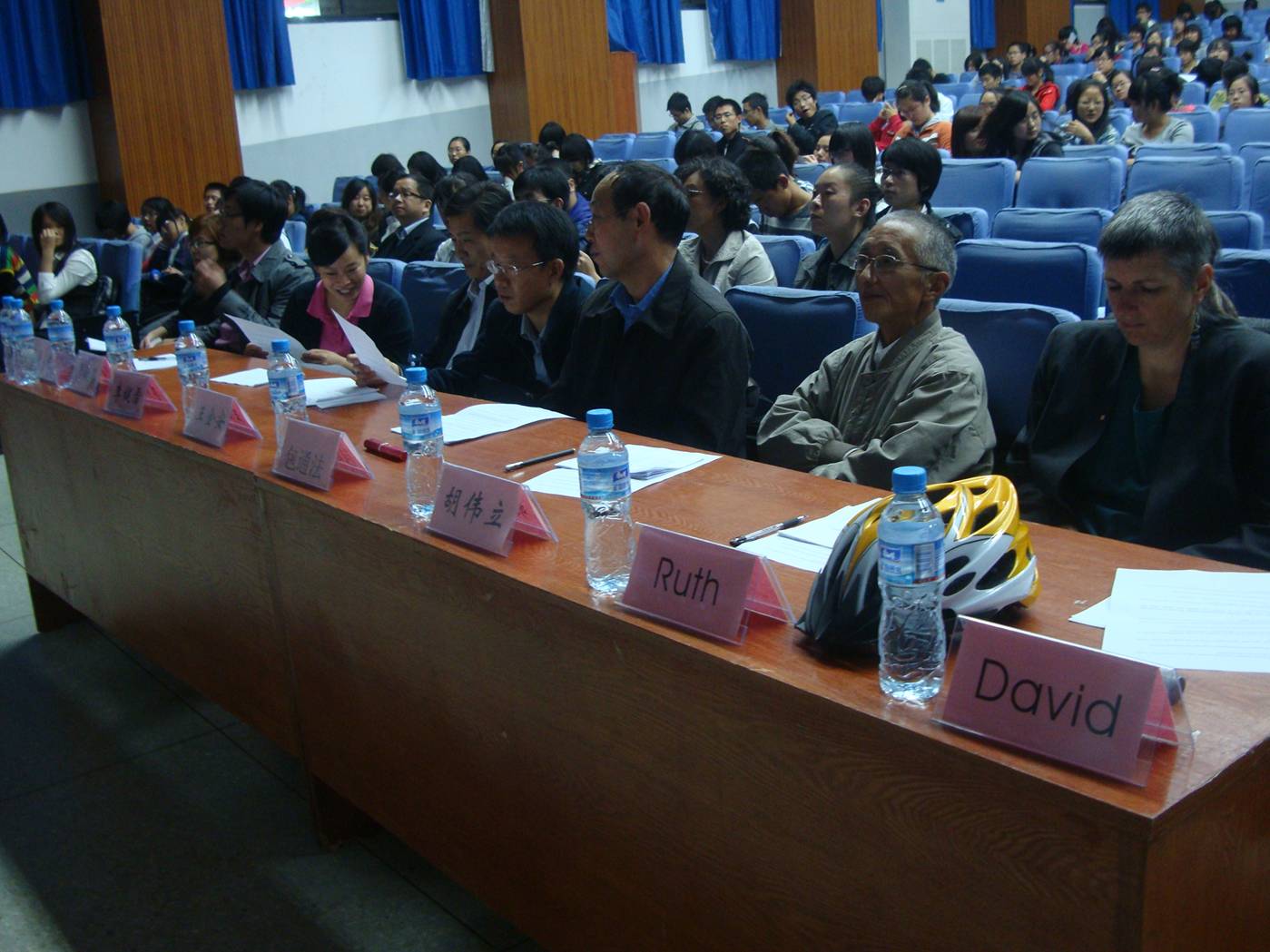
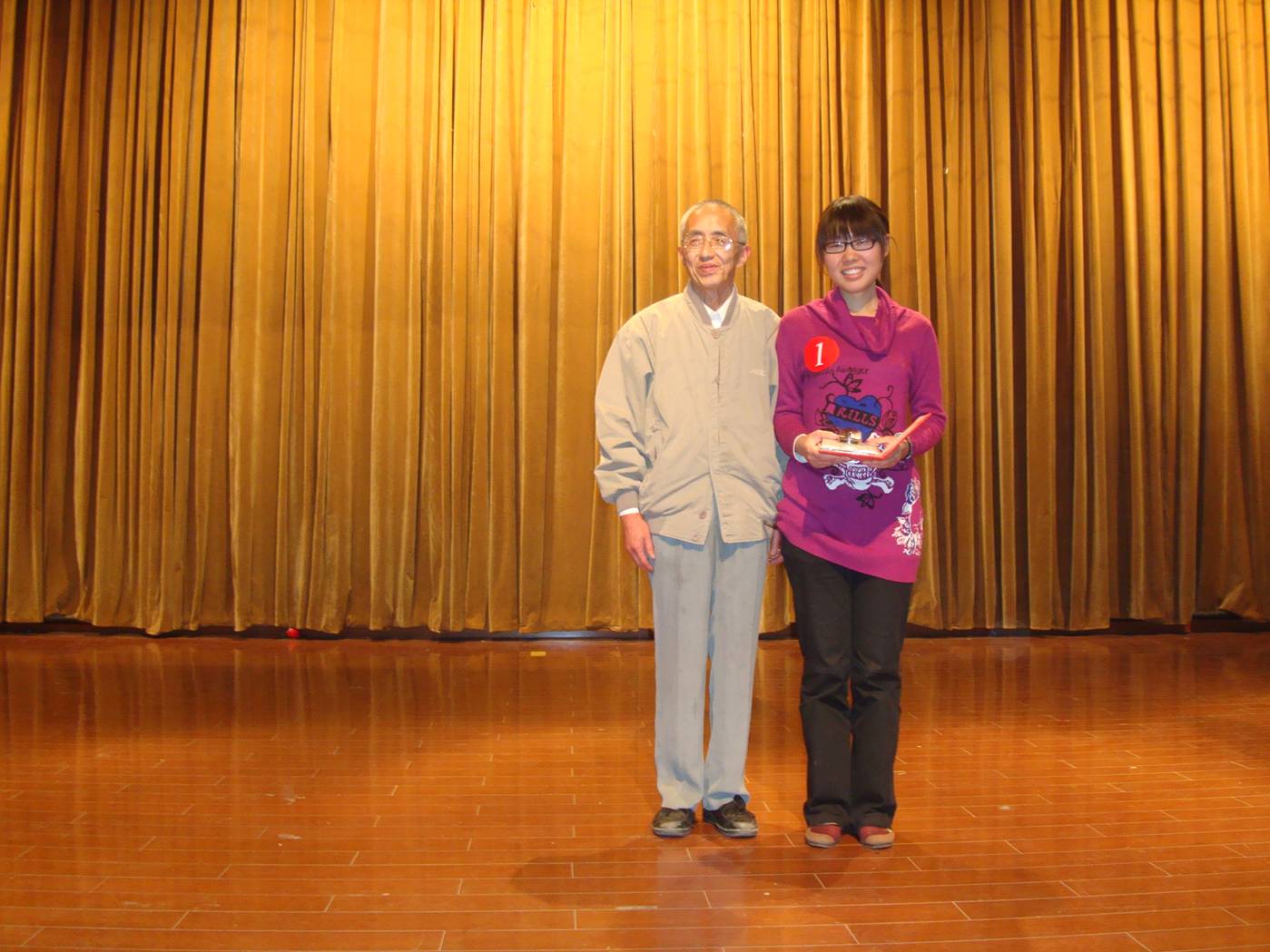
Congratulations to Lily. She will now go on to the finals in
Yangzhou where she will represent Jiangnan University.
Once again we were impressed by the ability of these
students to think on their feet in a language that is not their mother
tongue. Truly inspiring.
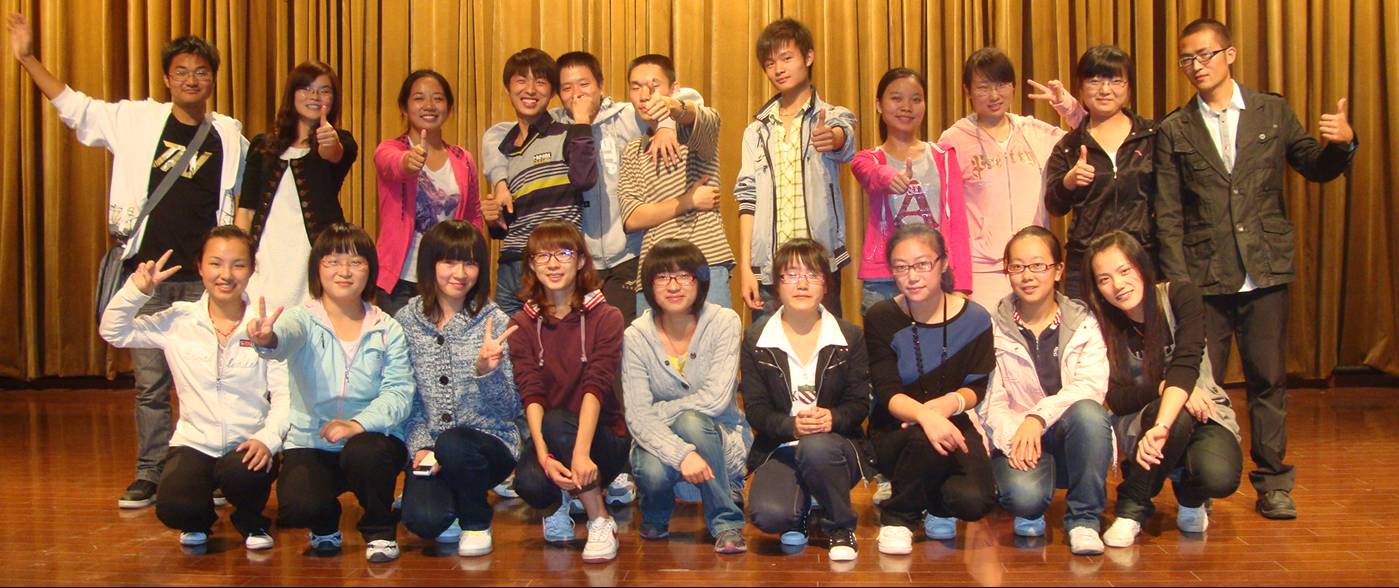
These are some of the students I like here, the ones who volunteer and
participate, the organizers and helpers at the speech contest.
Good work, you guys. You are really getting the benefit of your
university education.
Comment on this Post
An Epiphany about
Patriotism
This
is not going to be a popular sentiment, especially here in China where
the level of patriotism rivals or exceeds that of the flag waving
Americans, but I realized the other day that I really don't like this
emotion. For me, patriotism is in the same category as religion,
an irrational feeling inflamed by manipulative politicians, pageantry
and stirring music, the kind of emotion that separates people into
competing and conflicting groups.
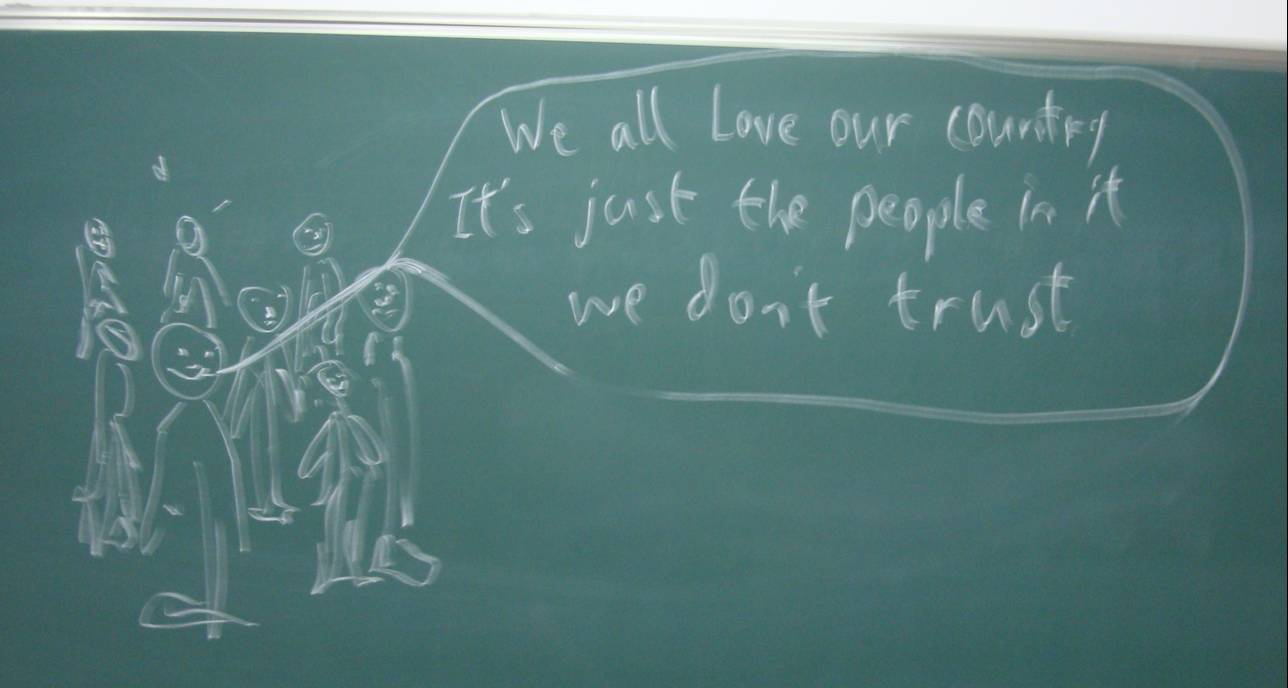
My
students are shocked by this. "But don't you love your country?"
they ask me. And of course I do. I love many things about
Canada. I love the tradition of the rule of law, the tradition of
freedom of speech, the separation of church and state, and the tradition
of good governance. It's also nice be a citizen of a wealthy
country, and Canada is wealthy beyond what most people can even
comprehend. We have, for example, two thirds of the earth's fresh
water, vast forests, huge untapped mineral reserves, and some of the
most beautiful pristine wilderness on the planet. These are
incredible resources. But Canada as a country is what Kurt
Vonnegut Jr., in his novel "Cat's Cradle", called a "ganfaloon" - an
association of people that has no reason to exist other than that we've
decided to associate. The border between Canada and America is
just a line on the map. Totally arbitrary. Please tell me
why I should feel more connected to a person from Quebec or Nova Scotia
than I feel to somebody from California. I have far less in common
with a Canadian of East Indian descent living in Surrey than I have in
common with any of my students. In this age of global communication and
connection, why should I love Canada more than I love England, America,
or China? There is no rationality to it.
Patriotism has changed in the last few generations.
I remember my grandfather, very much the Victorian Englishman, fuming
about the separatists in Quebec. "We used to have something called
treason," he complained. "We'd hang the buggers."
In America this summer we listened to talk radio, and
heard a caller accusing celebrities such as Whoopi Goldberg and George
Clooney, people who only have their country's best interests at heart,
of being "enemies of America". Fortunately the talk show host,
though a right winger himself, set the caller straight. "They're not
enemies of America. They are good people. They just happen
to be wrong."
That caller was displaying the kind of patriotism I
find distasteful, the patriotism of "My country right or wrong" bumper
stickers, the patriotism that says any criticism of my country from
within is treason, and any from without is interference with our
sovereignty. The idea that national sovereignty is sacred
was laid to rest by Hitler and the Holocaust. We now have a right
and a duty to express our opinion beyond our own borders.
I like the world I live in now much better than the
world my grandfather was sorry to see disappear, the world of British
imperialism and the white man's burden. I would like everybody to
be a citizen of the world. We are all connected now. All of
our problems are global problems, and we need to think globally to solve
them. Competition can be a good thing. It can inspire us to
put out more effort, to excel as a group. As long as it is the
kind of emotion we feel for our favourite sports team, patriotism is no
problem. But when it becomes the kind of emotion that soccer
hooligans display it's not so good. When it blinds us to the evil that
our governments can do, or makes us reject criticism that is well
intentioned and justified, patriotism becomes one of the curses of
humanity.
Comment on this Post
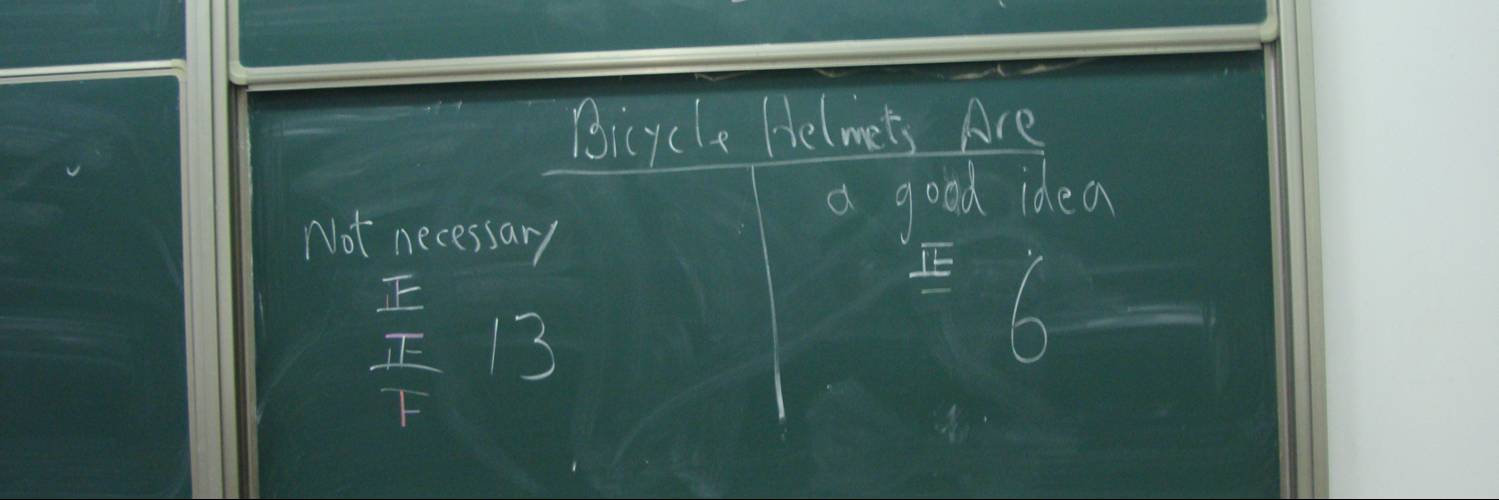
Chinese Word of the
Day: 研究
(yán jiū) = research
October 12, 2010 I Have
My Researcher
Meet
Li Linjie, whose English name is Lin, my new researcher. She will
gather information for me about the bicycle helmet industry and market
in China.
|

GouGou gives my new
researcher, Li Linjie, a warm welcome.
Good
evening!! Mr. Scott!! I want to apply for being a volunteer for
the research that mentioned in your website.
I am Li Linjie, studied in the design school of JN University, and
at the same time, being one of the students in your News Reading
2010 Class. My major is advertising, which involve the knowledge
of Marketing, Sociology, Design and Psychology. According to the
GPA, usually I am the best five students in our department.
Although the exam grade can not indicate everyone’s talent
comprehensively, it demonstrates I am intelligent and responsible
for my study.
Secondly, I am the leader of our team participating in the
Students Challenge Cup-National University Scientific and
Technological Works Contest, which is a high level of competition
about art and scientific among universities of China. Moreover,
our university approves only five subjects about humanity and
social science this year, and our group is one of them. The
subject of ours is about research the function of industrial
design in the application of low-carbon lifestyle changes. In
detail, our subject takes use of questionnaire to research the
field of home appliances, and then apply the results to influence
the re-design of home appliances, which will finally benefit the
low-carbon lifestyle changes. It is my honor to have the chance to
represent our school and our university to take participates in
this national competition. Besides, with the help of our instruct
teacher, I also acquire the basic skill to be engaged in the
scientific research, and
corporate effectively with others. Therefore, I have certain
confidence to accomplish this job, and being a good researcher
that satisfy you.
As for my English ability, I have got the mark of 91 in my Toefl
test this summer. Although it is not a good mark for a person who
wants to continue her study in a graduate school in America, I
think I have acquire intermediate English ability to provide data
and information about an industry and market in China.
Lastly, I want to state my reason for applying for this research
job. In the first place, I want to get more experience involving
research, which I think will be benefit for my study as a graduate
student in the future, no matter what the job is in the whole
subject. Secondly, this subject related with English undoubtedly
will improve my English comprehensively. Thirdly, the compensation
will promote me to be economic independently and reduce the
financial burden of my parents, which will more or less make me
mature.
In conclusion, I have never applied to be a volunteer for a
research, especially in English. Therefore, I do not know if I
provide the full details that you need.
I can offer more information about my ability of my study and
English if you consider me as a qualified candidate.
Thank you!! |
Xiao
Li, as I shall call her, (Xiao means small, or younger, and is often
used by an older person as an affectionate addition to a family name.)
is a little confused about the meaning of the word "volunteer".
Lest anybody think I am taking advantage of my students, this is a paid
part time position, and I think Ms. Li is quite happy with the
compensation.
One of the qualities that impresses me most is her
enthusiasm for the job, and her stated belief that we are not taking on
an impossible task. But then she's been to America, to San
Francisco and Los Angeles, and seen for herself that bicycle helmets can
become accepted and widely used. I'm really looking forward to seeing
what we can get going together.
Comment on this Post
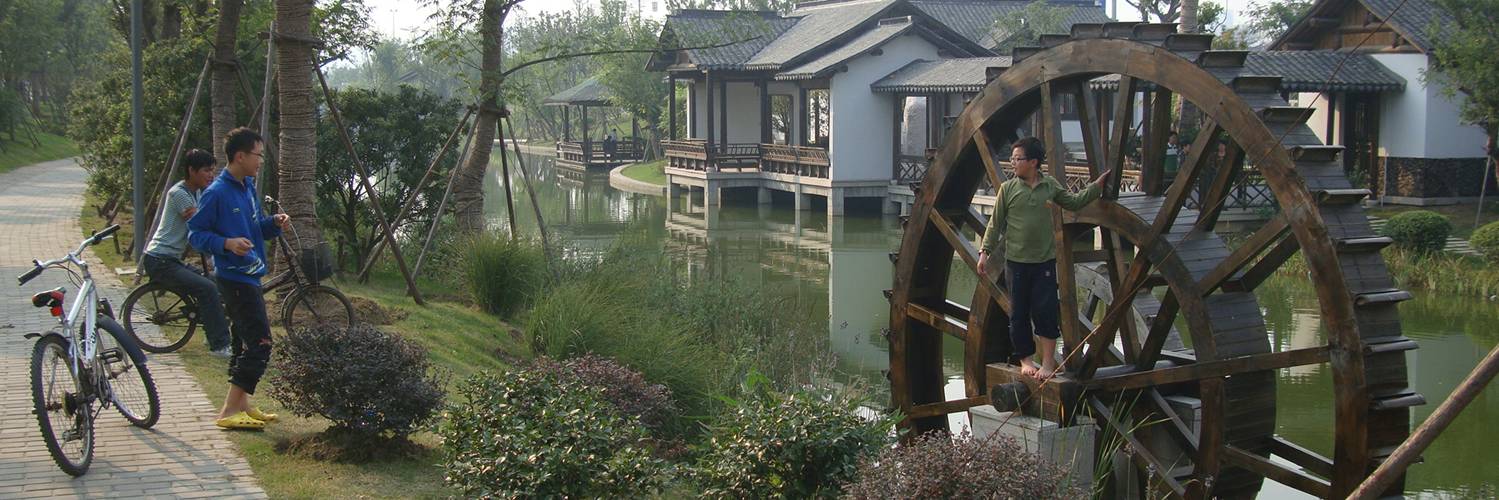
Chinese Word of the
Day: 爱国者
(ài guó zhě literally "love country person") = patriot
There's another word also used this way: 义士
(yì shì) = righteous person, freedom seeker, patriot
October 10, 2010 New
Message from Landon in Singapore
My
former student, Landon, is now studying in Singapore.
He sent me
another letter and some more pictures.
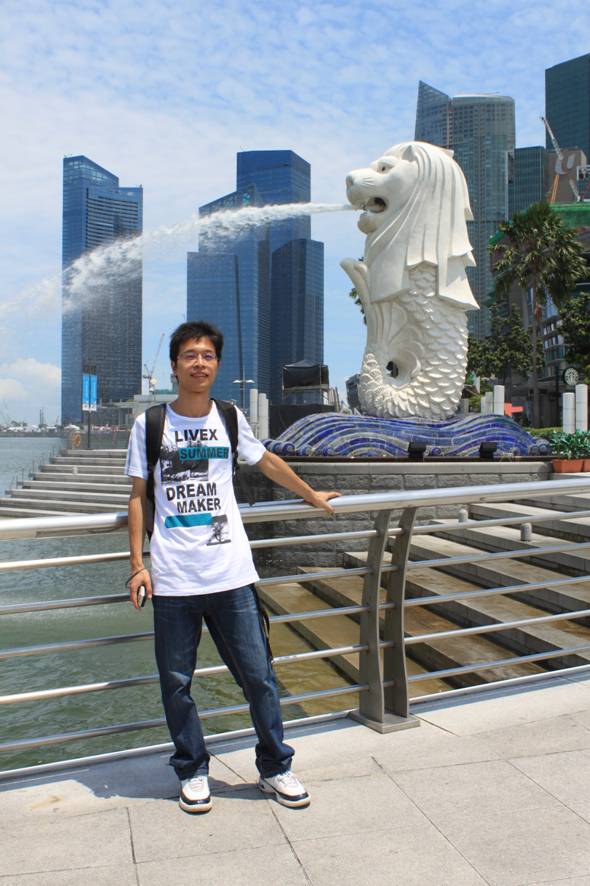
Click on this picture to
get Landon's latest news and photographs.
Comment on this Post
Chinese Word of the
Day: 批评家
(pī píng jiā literally "comment criticize person") = critic
October 09, 2010
Congratulations China
Chinese citizen
Liu Xiaobo has been awarded this year's Nobel
Peace Prize.
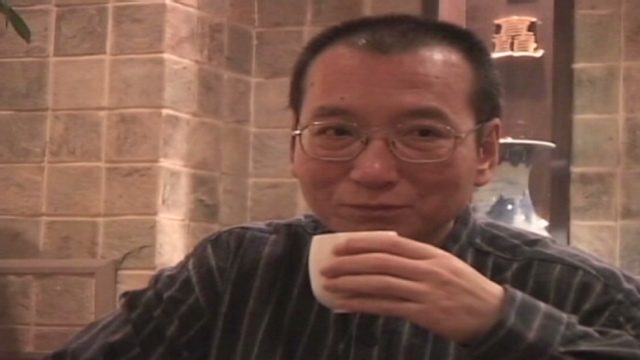
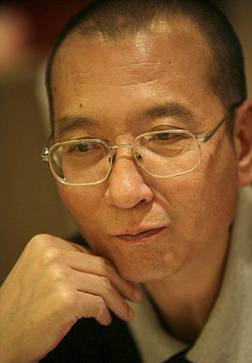
This
is the first time a Chinese has won the prize, and all of China can be
proud of the recognition.
Comment on this Post
The New Canal-side Park
Now
that the pleasant Fall weather is here, Ruth and I took an afternoon to
walk the length of the new park to the east of the campus.
It's
beautiful. Serenely classical in styling, with many spots for
people to sit and talk, a play area for children, and a dozen or more
bridges, all different.
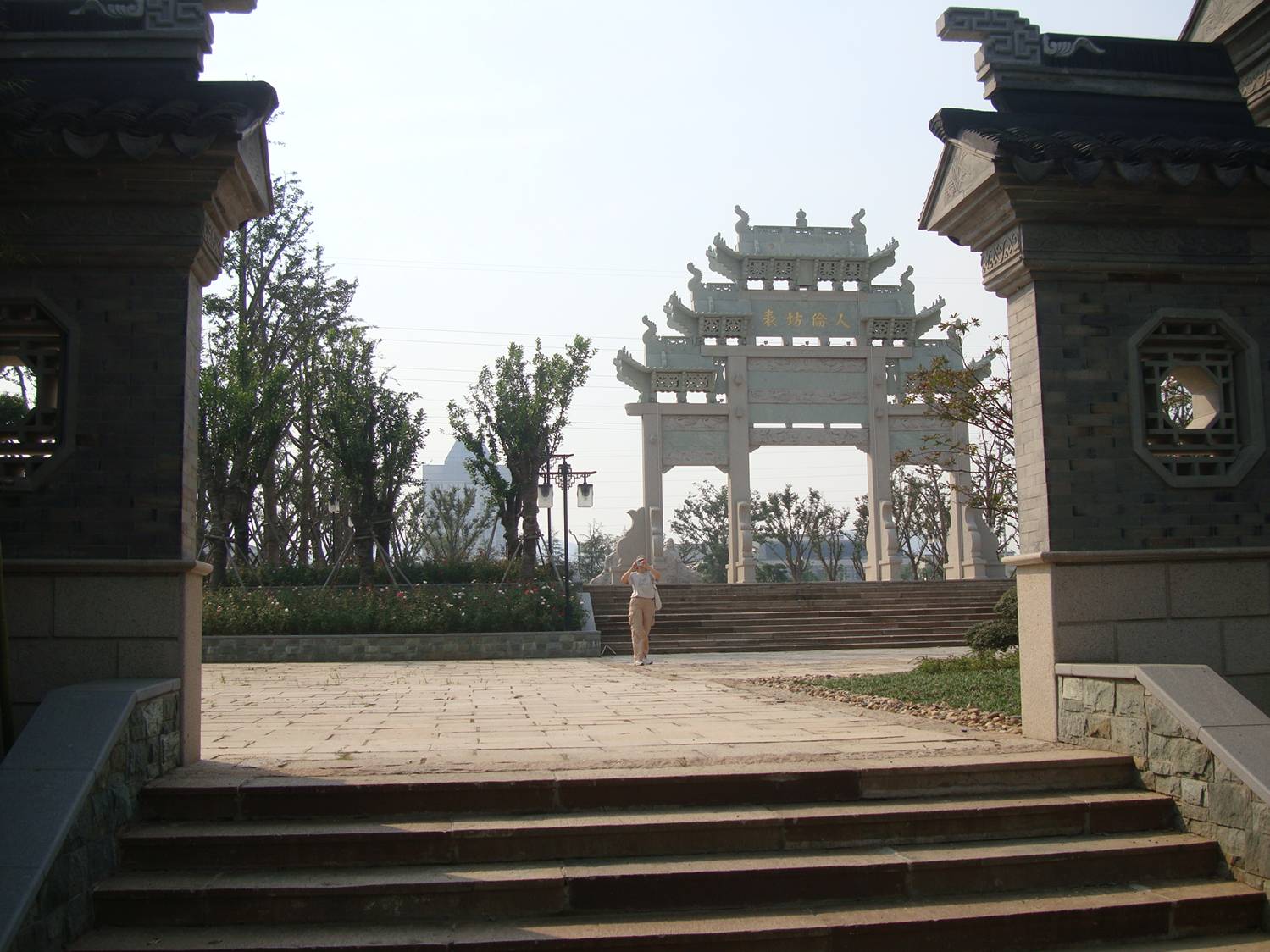
This is the impressive entrance to the new park. You can see the
Jiangnan University library building in the background.
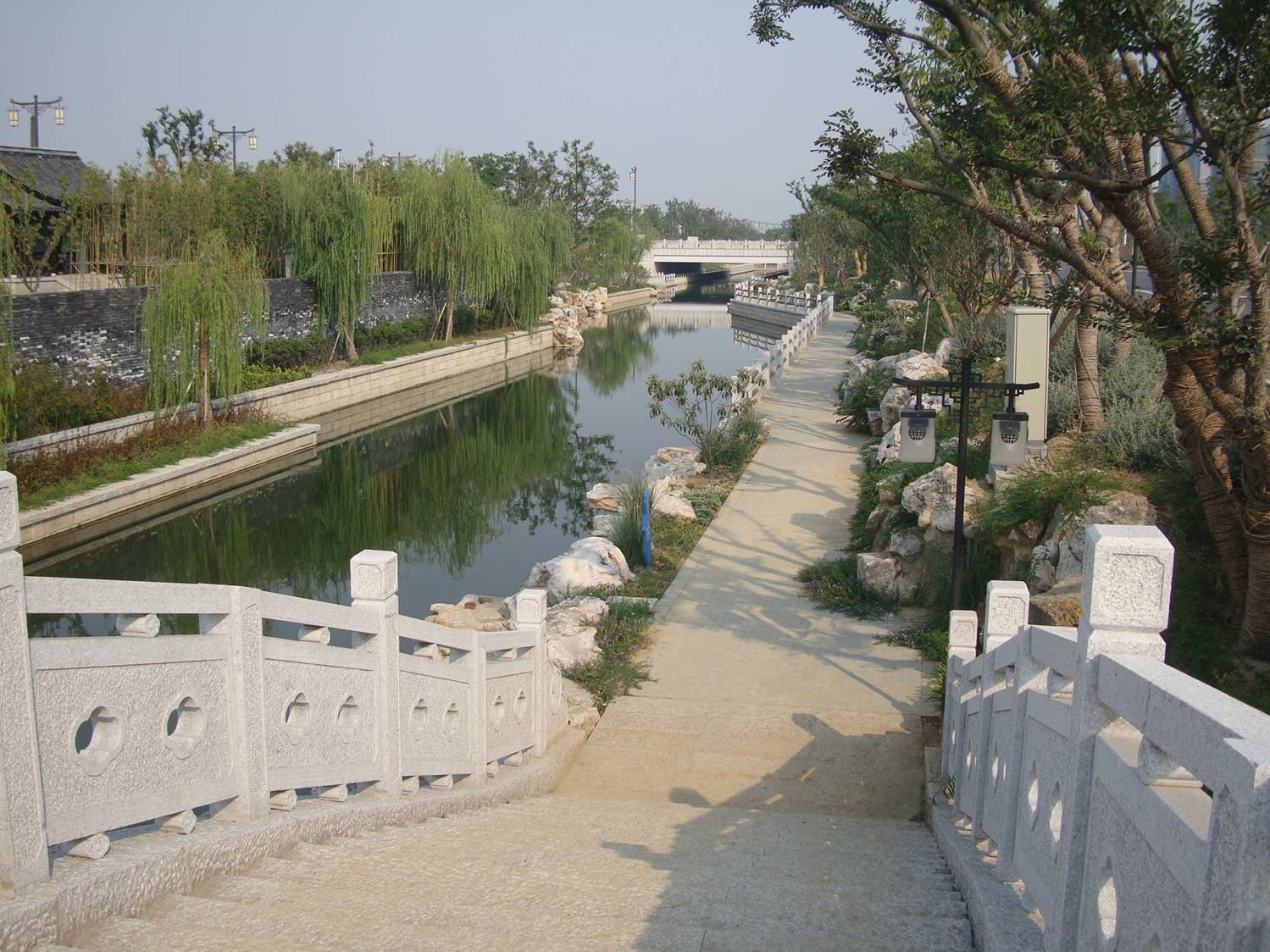
Being down below the road level, one is barely aware of how close the
traffic and
rather ugly buildings are on each side of the narrow park.
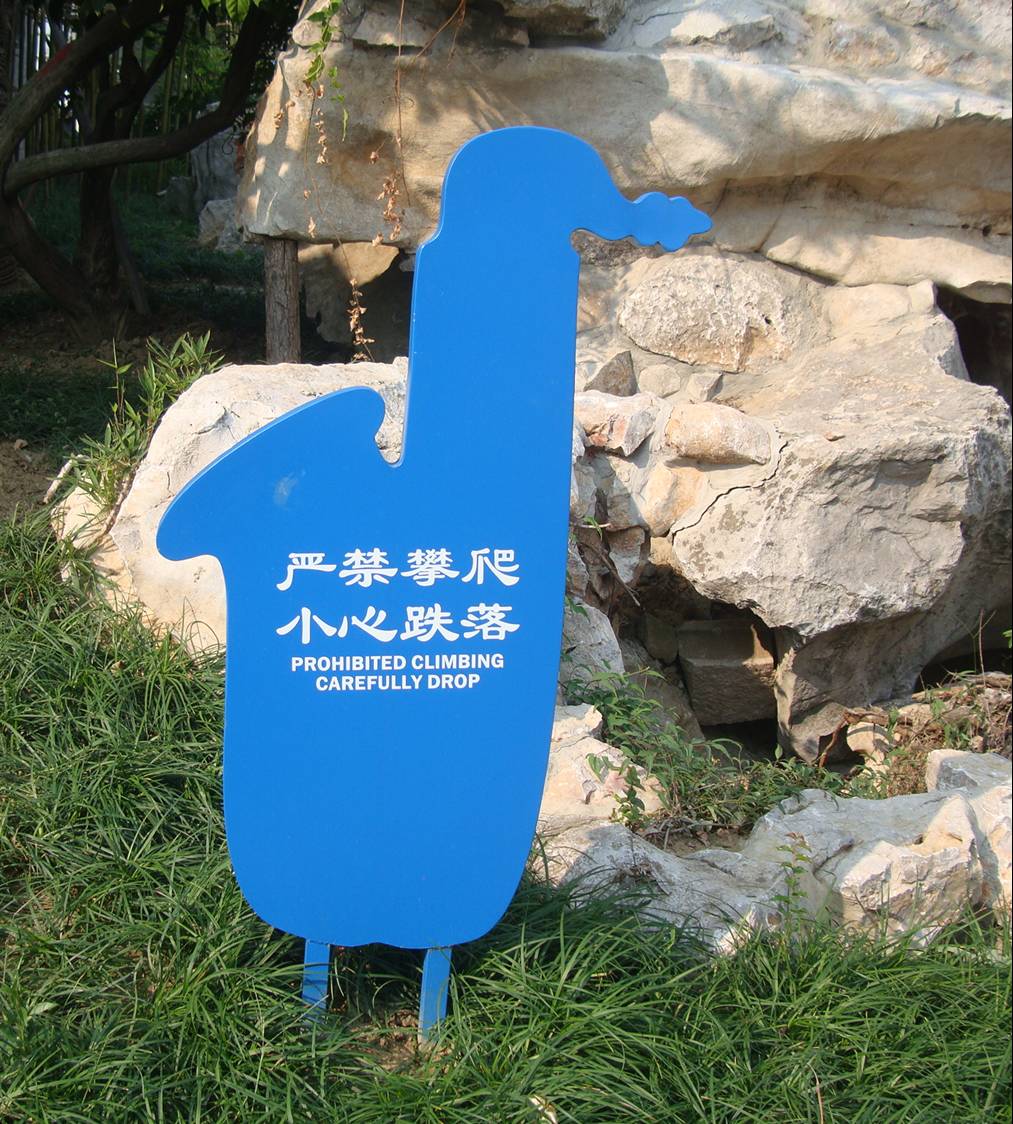
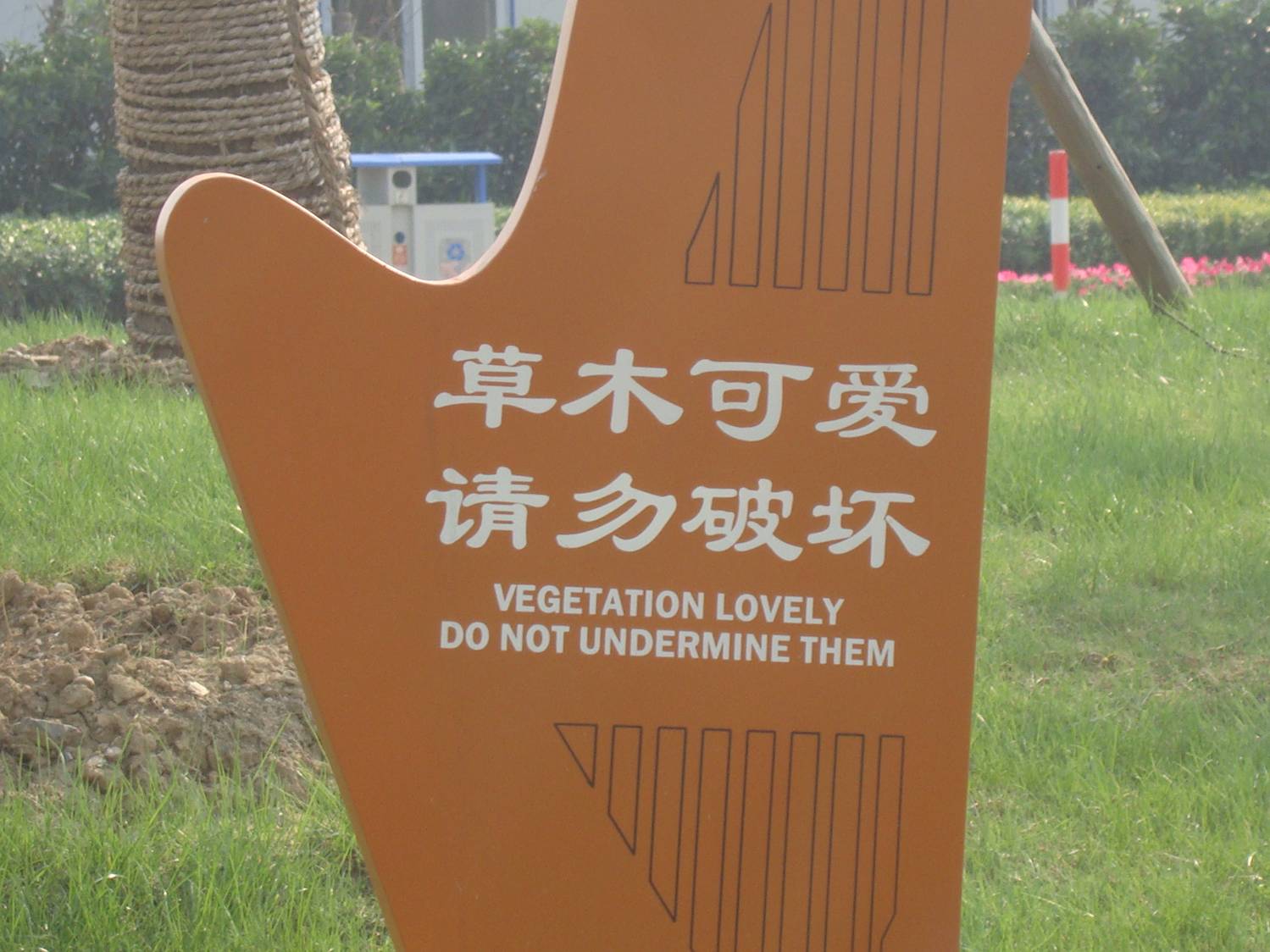
The signs may not be perfect English, but the Chinese characters make
cute rhyming couplets and we like the music theme. The saxophone
says: yán jìn pān pá / xiǎo xīn diē luò, "strictly forbidden climb /
careful drop." And yes, it does rhyme in Chinese. The harp
says: cǎo mù kě'ài / qǐng wù pò huài, which is a nice rhyme. The
English translation is a bit off. It should read: vegetation
lovely, please don't destroy.

The guitar says: shuǐ shēn wēi xiǎn / zhù yì ān quán - "Depth of
water danger, pay attention safety."
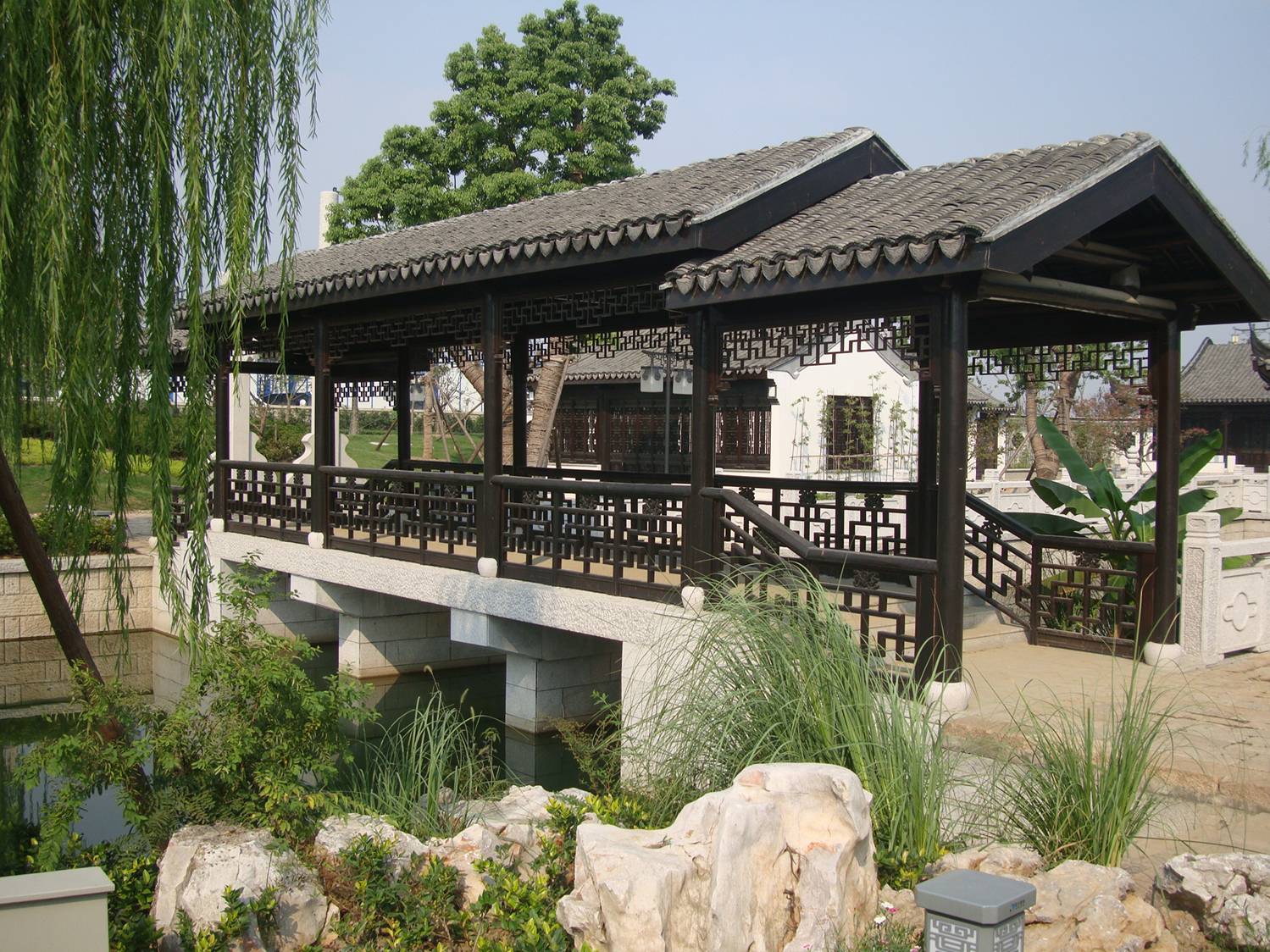
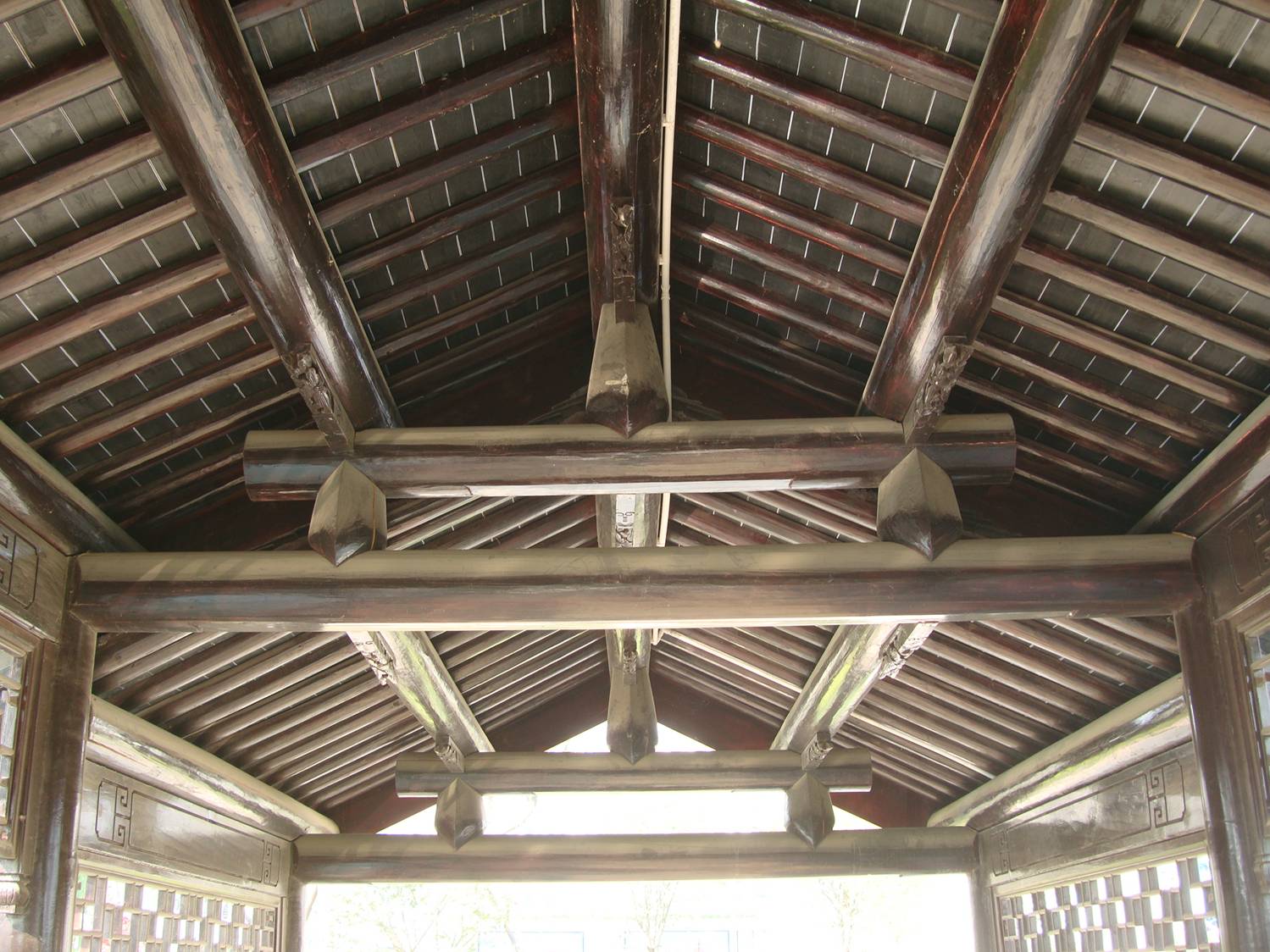

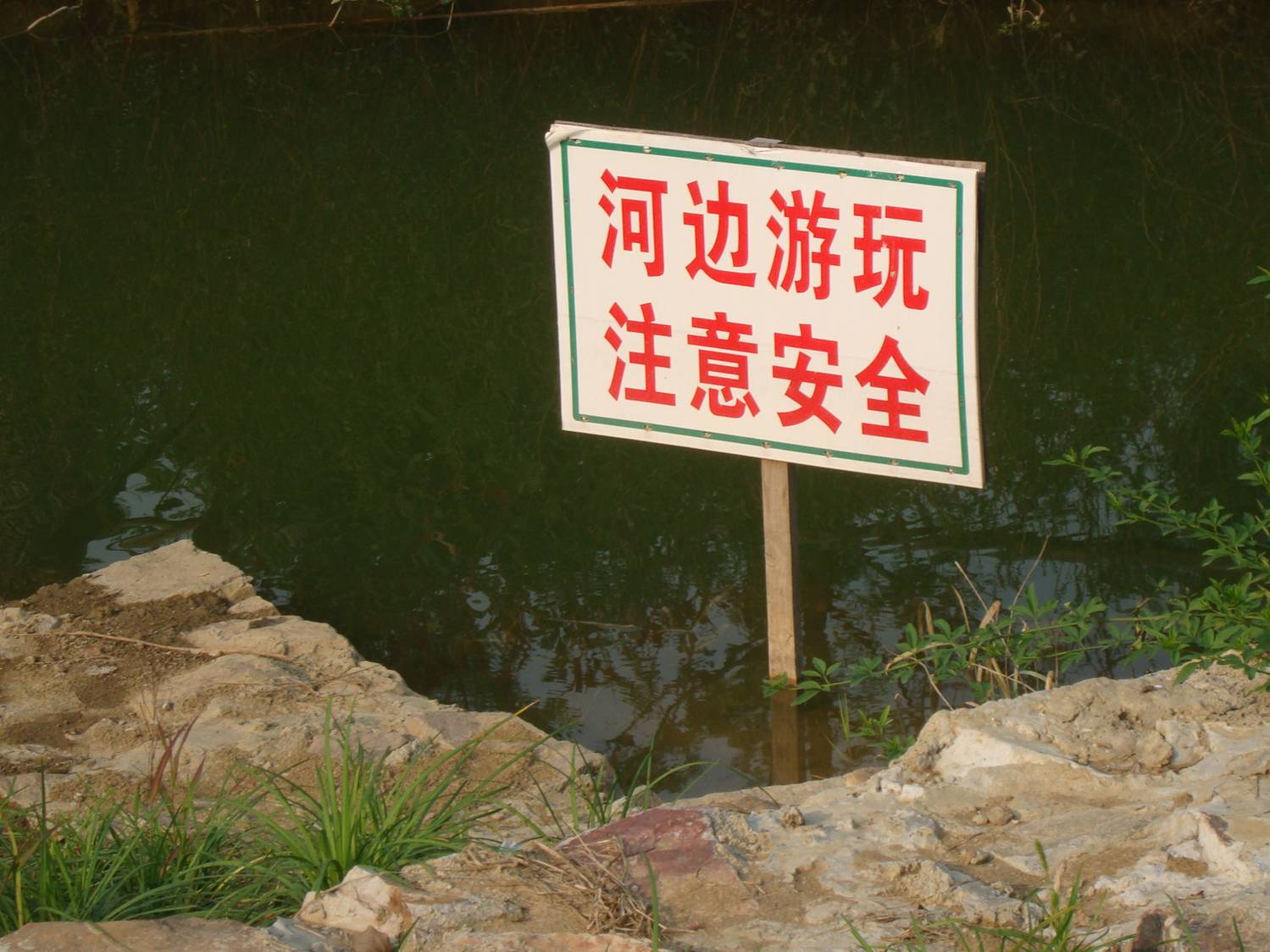
hé biān yóu wán / zhù yì ān quán - "riverside play / pay attention
safety".
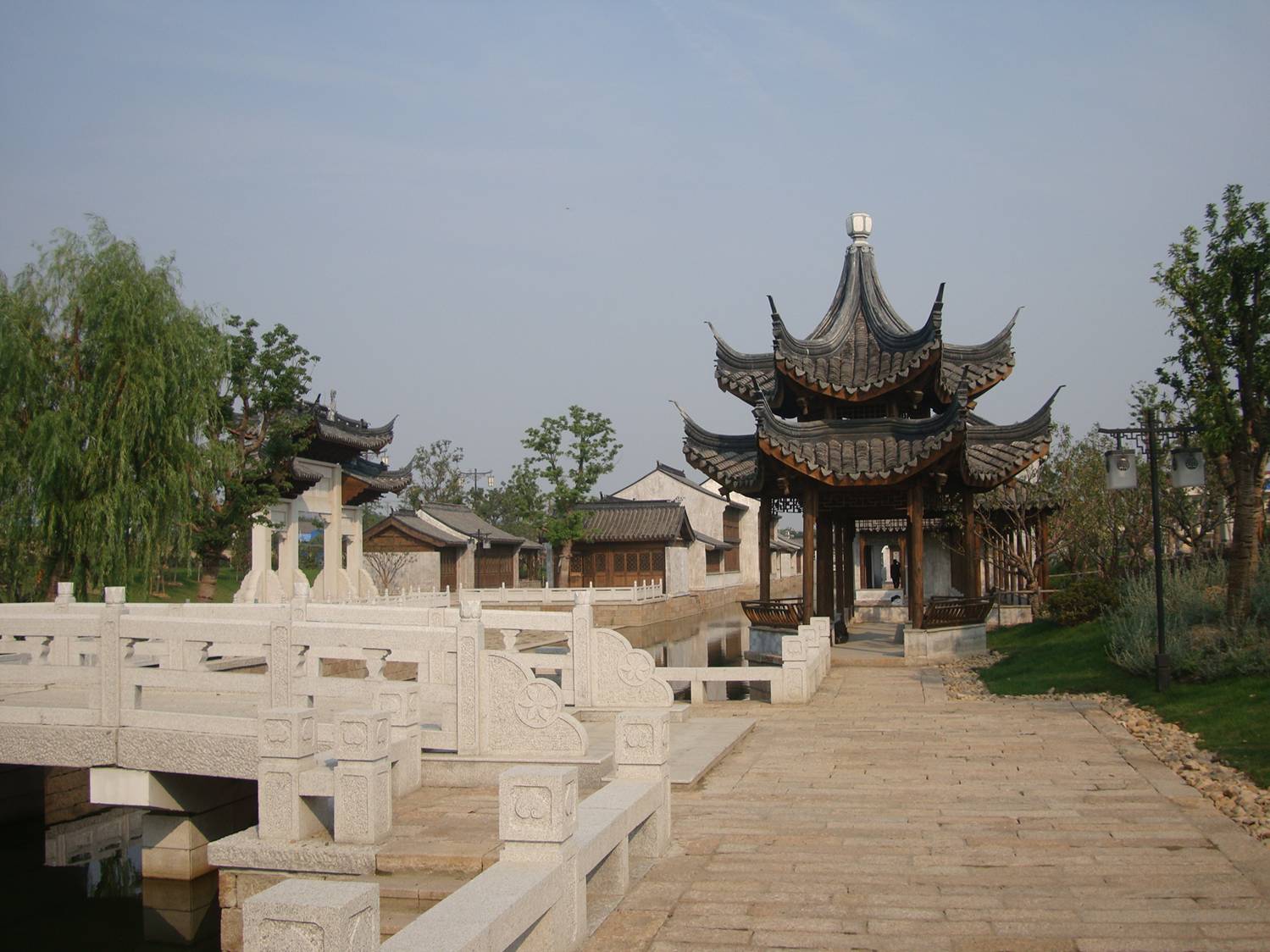
One section of the park seems destined to become an ancient village
commercial area.
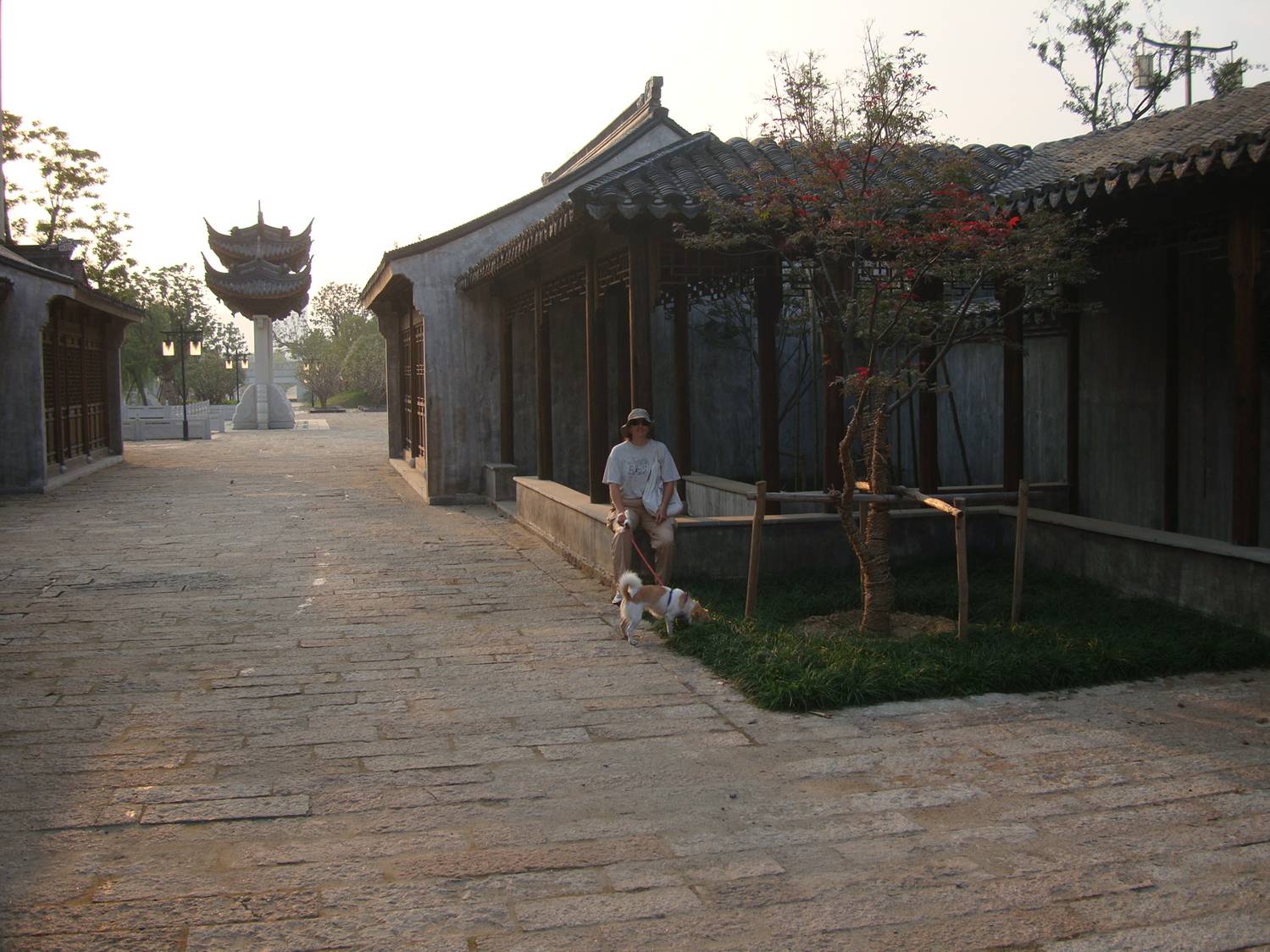
We wondered what kind of stores, and what kinds of goods, would
eventually be offered for sale here.
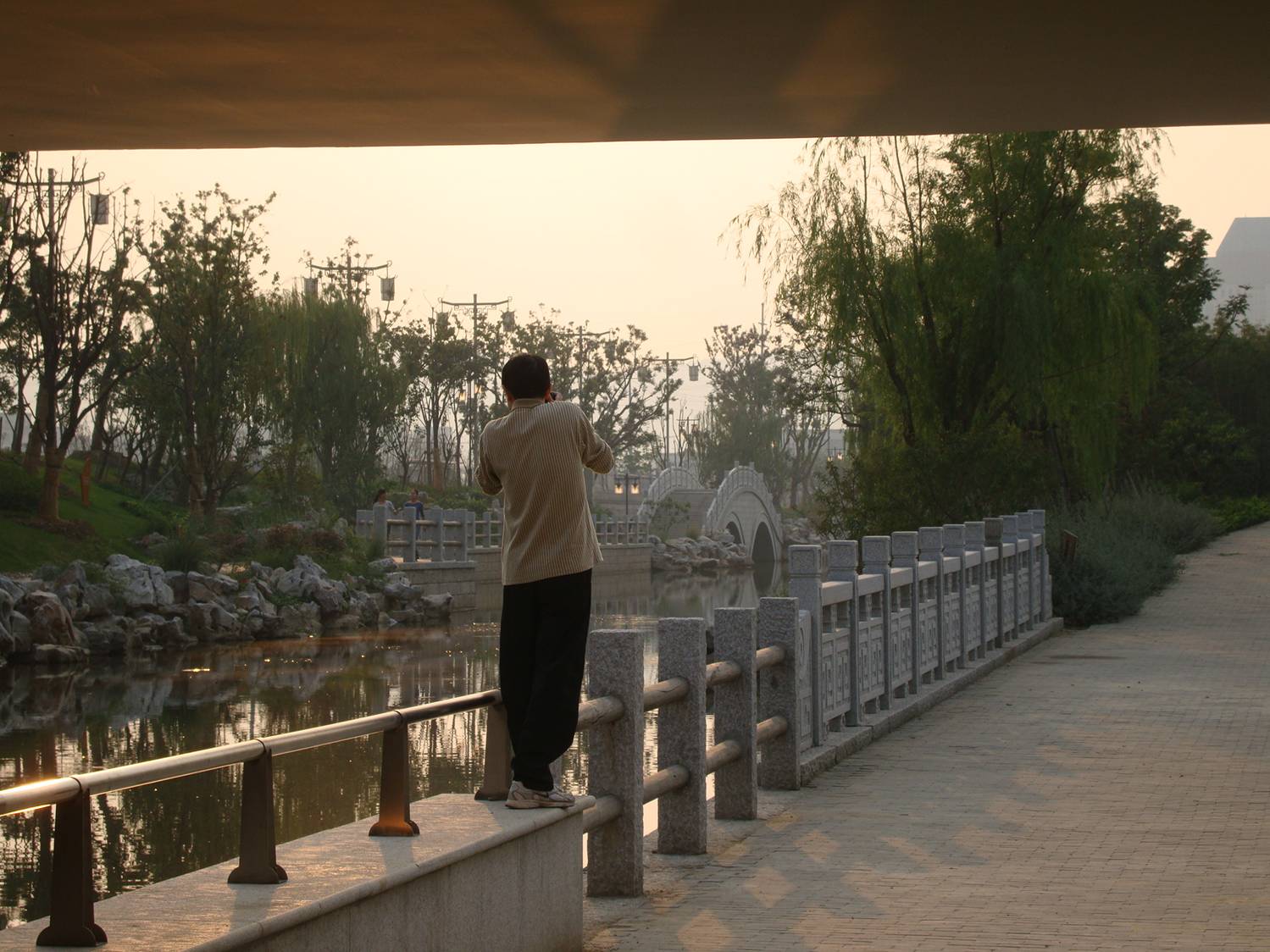
'
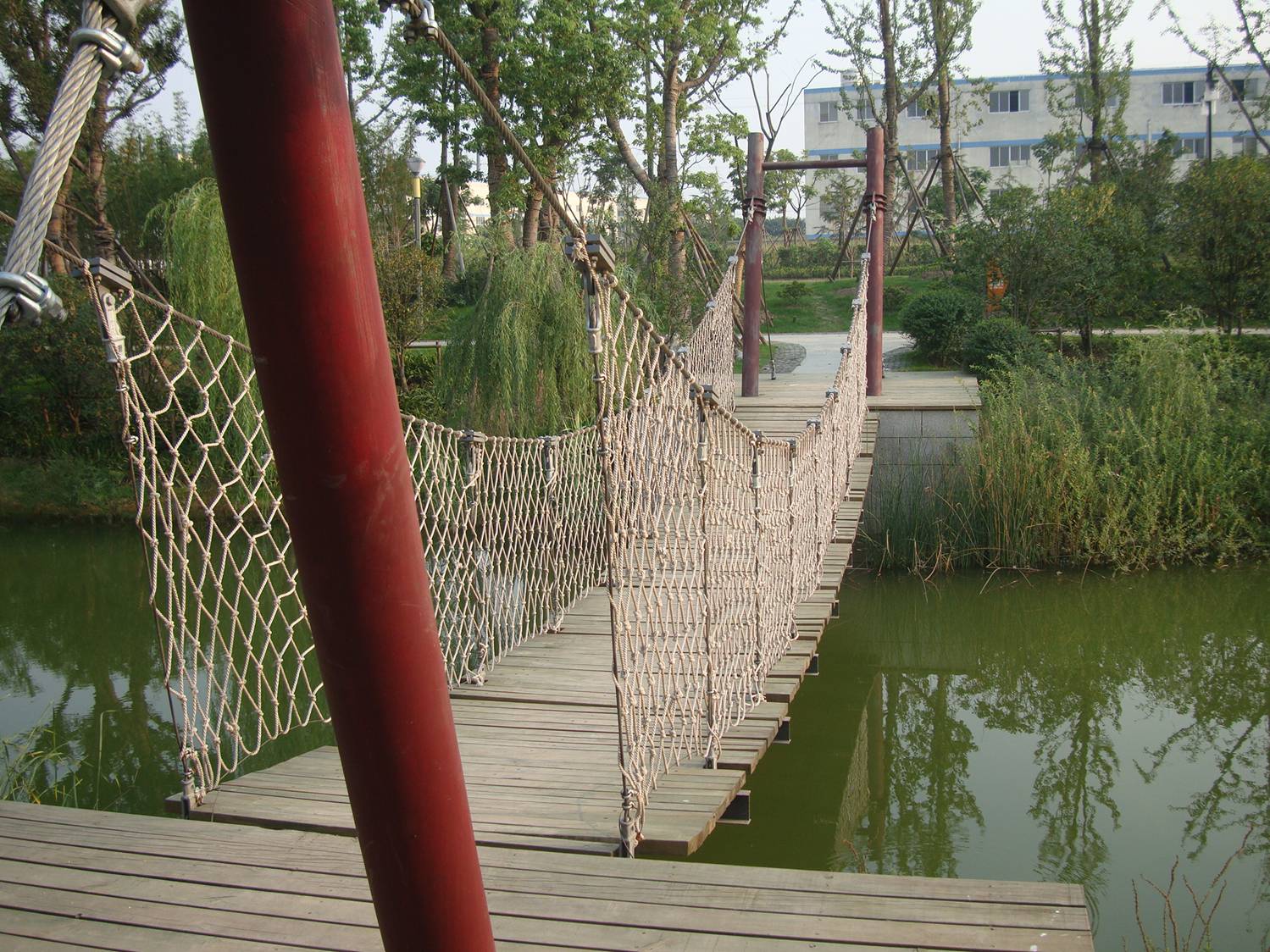
Like a bridge over untroubled waters... The swaying of this bridge
really freaked out our dog.
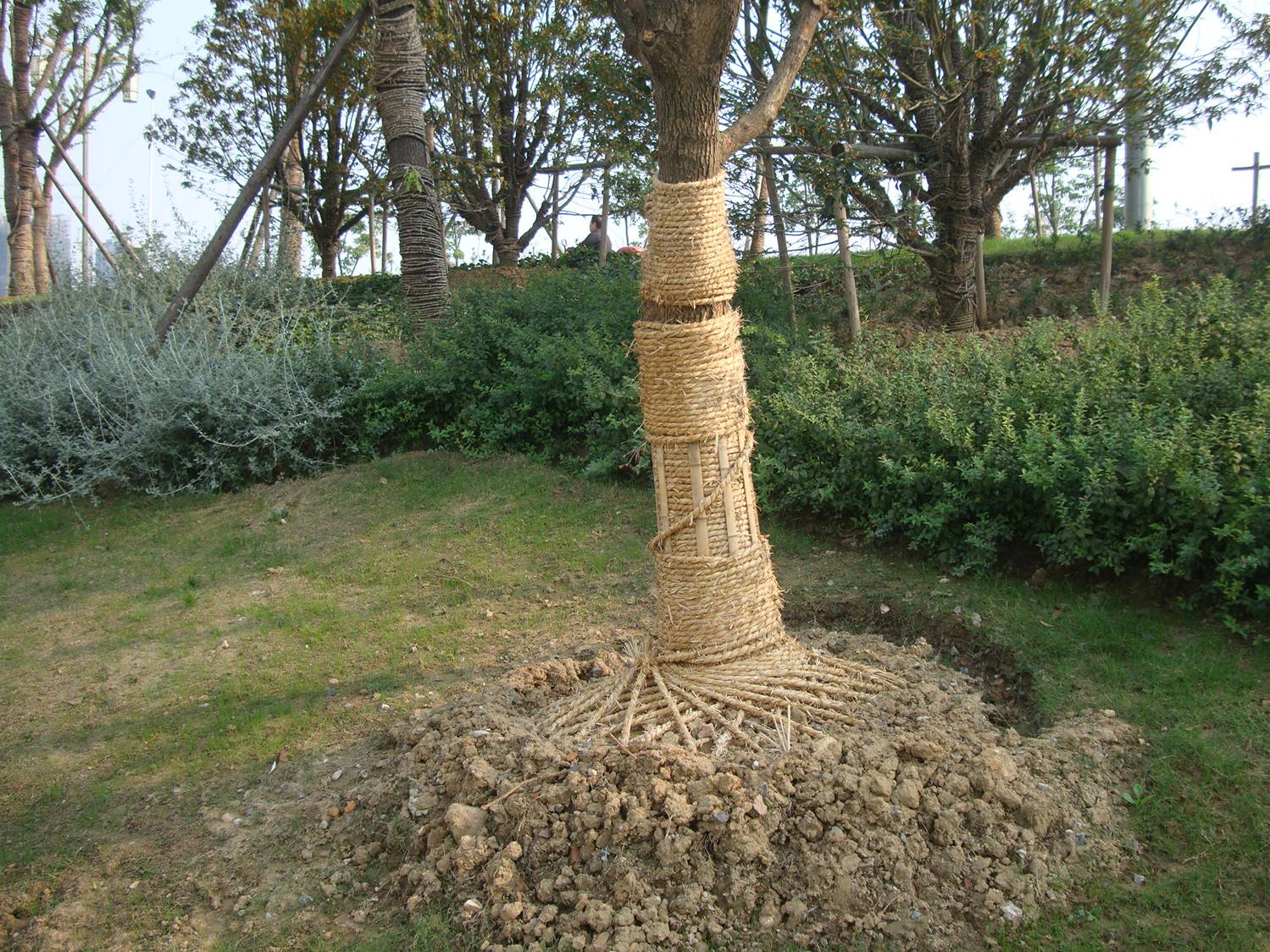

The Chinese have transplanting of trees down to a science, and they move
in impressively mature specimens
when they landscape a park like this one.
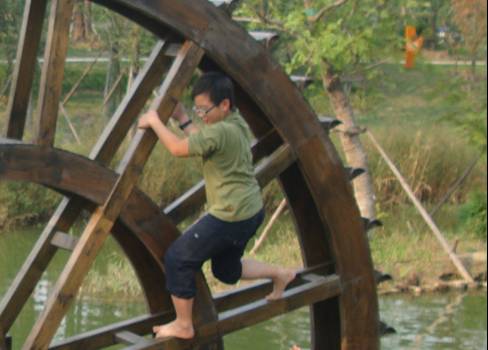
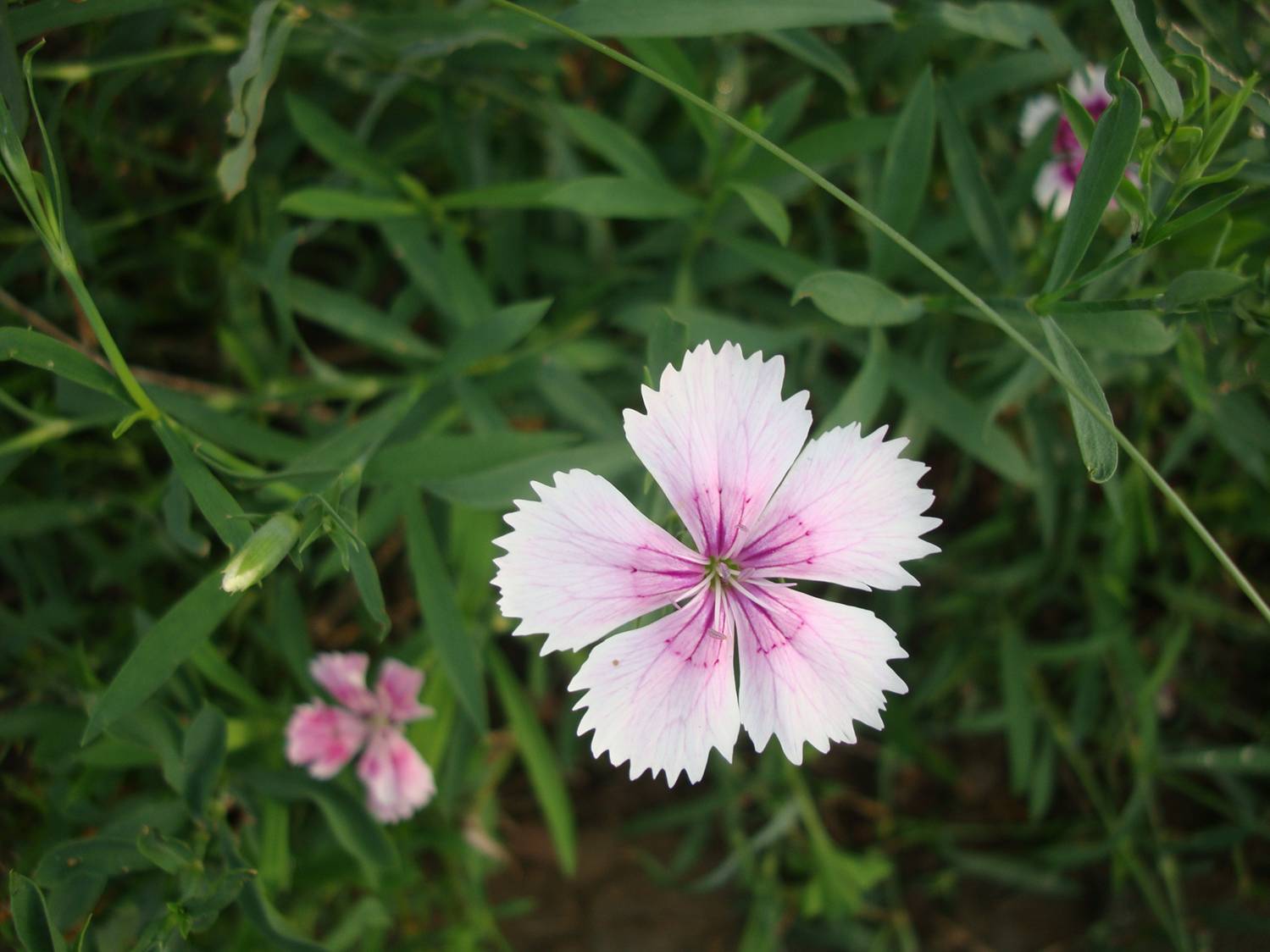
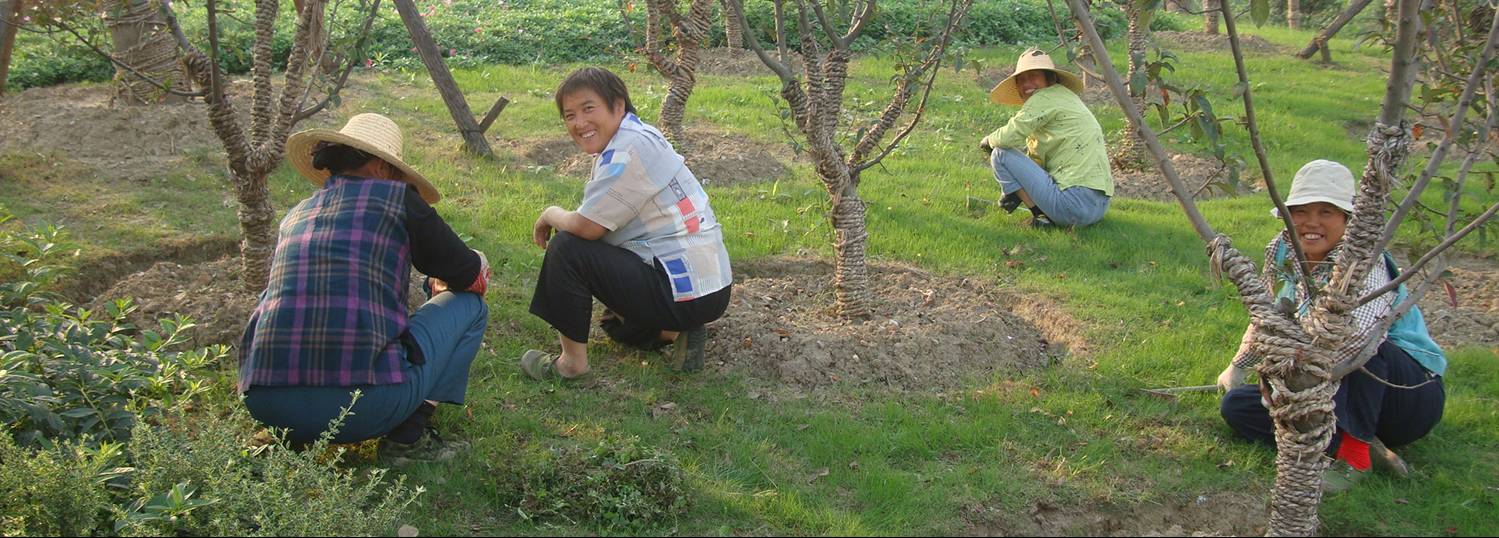
And of course these are the people who make it all so beautiful.
We appreciate all the work, folks.
Comment on this Post
Chinese Word of the
Day: 百货商场
(bǎi huò shāng chǎng literally "hundred goods business site") =
general merchandise market = shopping mall
October 05,
2010 Booming Wuxi
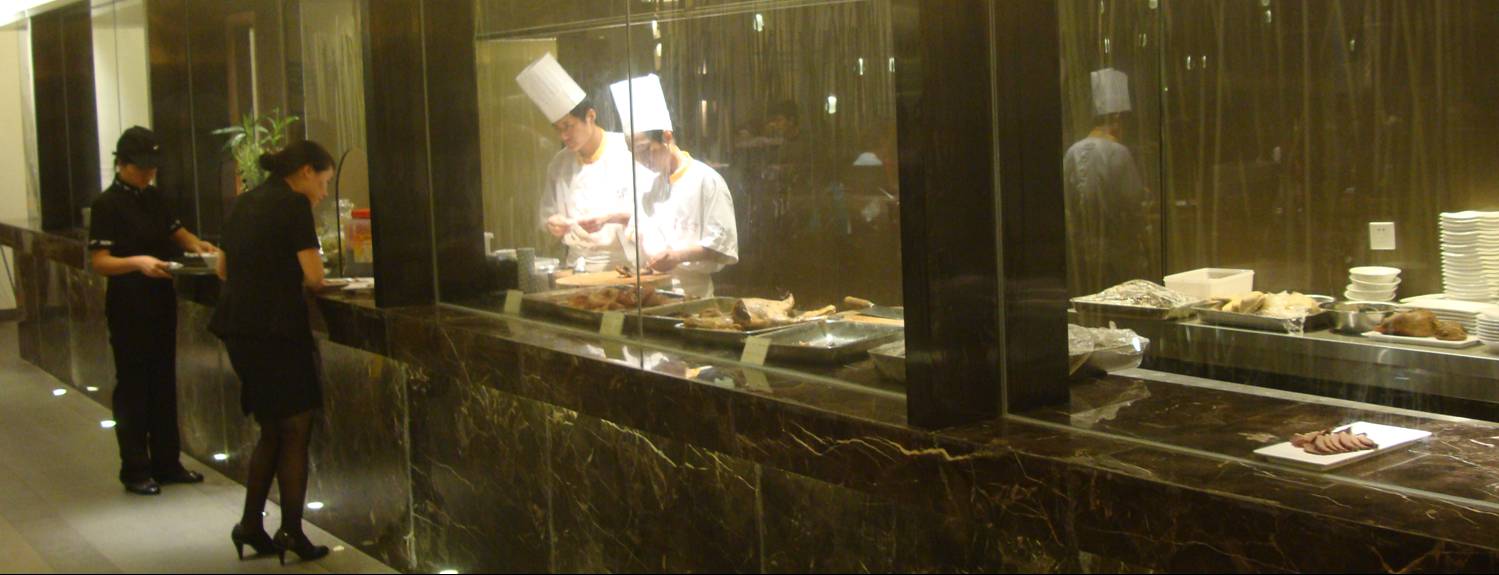
They've just opened a huge new shopping mall down the road from our
campus. The scale of construction here is quite astonishing.
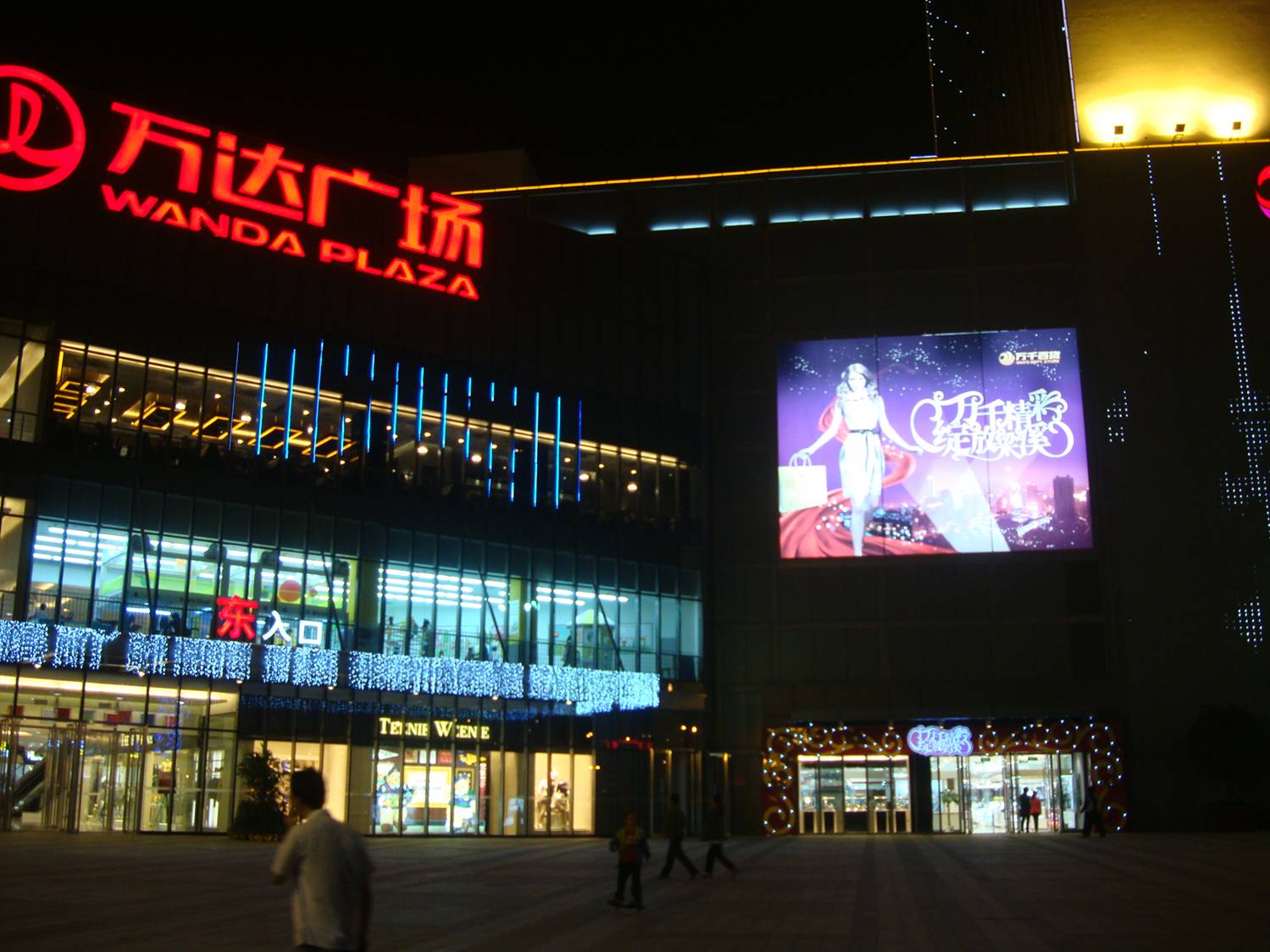
This mall includes a cinema, a department store, an Apple retailer, a
Starbucks, and at least an acre of restaurants on the second floor, all
sparklingly modern.
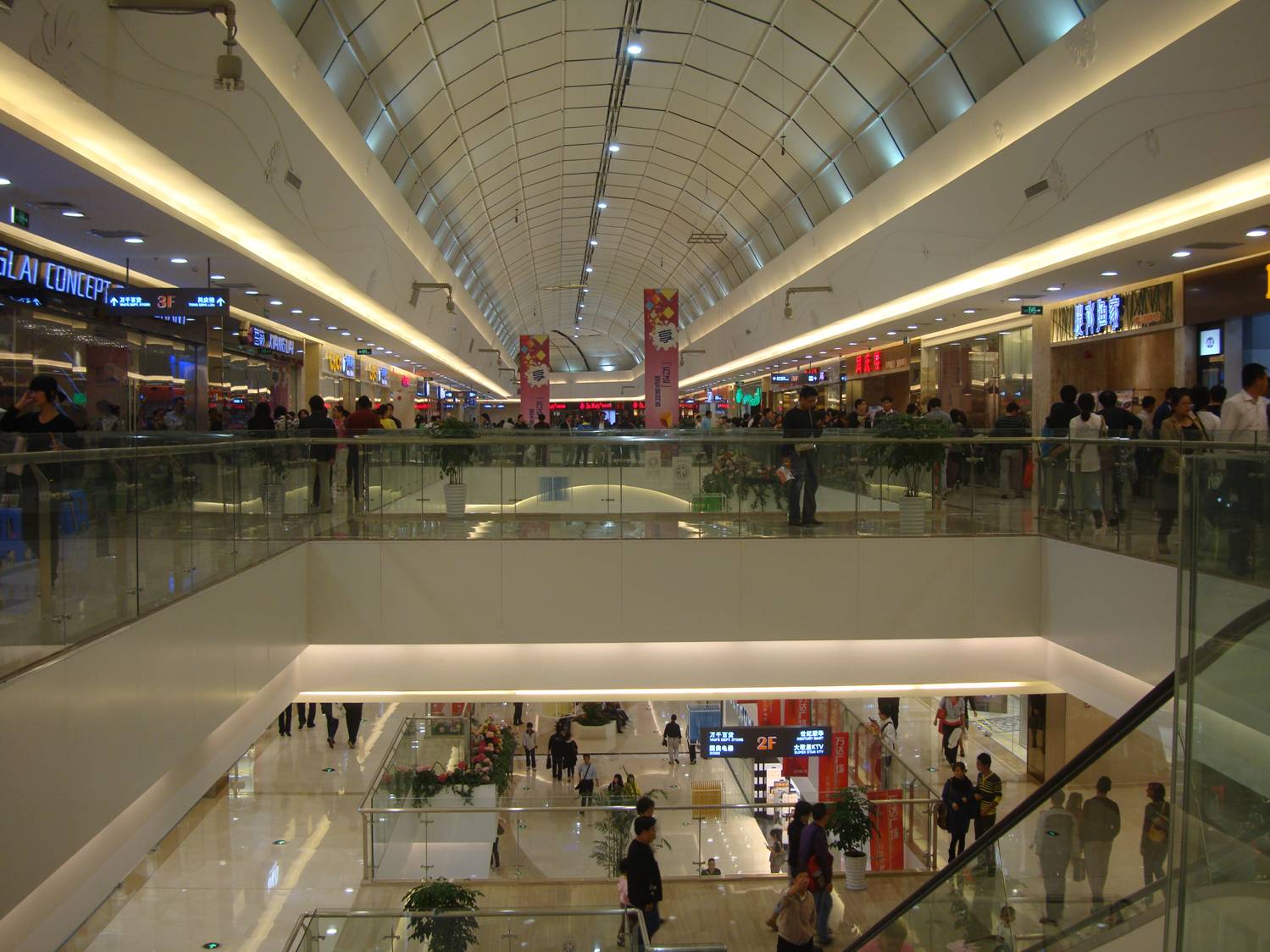
In
another year or so there will be a subway connecting our campus to
downtown Wuxi, and when that is operational, we'll be connected directly
to Shanghai. The smelly old canal to the East of the university
has been cleaned up and is now a beautiful walking park. There is
just so much beautification going on, it's hard to keep track of it all.
Expect more pictures soon.
In Sickness and in
Health
I've
been suffering with a cold since our seven days of National Holiday
started. Now recovering, but Ruth is down with it. It takes
some of the fun out of life, but I've had lots of time to finally zero
my Anki
flash card deck, which hasn't been cleared for about a year,
and to practice my finger picking, which has improved tremendously.
So, no complaints.
The Joys of Teaching
I received this message from
a student yesterday. It really speaks for itself, but I'll include
my response to give you my reaction. Nothing makes a person feel
better than an expression of appreciation:
Dear teacher,
I just want to show my appreciation of your class.There are some
very good points in your ppts, which are quite thought-provoking.It
is you that teaches me to be a concious reader because people
always have motives by giving information.Thank you very much. I
have more expectations of your classs.
Wish you a happy holiday!
S______And my reply:
Thank you S______. Comments like yours make
my day. They are what I live for as a teacher and the feeling is
mutual. I really appreciate having students like you in my class.
You make me look forward to the rest of the term.
Warmest regards
David |
Comment on this Post

Chinese Word of the
Day: 格言
(gé yán) n. maxim; motto; aphorism;
saying
September 30, 2010
Dinner with the Mayor
Every
year about this time we are invited to a reception to celebrate the
founding of the PRC, the Peoples' Republic of China.
It's
always a good chance to meet other foreigners, both teachers and
business people, and to meet the powers that be in the Wuxi government.
Not to mention the delicious gourmet food that is always provided.
This
year, to our surprise, the reception was held in the
very hotel that we visited a couple of weeks
back.
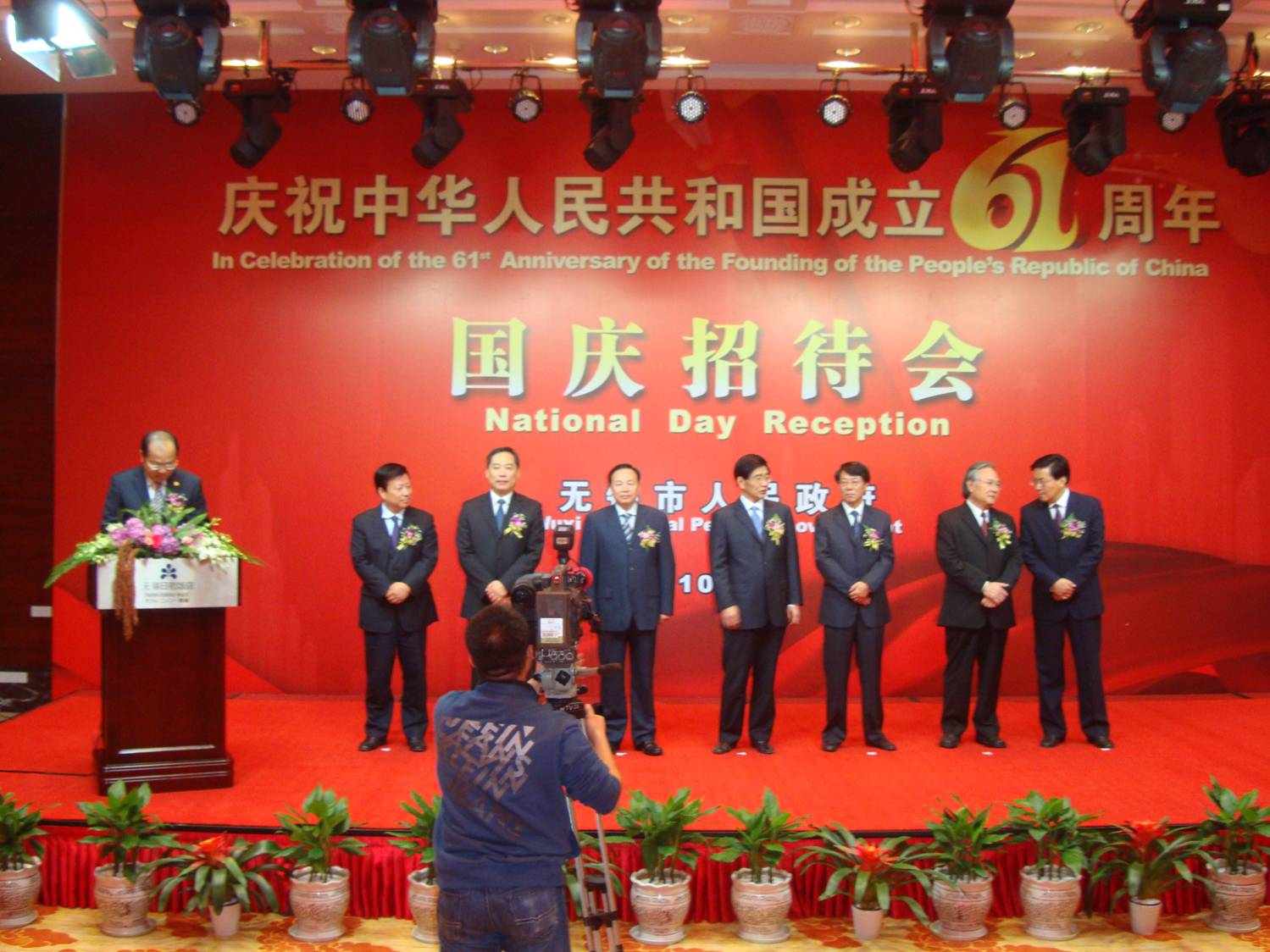
The
government officials of Wuxi were our hosts. Only the mayor
made a speech,
and he kept kept it mercifully brief.
This morning I was watching a
program on television that discussed China's new promotional campaign,
which apparently will feature people more than scenery. Sounds
like a good idea to me, because the people of China are really special
and we've all seen pictures of the Great Wall.
But one of the things they talked about was city slogans.
Kunming is the "City of Eternal Spring", Hangzhou is
the "City of Quality Life".
I like the slogan of
Wuxi: 无锡是个好地方
(Wúxī shì gè hǎo dìfang)"Wuxi is a good
place." A nice, comfortable slogan, nothing too pretentious.
And it's true. Wuxi is a good place. Right now the town is
booming, and infrastructure improvements are happening at a great pace.
It's becoming a city of parks, canals, colorful night lighting, tidily
restored historic districts, and pleasant business and shopping areas.
Last night somebody asked me why I like Wuxi, and I jokingly replied
that Wuxi has five Starbucks. But really, I like Wuxi because it's
comfortably modern, but still China. It's a good place.
Comment on this Post
Are
We All Happy
Now?
I've
been talking to my oral English classes about the GDP, specifically
about how it fails to measure some things that are important, like
unpaid volunteer work or unpaid house work, and does include things we
don't really want, like the cost of cleaning up a big oil spill.
In 1972,
Bhutan's former King
Jigme Singye Wangchuck, suggested that
a more important measure might be the GNH, or
Gross National Happiness.
So we've been talking in class about how one might measure a nation's
happiness.
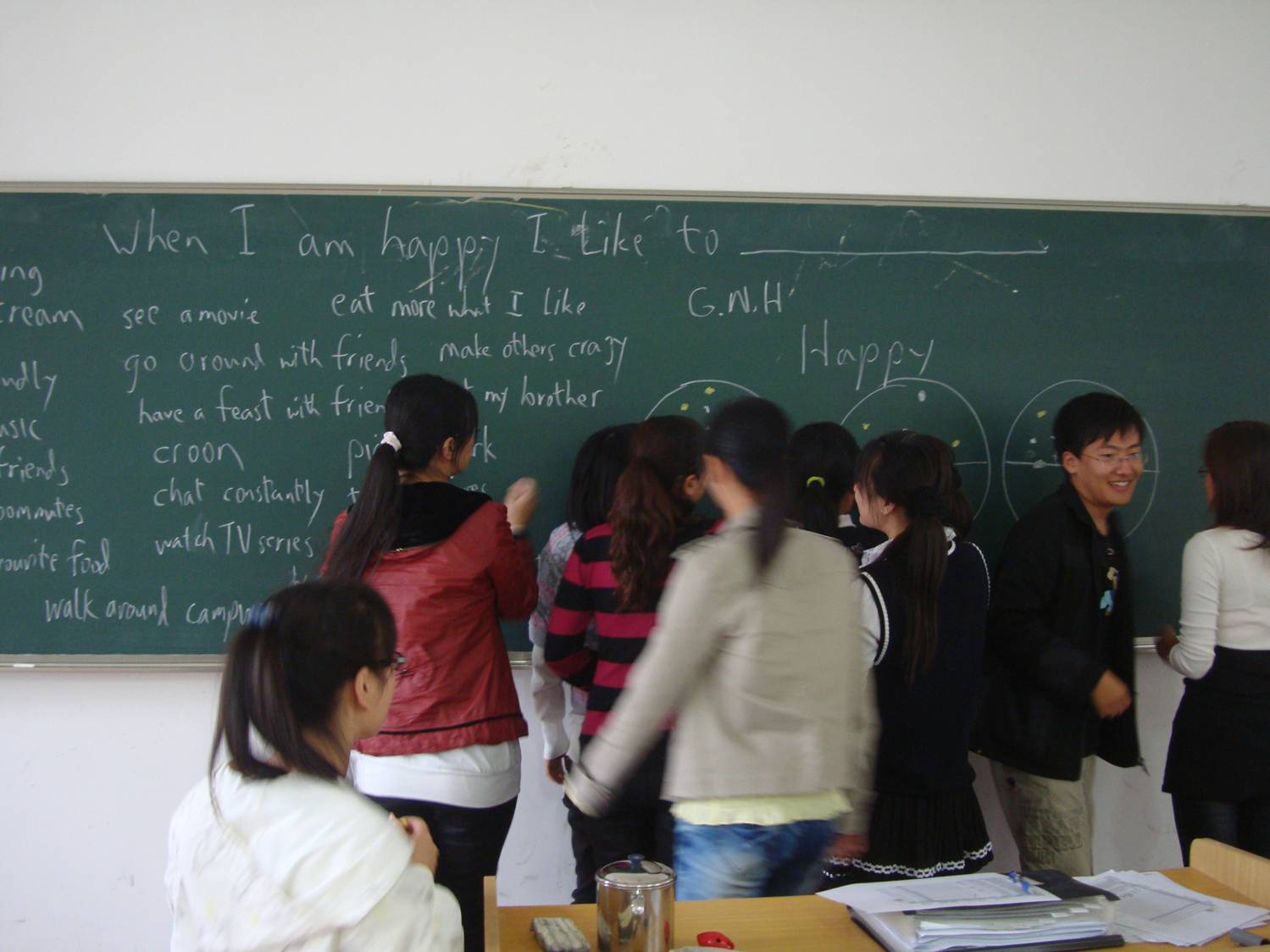
It turns out that many things
people do when they are happy, like go shopping or eat special food, are
also things they do when they are depressed. It's easier to
measure the GNU, the Gross National Unhappiness, as reflected in such
things as suicide rates, sales of anti-depressants, or civil unrest.
The only way to assess happiness is to ask people, so I asked my class.

I was surprised when I came
to China. I was expecting to find the population here much less
happy than they seem to be. Wasn't I told that they have no
freedom, must watch what they say, and can be
jailed for writing a book critical of
the government. It all may be true, but it doesn't seem to weigh
heavily on their shoulders.
Comment on this Post

Chinese Word of the
Day: 好事之徒
(hào shì zhī tú literally "good event follower") = troublemaker
September 27,
2010 More Holidays, More Feasts
Once
more we enjoyed a five star dinner as guests of our administration.
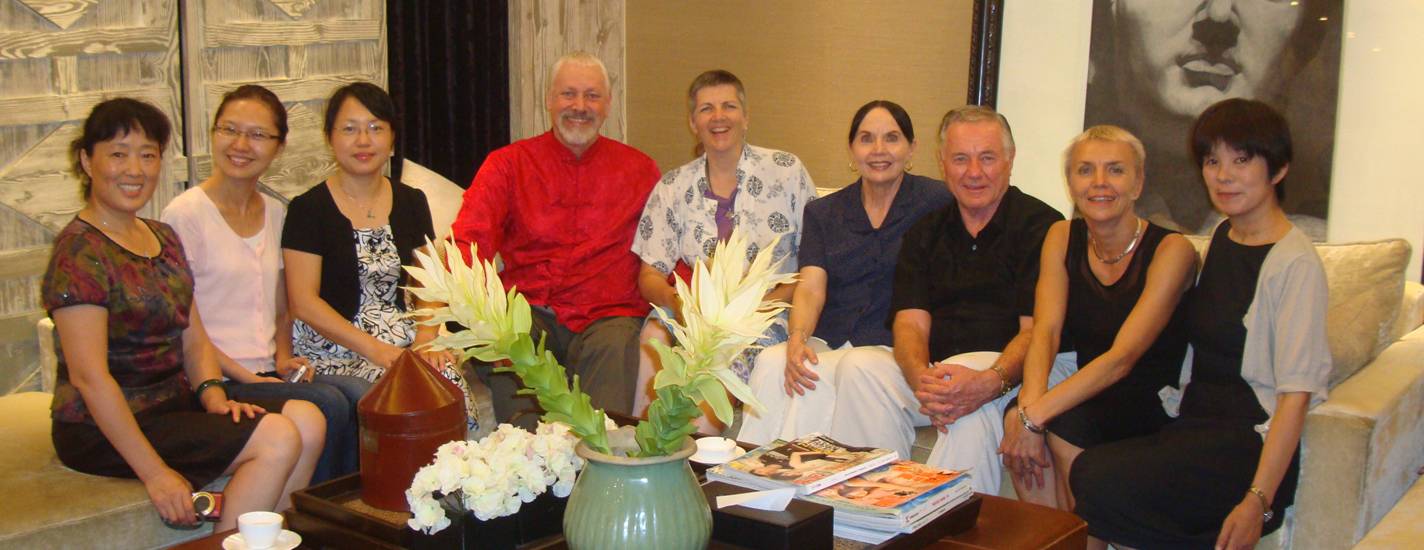
I
don't think there was anything in this meal that we hadn't tasted
before, but as usual it was all delicious.
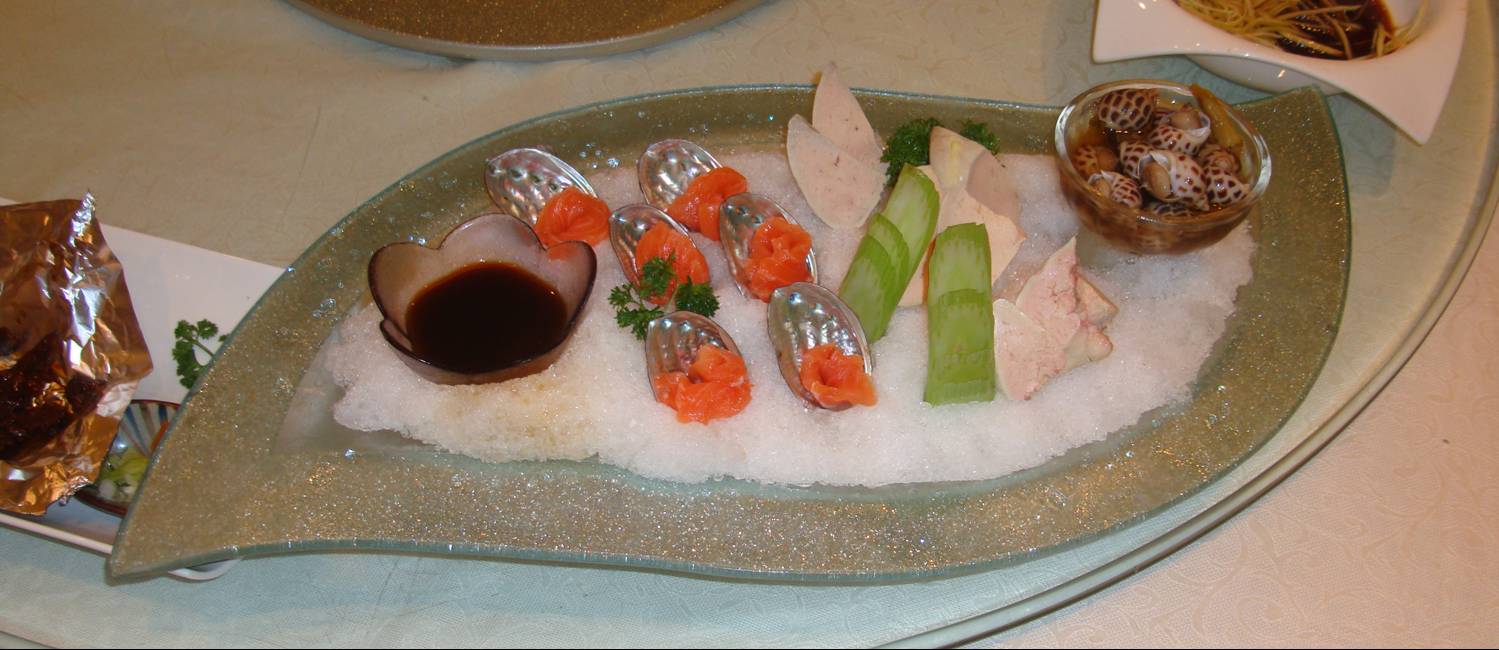
It
feels like we barely get started each Fall term when we have holidays.
This past week we had Wednesday off for the Mid-Autumn Festival.
This coming week we have six days off in a row for the National Week
holiday.
Also, every Fall, our administration presents us with gifts of fruit and
moon cakes. One can't celebrate the Mid-Autumn festival without
eating moon cakes.
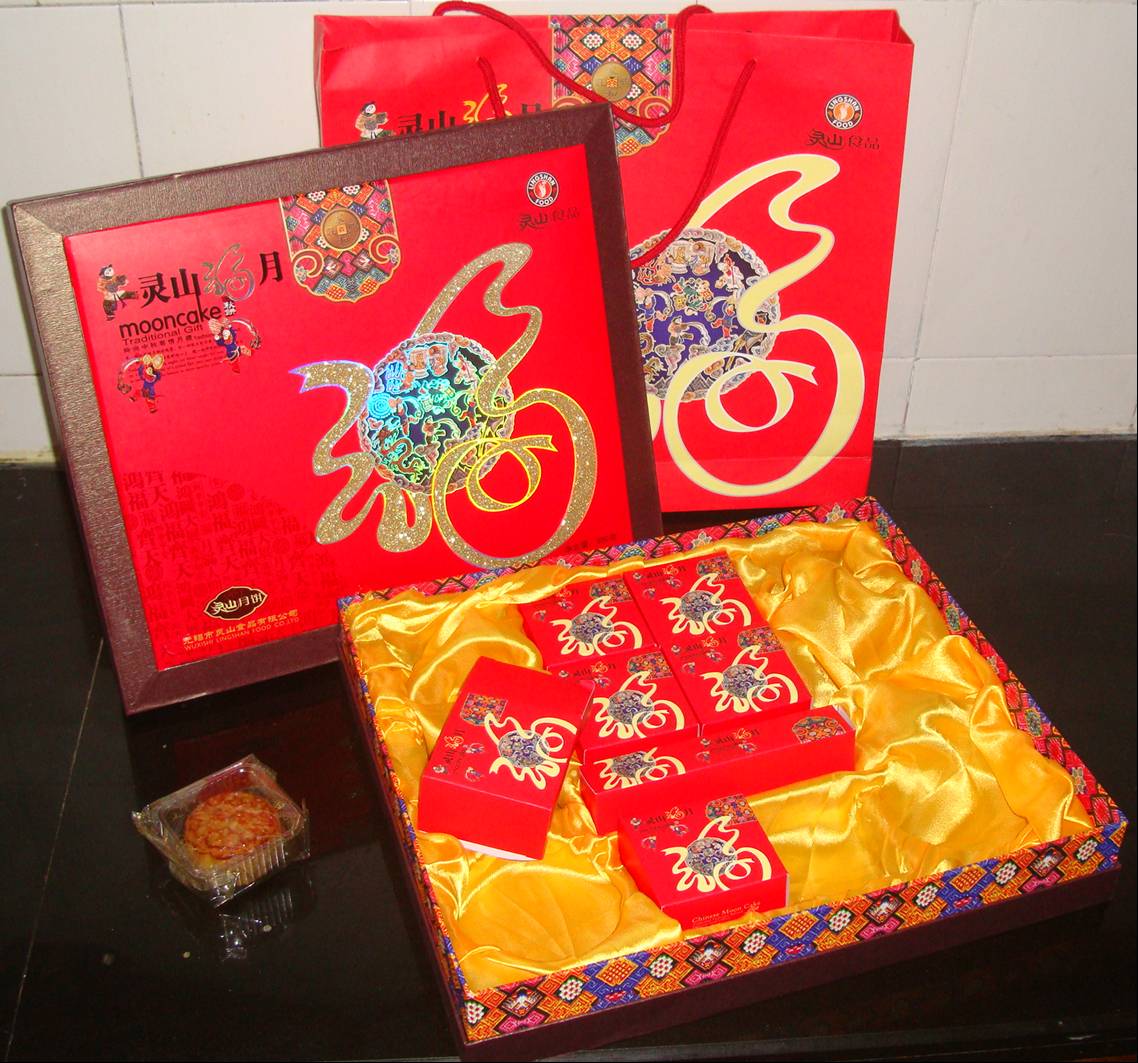
I
really like moon cakes, but I have a terrible time throwing away the
awesome packaging. I know if my father were still alive, there'd
be stacks of empty moon cake presentation boxes in the basement.
They are really beautiful. I just wish I could think of a use for
them.
We feel valued and cared for at this university.
And we really appreciate our generous administration.
Comment on this Post
Simon and Simona's New
Store
Our friend Wang Tao, English
name Simon, and his fiancée, Simona, have gone into business selling
beautiful crystals from Simon's home town. We paid them a visit on
Saturday and marveled at the hand carved crystal sculptures in their new
shop.
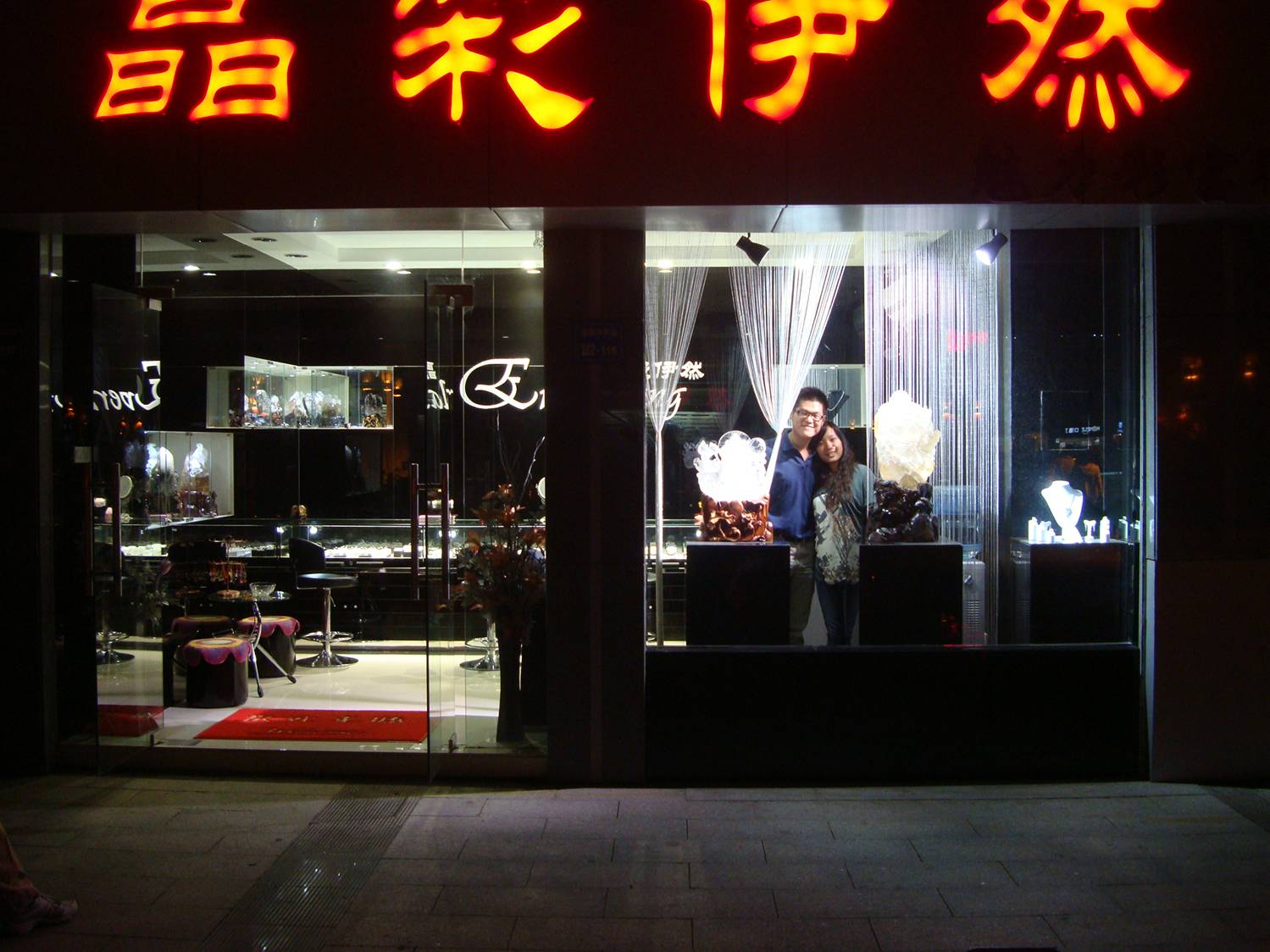
Simon and Simona's store is
located in the newly renovated Temple Market area. Gone are the
narrow alleyways crammed with cheap tourist gack. Now everything
is upscale, and their elegant rock shop fits right in.
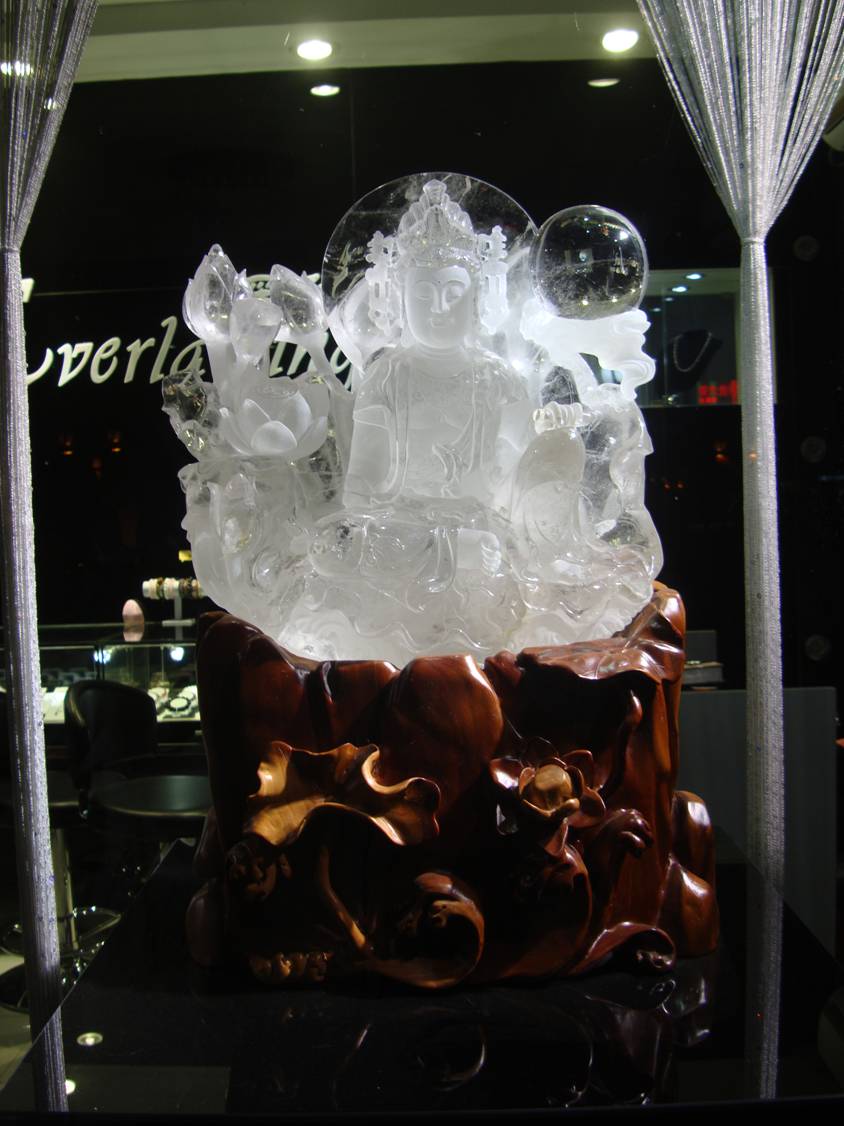
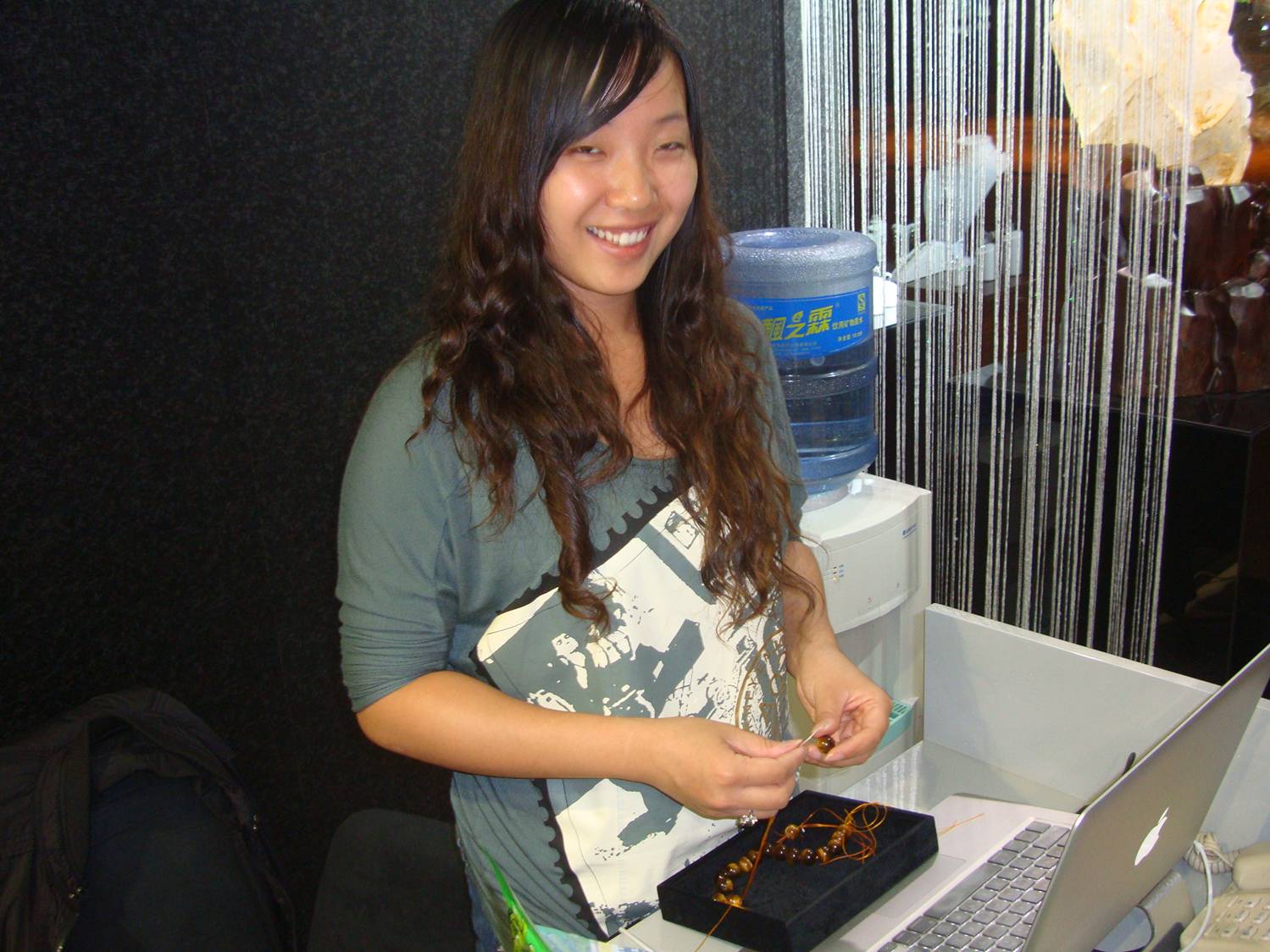
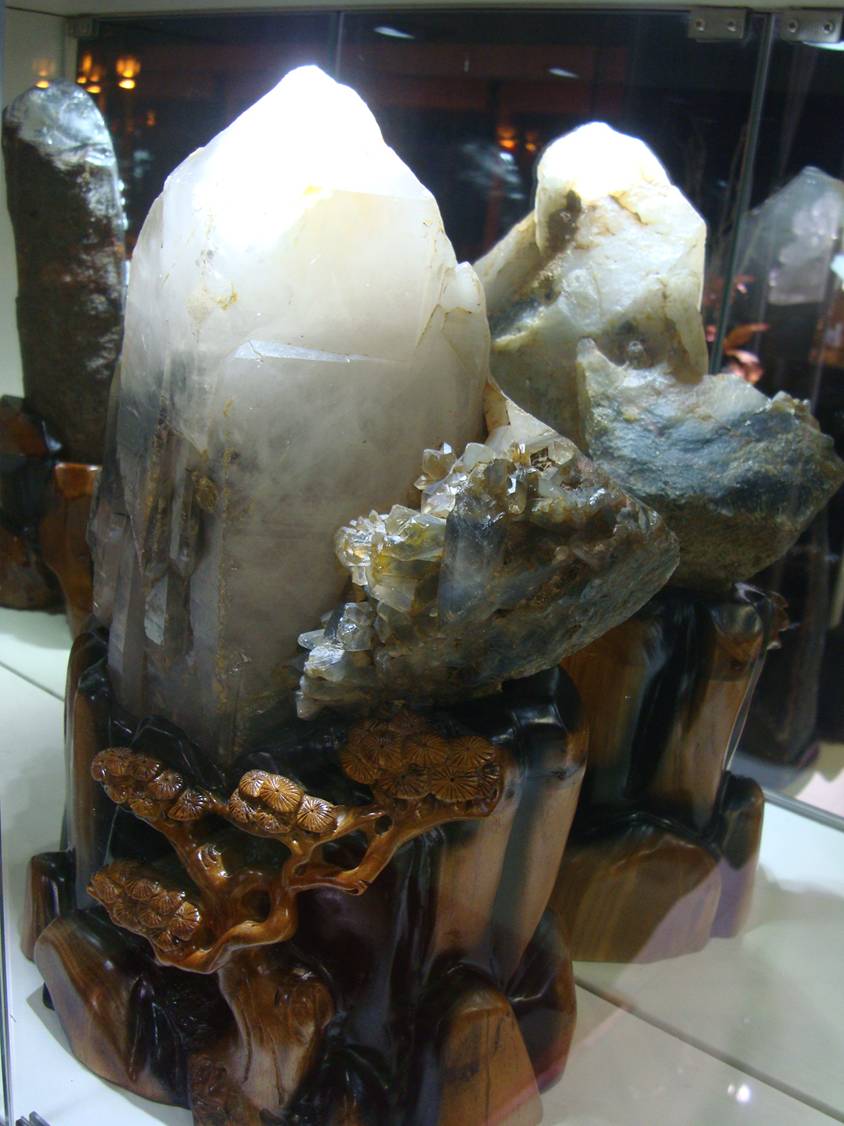
Simona sizes a tiger eye bracelet to fit my wrist. Ruth and I each
got one as a wedding present
I presented Simon with the guitar finger picks I bought
for him in Winnipeg. Impossible to find them here in China.
Simon is the friend who gave us the words and melody for
同桌 (tóng zhuō, desk mate) the
Chinese song we learned this summer. He sang it for us, and
accompanied himself on the guitar, but he'd never seen finger picks.
Now he owns a set.
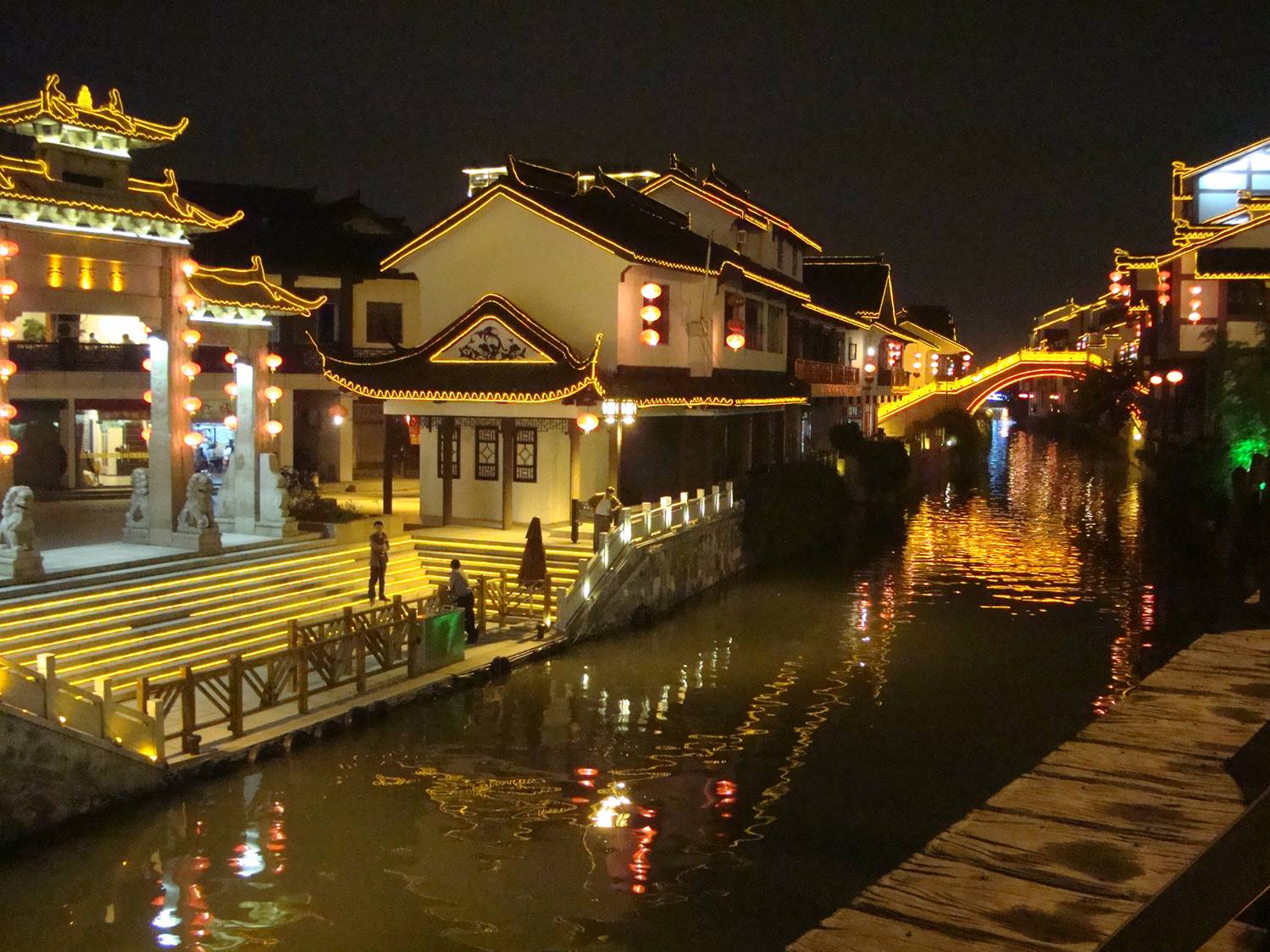
The
temple market area in downtown Wuxi, where our friends have their shop,
is totally renovated and very upscale.
Comment on this Post
A Fraudulent
Cry for Help
At two thirty on Sunday
morning a chat window lit up on my computer. It was my old friend
Rosemary, saying hello. But all was not as it seemed.
|
Rosemary:
hey
Rosemary is online.
Rosemary:
how
are you doing
David:
Just
fine. How are you? Great to hear from you. Where are you
now?
Rosemary:
not
good at the moment
David:
Why?
What's happening?
Rosemary:
am
stranded in london
David:
Stranded? For lack of money, or because of the
Pope's visit?
Rosemary:
on a
short vacation and was mugged at a gun point last night. all
cash credit including cell phone were stolen off me
David:
Oh
no. Can you go to the embassy or someplace for help? Piccadilly
Circus, Canadian Consulate as I recall.
Rosemary:
I've
been to the embassy and the Police here but they're not helping
issues at all and my return flight leaves in less than 3hrs from
now but am having problems settling the hotel bills please i need
your help
David:
Okay. Give me an email address for the hotel and I'll settle the
bill on my credit card. How much is it?
Rosemary:
all
i need is 1,850pounds
David:
I
need your room number, complete name, and any other details you
can think of. What is that in Canadian? Hang on, I'll check.
Rosemary:
you
can have it wired to me on my name and present location Via
western union
David:
Rosemary, that isn't possible from China. Western Union here
has a $200 maximum.
Rosemary:
do
you know of any western union around you how much can you loan me
at the moment
David:
There is a Western Union here, but I know they have a maximum of
just $200 or $500 per day, and you have to wait a week before
sending more. Won't work. Whatever I lend you has to be on
my credit card. I could pay directly to your hotel, but not to
you. (pause for some thought) Rosemary, pardon me if I seem
a little... careful here. But tell me. Where was my apartment in
Toronto? Name the street.
Rosemary:
OMG...are
you kidding me
David:
No.
I am not kidding. Name the street or get lost.
Rosemary:
at
the moment i am mentally unbalance
David:
At
the moment you sound like a con artist who has Rosmaries email
address. Rosmary's Rosemary's I'll get
it right sooner or later. Or here's another question if you
can't remember the street name: What movie did we see together the
first night we went on a date?
Sent at 2:27 AM on Sunday
David:
Rosemary, just tell me SOMETHING that you should know.
Sent at 2:33 AM on Sunday
David:
It's
twenty to three in the morning here in China. Sorry I can't be of
any help right now. |
The
next morning (still Sunday morning, actually) I woke up to this pathetic
email message:
|
From Rosemary
_________
I'm writing this
with tears in my eyes, I came down here to
London,United Kingdom for a short vacation unfortunately i was
mugged
at the park of the hotel where i stayed,all cash,credit card and
cell
were stolen off me but luckily for me i still have my passports
with
me.
I've been to the embassy and the Police here but they're not
helping
issues at all and my flight leaves in less than 5hrs from now but
am
having problems settling the hotel bills and the hotel manager
won't
let me leave until i settle the bills,i need you to loan me
£1,850pounds promise to refund as soon as am back.
I'm freaked out at the moment. |
What
a heart rending plea. A dear friend distraught and in need of
help. Except both these conversations are totally bogus.
I managed to contact Rosemary through another email address, and, as I
suspected, she was comfortably at home in Auckland, New Zealand. I
suppose if this con artist had been just a little more sophisticated
he/she might have talked me out of a credit card number. But when
Rosemary couldn't remember the street in Toronto where we were
neighbors, things started to smell pretty fishy.
What tipped me off? I tell my students that
punctuation and capitalization are important. Rosemary is a
writer, a former book editor and professional proof reader. There
is no way she would make these grammatical errors, or write with such a
lack capitalization, bad spacing and incorrect punctuation. Not
even if she really were distressed. Not even if she were falling
down drunk.
I had one more short exchange with this person.
The last message he or she sent me included these sentences:
|
From
Rosemary _____
Glad you replied David,i will like to let you know that i have to
postpone my flight because i got nobody to help me here please i
really need your help here,The hotel manager insisted that i
should pay in cash and not credit card.How much can you loan me at
the moment..."
|
Note: "i
will like to let you know"?!? and
"i
got nobody to help me here"?!?
Does
this read like it comes from somebody whose first language is English?
Shortly after I received this, I got a real message from the real
Rosemary, confirming my suspicions.
Nice to hear from the real Rosemary again. I haven't
seen her for close to thirty years, but she's a great friend and I'd do
anything I could to help her if she really was in trouble. I
suppose I have a sleazebag con artist to thank for getting us to say hi
to each other again. There's irony there.
Comment on this Post

The special needs listed are - old, feeble, sick,
incomplete (assume this means disabled), or pregnant. Just so you know.
Chinese word of the
day: 多愁善感
(duō chóu shàn gǎn literally "more worry good emotion" ) =
sentimental
September 25,
2010 Thoughts on Chinese Culture (caveat emptor)
We've learned a new Chinese song over the summer,
同桌 (tóng zhuō, desk mate) a sweet melody
with charming lyrics about a boy thinking back to his desk mate at
school, now lost to him, and wondering who she married and whether she
remembers that he loved her.
The adjectives used by the song to describe this girl are 多愁善感的 (duō
chóu shàn gǎn de literally "more worry good emotion") meaning
sentimental, and 哀哭的
(āi kū de literally "grief cry") meaning weeping in sorrow; wailing,
grieving and miserable.
We explained to Chen Fu, our Chinese teacher, that in
the west we don't like unhappy people, or people who cry a lot. We
call them "cry babies". We asked if these adjectives were terms of
affection, and he assured us that they are. Apparently Chinese men
like their women soft, sentimental, whiny, and close to tears -
presumably so they will need to be rescued and comforted, thus
confirming the strength and power of the man. Can this be true?
If so, it explains why so many of the girls in my classroom (I'm
thinking about yesterday's class, my Friday oral English class, right
now) look like their goldfish just died, and why we've noticed so
many Chinese girls with a distinct whine in their voice. Could
such behavior have been encouraged by the culture, and be part of the
Chinese image of femininity, at least until it changes into a dour
stoicism after marriage. I hope not.
Comment on this Post

Chinese word of the
day: 健康
(jiàn kāng literally "establish + health") = health
September 21,
2010 Staying Healthy in China
China
can be tough on foreigners. Beer is plentiful, very cheap, and
very good thanks to the German concession in Qingdao back in the days of
colonialism.
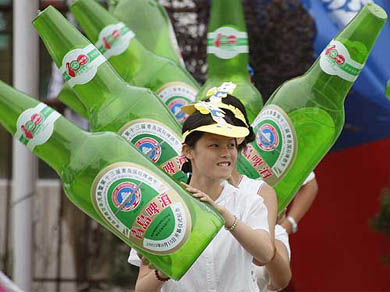

Many
foreigners opt for an electric scooter instead of the plebian bicycle.
Restaurant food is delicious, but cooked with an amazing amount of oil,
MSG, and sugar. Any foreigner can afford to eat out every single
night: China is a glutton or alcoholic's paradise. It's a wonder
anybody survives a year of teaching here.
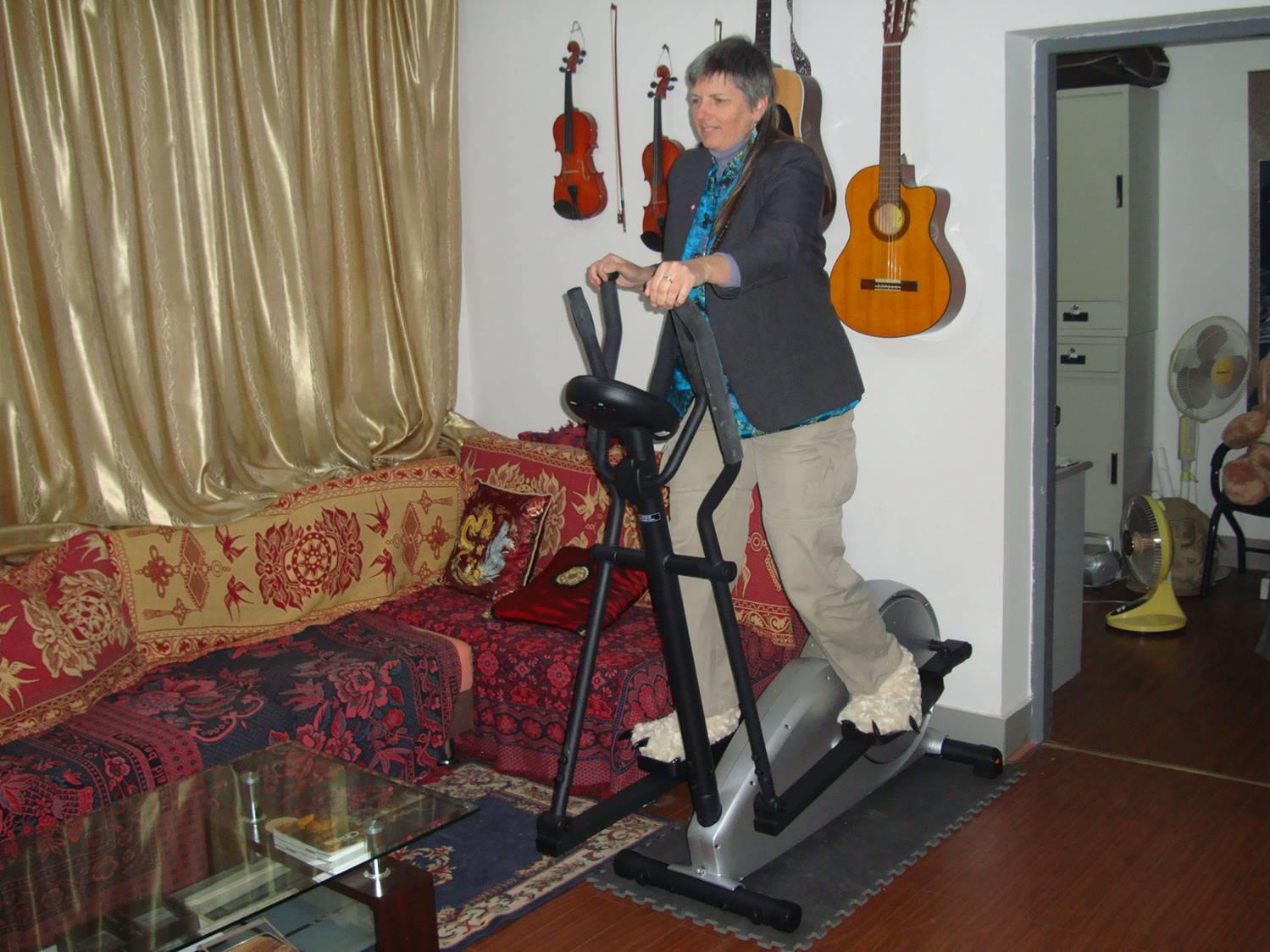
Ruth tests out the elliptical trainer shortly after purchase. In
the winter, she likes to exercise in bear feet.
Back
in March of 2009, Ruth and I bought an elliptical trainer, which we each
use for half an hour every day. (In fact I'm sitting here dripping
sweat, inspired by an idea, as I write this. Just got off the
machine.) I find myself rushing past the gaggle of students, many of
whom complain about being too fat, even though they aren't except by
fashion magazine standards, waiting for the sole elevator in the
teaching building to take them to the second floor while I bound up the
stairs to the fourth. We try to cook at home six days a week, and
to watch the fat and sugar intake. But this all takes a conscious
effort on a daily basis. It would be so easy to relax into a
deadly decadence. I admit to being tempted.

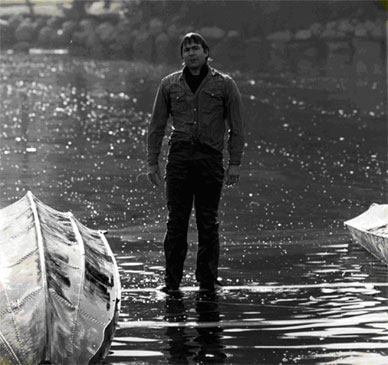

I knew John on his very first film. Now the company he started is
doing the blockbusters and sequels.
This morning I was thinking
about my friend John Thomas, founder of
Thomas Special Effects in Vancouver.
A pioneer in the Vancouver film business, he was a character and an
innovator. One of his fitness tricks was to have only a rope for
access to the mezzanine floor in his shop. If he wanted something
from upstairs, he had to climb the rope. He had arms that proved
this worked for keeping his upper body in shape.
That got me thinking of an idea I had years ago.
Wouldn't it be interesting to design a house that kept you fit, instead
of one that progressively ruined your health? A rope to get to the
second floor may be a bit extreme for most folks, but the whole house
could be designed to be altered - stair steps that could be removed to
make each step bigger and more demanding, then the stairs replaced
with a ladder, then rungs removed to make the climb more difficult, and
finally the John Thomas rope trick. Maybe instead of a television
remote control, you'd actually have to do some work to change the
channel, like get up off the couch at least.
Our designers have been working on the assumption that
none of us want to move. Not at all. And the more wireless
and remote we get, the less moving we actually are required to do.
But think how easy it would be to keep fit if we needed to exercise just
a little bit, simply to get where we want to go, or do what we want to
do.
I see Chinese people here who are lean. Very
lean. And very healthy. Mostly it's because they are too
poor to afford our lifestyle. They have to ride their bike or
walk. They have no choice but to get out in their garden and dig
or weed. But they are being sold our concept of ease and comfort
with no effort. They are getting fatter too. We need a
counter-movement in design and marketing, a movement that sells us on
staying healthy automatically, because of the environment we choose to
live in. Maybe I need to design that house.
Comment on this Post

Chinese word of the
day: 插嘴
(chāzuǐ literally "insert mouth") = interrupt
September 16,
2010 Another Term Started
Over
ten days since my last post. 不好意思 (bù hǎoyìsi - feel embarrassed).
Goody, I hope you are still checking in occasionally. It's just
that after all the
excitement of the summer,
nothing much has been happening.
Of course when I think about it, lots has been
happening. We met the new teachers. We've started our Chinese
lessons with our new Chinese teacher, Chen Fu, an English major who
achieved the top marks in the whole university last year, and was
rewarded with a monster scholarship. Apparently he's quite famous
among the students.
I
bought Ruth an iPad for her birthday, and have a hard time keeping
my hands off it. She's become an absolute master of Plants vs.
Zombies.
I'm sure this machine will turn out to be useful in the
future. Right now it's an incredible time waster. |
 |
We've had our first week of classes already, and as usual I'm
enjoying my students. I have no freshmen classes this term,
which means I miss that wonderful excited energy. On the other
hand, it's really nice to have familiar faces in the classes and
names I know.
Our attendance question for this week has been:
The most (fill in the adjective - amazing, incredible, stupid,
exciting, boring, satisfying etc. student's choice) thing I did this
summer was to ______________. Of course I get to tell them
about my
amazing incredible summer
back in Canada and America. But the student stories were also
fascinating - several told of helping with flood relief, some told
amusing personal stories, and one girl described finding a dead
body. They all have lives.
I've posted my new
class schedule for the Fall 2010 term.
Any student who wishes to audit one of my classes is welcome.
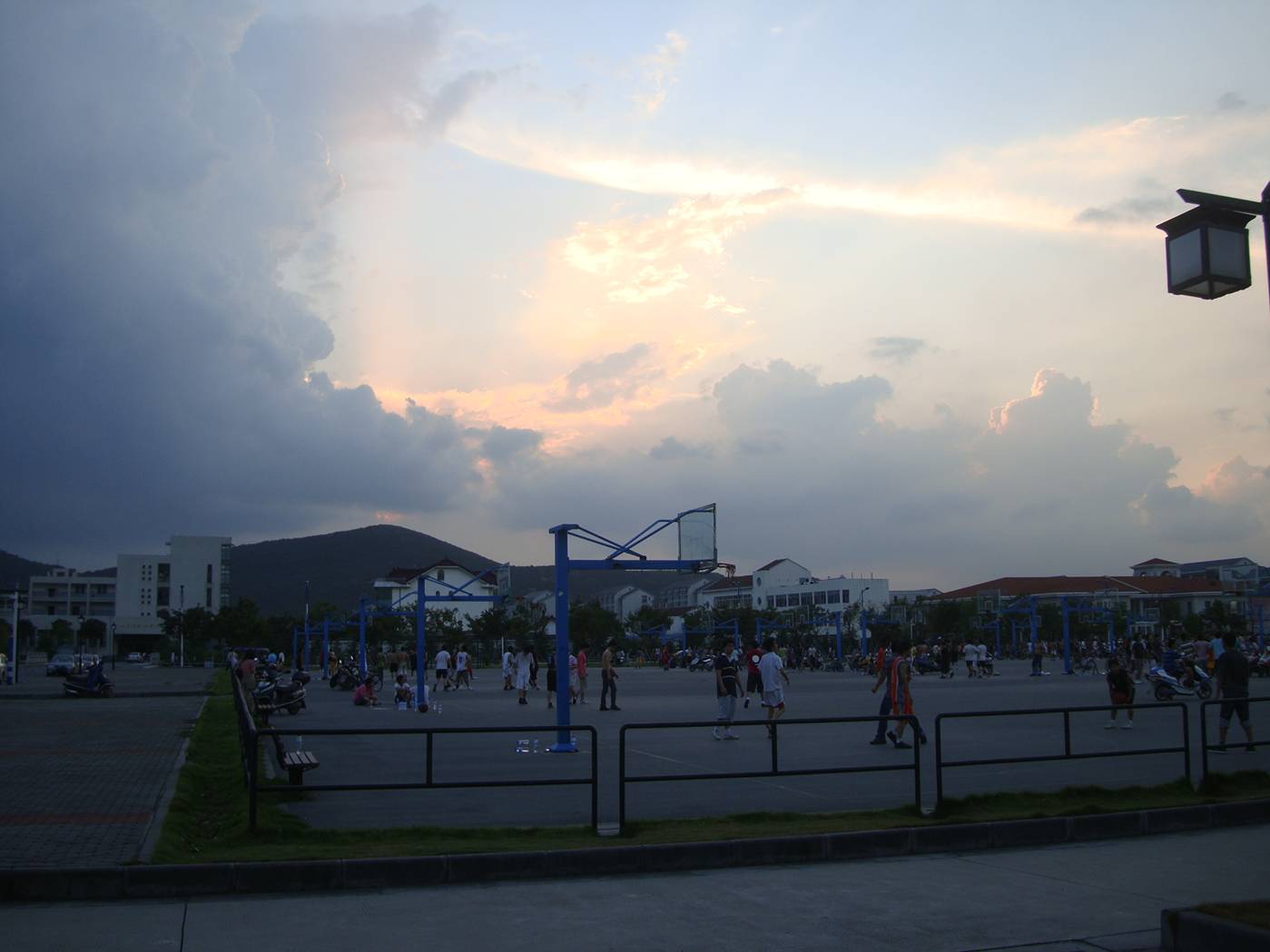
We've been surprised by the clarity of the air. The gray skies of
Wuxi have been clear blue, even with the heat and humidity.
Occasionally we've had dramatic thunder storms and biblical skies.
Mostly
the weather has been hot and very humid, so we've been hiding indoors
with the air conditioner on.
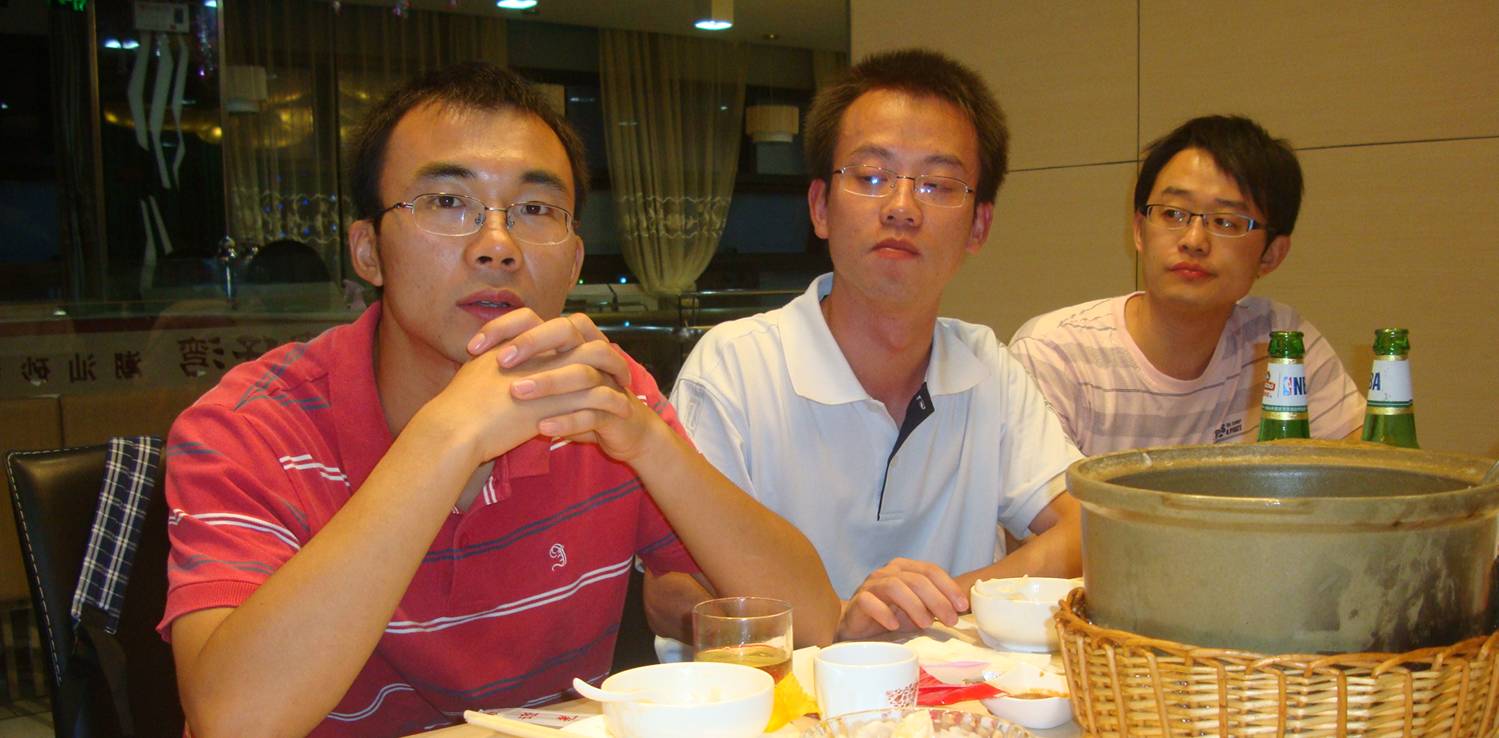
But
we did get out for a feast to thank the boys who looked after GouGou for
the summer. They were incredible with her, even sending us
a little video they made
in case we were missing her too much.
We were also invited out to tour a new
five star villa
development downtown, and treated to another wonderful Chinese
feast. Steven Zhang, the landscape architect for the project, has
been working on the site for two years.
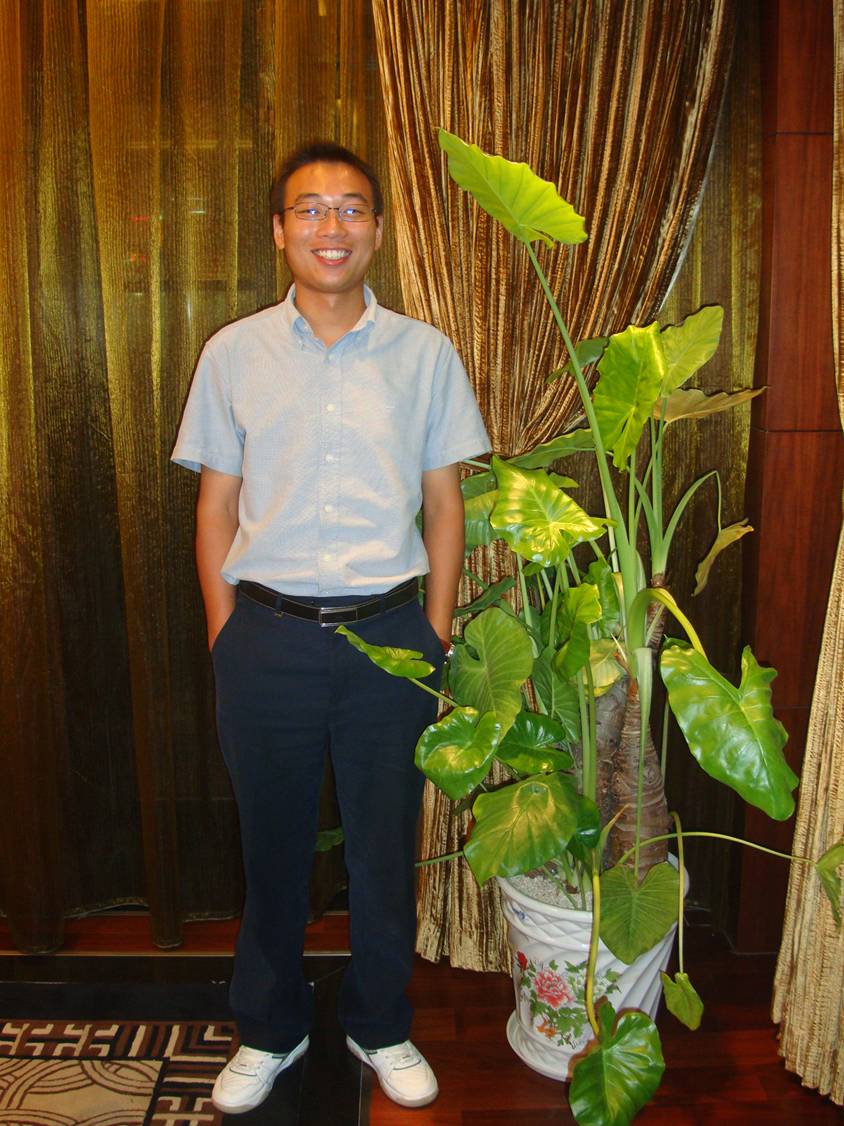
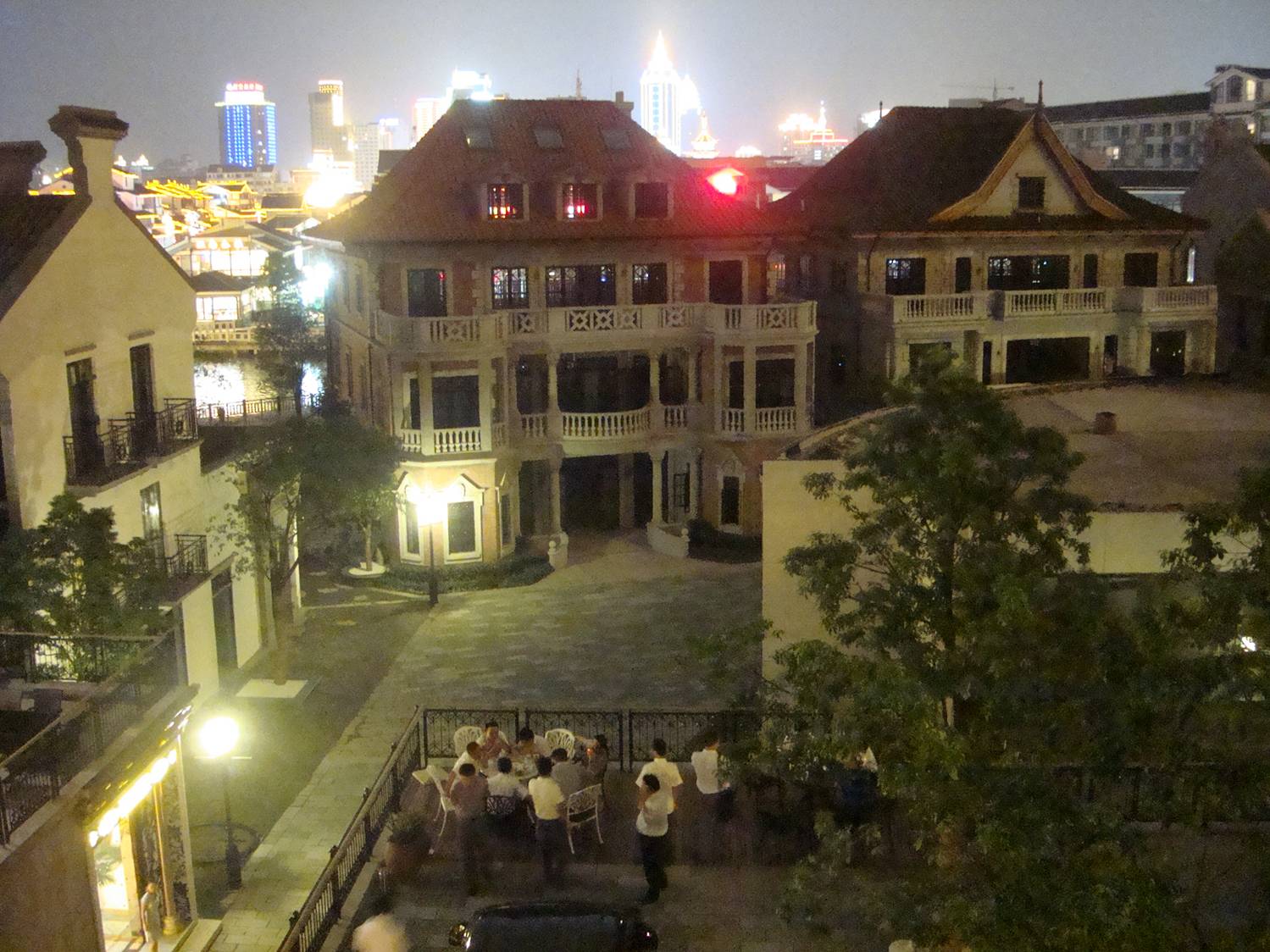
Steven Zeng showed us around his pride and joy, a five villa luxury
development along the canal. Beautiful.
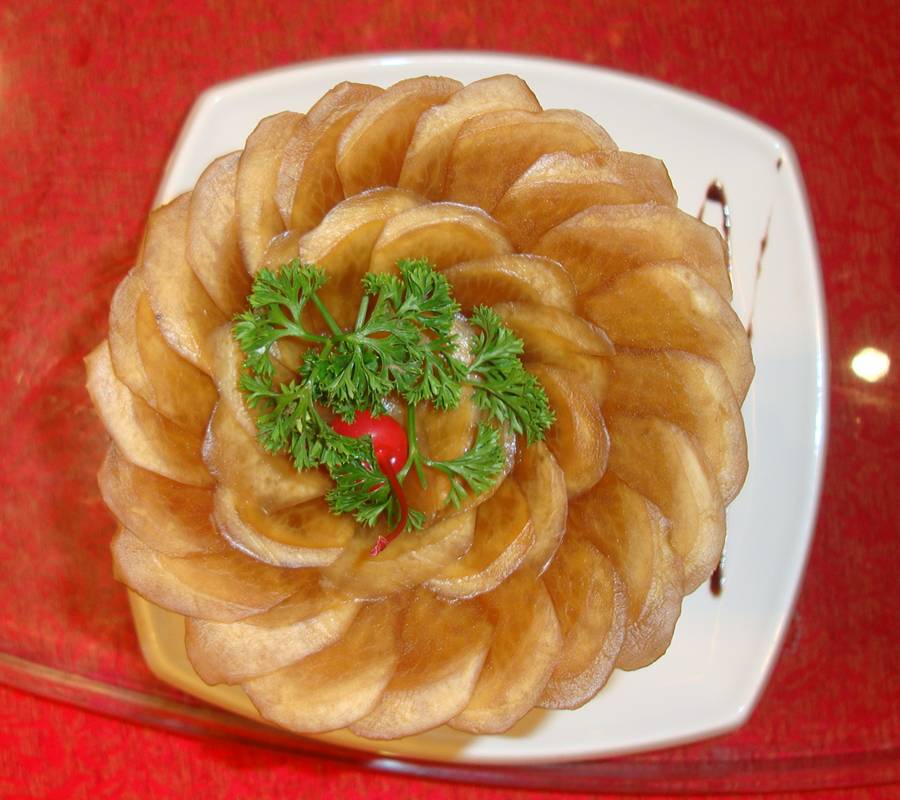
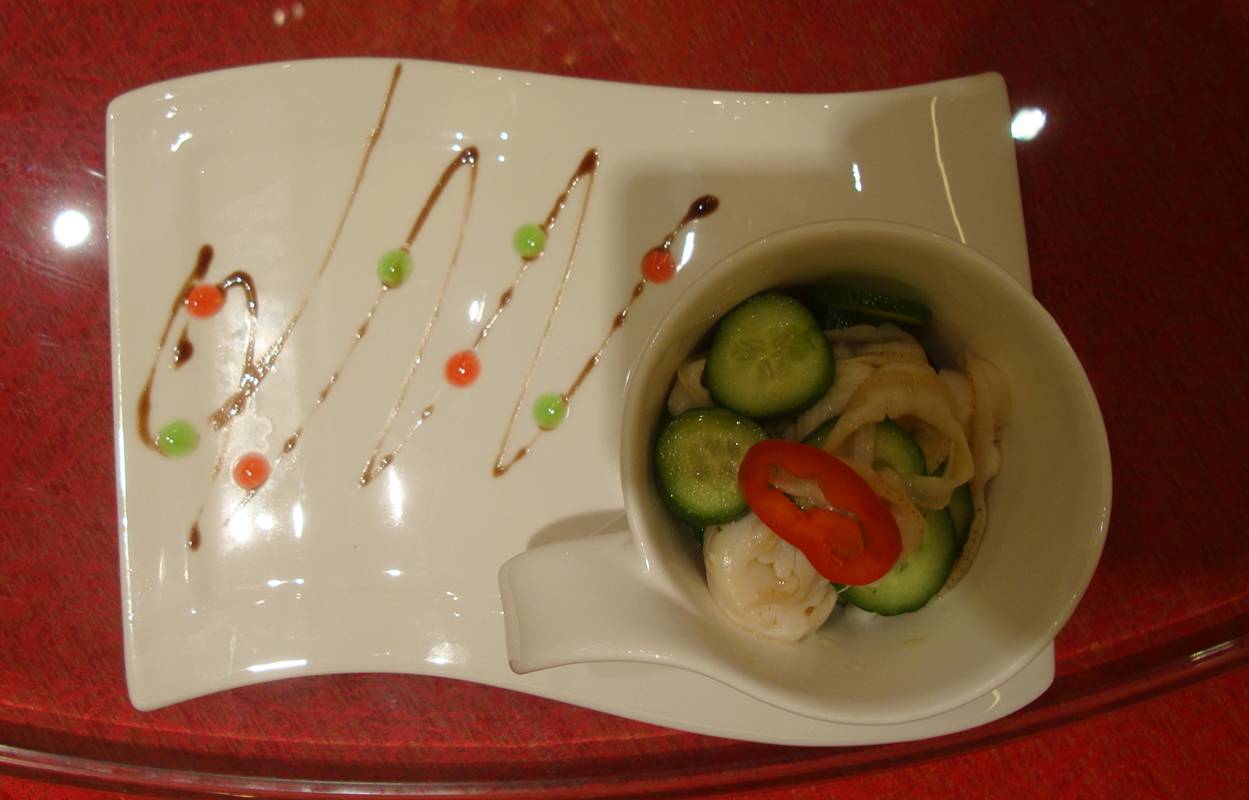
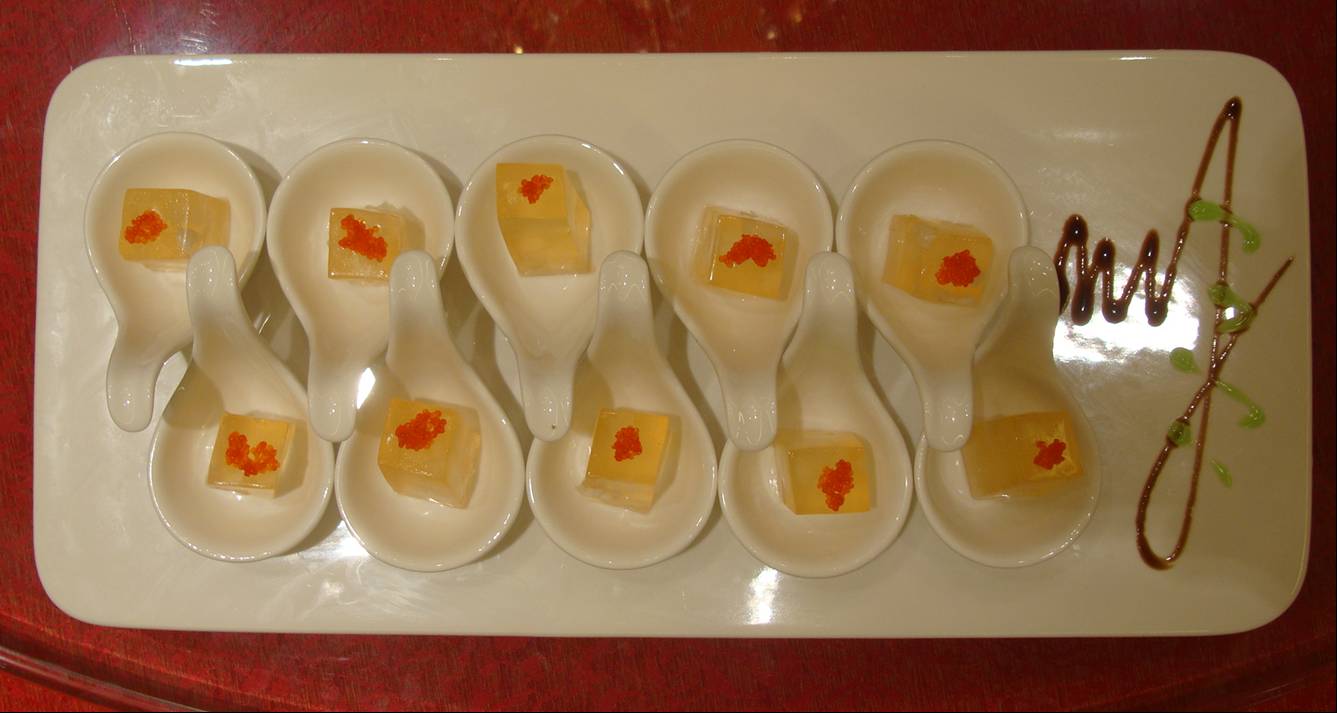
And these were just the appetizers.
The Chinese can put on a spread that is beyond classy.
This is one of the perks of
being a foreigner here. We get invited to see things as if we were
important people.
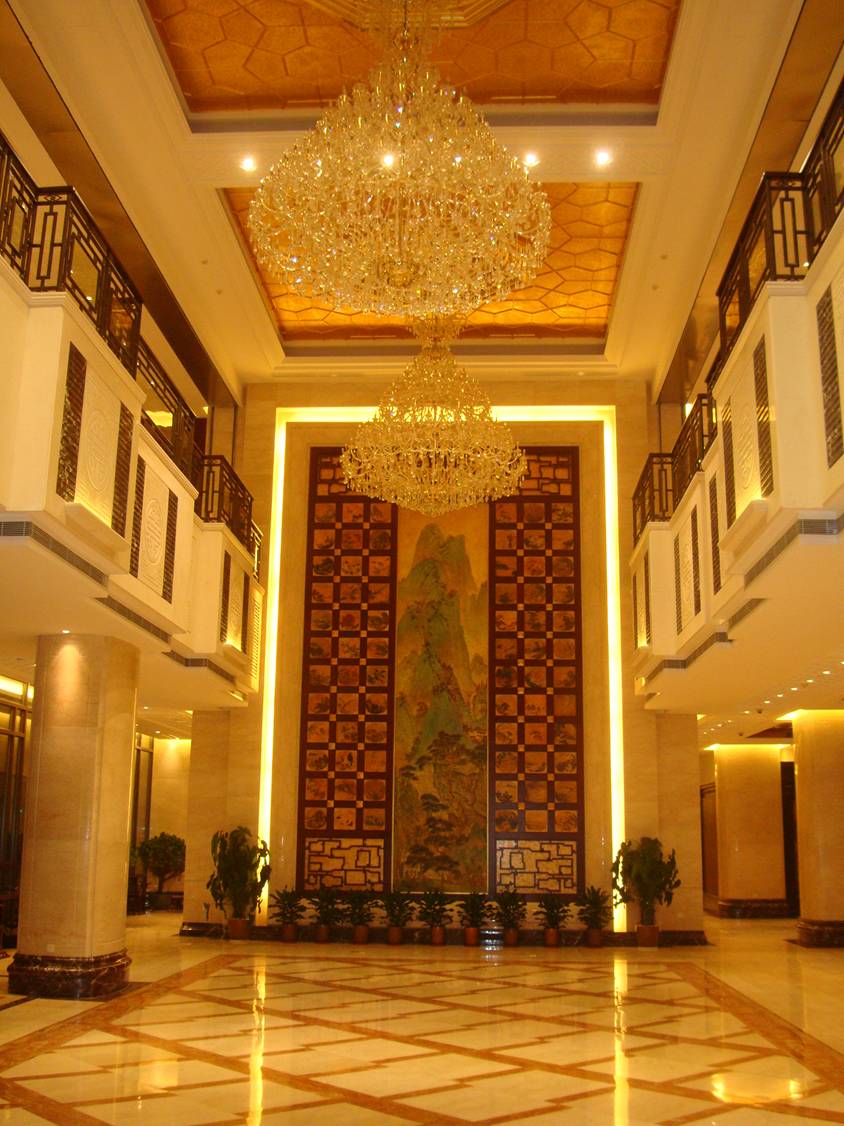

The core of Wuxi is becoming very upscale, and Steven Zhang's new five
star hotel and villa complex is definitely world class.
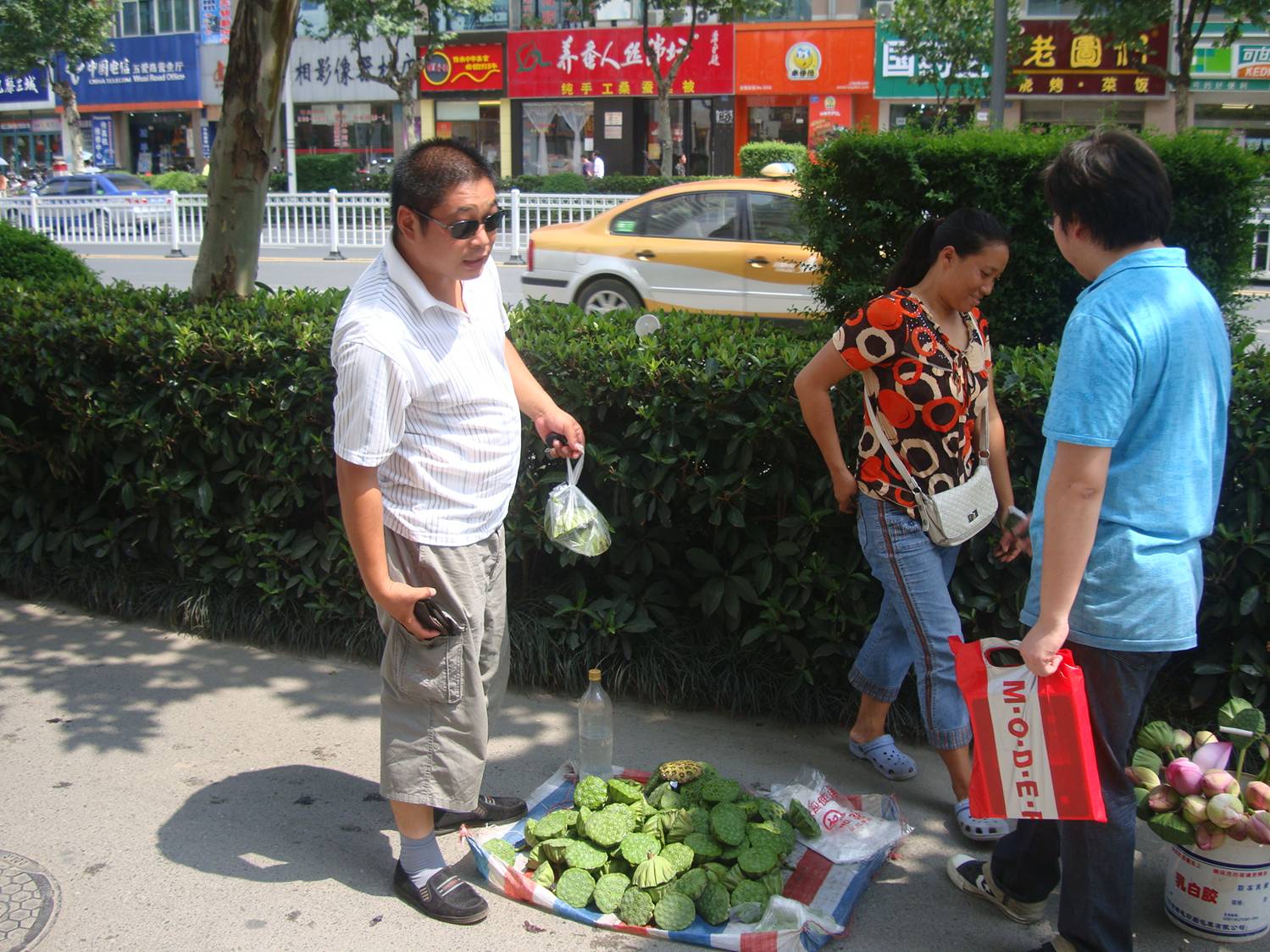
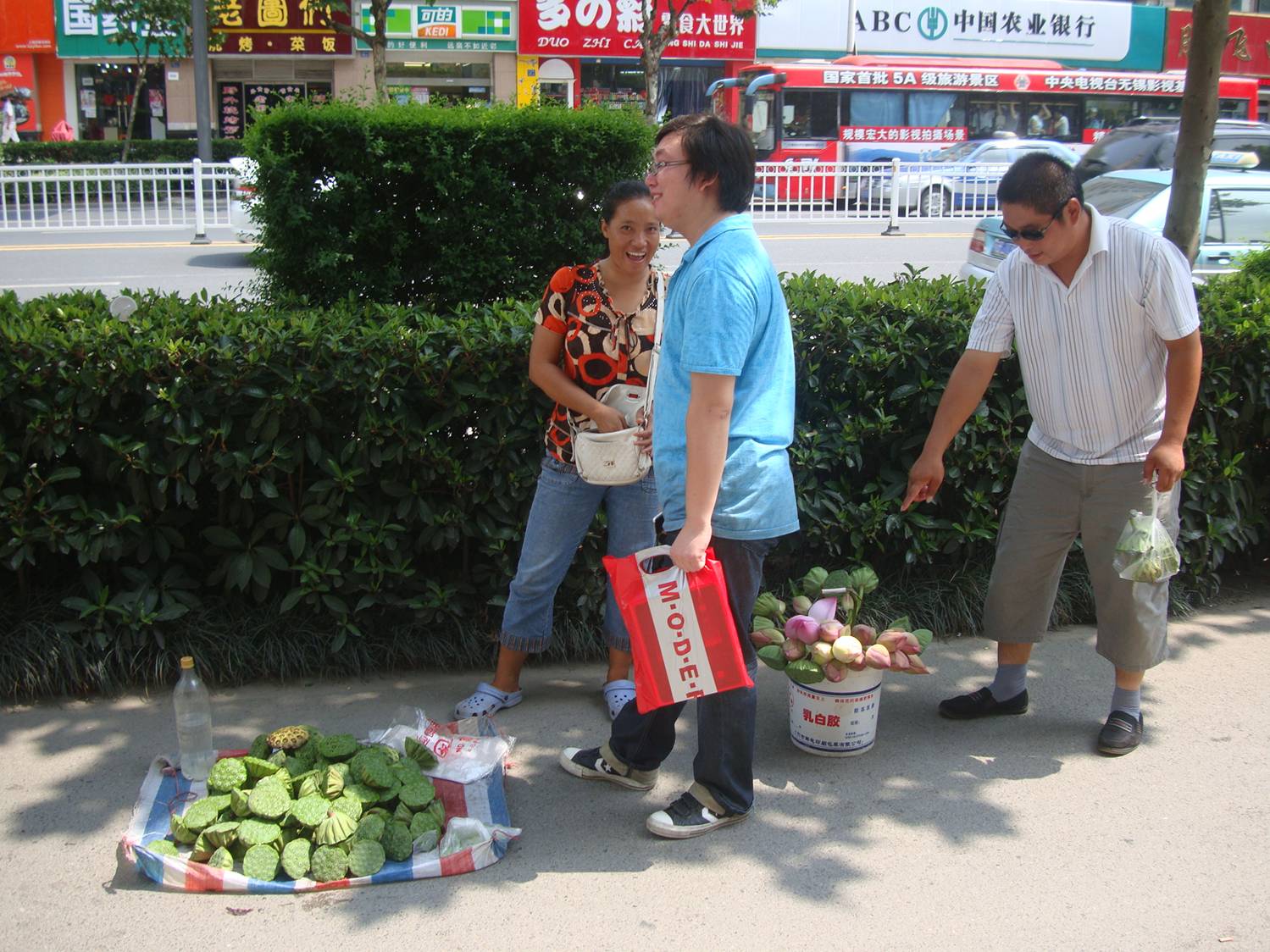
And
after six years in China I still see things on the street I've never
seen before. This woman was selling lotus root. I've don't
remember seeing it raw before.
She's
a bit nervous about the camera, because she's working without a permit.
Our driver, Chen, assured her that we are not interested in enforcing
the bylaws of Wuxi, or in documenting her dangerous criminal activity.

And finally, there's water in
the campus pool and students are learning to swim. To think we
suspected the pool was just for show.
Comment on this Post
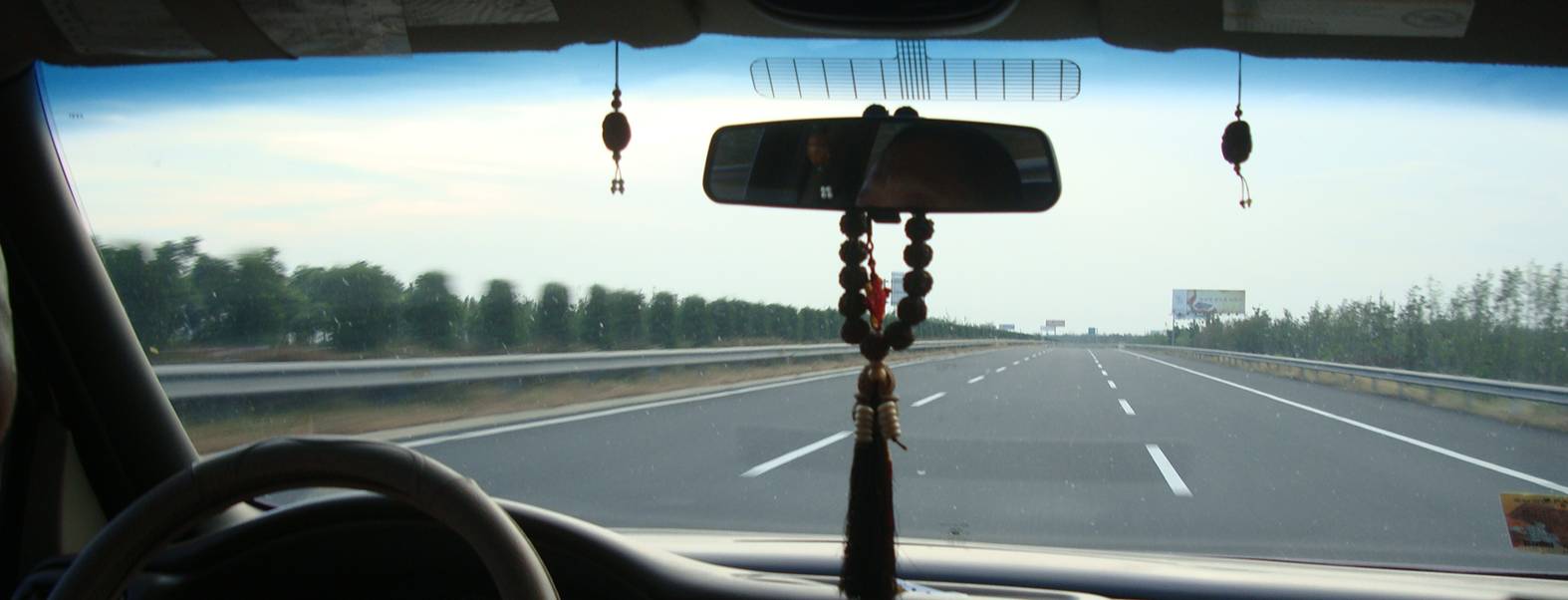
Chinese word of the
day: 百货大楼
(bǎi huò dàlóu literally "hundred goods big building") = department
store. This is a great example of the way Chinese combines
characters in a descriptive way that we might find amusingly like Tarzan
and Jane speak.
September 5,
2010 Good to be Back
After
our amazing summer, traveling through Western America and breathing B.C.
air, I had mixed feelings about returning to China.
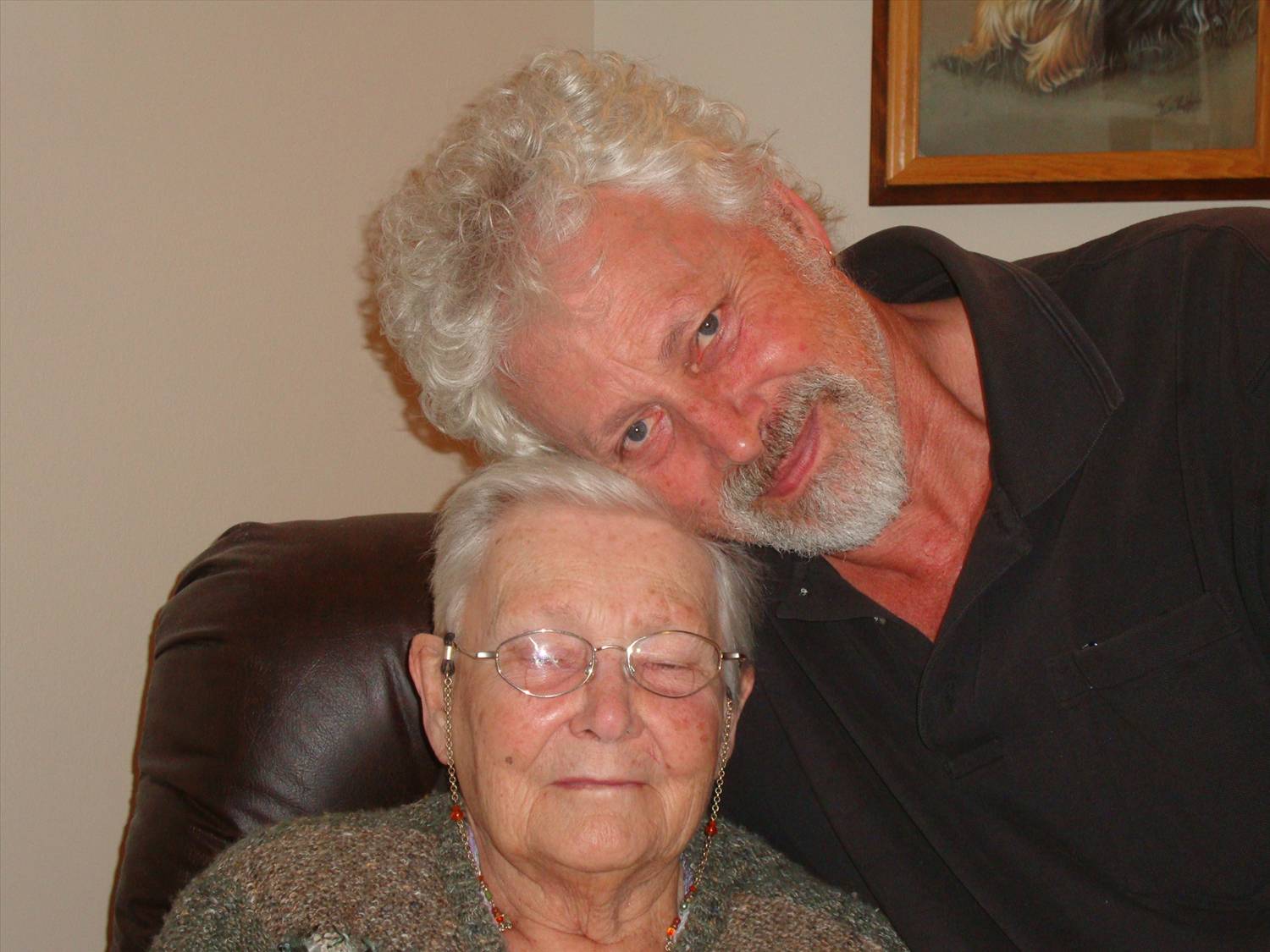

It
was hard to
leave such great friends and family, especially my mother, who reminds
me each summer now that this could well be the last time we see each
other.
Of course she's right.
This is always true, all the time, for everybody. I'm hoping
my mother might last for another twenty years.
I love my work here in China, love my students and
friends. But... well, Canada is a beautiful place to live.
Fortunately, the warm welcome we
once
again
received on our return went a long way to ease such ambivalence..


We
found Jenny's note on our white board when we returned to our
apartment. Jenny is the friend who made the arrangements for
students to look after our dog. The Chinese characters in the note
read: "GouGou had a shower, we don't want to leave her."
Last night, Jin Bo, our liaison here, presented us with
the perfect Chinese wedding gifts, a pair of bedside reading lamps.
These are modeled on ancient oil lamps, converted to electricity.
One is a phoenix, representing the wife. The other is a dragon,
representing the husband. Very Chinese.

Earlier in the evening we went into the
village for a street barbeque. Once more soaking up the texture of
China.

This is the second Chinese person I've seen
wearing a helmet. I told him he's very smart to protect his brain.
Comment on this Post
Chinese word of the
day: 外国人
( wài guó rén literally "outside country person") = foreigner
September 3, 2010 Back
"Home" in China
It
was an uneventful transition from Canada to China. No hassles at
all along the way. In fact, I was sorry the flight wasn't longer.
They fed us well on the plane, and I really appreciated the
complementary scotch. I did some of the update you are about to
read, and watched three interesting movies (Exit through the Gift
Shop, Ocean, and The Blind Side) and enough of two
absolute turkeys (Losers and McGruber) to convince me I
didn't want more.
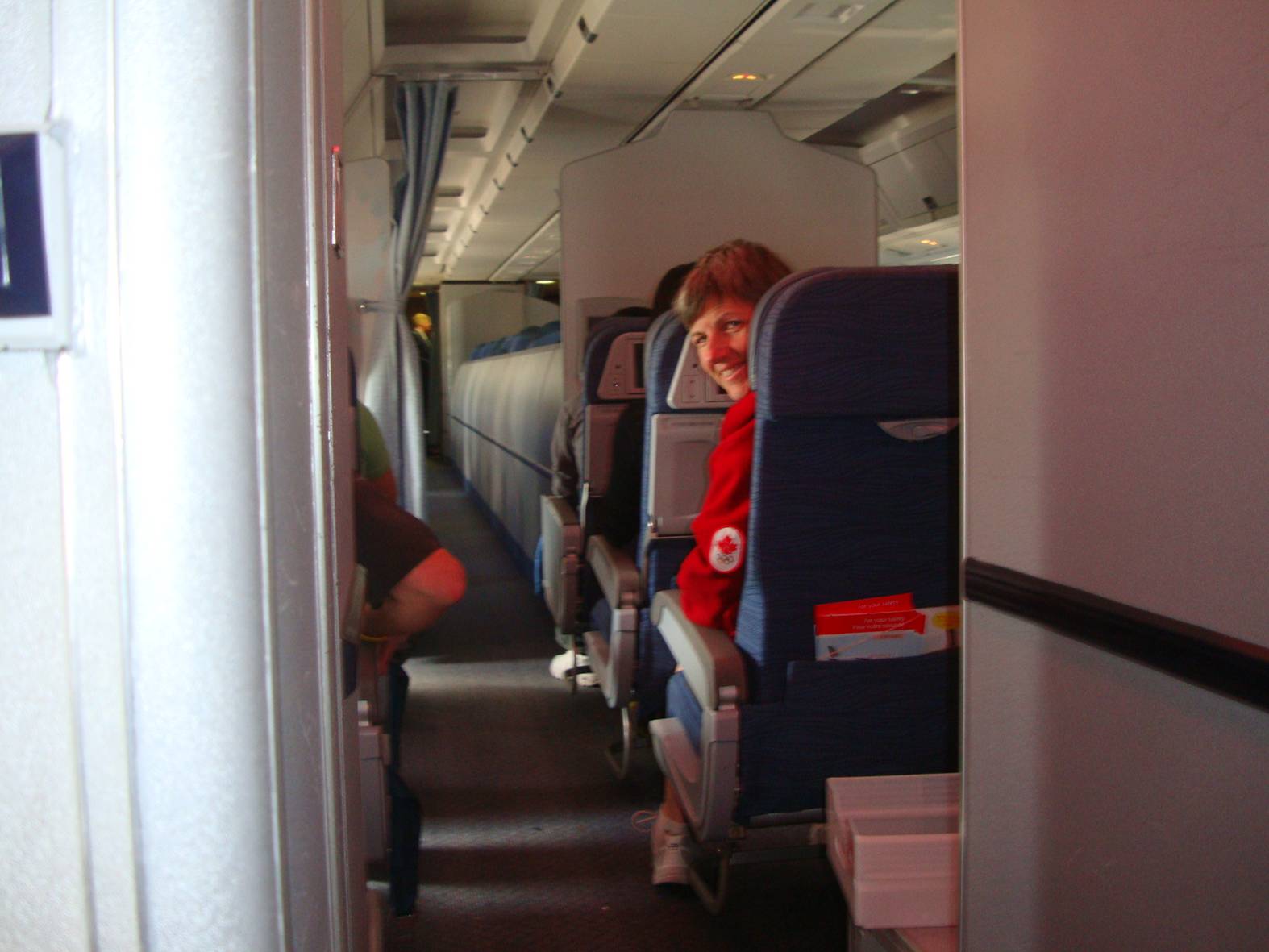
Our
driver met us at the airport and our dog welcomed us home as only a dog
can. We're back.
Landon is in Singapore:
My
former student, Landon, wrote to me recently:
|

"merlion at city center: I think this
merlion is famous.
It is located in the city center. So I hurrily went there
just several days after I arrived."- Landon
Hi, David, I'm Landon. Do you
remember me. I think of course you do, because you have taught me
about English writing for so many times by email. And again, I
really thank you for that.
Now actually I have graduated from Jiangnan University and been in
Singapore for post-graduate studying. It is Nanyang Technological
University. Upon arrival that night, I was really impressed by the
clean environment of airport of Singapore.
But the next day, I was a bit longly and homesick. I don't get
used to some things here. And it is much quieter inside the
unversity campus than in China.
I feel now that I'm here, I have to try adapting myself to this
new environment. And just study hard, learn new things, and wait
for the time of going back a year later.
Another problem I got is the English language here. Though the
majority of Singaporean can speak Chinese, the medium of
instruction here is English. I have to say that we can hardly call
it English. It is Singlish (Singapre English). It is a mixture of
Malay, Indian English, and of course Chinese language. The accent
is very strange and I can hardly get their meaning especially when
they speak fast. Really miss the times I talk to you and other
foreign teachers of Jiangnan University in English. I actually
want to learn standard or nearly-standard British English or
American English.
I try to make myself into an entire English environment. I mean, I
listen to English songs, watch English films, scan English web
pages, read English indications everywhere to enlarge my
vocabulary. I also want to refer to English BBS. But I haven't got
one. Could you recommend some English BBS to me where I can learn
some more genuine everyday English expressions. And also, I can
learn how people in western countries talk and discuss things on
BBS.
Thank you very much!
Best regards!
Landon
(I recommended that
Landon join Facebook and meet my friends, and
I asked him to send me some pictures and tell me about his life in
Singapore. Just
click here or on his picture to
see his response.)
|
Time to archive again:
So soon. So much has happened in
the past few months. The really good stuff is in the archives,
folks. I hate to bury it back there, because I fear that
nobody will ever click on the links. But you should. Really.
I promise.
This time I'm creating two archives -
the chronological archive accessed through the archive index, and a
special archive for our incredible Summer of 2010 Wedding and Honeymoon.
The Man in China archive index
The Incredible Summer of 2010 Wedding and
Honeymoon
The Man in China Home
|

































































































































